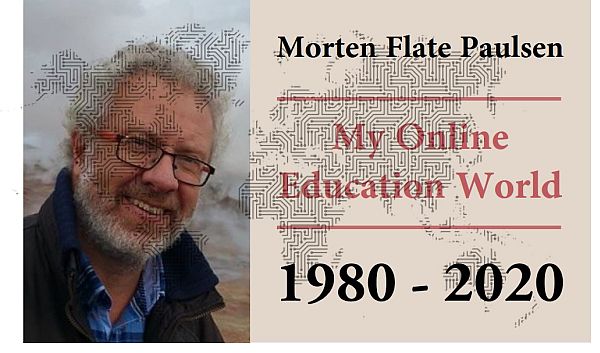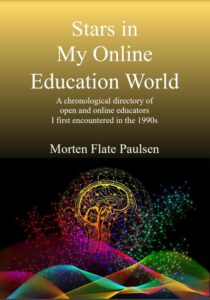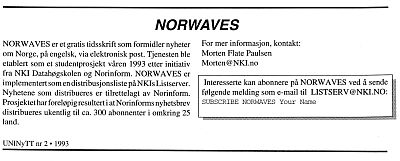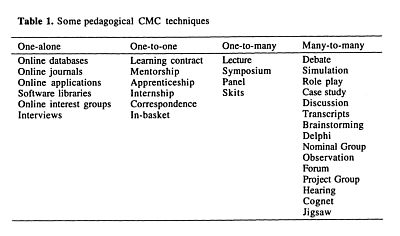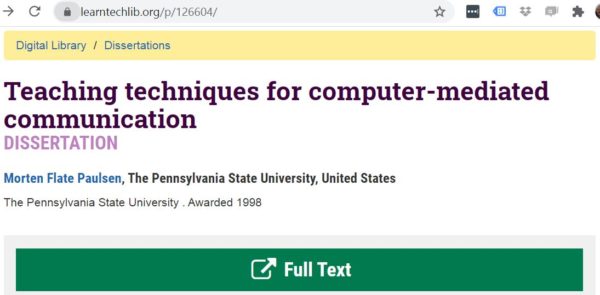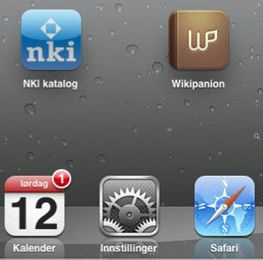My Online Education World, 1980-2020
So far, a chronicle of 300 personal anecdotes, experiences and reflections on people, events, technology and pedagogy that influenced four decades of my online education work.
The narrative is based on my international practice with online education as a pioneer, student, teacher, course designer, system developer, administrator, board member, researcher, professor, author, editor, reviewer, entrepreneur and innovator.
The story progresses along with my work for NKI Distance Education in Norway, the American Centre for the Study of Distance Education, the Athabasca University in Canada, the European Association for Distance Learning (EADL), the European Distance and E-learning Network (EDEN), the Universidade Aberta in Portugal, the Nordic open online Academy (NooA), the Norwegian University of Science and Technology (NTNU) and the International Council for Open and Distance Education (ICDE).
The anecdotes also include reflections from visits to thirty countries where I have given presentations about online education.
By professor Morten Flate Paulsen
mfp@nooa.no
Reviews and recommendations by international experts: Mark Nichols, Stephen Downes, Som Naidu, Rolf Reinhardt, Nora Lizenberg, Alastair Creelman, Don Olcott Jr ., Norine Wark and Xiangyang Zhang
Read The digital revolution and distance and online learning by the University of London with references to the chronicle.
Mark Nichols
Executive Director at Open Polytechnic of New Zealand
I’ve posted a highly recommended conversation with Professor Morten Flate Paulsen for the Leaders & Legends of Online Learning podcast. Morten’s online work extends into the 1980s, and his core thinking is remarkably contemporary. His anecdotes make excellent reading!
Stephen Downes
Specialist in online learning technology and new media
Other people have written year-by-year histories of online and distance education, but this is written by someone who was there from the beginning and actually did the hands-on work. I first encountered Morten Flate Paulsen in the 90s on the DEOS mailing list where, working with people like Michael G. Moore and Peter Cookson, he was already sharing his fifteen years’ experience. Although only complete to 1991 (with more promised in the new year) what I really like about this presentation is that, while this is a personal reflection, it’s not self-promotion. It really feels like the focus is on other people, as Paulsen works with, connects with, and celebrates the many people who created the foundations of our field. (Quote from Stephen Downes’ blog)
Som Naidu
Executive Editor of «Distance Education» Journal of the Open and Distance Learning Association of Australia
The story of a pioneering spirit … Morten’s reflection on his journey in the field of open, flexible and distance learning (OFDL) is a fascinating story of a pioneering spirit—highly recommend for new students of the field because Morten’s journey is a journey of the field itself—from its emergence at the backdoor of conventional education systems in the form of correspondence education, to its entrance through the front door in the form of online and technology-rich learning environments which it is today. Morten’s reflections capture the trajectory of OFDL in a manner that would have been impossible to achieve in a journal article, book chapter or even a book! A keen student of the field, I became aware of Morten’s work along with that of several other Nordic scholars in the field via the journal “Distance Education” which I ended up editing since 1997. And because our professional lives straddled some of the same time span, it is with great pleasure that I am able to add a few thoughts of my own to Morten’s reflections on his journey! Enjoy!!
Rolf Reinhardt
Senior Account Director at LinkedIn
Mortens’ anecdotes about 40 years of online education are a great example of how to combine revolutionary history with personal stories. What I find remarkable is the simple and unique writing style that Morten uses to describe his personal and professional memories. His humble texts reveal a fondness for both his friends and family – but also colleagues and his passion in online education. Hence, these anecdotes are a true antidote to cut through today’s world of bragging about innovation, when actually many of the «new inventions» were thought about and tried out many years ago. I have met Morten myself a couple of times over the last 13 years and I can attest him a genuinely noble character, which can be recognized in between the lines of his memoires – which I consider a valuable gift not only for the online education world.
Nora Lizenberg
Director of educational innovation for CAECE University – Argentina
I have been closely related to distance learning since 1999 as a distance learning student at University of Murcia, at UNED, and at several Argentinian universities. Even before I joined ICDE, back in 2012, and EDEN later on, I had been following Morten’s work on online and distance learning as a student, a teacher, a researcher, and a manager with his sound insights. Morten’s tour over the landmarks on how online and distance learning is being built through his personal anecdotes helps me refresh some unmissable events and discover some others. Even more, his forecast on the university of the future and initiatives on credentials turn out to be a beacon for me for future research lines.
Introduction to the chronicle
My Online Education World chronicle emerged as an intriguing, but daunting, idea during 2019. First when I attended the black-tie dinner hosted by Baroness Martha Lane Fox for the 50th anniversary of the UK Open University. Again when I prepared a keynote on forty years of innovations in online education at the Sukhothai Thammathirat Open University‘s 40th anniversary in August 2019.
I gradually realized that I have four decades of online education experiences and many anecdotes that I hopefully have time to share after stepping down as Acting Secretary General of the International Council for Open and Distance Education (ICDE). I also realized that My Online Education World has been enabled by an unprecedented technological development, formed by all the good people I have met and evolved with my growing experiences from ICT and pedagogy in Norway and many other countries.
My ambition is to publish some relevant recollections, year by year. The approach is inspired by Ketil Bjørnstad – the multi-talented Norwegian pianist, composer, journalist and author – who shared personal anecdotes, celebrity encounters and newsworthy moments in his monumental chronicle Verden som var min (The world that was mine). Nearly hundred pages per year, one volume per decade. So far, I have read his observations and views from the sixties and seventies. Now, I dive into his next four volumes starting with the eighties.
Bjørnstad’s world is especially interesting to me since we grew up in the same time, region and cultural setting. In the same way, I hope my recollections could be of interest to online educators around the world, to my dear family and friends as well as the countless people I have encountered virtually and face-to-face in My Online Education World.
From the start, my ambition was to finish my recollections of the 1980s by the end of 2020. Then, focus on one decade per year and finish the project by the end of 2023.
I started to publish preliminary versions of the anecdotes at www.nooa.no/my-online-education-world/ and in social media. Which resulted in positive and useful feedback. And encouragement to update and compile the anecdotes in a book. So, I decided to revise and publish the anecdotes as four open access books during 2024. One book per decade.
Fortunately, I remembered and had access to much more relevant information than expected. People close to me claim that I never trash a document before I copy it. So, I have kept a lot of printed books, proceedings, articles, reports, and printouts. Digital archives of old e-mails, reports, publications, presentations, and entries from the Windows 3.1 calendar I started to use in the nineties.
The Wayback Machine is an impressive resource. Archiving most of the websites we worked with in the second half of the nineties. The Norwegian National Library has a valuable online archive with hundreds of Norwegian newspapers, books, and journals including my name. And over one hundred of my publications are listed in Google Scholar.
Web-based, year by year chronicles of events helped me relate the anecdotes to current Norwegian and international events. So, the minutes concluding each year are chosen as formative events in My Online Education World. They are also meant to be reminders of the zeitgeist. The spirit, politics, technology, and culture that defined each year.
Based on all the available material, I’ve chosen anecdotes that recall good personal memories and include people and events that influenced me and the development of Norwegian and international online education.
Important archives that jogged my memories are illustrated in the timeline below. And it strikes me that so far only a few of these archives can be accessed by generative artificial intelligence. So, how will the history of online education be presented when AI systems soon ingest my open access publications?
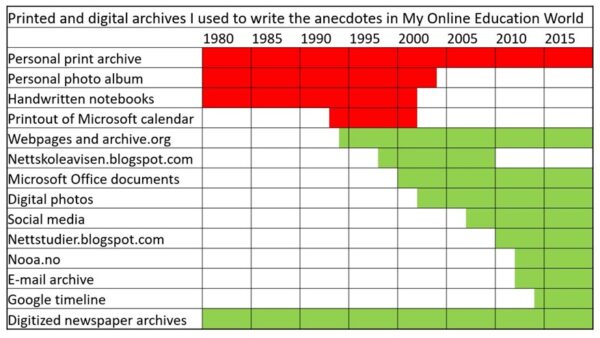
Download the books
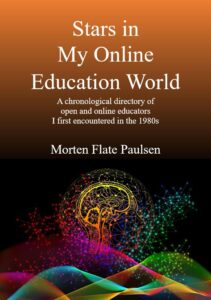 |
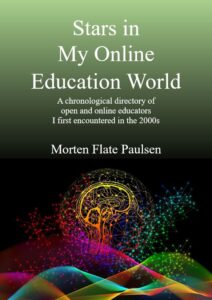 |
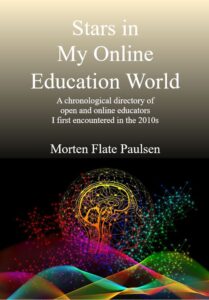 |
|
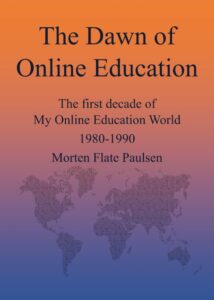 |
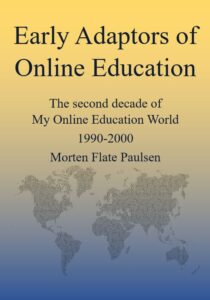 |
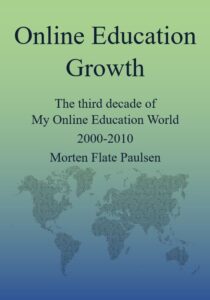 |
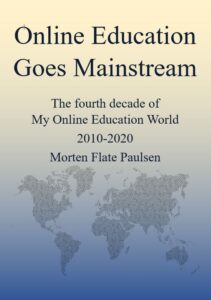 |
The 1980s: The Dawn of Online Education
The first version of the pioneering 1980 anecdotes were chronicled during 2020
Reflections on 2020 and the 1980s
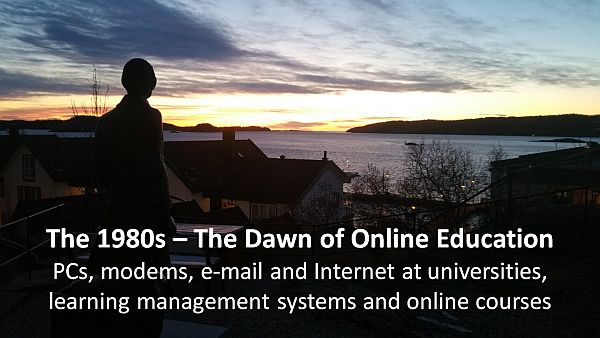
My symbolic photography at the Kragerø location Edvard Munch painted his monumental work «The Sun»
The 1980s. The decade that irrevocably hurled me into many unforeseen adult opportunities and challenges. The decade that indeed changed a modest Norway towards a more self-conscious, open, and rich country. Defining technology developments that spurred a paradigm shift in distance education. So remarkable to sum up the decade realizing that a century has passed since my father was born. Reading worrying news about the pandemic, US developments and brexit at the end of 2020. The warmest year on record in Norway. A year that certainly will define the years to come.
Transforming distance education
In 1980, distance education was synonymous with correspondence courses, educational radio and television. It was the dawn of the online education era. The eighties totally transformed our perception of distance education. Paradigm shift was a frequently used term. The main driver of the development was new technology: PCs, modems and learning management systems. In retrospect, low capacity technology without graphic and colour interfaces. But a technology upholding Moore’s law by doubling processing and storage capacity every second year foreshadowed the ability to process digital sound and video. The term ICT was introduced for Information and Communication Technology. The Internet infrastructure reached some universities, a few pioneers started to exchange e-mail and the first online courses were introduced.
The second half of the decade introduced a remarkable era for online education in Norway. The first learning management systems and online courses were developed. The World Conference for Distance Education was hosted by the Norwegian Association for Distance Education at the University of Oslo. The International Council for Open and Distance Education (ICDE) opened its permanent secretariat in Oslo. Developments that very much defined my online education world.
US developments
In the eighties, I was one of many Norwegians who viewed the US as the land of opportunities. The land of technology innovations and ICT entrepreneurs like Steve Jobs and Bill Gates. Scientific excellence, NASA, high tech companies, incredible new software, reliable news, impressive athletics, superb movies and music we loved. A country I toured extensively as a tourist and visited several times to learn more about technology and online education. My homeland for two years as a doctoral student and graduate assistant at the American Center for the Study of Distance Education.
In 2020, it is devastating to see the latest development in the US. School shootings. The opioid crisis. The growing political divide. The echo chambers and conspiracy theories flourishing in social media. Twitter’s and Facebook’s decisions to flag or hide fraudulent and harmful posts from President Trump. His chaotic presidency attacking decency, allies, science, media, elections and the legal system. The frightening mismanagement of the corona pandemic.
Digital and analogue virus
The first time I was approached and quoted by a national daily newspaper (Arbeiderbladet) as an expert was in November 1988. They wanted to know if we could be infected – by computer virus? I had no idea about the dangers that loomed ahead.
The COVID-19 pandemic that defined 2020 and changed most people’s lives. Took nearly two million lives in nine months. Isolated us from family and friends. Thought many to work from home. Shut down businesses, sports and culture activities.
Isolating and working from the island Øya in the small Norwegian town of Kragerø, I enjoyed renovating our old house and researching my online education archives. Realized that print was more durable than my outdated floppy disks from the 1980s. Found it very challenging to meet family and assist next of kin with dire need for help and medical care. Stoped hugging and shaking hands. It was the first year of my adult life I did not travel abroad. The ICDE, EDEN and OEB conferences I used to attend went virtual. The Tokyo summer Olympics was postponed for at least a year.
The only concert I attended was hosted by Kragerø Rotary in the backyard of restaurant Tollboden. A concert with one of the world’s bestselling crime writers. A Norwegian author translated into 50 languages. Vocalist and songwriter for the Norwegian rock band Di Derre. I was not surprised Jo Nesbø is an excellent storyteller. But his stage anecdotes and song lyrics maybe better than his novels. Unfortunately, so hard to appreciate if you don’t speak Norwegian.
But challenging times spur innovations. Performing artists staged virtual events. Bands and orchestras started playing virtually together from several locations. Athletics introduced digital lights (pace setters) instead of human rabbits to chase records. E-sport saw new opportunities. Magnus Carlsen, the incredible Norwegian World Chess Champion transformed chess with his virtual chess tournaments.
Schools saved by online education
The pandemic suddenly closed most Norwegian schools and universities and prompted them to substitute traditional teaching with online education. For a while online education was the standard and face to face education the exception. I was privileged to work for NooA, a completely online school with no need for offices and classrooms. Fortunate to receive a fair share of the extraordinary funding to online education that the Norwegian government made available for people who were laid off or furloughed because of the pandemic.
Many institutions and teachers made an impressive effort to go online and even the most ardent antagonists of ICT realised that online education could work. Many noteworthy initiatives promoted and shared resources, experiences, and advice from established online education communities. Many course providers decided to substitute their face to face seminars with free webinars. A fine offer in times of crisis, but hardly a sustainable solution.
Access to PCs and modems was the greatest obstacle for online education in the 1980s. I wonder why access to online education technology does not seem to be an issue in Norway anymore. Is it really so that all kids and adults in Norway now have access to PCs and Internet?
Finally, most of the new online education activities seem to replicate classroom teaching. Teams, Skype and Zoom suddenly became omnipresent communication tools, but too many people started to believe that online education is equivalent with webinars. A perception that disregards decades of experience and so many of the innovative online education developments that are addressed in the first decade of my online education chronicle.
«The Computer Age and the Modern Internet: Even though internet-type signals had been transmitted from school to school in decades past, the 1980’s are the birth years of modern internet. Before this era, the internet — and online education with it — were just research experiments. The vision for the internet was primarily based in university computer labs. But online education does find its earliest entrants in the 1980’s with the first online college courses and online degrees as distance education embraces the idea of online learning. During this era, the internet reaches Europe and Asia. Infrastructure is laid down, providing for faster and more expansive internet operations and effectively opening the door for the total commercial and popular permeation of web use in the decade that would immediately follow». (David Ferrer’s introductions to the 1980s in The History of Online Education)
Some useful resources:
- Computer History Timeline
- The History of Online Education
- Wikipedia: History of Virtual Learning Environments
Helge Høivik’s Khrono reflections in Norwegian https://khrono.no/2020-blir-vannskillet-i-norsk-e-laering/472944
1980 - Graduating for Online Education?
Student Life
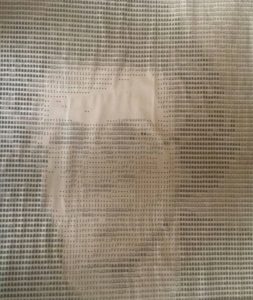 In 1980, I graduated from the Norwegian Institute of Technology (NTH, now NTNU) in Trondheim as a shy, introvert, mediocre but diligent student. I remember we were 180 electro students in the class, but only one female. The awkward lecturer who spent two hours on the blackboard not able to solve his own mathematical assignment. The often arrogant, sometimes brilliant and always rabid professor Jens Glad Balchen who many years later was commemorated on the tail wing of a Norwegian Air Shuttle.
In 1980, I graduated from the Norwegian Institute of Technology (NTH, now NTNU) in Trondheim as a shy, introvert, mediocre but diligent student. I remember we were 180 electro students in the class, but only one female. The awkward lecturer who spent two hours on the blackboard not able to solve his own mathematical assignment. The often arrogant, sometimes brilliant and always rabid professor Jens Glad Balchen who many years later was commemorated on the tail wing of a Norwegian Air Shuttle.
I saw my first microprocessors and fibre optic cables. Got a print out of my first digital photograpy. We learned Fortran programming in front of a punch card machine. Delivered stacks of cards at the counter for compilation and picked up all the error messages the next morning.
Most students substituted their manual slide rules with calculators from Texas Instruments and Hewlett Packard. I had the HP 21 which could be programmed with 49 command lines, just enough for my friend Bjørn Bakken and my younger brother Frode to simulate five dices to play Yahtzee.
Long distance calls to Oslo were expensive and the telephone charges were also higher during work hours. So, every Monday at 17.00, my father called me at my landlord Fru Hagen’s telephone.
To add extra income to the student loan, I worked during vacations at the Norwegian state telecom (Televerket) and the minicomputer company Norsk Data. At Televerket we measured how many bits per second (300-4800) we could offer to future customers who would transfer data with modems over ordinary telephone lines. At Norsk Data we worked with the SIBAS database software.
US Road Trip
Leaving Trondheim, I never ever imagined that I would return as a professor of online education. I had few plans for the future. So, I embarked on a summer journey with my childhood friend and 1975-76 Interrail companion Atle Gunnari. Three countries in two months: USA, Graceland and Disneyland. We travelled from New York via Dallas, Las Vegas, Tijuana and Hawaii to Seattle when Jimmy Carter was President. Hiked Grand Canyon all the way down to Colorado River and up again in one day. Visited Pearl Harbour. Spent some days in a Santa Cruz collective after we met Anna and Paula. Do they remember the Volkswagen van excursion with Kim and her hippie friend? The excursion that culminated with his bamboo and coconut concert up in the huge redwood tree? Later, on the Greyhound bus, we realized that we needed to find San Francisco’s cheapest hotel room. It turned out to be in a gay hotel on Market street. I wanted to visit Silicon Valley, but to my astonishment none of the locals had heard about this epicentre of ICT.
On July 22 we were on the road towards Seattle when Mount St. Helen erupted with destructive force. The sky was dark with smoke and the bus driver used the windshield wipers to see through the ashes coming down from the sky.
My Mycron thesis
Returning home, I bought a NOK 35 000 one-room apartment at Ammerud in Oslo. There, I applied to have a landline telephone and was lucky enough to get one after a few months. I bought Pink Floyd’s 1979 LP The Wall and played We don’t need no education repeatedly in stereo on my gramophone. In the fall, I started working with my master thesis at the microcomputer company Mycron. It was headed by the serial entrepreneur Lars Monrad Krohn who I interviewed for educational TV in 1989.
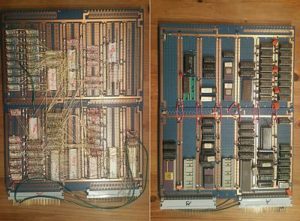
As part of my thesis work, I designed and built the depicted central processing unit (CPU) for a microcomputer with the Intel 8086 microprocessor and 8087 co-processor. The thesis was written with the very early word processor Mytekst (developed for Mycron by Haakon Wiig) and stored on an eight-inch floppy disk.
Among many successful colleagues in Mycron were Terje Tinglum and Ingar Rune Steinsland who developed CPM 86 together with Gary Kildall. We all expected it would be the operating system for the planned IBM PC. Arild Haraldsen wrote about this in his Norwegian article Den sanne historien om PCens historie (The true history of the PC).
1981 - Working with Microcomputers
Mycron work
After finishing my master thesis at Mycron, I continued to work there for six months as a hardware engineer. The company’s future looked bright, so unfortunately, I bought the company shares we were offered as employees. How could I foresee the impact of MS-DOS and the 1981 introduction of the Osborne 1 portable computer and the IBM PC? It was the same year I bought my first home computer. I considered the Sinclair ZX80, but chose the Commodore VIC 20 which foreshadowed the very successful Commodore 64. I later added a cassette tape recorder to store programs and learned to program in Basic.
Analyses and acquisition of shares are often more successful in hindsight as this short clip from my 1989 interview with Bill Gates indicates:
Looking back, I realize that many of Norway’s most talented ICT personalities started their careers in Mycron. Just to mention a few I remember working with: Vigleik Eide, Monica Nøkleby and Ivar Andersen. Stein Bergsmark has been active in the climate debate and Gro Jørgensen cofounded Tiki Data for the school market and started CyberBook – a company that provides online learning resources.
In the Navy
In the summer, I was called to do my military service in the Norwegian Navy. It started with three weeks boot camp at Madla in Stavanger. Fortunately, I was soon transferred to SMK (Sjømilitære korps) – the Navy’s vocational boarding school in Horten. There, I spent one of my best years as a quartermaster and teacher along with my university classmates Olav Stokke, Bjørn Hopland, Christopher Lund and John Harald Bergheim. Brynjulf Freberg was a frequent visitor at the old military villa we shared at Karljohansvern. As quartermasters we had privileged access to house cleaning maids, windsurf boards and sailing boats. But we worked bloody hard as teachers and duty officers.
As duty officers during weekends, we were responsible for the nearly 200 students at the military boarding school. This was especially tough when they returned from the local discos and pubs. Often hard to wake them up the morning after they received their monthly payment. But we learned that they respected and cared about us – because we cared about them.
I fondly remember my 24th birthday. When I showed up in the classroom, it was decorated with petunia flowers in five half-litre beer mugs. Respectively stolen from the school’s flower bed and the local pub. At lunch, about 200 male and 10 female students sang happy birthday in the cafeteria.
With no teaching experiences, I was thrown into teaching mathematics, chemistry and electronics. The students were nearly my age and not very motivated to learn theory. So, I soon realized that we needed some action in class. Chemistry became more interesting with explosive demonstrations and electronic lab sessions were more fun when we grilled hotdogs at 230 volts, injecting electric cords in each end. We learned that the sausages were very well done when the fuses cut. It probably went too far when I ignited a leftover military thunderflash in the teacher room during lunch break.
The school had a number of Swedish ABC 80 microcomputers and we were able to connect them in a local area network (LAN). I expect it was one of the very first LANs in Norwegian schools. On this we developed our very first online education application. A competitive arithmetic game, where the students tried to solve as many assignments as possible in a limited time period. It became very popular and the competition to be on the top ten list was fierce.
If not on duty, I went to Oslo during weekends with my first car, an old Renault 5. We installed a car computer and attached sensors to measure the flow of gas and rotation speed of the wheels so that the computer could show the current and the average gas consumption and speed of the car. Le Renault did not like steep hills, but gave a special feeling of freedom.
Freedom of choice was however not abundant in the Norwegian society. In December, Minister of Culture Lars Roar Langslet announced a list of providers that were accepted for testing local radio and television broadcasting. It ended the Norwegian state broadcasting monopoly.
1982 - Gaining Teaching Experiences
1982 – Gaining Teaching Experiences
SMK highlights
The SMK officers often met in the large living room of our villa to socialize or watch a VHS video. We served beer from the bar and called the private soldiers on duty when we needed more wood for the fireplace. Frequent discussion topic among the naval officers were Prime Minister Margaret Thatcher and the Falkland war between England and Argentina. It started when Argentina occupied the Falkland Islands in April and ended in June when the Argentine forces surrendered.
It was a special day. King Olav V visited SMK. We were all lined up in navy uniforms and the King took time to inspect and greet everyone. My body hurt from lined up immobility. My soul was pleased with the royal handshake.
The open day for the local community and student families started with the traditional ceremony of hoisting the Norwegian flag. Maybe Thomas was among the students in the parade. At least his parents and handsome older sister were watching.
After two years of schooling, Thomas and the other SMK students continued with two year military training at the Haakonsvern naval base near Bergen. As their teachers, we got a military flight to a guided tour of the base and the submarines. I was not intrigued by travelling anywhere by submarine, but inspired by the opportunity to hop on free empty seats on military flights to northern Norway. Christoffer Lund and I used the opportunity to seek the midnight sun and visited Tromsø and Bodø during summer vacation.
At the end of the school year, my military service as a teacher ended. The students celebrated it traditionally by throwing their teachers, wearing quartermaster uniforms, into the cold Oslo fjord. It changed my interpretation of the word wetsuit.
NKI
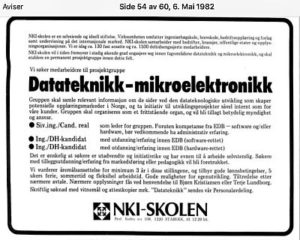
In the spring, I applied for a position at the Norwegian correspondence school NKI that was announced in Aftenposten as shown in the figure. September 1st, after a successful job interview with Solveig Grepperud, I started as head of a project group which should investigate and develop new educational initiatives related to computer technology.
NKI produced a lot of written course material for their correspondence students and had a typewriter pool of women who typed from dictaphones and handwritten manuscripts.
One of the benefits was that the job came with affordable rent to one of the ten apartments NKI predisposed in Limsteinveien near Bekkestua in the outskirts of Oslo.
My Arab Stunt
NKI had international ambitions through ownership in ISOT – the International School of Technology. One of several ISOT-projects was a training programme in electronics for Syrian and Saudi Arabian engineers. It was part of a development program initiated by the Saudi Presidency of Civil Aviation (PCA) for Saudi technical personnel at the new airport in Jeddah.
As I recall it, Stein Tore Jenssen called me on a Friday to tell that the coming week’s teacher had withdrawn. Could I please step in and teach them PDP 11 assembly programming – in English. He argued that, since I knew some English and some assembly programming and had the whole weekend to prepare, there was no way I could decline. It was tough, but I made it. After a while, I appreciated that Stein Tore dared me to push my limits.
BBC Microcomputers
In the summer, NKI bought 400 BBC microcomputers for educational purposes. The BBC Micro was developed by Acorn for the BBC Computer Literacy Project which also included educational TV programs, textbooks and software. NKI’s intention was to use the computers for its computer courses and to get a foothold in the Norwegian school market. This effort was not especially successful since Tiki Data and IBM took over the school market.
I was however fortunate to use the BBC micro and the additional resources for personal learning and some classroom ICT courses that I developed and taught for banks and insurance companies. I learned assembly programming with the computers popular microprocessor 6502 and published a compendium with program examples and exercises.
1983 - Establishing Norway's first private ICT College
ICT Courses for Companies and Organizations
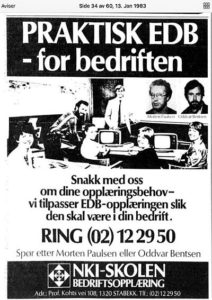 It was a general need for more ICT competence in the work force and we organized a number of short courses for business and organizations in the Oslo area. I used to teach many of these courses.
It was a general need for more ICT competence in the work force and we organized a number of short courses for business and organizations in the Oslo area. I used to teach many of these courses.
The picture shows an advertisement from Aftenposten in January including several of my NKI colleges. It also includes the BBC micros, black and white TV -monitors and cassette recorders we used in the courses.
Carnival in Brazil and Norway
In February, my neighbour and friend Arthur Knutzen invited me to the Carnival in Rio de Janeiro. He worked for the Scandinavian Airlines and had access to affordable flights. He snail mailed postcards to numerous friends whenever he travelled and always packed the Oslo telephone directory to easily find their addresses.
It was an unbelievable week of experiences. We enjoyed body surfing and getting distracted and mugged by topless girls at Copacabana. We ran from shooting in the crowds outside Maracãna stadium and rode a yellow Volkswagen Beetle taxi with an exploding tire in a tunnel towards Corcovado. Most memorable were however the penetrating samba rhythms that heated up a frozen Norwegian. The experiences started a lifelong fascination with Brazil – a country that ever since has a special place in my heart.
Back in Norway, I met Marith from Molde town at a party in Petter Tjelle’s neighbour apartment in Limsteinveien. We started jogging together, ran Oslo Marathon inspired by the two legendary, female Norwegian runners Grete Waitz and Ingrid Kristiansen. We also attended the first out of three Oslo Carnivals. Unfortunately, the cheerful but unrestrained carnival crowds did too much damage to establish a sustainable carnival tradition in Norway.
ICT Summer Schools
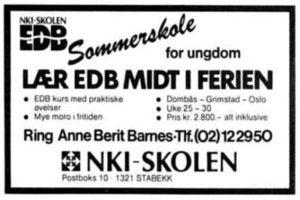
Aftenposten May 20, 1983
In the spring, I initiated EDB Sommerskole. It was a series of weeklong courses for youth and some adults who wanted to learn programming in BASIC with the BBC microcomputers. This was a newsworthy initiative which was announced in and covered by both national and local newspapers.
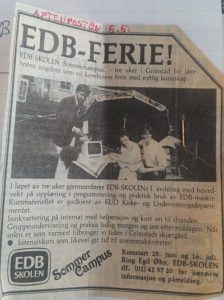 Our competitors, EDB skolen, organized their three week Summer Campus in Grimstad. I guess serial entrepreneur Jan Sollid Storehaug regrets that they started one week later than us.
Our competitors, EDB skolen, organized their three week Summer Campus in Grimstad. I guess serial entrepreneur Jan Sollid Storehaug regrets that they started one week later than us.
I engaged my brother Frode to help me with the summer school. We filled a Ford Transit with computers and monitors to arrange courses at Panorama Summer Hotel in Oslo, Dombås Youth Hostel and Skagerak Vacation House in Grimstad.
We had much fun with barbecues, bonfires and windsurfing. But I will never again agree to have 24/7 responsibility for teaching and social activities for youth on vacation away from their parents.
NKI Datahøgskolen – Norway’s first private ICT College
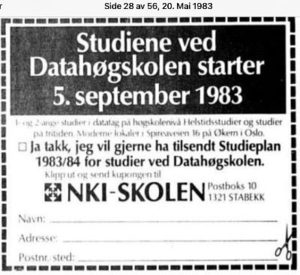 NKI Distance Education decided to establish NKI Datahøgskolen as a private ICT college in 1983. The first three employees were Bjørn Kristiansen, Oddvar Bentsen and me who already worked at NKI. We found a factory building at Grenseveien 107 in Oslo which we transformed into a school building with auditoriums, class rooms and 60 terminals for our HP 3000 mini computer. I vividly recall that I used shuffle and wheelbarrow to clear the basement from crushed bricks and dirt to make room for the minicomputer. Appropriate work for a hardware engineer.
NKI Distance Education decided to establish NKI Datahøgskolen as a private ICT college in 1983. The first three employees were Bjørn Kristiansen, Oddvar Bentsen and me who already worked at NKI. We found a factory building at Grenseveien 107 in Oslo which we transformed into a school building with auditoriums, class rooms and 60 terminals for our HP 3000 mini computer. I vividly recall that I used shuffle and wheelbarrow to clear the basement from crushed bricks and dirt to make room for the minicomputer. Appropriate work for a hardware engineer.
When the first 60 full-time and 120 part-time students enrolled in September, the college was still partly a construction site. We had employed Hege Bjarkholm, Lilllian Askautrud, Einar Sandvik and Mona Sætrang in the administration and a number of part time teachers with experience from the ICT-field. Agnar Nilsen was engaged as ICT Manager to take care of the HP 3000 computer system which was used for COBOL programming and word processing with HP SLATE which the students often called HP LATE.
The students were motivated, challenging and nearly my age. We were a young team with much more enthusiasm than experience. We learned how hard and rewarding it was to be entrepreneurs. And how difficult it was to establish a private college that challenged the public college system. However, without this enthusiastic team, the college would not exist.
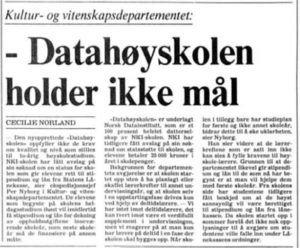 The toughest shock came when the Ministry of Culture and Science declined our application to join the scheme for public student loans. When the news broke, I remember welcoming the TV news reporter Audgunn Oltedal from NRK Dagsrevyen. She retorted «I’m not here to be nice». However, Tore Krogdahl argued well on behalf of NKI on Dagsrevyen – the most watched News program on Norwegian television. Aftenposten, the leading Norwegian newspaper, broke the negative news on November 24, 1983.
The toughest shock came when the Ministry of Culture and Science declined our application to join the scheme for public student loans. When the news broke, I remember welcoming the TV news reporter Audgunn Oltedal from NRK Dagsrevyen. She retorted «I’m not here to be nice». However, Tore Krogdahl argued well on behalf of NKI on Dagsrevyen – the most watched News program on Norwegian television. Aftenposten, the leading Norwegian newspaper, broke the negative news on November 24, 1983.
We called an open meeting for all students who expected to receive student loans. Standing in front of more than 100 hostile students in a stuffed auditorium was not pleasant, but we negotiated an agreement with bank that offered our students loans on similar terms as they would get in public colleges. The tension abated and I still have many fond memories of the first students at Datahøgskolen.
1984 - Changing Perspectives on Life
Else Rigmor Paulsen
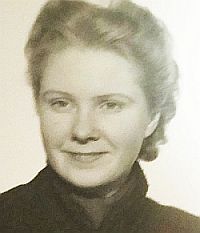
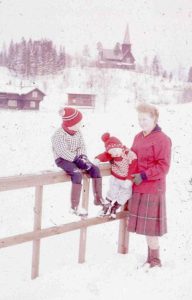 Our dear mother, Else Rigmor Paulsen (born Bådstøe), died in February of cancer at the age of 52. She was a mild tempered and careful mother and wife. She met father when they both worked at the Osram office at Drammensveien 35 in Oslo. They married in 1956 and moved to an apartment in Eiksveien 51 in Bærum. When I was close to two years old, they moved to a three room apartment in Flyveien 15 in Luftforsvarets byggelag. I still remember when she came up the stairs in 1961 with my baby brother Frode.
Our dear mother, Else Rigmor Paulsen (born Bådstøe), died in February of cancer at the age of 52. She was a mild tempered and careful mother and wife. She met father when they both worked at the Osram office at Drammensveien 35 in Oslo. They married in 1956 and moved to an apartment in Eiksveien 51 in Bærum. When I was close to two years old, they moved to a three room apartment in Flyveien 15 in Luftforsvarets byggelag. I still remember when she came up the stairs in 1961 with my baby brother Frode.
I was not much older the first time she took us to her uncle and I saw all his ski trophies. I was not that impressed by the six much smaller brownish medals. At the time, I was not old enough to realize that Johan Grøttumsbråten was history’s most winning Winter Olympian with six Olympic medals, three of them in gold.
Mother was a housewife who took care of her two sons from Snippen day care, Huseby primary school and Peersbråten secondary school until we left home to study at NTH in Trondheim. She was artistic, played violin with Bjølsen pikeorkester and Kringkastingsorkesteret, listened to Roger Whittaker on her cassette player and decorated our mountain cabin near Gålå with rosemaling.
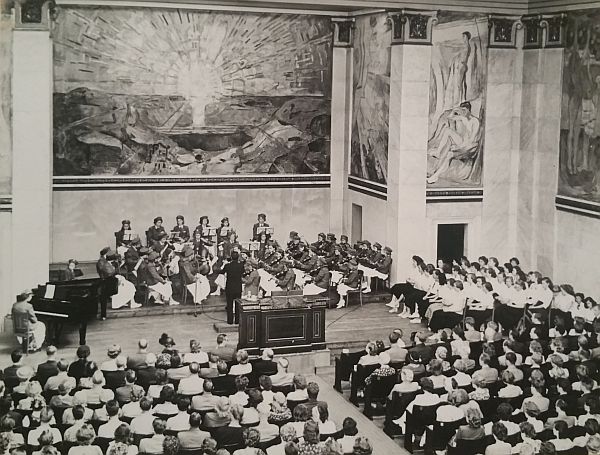
Picture: Mom plays first violin for Bjølsen school orchestra at the University of Oslo in front of Edvard Munch’s famous painting of the sunrise in Kragerø.
Her world was different than ours. It was without computers. She was abroad only once – to attend her sister Lill’s wedding with Uncle Arne in Copenhagen. Altogether, her radio and TV-channel options were four.
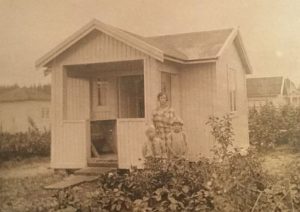
In various ways, «Mutter’n» preserved raspberries, red currants, blackberries and gooseberries in the summer. Cherries, apples, pears and plums in the fall. It was incredible how much fruit, berries and flowers we got from the tiny garden colony lot at Sogn Hagekoloni. It was established around 1920 by Fire Chief Ole Paulsen at Hegdehaugen Fire Station. He was «Fattern’s» father and the garden colony provided welcome food resources when Oslo was occupied during the second world war.
The picture shows Dad, aunt Marit and grandma Hilda Sofie, Sogn Hagekoloni ca. 1925.
Much of the berries we picked were frozen for the winter. At that time, few people had private freezers, so we rented access to a cold storage in the basement of an apartment building at Majorstua. I still remember how creepy it was to go down there to fetch frozen berries, pork or reindeer meat from the dressed carcases the adults sometimes bought from farmers and prepared in our kitchen.
Many of my fond memories of mother is associated with weekend visits to her parents’ apartment near Sagene Church (where I was baptised) and the summer house in Ekornveien at Nesodden.
The HÅG Chair
Mother’s cousin Mary was married to Håkon Granlund who became a good friend of my father. After mother died, he took my father on a European road trip which obviously was a welcome distraction and experience.
Håkon was an energetic and innovative entrepreneur who started HÅG, an office chair company named after his initials. I remember visiting his impressing Røros Mansion and private fishing dam at Rørosvidda. HÅG soon became a cornerstone factory at the Unesco World Heritage mining town of Røros. The town became the shooting venue of many movie pictures with strong women. Pippi Longstockings, An-Magritt featuring Liv Ullmann and Ibsen’s Dollhouse with Jane Fonda as Nora. Håkon proudly told that Jane rented his Røros mansion as her residence during the filming in 1973.
I also recall several enjoyable days with Håkon, Mary and their children Erik and Nina at their summer house at Lake Tyrifjorden. It was close to the island of Utøya, the location of the July 22 massacre in 2011. Håkon had built a private fishing dam at Rørosvidda were he farmed some trout and built a log cabin. In 1970, it was dismantled and transported on a huge truck to Gålå where it was rebuilt as our mountain cabin.
Erling S. Andersen
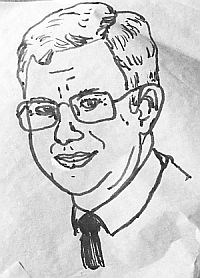
My old drawing of Erling S.
In April, NKI was fortunate to engage Erling S. Andersen as Rector for Datahøgskolen. His challenge was to develop Datahøgskolen into a credible and respected institution. He immediately started to recruit a number of good academic staff members. Dag-Arne Hoberg was probably the first. Later came my good colleagues Johan Havnen, Andreas Quale, Vidar Keul, Tom Sørensen and Knut W. Hansson. The efforts soon payed off and in July we got the news that our students could apply for student loans.
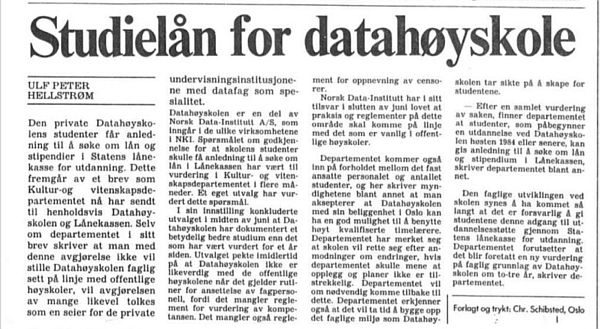
Aftenposten July 3, 1984
Finally, Silicon Valley
In July, Erling took Dag-Arne and me to New York where we dined with Phil Dorn (a regular contributor to the Nordic computer journal Data which Erling edited), the National Computer Conference in Las Vegas and Hewlett Packard’s Palo Alto headquarter in Silicon Valley. I started to realize that Erling was an excellent and very inspirational boss.
The Norwegian Computer Society
Erling was an active member of the Norwegian Computer Society (Den norske dataforening – DND) and editor for its Nordic magazine Data. As chair of the organization from 1985 to 1987, he had regular opinion articles about ICT in Norway’s leading newspaper Aftenposten. He encouraged me to join DND, and I learned much from taking part in the Scandinavian NordData conferences and DND’s working group on data communication. I also enjoyed a vantage point since the long serving Secretary General Kåre Gunnari was father of my best friend. One of the early DND chairs, Haakon Branæs, was a close friend of my father.
School mergers
NKI Datahøgskolen is not well known as a brand name anymore, but the impact of our pioneer work can be better understood through the institution’s mergers and name changes:
- 1983 – NKI Datahøgskolen
- 1993 – NHI Datahøgskolen after merging with Norges Høyskole for Informasjonsteknologi NHI when NKI acquired NæringsAkademiet
- 1995 – Den Polytekniske Høgskolen after merging with NKI Ingeniørhøgskolen
- 2002 – Norges Informasjonsteknologiske Høgskole (NITH) as a result of more strategic focus on ICT
- 2014 – Westerdals – Oslo School of Art, Communication and Technology after a merger with Westerdals. Both schools were owned by ABNU.
- 2017 – Campus Kristiania after a it was acquired by Campus Kristiania
1985 - Discovering Modems and Electronic Bulletin Boards
Return to Rio
In February, Arthur and I celebrated carnival in Rio for the second time. He still teases me for not reaching the top of the Sugar Loaf. But a Copacabana girl offered to teach me samba at a local carnival party. I did not speak much Portuguese, but she understood that I was blown away by her appearance when I picked her up at her grandmother’s modest apartment. My beautiful Brazilian date was dressed in a minimal carnival costume and sparkled all over her body with golden glitter. We danced all night. I forgot how little samba and Portuguese I knew.
Unfortunately, I was food poisoned the day before we returned home. It was still allowed to smoke in the back of trans-Atlantic flights. Boarding long, international flights cramped with abdominal pains next to a smoking area is not recommended.
Academic Encouragement
Erling S. Andersen encouraged me to pursue an academic career. Write articles, give presentations, enrol in relevant courses and join Dataforeningen – the Norwegian Computer Society. At Datahøgskolen, he wanted me to teach introduction to computer science, project management, data communications and operation systems. Therefore, he sent me to a week-long data communication course in Stockholm in March, a data communication seminar in Kristiansand in June and a Unix fair in Stockholm in October.
In addition, I taught introductory courses in computer science at BI – the Norwegian School of Management.
Computer Magazines
The proliferation of computers paved the way for several computer Magazines in Norway. I read them all. Contributed frequently with articles, interviews and suggestions. Datatid was introduced as a magazine for ICT professionals in 1978. PC World Norge was established in 1984. Dataforeningen distributed the newsletter DND-nytt to its members. For many years, I read Computerworld Norway every Friday.
It was a kick to see my first article «Tall blir bilder» in PC World Norge. An encouragement to reach out and make a difference.
Datakilden AS
I’ve always had an entrepreneurial bone. So, in November, I established the limited company Datakilden AS. At that time, Norwegian entrepreneurs had to invest NOK 100 000 into shares in a new limited company. Nearly the cost of a new car. In 2020 it is much easier. Only NOK 30 000, the prize of an electric bike, is required.
The company income came primarily from the writing and teaching activities I did on top of my full-time work. In hindsight, Datakilden gave welcome additional income, sometimes too much work, but definitely useful business experiences. In 2006, I dissolved the company because I gradually focused more on international activities.
The Pager
My father’s health started to worry us, so I bought a pager (personsøker) he could ping when he wanted me to call. It was a mobile pocket device which sole function was to receive the telephone number of the person who wanted you to call back. It was introduced as a public service in 1984 and terminated in 2003. Obsoleted by omnipresent mobile phones.
Marathon Records
The Norwegian female athlete Ingrid Kristiansen broke the world records for 10 000 meters (30.59.42) and Marathon (2.21.06). My personal marathon record was also improved. However, I realize that Ingrid could run her marathon, go to a movie theatre and still welcome me at the finish line.
Oddvar Bentsen
Our students at Datahøgskolen thrived and became attractive for the job market, much because of Oddvar Bentsen. He knew all students by name and always had quick, friendly and personal comments to them. Something I later found very important in online teaching.
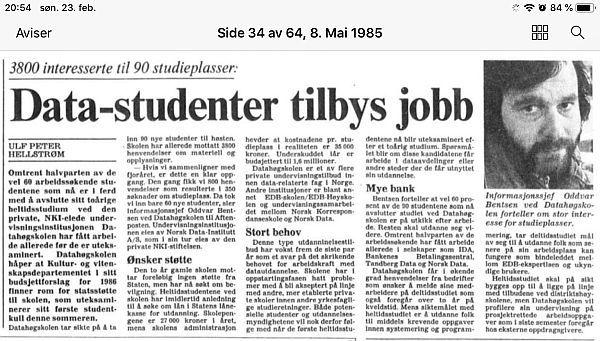
Aftenposten May 8, 1985.
Oddvar was the practitioner who implemented Erling S. Andersen’s strategies, ideas and wishes. Together they were dynamite. He worked long hours and presented himself as the janitor when he answered the school phone in the evenings.
Oddvar continuously tried to quit smoking. One of his defunct attempts was to put his cigarettes in a cover envelope addressed to himself in the morning. Then he spent the whole day waiting for the company truck to return with the mail in the afternoon. Good for him that e-mail was not yet available.
Oddvar was missed by all students and colleagues at Datahøgskolen when he died at the age of 55 in July 2004.
PC-LAN and Software
Datahøgskolen engaged Scanvest Ring Nettverkssystemer to install its first Local Area Network (LAN) for PCs. Among the first software applications on the LAN were WordPerfect, Lotus123, Turbo Pascal, Dbase II, GrafDoc and the accounting software Saga Regnskap.
I still recall how Helge Kjeilen and Øystein Moan crawled under our desks to install the network servers, cables and PC cards to get the network up and running. In 1986 they founded Cinet and in 1997 Øystein became the CEO of Visma which has become a large international ICT company.
Our NKI colleagues in Norsk DataInstitutt opened a store downtown Oslo to sell PC equipment and software. It was no commercial success, but it gave us access to all the new PC-software that entered the market. I was really thrilled by the ground-breaking opportunities provided by a deluge of new software. I read user manuals as others read poetry. Even wrote a compendium about Software for microcomputers.
No doubt that this was a technological revolution, the beginning of a new era.
Moving up the road
We moved up the road on September 9. Purchased a house with four bedrooms. A garden with cherries, apples, pears and plums. The same house where we first met in 1983. Our modest belongings were carried from the one-bedroom apartment we rented across the road in Limsteinveien.
Following the Parliament election on radio the same evening, we realized that Kåre Willoch would continue as Prime Minister in Norway. His ambitions to dissolve governmental monopolies and regulations would continue. During his government, Norway had already become a much more open and rich country fuelled by the increasing oil economy. Norway’s national esteem was improving. We were proud when Norway for the first time won the European Song Contest with Bobbysocks’ Let it Swing. Amazed when the Norwegian band A-ha reached the top Billboard Hot 100 in the US. Optimistic when Lillehammer applied to host the 1994 Winter Olympics.
Online Bulletin Boards and Modems
As microcomputers and modems became more available, a few enthusiasts started to set up Bulletin Board Systems at their private computers, enabled people to dial in with modems, exchange software and take part in online discussion forums. Among the most renown pioneers in Norway were Bergen By Byte and Odd de Presno’s Saltrød Horror Show. It was also interesting to follow FidoNet which emerged as an international network of PCs running BBS server software.
I was intrigued by the BBS systems’ potential and bought myself a 300 bit per second modem for Christmas. This was definitely a turning point in my career, because I understood that computers and data communication were the future of distance education. I also realized that I could make a difference since I worked at a computer college in a private school with much competence in distance education.
1986 - Designing the first LMS for distance education
On the Soviet Border
In March we celebrated Ragnhild and Atle’s wedding in Kirkenes and used the opportunity to visit the border between Norway and the Soviet Union at Grense Jakobselv. This was during the cold war and many Norwegians had served in the military to protect the area from the Soviets. Mikhail Gorbatsjov had recently become general secretary of the Communist Party, but many Norwegians felt threatened by the communists and their nuclear arsenal.
Just a few weeks later, on April 26, we experienced the biggest nuclear accident ever when a reactor at the Chernobyl nuclear power plant failed. The Soviet authorities did not report the accident, and Norwegian researchers measured unexplained increases in radioactivity. Norwegian mushrooms, berries, moss, meat from sheep, reindeer and other game contained large amounts of radioactivity after the accident.
Norddata in Stockholm
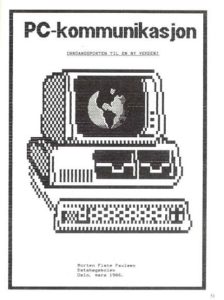 The first NordData conference was organized in Helsinki in 1968. Every year the conference was passed on to the next Nordic country in line. In June, I attended my first NordData conference in Stockholm with NKI’s ICT manager Ragnar Andersen. The presentation I prepared was titled PC-communication – The gateway to a new world. It was an enthusiastic account of my explorations of various bulletin board systems using my PC, modem and communication software.
The first NordData conference was organized in Helsinki in 1968. Every year the conference was passed on to the next Nordic country in line. In June, I attended my first NordData conference in Stockholm with NKI’s ICT manager Ragnar Andersen. The presentation I prepared was titled PC-communication – The gateway to a new world. It was an enthusiastic account of my explorations of various bulletin board systems using my PC, modem and communication software.
At the conference, I met several Norwegian pundits who I still admire: Arild Haraldsen, Peter Hidas and Helge Seip. I also met Jacob Palme. The man behind PortaCom developed at the Stockholm University Computing Center. A system for computer mediated communication (CMC) that Kjell Åge Bringsrud and Dag Belsnes introduced me to when it was tested at the University of Oslo.
Gro Harlem Brundtland had just started her second period as Norwegian Prime Minister and the Swedes were still in chock after the murder of Prime Minister Olof Palme on February 28. Christer Petersson was later arrested and convicted of the murder but acquitted after being in prison for about 5 months. Palme’s killer is still unknown.
Sweden. Norway’s closest neighbour. Twice our population. The richer and bigger brother we left in 1905. The arrogant best friend we always wanted to trounce. A small country with international ambitions and influential leaders. Dag Hammarskjöld, the second Secretary-General of the UN. Alfred Nobel and Olof Palme.
Growing up, I spent much time in the back of Volvos and SAABs. Read Astrid Lindgren. Saw Bjørn Borg play tennis and Ingemark Stenmark excel in slalom. Listened to ABBA and watched a lot of Swedish television. Heavily influenced by Swedish culture.
Looking back, Norway’s fascination and inferiority with Sweden has gradually decreased. Globalization has opened our eyes to a variety of cultures. Oil richness and growing successes in international affairs, music, literature and sports have gradually improved our national self-esteem. I think it is fair to say that Norwegians now perceive Swedes more as friends and partners than big brothers.
The EKKO Learning Management System
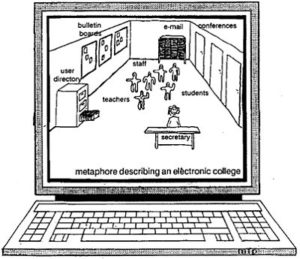
Inspired by my experiences with PortaCom and the PC-based Bulletin Board Systems, I suggested in February that NKI should start to offer online education. In April, NKI’s board provided funding for the project.
So, I came up with specifications for an electronic college designed for distance education. Termed it EKKO. Meaning echo in Norwegian – an awkward acronym for EleKtronisk KOmbinertundervisning. The figure shows the metaphor I draw to explain the online college concept.
The very first version of EKKO was developed in the spring of 1986 by Bjørn Mobæk and Lars Hornfeldt who were students at the NKI College of Engineering. They developed EKKO in the programming language Pascal on an HP-3000 computer, as part of their final project in the summer of 1986.
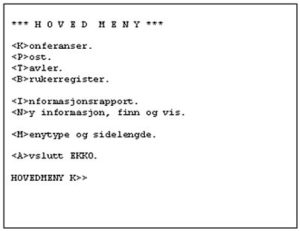
EKKO was first used in addition to ordinary face-to-face teaching by students at Datahøgskolen (the NKI Computer College) in the fall of 1986. I remember I posted the notes from my lectures and the assignments on EKKO’s bulletin boards. Urged the students to discuss the assignments in EKKO’s discussion forums. Asked them to deliver their assignment work via EKKO’s e-mail.
To my delight, it worked and the students were positive to the experiment.
During the developing process, my research revealed two more intriguing projects. The EIES project lead by Murray Turoff and Starr Roxanne Hilz at New Jersey Institute of Technology and the CoSy project at the University of Guelp in Canada.
A 1989 video explanation of EKKO
ERM – the Educational Resistance Movement
Change is not easy. Advocating innovation could be hard. As a pioneer, I have fought relentlessly for decades to convince educators about the benefits of online education. Luckily, challenging fights can result in sweet victories. Monica Johannesen likes to remind me how our ICT educated colleagues first reacted when I suggested that we could communicate by e-mail in EKKO. EMAIL??? No way, our offices are so close!
It took a few years to get acceptance from ICT people. Decades to convince correspondence teachers and classroom teachers.
Summer in Florida and IBM’s Boca Raton Factory
Summer vacation in Florida. Disney World. Fourth of July in Fort Lauderdale. Driving down to Key West. Cruise from Miami to Bahamas with Scandinavian Sun. A party boat with young Americans having Bloody Mary drinks for breakfast. Swimming pool competitions. How many ping-pong balls could the girls keep in their bikinis? Scarily similar to its sister ship Scandinavian Star. The ship that was set on fire in 1990 on its way from Oslo to Fredrikshavn in Denmark. 159 people died in the Scandinavian tragedy.
I was eager to visit the IBM factory that produced the new IBM PC AT. It was however harder than expected because of the many IBM PC clones that had appeared. IBM would not share their secrets with foreigners. I was however granted access after several telephone calls and arguments that I would write an article for PC World Norway.
I appreciated the opportunity to visit the factory, but must admit that it was much more low tech than I expected. Just a few people assembling standard components. I realized why there were so many successful IBM clones. Strange enough, I still remember how the workers were wired with cords to not damage the computer circuits with electric sparks.
TeleTension in Budapest
From October 17th to 27th, I attended TeleTeaching 86 in Budapest with my colleague Andreas Quale. This was my first visit to an Eastern European country and the situation felt tens when people gathered in the streets 30 years after the Soviet occupation started October 23, 1956.
The conference was organized by the John von Neumann Society for Computing Sciences and sponsored by IFIP TC3. The conference theme was: Remote Education and Informatics», and I remember meeting Fred Mulder from the Open University of the Netherlands and Sylvia Charp – editor of T.H.E. Journal. She encouraged me to submit an article to her journal and I was thrilled to see In Search of a Virtual School published in the Dec/Jan 87/88 issue.
The conference hosts organized a sightseeing tour to Lake Balaton. Halfway there, the bus driver realized that we would arrive after dark and not see anything of interest. So, he took a highway U-turn and stopped at a local taverna. Good local food was improvised along with plenty to drink. Most of the participants were challenged to sing typical songs from their home countries. I guess we all have fond memories of Lake Balaton.
The Correspondence Student
NKI was one of Norway’s largest correspondence schools and I wanted to build on these experiences in my online teaching. I therefore enrolled in the correspondence course: «Essentials in Distance Education». The course was offered by the European Home Study Council and taught by the internationally renowned expert and former ICDE President Börje Holmberg. My excitement was immense when I after a couple of weeks received the snail mail envelope with his feedback to my assignments. My disappointment was huge when I realized that I was not able to read his handwriting.
It was my first and only correspondence course. The course that taught me that distance education was ready for an online paradigm shift.
1987 - Teaching Norway's first distance students online
From Correspondence to Distance Education
In January, EADTU was established. The European Association of Distance Teaching Universities. Eleven founding members had an ambition to become a platform for collaboration with the European Commission. The five European Open Universities and several national organisations. Among them were the Norwegian Association of Distance Education (NADE, now Fleksibel utdanning Norge). The founding meeting was organized by the Open University of the Netherlands in Herleen. Erling Ljoså attended as chair of NADE. He elaborates on this in Norwegian in his personal account about international engagements and cooperation.
At the same time became aware of two more institutions that later became important to me. The International Council for Correspondence Education (ICCE) was established in 1938 and changed name to ICDE in 1982. The Association of European Correspondence Schools (AECS) was established in 1985 and changed name in 1999 to EADL – the European Association for Distance Learning.
NordData 87 in Trondheim
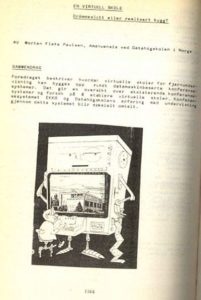 In June 1987, I attended the NordData conference at NTH. The University of Technology in Trondheim. My alma mater. The University of professor Asbjørn Rolstadås. The town of educational innovators like Jan Wibe, Arvid Staupe, Per Borgersen and Thorleif Hjeltnes. People who were instrumental in establishing TISIP in December 1985. Later pivotal in the development of the NITOL network and the Learning Management System Winix.
In June 1987, I attended the NordData conference at NTH. The University of Technology in Trondheim. My alma mater. The University of professor Asbjørn Rolstadås. The town of educational innovators like Jan Wibe, Arvid Staupe, Per Borgersen and Thorleif Hjeltnes. People who were instrumental in establishing TISIP in December 1985. Later pivotal in the development of the NITOL network and the Learning Management System Winix.
The title of my presentation could be translated to «A Virtual School – Dream Castle or Real Construct?» It included an international overview of computer conferencing systems and some references to educational use of the systems. In addition, it presented our educational experiences with the EKKO system.
The conclusion could be translated to: Some institutions work to develop virtual schools based on computer mediated communication systems. There is still need for improved quality of content, pedagogy, administrative and social services. But the work has started. My conclusion is therefore that virtual schools are no longer dream castles, they are becoming real constructs.
Stian Flate Friisvold
Stian was born in April. When the water broke, we immediately saw that it was miscoloured. Marith was rushed away to the operating theatre, I commanded to wait outside. Extremely nervous. Don’t ask how long I waited, but the relieve was enormous when everything was fine with mother and son.
CD-players had been available in Norway since 1983. We bought the first one to entertain Stian. Torbjørn Egner was among our favourites. The Norwegian playwright, songwriter and illustrator known for his narratives for children. But «Stius» also got his dose of Aha, David Bowie, Bruce Springsteen, Stones and Beatles.
I’m not a singer, but all parents should sing, read and play music for their kids. We did it a lot and enjoyed it tremendously. The kid easily learned more melodies and lyrics than I could imagine – a gift we both appreciate.
Mom used her marathon skills pushing his stroller for hours. As she did as a young girl with the kids in her Molde neighbourhood. Dad pulled him in a ski sledge. As a real Norwegian, Stian should learn to enjoy the outdoor life.
A new generation. So many opportunities. His first six months’ bucket list was fuller than my first twelve years’ list. He travelled from Havna to Hagen. One month old, he joined us at the two-day data communication seminar at Havna hotel in May. Took part in the evening boat trip around the beautiful Tjøme archipelago. Six months old in September, he flew with us to Düsseldorf where we rented a car to see the Rihne valley. Köhln, Köngswinter and Baden Baden. Including a visit to Deutsche FernUniversität in Hagen.
One early memory stuck: A sunny summer morning. Father and son playing under the cherry three in front of our house. Sun shining, son smiling. The happiest moment so far in my life.
My epitomic memory of 1987. My new-born son in my father’s wheelchair lap. Joy and sadness. Preparing to become Pater Familias.
On Top of the World Trade Center
In August Torstein Rekkedal, Bjørn Mobæk and I made a study tour to exchange experiences with the pioneers of online education in the US and Canada. We started with a Sunday in New York. Jogging in Central Park in the morning, then suppressing my fear of heights from the roof of the World Trade Center.
Just a couple of months earlier, West German Mathias Rust landed on the Red Square in Moscow with a Cessna aircraft. We were surprised that a foreigner so easily could navigate a plane into the heart of a superpower.
Visiting the Online Education Pioneers
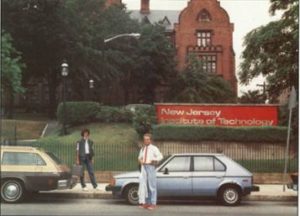
Star struck to meet Starr Roxanne Hiltz and Murray Turoff in their office at the New Jersey Institute of Technology. Husband and wife who were known for their ground-breaking work with Computer Mediated Communication (CMC) and the EIES computer conferencing system. Got hold of the 1982 book Starr Roxanne Hiltz wrote with Elaine B. Kerr: Computer-mediated Communication Systems – Status and Evaluation.
We met Peter Haratonic at the Manhattan office of the New School for Social Research. He told us about their experiences with the EIES system. About their collaboration with Paul Levinson and his company ConnectEd.
Angela Richards and Cristine Languth welcomed us at a Long Island institution with the ambitious name American Open University.
Considered to visit Andrew Feenberg at the Western Behavioral Sciences Institute. They offered the first online college program through its School of Management and Strategic Studies in 1981. But decided to stay on the east coast. So, we rented a car and visited Michael G. More at Pennsylvania State University. A choice that later proved to be very important for me.
We stopped to see Niagara Falls. Drove up to Canada and visited Robert J. McQueen who worked with the CoSy conferencing system at the University of Guelph. The system that the Open University in UK later chose. Got the documentation from the First Guelph Symposium on Computer Mediated Communication.
We also visited Linda Harasim at the Ontario Institute of Studies in Education (OISE) and learned about her pioneer work. Her work with collaborative learning and with online discourse analysis. Her 1986 book: Educational Applications of Computer Networks.
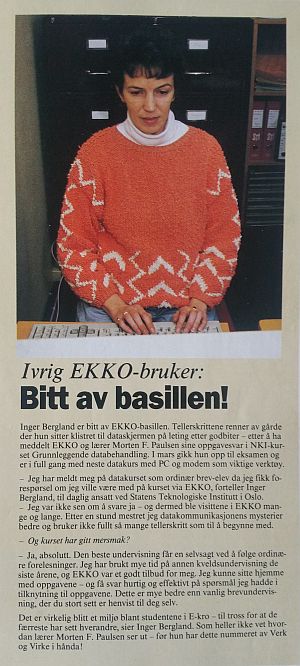 Teaching Distance Students Online
Teaching Distance Students Online
I continued to use EKKO as an online teaching supplement in all the on-campus courses i taught in 1987. Our Interns Ragnar Børsum and Bjørn Myrvold were enthusiastic supporters. In the spring we installed a modem pool to handle dial in connections to EKKO. Suddenly I could use EKKO to communicate from home with my students in their dorms. We were ready for online distance education.
So, in the fall we contacted some of the students who enrolled in NKI’s correspondence course Introduction to computer science. Four of them accepted to become our first online students with me as their online teacher.
The first challenge was to help them set up their modems and connect to EKKO. We succeeded together and proved that it was possible to use EKKO for distance education. One student completed all six study units and did well on the final voluntary exam. One completed, but did not enrol for the exam. One completed five of the six study units. One completed only the first study unit.
I concluded that technical support was crucial for online education and that we needed more students to create a social environment on line.
The picture shows an interview with Inger Bergland in the second 1988 issue of Verk og Virke. She was one of the four pioneer students in Norway’s first distance education online course.
The Devestating Disease
Henry Louis Gehrig was a renowned American baseball player who, on his 36th birthday, received a diagnose that many still know as Gehrig’s disease. More known as Amyotrophic Lateral Sclerosis (ALS). A devastating disease that causes the death of neurons controlling voluntary muscles. Gradually reducing muscular strength over muscles we control. Arms, legs, hands, fingers and tongue. The lungs can be attached to a ventilator. The heart continues to beat, since it is not a muscle we control. Brain, ears and eyes are less affected. Advance technology make it possible to communicate through eye movements.
The Swedish TV-journalist Ulla-Carin Lindquist wrote the touching little book «Ro uten årer«. A book about life and death written after she was diagnosed on her 50th anniversary. The Norwegian novelist Axel Jensen struggled with ALS for ten years before he died in 2003.
In November, our dear father Jon Flate Paulsen died from ALS at the age of 67.
Jon Flate Paulsen
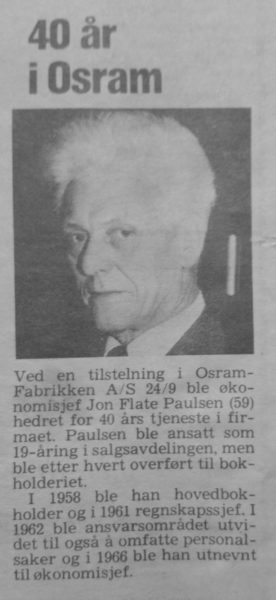
Unknown publication from 1979
Dad’s father grew up at the tenant’s farm Flaten near Børsa in Sør-Trøndelag. That’s the origin of the middle name I have passed on to my children. Flate. A name I was not comfortable with as a kid since some people used “Fy Flate” as an acceptable substitute for a harsher curse. A name I first embraced when I started to pursue an academic career.
Dad’s mother’s family was from Harpefoss in the Gudbrandsdalen valley. A tiny place with a beautiful name. Harp Falls – the sound of River Lågen when it passed through the narrow river canyon. The Iversen family guarded the railroad gates and rails when the railroad was prolonged from Eidsvoll to Otta in 1896. According to my father, one of his relatives was killed when he tried to save his dresin from a passing train.
Dad had fond childhood memories from Harpefoss and the mountains in the area. We often visited his cousins and mother’s twin sister there. In 1970 we celebrate his 50th anniversary at the local guesthouse Grøntuva were he happily signed the property contract for the mountain plot «Måsåplassen». The home of our log cabin at Gålå.
Dad was intelligent, but not handy. When the motor of our first car, a white SAAB 96, died in the Majorstukrysset cross road, Mom carefully asked: Why don’t you open the hood and take a look at the engine? He typically retorted: Do you think it helps?
Dad finished the obligatory seven years of education at Majorstua Folkeskole, continued with four years Middelskole at Vestheim and one year office training at the Oslo Kommunale Handelsskole. Then, the second world war started.
He worked most of his life for the Osram light bulb factory. That’s probably why he introduced me to the exciting book about Thomas Alva Edison and his inventions. It probably inspired me to look for innovations and study engineering. One of many books I read as a child about famous people in the series titled «Elite serien».
I remember Dad as a wise, humorous and upright man who smoked South State cigarettes and taught us to be diligent and behave well. He was early grey. I can only recall him as white-haired. In hindsight, I understand that he looked for and supported activities that could improve his oldest son’s low self-esteem. He probably saw a little, shy boy who ran fast when scared. So, Dad wisely steered me into athletics.
Bislett Stadium
For many years, Dad took me to Bislett stadium to watch the yearly international athletics competition. I still recall Terje Pedersen’s javelin flying through the 1964 evening air – – – reaching the incredible 91.72 meters new world record. Ron Clarke’s 28-minute breaking 10 000-meter world record (27.39.4) in 1965. We witnessed many of the two dozen world records at Bislett Stadium. Lots of good memories with Norwegian role models and world stars like Sebastian Coe, Steve Ovet, Steve Cram, Henry Rono, Usain Bolt, Ingrid Kristiansen and Grete Waitz. All announced by the omnipresent speaker Jan Hemsvik. With the same steady voice that numerous times pronounced my name over the loudspeaker when I took part in local competitions for kids at Frogner, Jordal and Bislett stadium.
Dad encouraged me to train athletics. For many years we were permanent fixtures at the athletics season’s closing week competitions at Bislett. Dad as driver and bystander, Hemsvik as Speaker and myself trying all the athletic activities.
My talent was primarily in 60- and 100-meter sprint. I trained with the several capable sprinters in the athletics club Ready. Tom Bysveen, Henrik Gjertsen, Sverre Tysland and Leif Næss. And Knut Marius Stokke who were four-time Norwegian champion in 100- and 200-meter sprint. It was not easy to receive the baton from him when I ran the final leg of the 4×100 meter relay.
1988 - Attending ICDE's World Conference in Oslo
Studying and Teaching at Connect Ed
In the winter of 87/88, I took part in the online three-credit course Computer Conferencing in Business and Education. One of several courses offered through the EIES conferencing system by Connect Ed. Paul Levinson, the company manager, was teacher. His partner Tina Vozick handled all course administration. The course had eight study units, each scheduled for a week. Each study unit was introduced by Paul. He explained which part of the curriculum the study unit focused on and introduced some topics for discussion. He motivated the students and moderated the discussions. Students who took active part in the discussions and submitted a final course report received a course certificate.
Søren Nipper from Denmark was one of 15 students in my class. One interesting EIES feature was that we could list the names of the students that were on line. I remember feeling part of an important new movement the Saturday night we were only three students online: Muhammad, Jesus and myself.
In the summer semester, Connect Ed offered four online courses. Paul Levinson taught Issues in International Telecommunication. Partly from his home office in New York city and partly from his «electronic cottage» at Cape Cod – with three guests experts: Jerry Glenn, Terrence Wright and me. So, my first international online teaching experience was about telecommunication events and trends in the Scandinavian countries.
More of my experiences from the course is available in this Facebook post.
.
Free Online Education
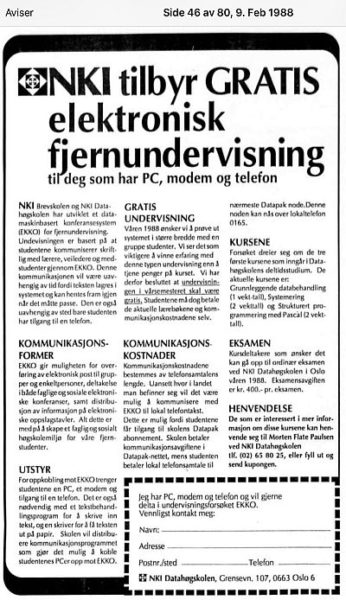
Aftenposten, February 9, 1988.
In order to gain experience with more students, we decided to offer three online courses for free in the spring. Introduction to computer science, Pascal programming and System analysis. Together these courses were equivalent to the first semester of the part-time study program we offered to on-campus students at Datahøgskolen. Altogether 57 course enrolments and 35 course completions in the spring.
The article in the picture is from NKI-Perspektiv nr. 2, 1988. It shows some of the first online students and their three pioneer teachers: Rolf Ingebrigtsen, me and Lars Eskeland.
The experiences from the spring courses were so positive that NKI offered the same three courses with tuition fees in the fall. We also added the two courses introduction to business administration and Cobol programming. In addition, we continued to develop a conference named E-KRO (Electronic Cafe) as a social meeting place for prospective students, enrolled students, tutors and staff.
The courses were offered with fixed start-up dates and paced progression to establish a community feeling and support communication between students. Several of my colleagues were skeptical. They argued that we should allow students to decide when they wanted to start and how fast they should progress through the course.
We had two public telephone lines for 300 bit per second modems and two for autodetection of 1200 and 2400 bit per seconds. Six Datapak channels allowed students to access EKKO via local nodes that provided cheaper communication.
The experiences from our online education courses are well documented in both Norwegian and English. They became a wonderful source for research, projects, articles, paper presentations, reports and books. Fortunately, I had the opportunity to learn from and work with Torstein Rekkedal in this process. His international contacts and reputation opened a lot of doors for me.
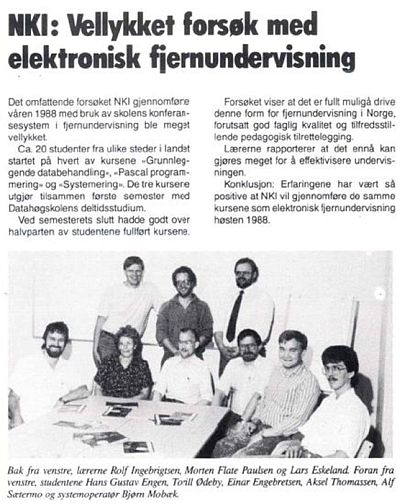
Datakomm 88 in Oslo
In February, DND’s Special Interest Group on data communication arranged the conference Datakomm 88 in Oslo. I was on the planning committee with Lasse Berntsen, Kjell Åge Bringsrud, Knut Smaaland and others. I had a presentation on distance education and data communication. There, I met Bengt Olsen who presented a paper on computer conferencing and PortaCom.
The AECS Conference in Istanbul
In April the Association of European Correspondence Schools (AECS – later EADL) conference was arranged in Istanbul. The most populous city in Europe. A third of the population on the Asian side of the Bosporus. My first intriguing taste of Asia.
Torstein Rekkedal gave a keynote presentation titled Computer Conferencing in the NKI Distance Education System. Together with a number of Norwegian delegates, I was amazed by the Grand Bazaar, the Topkapi Palace and Harem, the Blue Mosque and the Hagia Sophia.
My memories of belly dancing and pictures from the One Thousand and One Nights costumes dinner are precious. Erling Ljoså, Dagny Blom and Morten Søby were colourful representatives from NKS. Tormod Carlsen dressed as a sheik. Berit Johnsen and Tove Kristiansen were princesses. Tony Kaye encouraged me to come to OUUK’s conference on computer conferencing in the fall.
NordData 88 in Helsinki
The annual NordData conference was organized in Helsinki in June. Finland, a Nordic country drawn between east and west. Still in the shadow of the Soviet Union. Urho Kekkonen had been president for my entire life until Mauno Koivisto took over in 1982.
We booked the night train from Oslo to Stockholm. Waiting for the ferry boat to Helsinki, we walked around the old city centre Gamla Stan with Stian in a stroller. The one-year-old boy whimpered more and more, so we went to the emergency reception at Stockholms Akutten.
Mother and son flew back to Oslo with a hernia. Father continued on the ferry boat passing the beautiful archipelagos in Stockholm and Helsinki. To give a presentation titled «Experiences with computermediated communication systems in distance education».
The presentation focused on our work with the EKKO system and concluded: We have experienced that computermediated conferencing (CMC) systems provide new opportunities in distance education. We have discovered challenges that need to be addressed and teaching methods that work. Our work show that CMC systems can offer and administrate pedagogical and social college environments. We believe CMC systems will be central in future distance education.
The visit reminded me of my first trip abroad. In May 1971, a couple of hundred kids from the four Nordic capitals met in Helsinki to take part in the twenty third Competitions in Athletics and Soccer. Travelling by night train from Oslo to Stockholm. With my school mates Anne Søby and Tom Bysveen. Along with Tom Inge Ørner, Torgeir Skogseth and Bjørn Gundersen. Holding my breath during take-off. My very first flight took me from Stockholm to Helsinki.
Fond memories of being hosted by the Öhman family in Kantelevägen. Luckily, they belonged to the Swedish speaking community, since the Scandinavian languages have much more in common with English than Finnish. The only Finnish word I could say to them was kiitos – which is takk in Norwegian and thank you in English.
The ICDE World Conference
In 1988, ICDE – the International Council for Open and Distance Education celebrated its 50th anniversary. And the 14th ICDE World Conference was held at the University of Oslo in August. 700 participants from 60 countries. Arranged by Norsk Forbund for Fjernundervisning – the Norwegian Association for Distance Education. The organization in which Erling Ljoså was president, Reidar Roll and Turid Widerø worked.
I was there, giving a presentation titled Computer Conferencing in Distance Education: Experiences with the implementation of computer conferencing in distance education. More spectacular was our attempt to erect the world largest tower cake at Henie Onstad art centre.
Flipping through the old conference proceeding, I was surprised to see so many familiar names. Scholars whose research I have studied carefully. Colleagues I have enjoyed meeting and exchanging experiences with. Among the them who have influenced my online education world are: ICDE Presidents Börje Holberg, Sir John Daniel and David Sewart. Greville Rumble, Paul Bacsich, Tony Bates, Liz Burge, Fabio Chacon, Keith Harry, Michael G. Moore, David Murphy, Som Naidu, Jason Ohler, Bruce Scriven and Armando Villaroel.
One of the papers caught my attention. Angela Castro’s introduction started: In the last two years, a small silver platter called the CD-ROM which uses optical storage technology, has made inroads into academic libraries, art galleries and museums. This small disk measuring only 12.5 centimeters, and made from heavily coated polycarbonate plastic which renders it extremely hard, is capable of holding information equivalent to the content of 1,500 floppy disks, or 500 average sized books.
I also found the paper I wrote with Torstein Rekkedal in the proceedings. Computer conferencing: A breakthrough in distance learning or just another technological gadget?
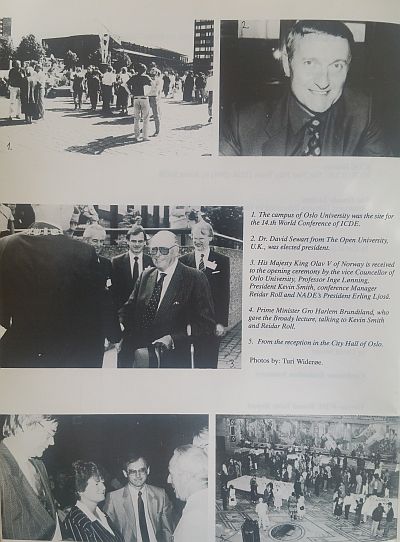
Pictures in ICDE’sReport from the Fourteenth World Conference
ICDE settled in Oslo
The Oslo conference was indeed a breakthrough for ICDE. Our late King Olav V was present along with Norway’s Prime Minister Gro Harlem Brundtland who stated that the Norwegian Government would support a permanent ICDE secretariat in Norway.
Just after the conference, the ICDE secretariat was established in Oslo with Reidar Roll as its first secretary general. Among the employees I remember meeting in the early days of ICDE, was Turi Widerøe who is recognized as the first female pilot in a major airline and Trond Waage who later became Ombudsman for Children in Norway. A few years later, I also met Ana Perona who made important contributions as ICDE’s Assistant Secretary General.
An Electronic University in a Medieval Monastery
Jostein Soland invited me to give a presentation about our online learning experiences at a post conference seminar arranged by Electronic University Norway at the 800 years old monastery Utstein kloster. We arrived by boat from Norway’s oil capital Stavanger and slept in the modest chambers that were used by the monks.
I wanted to make a live demonstration of the NKI Online College in the monastery library were the seminar took place. To do so, I needed to connect my PC-modem to the monastery’s only telephone outlet which was in the main office. Luckily, I found a 20-meter electric cord which could work as a telephone cable extension and climbed outside the meter-thick monastery stone walls to connect my modem to the telephone line. It felt like bridging the medieval time with the computer age. It was also a boost to hear the American guests of honour from EUN were envious of some of our LMS features and impressed by my live demonstration of our online courses.
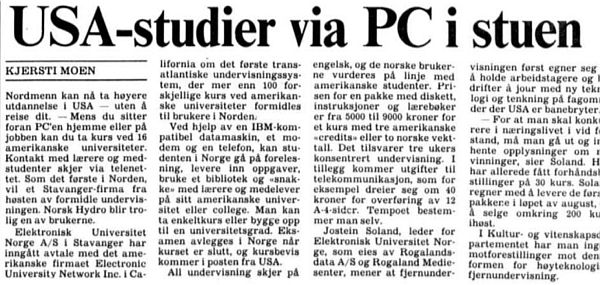
Aftenposten, August 2, 1988
Open University in October
In October, I gave a presentation about my online education experiences at the conference Computer Conferencing in Distance Education at OUUK – the Open University in Milton Keynes. The presentation was titled EKKO – A Virtual School.
At the conference, I learned that OUUK was planning to introduce its first online course based on CoSy in 1989.
It was my first visit to the Open University. Milton Keynes, an impressive university campus. Without students. But plenty of course designers, support staff, esteemed academics and radio and television studios operated in collaboration with BBC. Founded in 1969 by the Labour government under Prime Minister Harold Wilson. A model for many of the open universities that later were established around the world.
Incredible that I later had the honour to attend its 50th anniversary gala dinner with prominent Sir John Daniel, Robert Wilson and David Attenborough.
Paulsen, M. F. 1988. Deltidsstudier i New York – via PC. PC World Norge, 1988(4):62-64.
Paulsen, M. F. and T. Rekkedal. 1988. Computer conferencing: A breakthrough in distance learning or just another technological gadget? In Proceedings of The World Conference of the International Council for Distance Education, 362-365. Oslo, Norway: International Council for Distance Education.
1989 - Directing Educational Television
1989 – Directing Educational Television
Ups and downs
On the international scene, it was disturbing to see the huge student led protests at Tiananmen Square in Beijing. We followed the development from the protests started on April 15 until it was forcibly suppressed on June 4. when the People’s Liberation Army occupied central parts of Beijing.
We were much more excited to see the symbolic fall of the Berlin Wall in November. After several weeks of civil unrest, the East German government sent out a press release on November 9. The travel ban for GDR citizens was lifted and all citizens could visit West Germany and West Berlin. This initiated a wave of optimism for the future of Europe.
Privately, we were really happy as parents and delighted to be pregnant again. Three times in two years. Devastated by three subsequent miscarriages. Uneasy with the prospect that Stian should grow up without siblings.
Online teaching innovations in EKKO
In 1989 the NKI electronic college had nearly 150 course enrolments in six different online courses. The growing number of courses and students made it possible for us to experiment with various teaching approaches as described in the following.
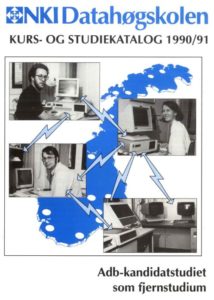 In the Fall 1988 Monica Johannesen taught the Information Systems course. In a conference, she presented a case and assigned each student a role. The case described a company planning to invest in a new computer-based office automation system. The students were assigned roles as users, accounting officer, project manager, labour union representative, etc. Over a period of about fourteen days the students were expected to elucidate the different facets of this project, as reflected through the different roles.
In the Fall 1988 Monica Johannesen taught the Information Systems course. In a conference, she presented a case and assigned each student a role. The case described a company planning to invest in a new computer-based office automation system. The students were assigned roles as users, accounting officer, project manager, labour union representative, etc. Over a period of about fourteen days the students were expected to elucidate the different facets of this project, as reflected through the different roles.
Ragnar Børsum taught the Pascal and Cobol programming courses every semester since the Fall of 1988. In the Pascal course, the students programmed in Turbo Pascal on their home PC. The program source code was posted to the instructor or shared with the other students in the conferencing system. In this way the teacher and the students could download the program codes, change them if they desired, and execute them on their local computers. In the Cobol course he experimented with letting the students access the host computer’s Cobol compiler. This was bothersome, but it worked. The important lesson was, however, that distant students could access host computer applications such as compilers, database systems, statistics software, etc.
Henny Lindland used the EKKO online multiple-choice database we developed as a part of the Introduction to Computer Science course, for the first time in the Fall 1989. The students could download multiple-choice questions, spend some time to figure out the answers, and then upload their suggestions and let the database score them.
Moste
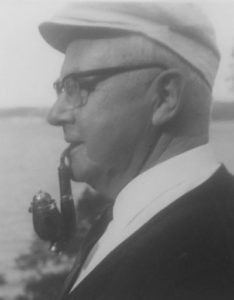 All children and grandchildren in the family called him Moste. The nick name coming out of my toddler mouth when my parents urged me to say Morfar (mother’s father).
All children and grandchildren in the family called him Moste. The nick name coming out of my toddler mouth when my parents urged me to say Morfar (mother’s father).
I adored him and missed him a lot when he passed away at the age of 93 in May. He made up scary fairy tales about trolls, showed us the cave they lived in and explained that trolls only appeared at night because they burst in sunshine. A chubby handyman who made bows and arrows from defunct umbrellas and feathered headgear so that we could dress up as Indians. An artist who made furniture and fishing gear with the kids.
As a young electrician, Thoralf Baadstøe worked to connect the houses in the Sørkedalen Valley to the electricity grid. At Grøttumsbråten, he was greeted by Petra Jensine (Pedersdatter) Grøttumsbråten. There, the electric sparks were all around my future grandparents.
As a pensioner, he lived much of the year at the Nesodden summer house. My summer dream. Where I looked up to my older cousins Stein and Dag. Many memories captured in my detailed 1969 drawing. Moste spent hours fishing and smoking his pipe in the tiny rowing boat that fit perfectly around his waist. When the boat capsized, he had to swim ashore with money notes in his pockets – tugging the boat, wearing his cap, looking through his glasses and puffing his pipe.
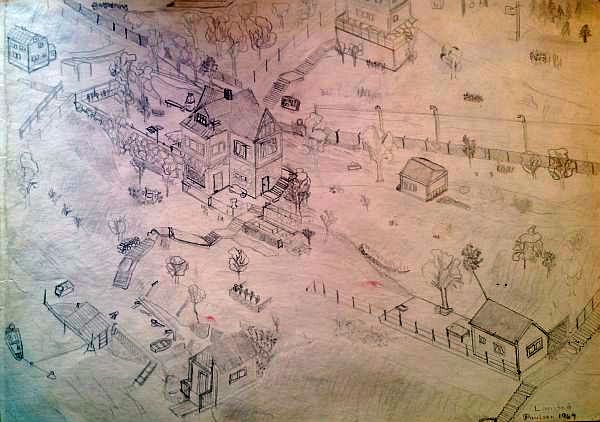
He gradually lost his hearing and it became more and more difficult to communicate with him. His hearing aids were primitive and uncomfortable. So sad for both of us that SMS messages, e-mail and social media communication was not available in his world.
I thought about Moste when I read Norman Coomb’s 1989 article Using CMC to Overcome Physical Disabilities in Mindweave. About online courses with a blind teacher and hearing-impaired students. I realized I wanted to use ICT to make education more available for people with all kinds of social and physical challenges.
Mindweave and Milton Keynes
Back in the United Kingdom. The cultural empire that influenced my generation of Norwegian teenagers immensly. We identified with Rolling Stones or the Beatles. Loved James Bond and Alistair MacLean movies. Watched countless hours of British TV series on the only TV channel available in Norway. Studied British English (and culture) as our first foreign language. When schools cut down from six to five days a week, we often spent Saturday afternoons watching Premier League as passionate supporters of Manchester United, Liverpool or Arsenal.
In May, I returned to Milton Keynes to attend the MTED Workshop. Gave the presentation EKKO – Experiences and learned more about OUUK’s first large-scale online course. Using the Canadian computer conferencing system CoSy they enrolled 1400 students in the world’s first large-scale online course Introduction to ICT and social issues.
As a follow up of the conference I attended in Milton Keynes the year before, Robin Mason and Anthony Kaye introduced the very influential book: Mindweave: Communication, Computers and Distance Education which was published by Pergamon Press in 1989.
I contributed with the paper EKKO: a virtual school and read all 31 contributions with great interest.
Among the other prominent pioneers who contributed to Mindweave were Andrew Feenberg, Paul Levinson, Linda Harasim, Søren Nipper, Lynn Davie, Elaine McCreary, Greville Rumble, Annette Lorentsen, Judith Van Duren, Gary Boyd, Paul Bacsich, Stephen Ehrmann and Norman Coombs.
NordData 89 in Copenhagen
Copenhagen. The capital of Denmark. Arguably the most important city throughout Norway’s history. At least between 1380 and 1814 when our two countries were unified. For many years Copenhagen international airport was my gateway to the world.
Joined my older cousin Stein on my first visit in 1973. Lodged in the fashionable apartment of an elderly couple he knew from his upbringing in the city. Shocked that they drank the bitter liquor Gammel Dansk with Sunday breakfast and ended the meal with cigars.
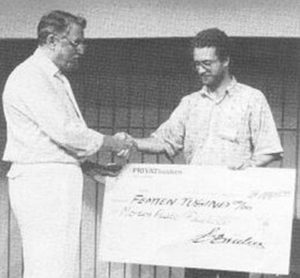
In June, we took the overnight ferry from Oslo to Copenhagen with our two-year-old son. A very recommendable journey along the beautiful Oslo fjord. Passed the narrow strait of Drøbak where two torpedoes from Oscarsborg fortress sank Blücher. The German warship that led a flotilla into the Oslo fjord on the night of April 8th 1940 to seize the Norwegian capital.
Stayed in our friend Sidsel’s Klampenborg apartment just north of Copenhagen. Took the kid to the aquarium and the nice Dyrehavsbakken park nearby. Went to the conference located at the Danish Technical University and enjoyed the jazzparade organized by Leonardo Pedersen’s Jazzkapell on the campus lawn.
Celebrated with a good bottle of wine after I received the Best Presentation Award for Trends in international electronic distance education at the NordData 89 conference. The picture shows the valuable moment when Erik Bruhn, editor of the Nordic journal Data, congratulated me and handed over the prize along with NOK 15.000.
Educational programs on local TV channels
During the 1980s, there was a growing interest in local TV channels distributed via cable TV. More and more households were connected. In 1984, NFL (Norske Fjernsynsselskapers Landsforbund) was established as an association for local TV channels. Most members were local and regional newspapers. Our local channel, ABTV (Asker og Bærum Lokal-TV) was one of the first. Started regular programming around 1986. The channels struggled financially since TV commercials were not allowed in Norway until 1991. They had limited resources to produce in-house content and scarce finances to buy content elsewhere. Many were interested if you could offer free content of general interest.
In this environment, I produced six half-hour TV programmes as supplementary content to NKI’s online course Introduction to ICT. All programs were shown several times on many of the local channels.
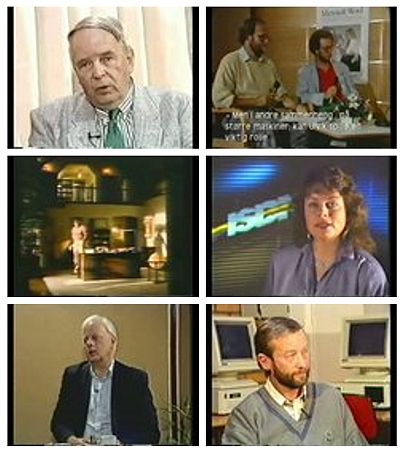
The first programme was initiated by a notice I read in Computerworld Norway. Rumours indicated that Bill Gates should join Microsoft’s delegation at an ICT fair at Info-Rama outside Oslo. So, I phoned Microsoft’s Nordic head quarter in Stockholm and asked if I could book an interview with him for educational TV.
In the second program, I introduced telecommunication trends, ISDN and new value-added services. The program also included a video on ISDN (Integrated Services Digital Network) produced by the Norwegian Telecom and an overview of valueaded services presented by Anders Fongen.
The third video included Torstein Rekkedal, Henny Lindland and myself taking about our online education experiences. The remaining three programs included interviews with Norwegian ICT celebrities.
Helge Seip focused on ICT and privacy issues. He was an influential Norwegian Politician for many years. In 1980 he was appointed as the first director of the Norwegian Data Inspectorate. From 1989 to 1995 he worked as Data Protection Commissioner for the Council of Europe.
Kristen Nygaard concentrated on his work with Ole Johan Dahl when they invented object-oriented programming and developed the programming language Simula in the 1960’s.
Lars Monrad-Krohn talked about microcomputers and his work as a serial ICT entrepreneur. The program also showed Apple’s video Knowledge Navigator which gave an impressive prediction of how personal computing works today.
The 1990s: Early Adaptors of Online Education
The first version of the optimistic 1990 anecdotes were chronicled during 2021
1990 - Embracing opportunities at Penn State
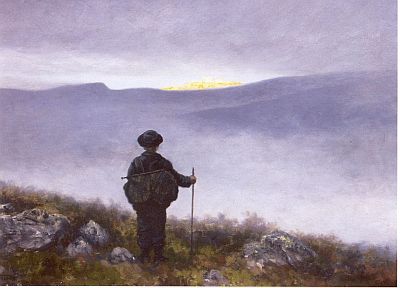
My perception of online education in the 1990s was like this view of Soria Moria Castle. A Norwegian fairy tale about eternal search for happiness. Painted by Theodor Kittelsen born in Kragerø 1857.
The decade that introduced PCs with colour and graphic interfaces, online journals, the web, web-based learning management systems, digital cameras and personal digital assistants (PDAs).
Big changes in Europe. The Nobel Peace Prize 1990 was awarded to Mikhail Gorbachev for his leading role in the radical changes in East-West relations. Glastnost and perestroika. Russia declares independence with Boris Jeltsin as president. Ukraine, Belarus, Bosnia Hercegovina and Armenia follow suit. Vaclav Havel and Lech Walesa are elected presidents in Czechoslovakia and Poland. John Major takes over as Prime Minister in the UK after Margaret Thatcher.
Tim Berners-Lee published the first web site, which described the project itself, in December.
In Norway, SOFF (Sentralorganet for fleksibel læring, changed name to Norgesuniversitetet in 2004) was established to support flexible education initiatives in Norwegian higher education. Gunnar Grepperud was the first director before Jan Atle Toska took over in 1994. Gro Harlem Bruntland becomes Prime Minister for the third time after Jan P. Syse in November. The Scandinavian Star ferry boat was set on fire in April 1990 on its way from Oslo to Fredrikshavn in Denmark. 159 people died in the tragedy. Norway`s largest unsolved murder case in modern times was later documented in a 2020 NRK-TV series.
INDC-90 in Lillehammer
Lillehammer, March 26 – 29. The 3rd International Conference on Information Network and Data Communication (INDC-90). Organized by the International Federation for Information Processing (IFIP) and hosted by the Norwegian Computer Society (DND). As a member of the program committee chaired by Frank Eliassen, I checked in early at the hotel. Got the key, left my suitcase in the room and went to the conference venue. After a full day of conference preparation, I had a few minutes to brush my teeth and change clothes before the informal get together. As soon as I saw the fashionable female garments in my cupboard, I realized that the toothbrush in my hand was red. The reception apologized for having moved me to another room. But I still wonder who I shared the first room and toothbrush with.
The Third Guelph Symposium on Computer Mediated Communication
Celebrated May 17th, the Norwegian Constitution day, in Canada with my Norwegian colleagues Torstein Rekkedal and Morten Søby. Maybe the three foremost proponents of online education in Scandinavia at the time. Travelled via Boston and Toronto to Guelph. Went all the way up the acrophobic glass elevator in CN Tower.
University of Guelph, home of Cosy. My conference presentation was titled «Organizing an electronic college». Morten Søby, who headed the NKS Electronic College project in Norway, focused on «The Postmodern Condition and Distance Education Computer Conferencing and Communicative Competence». My Danish colleagues Hanne Shapiro and Mette Ringsted gave a presentation with Starr Roxanne Hiltz on «Collaborative Teaching in a Virtual Classroom». Other prominent presenters I recall were Lynne Schrum, Norman Coombs, Robin Mason, Trevor Owen, Robert J. McQeen, Terry Anderson, Peter and Trudy Johnson-Lenz, Elain K. McCreary and Barbara Florini.
Embraced opportunity
My generation Norwegians grew up in an environment much influenced by the US and the English language. The Apollo program, Hollywood, Rock Music, Levi’s 501 jeans and NATO bases. An opportunity to experience the American way of life allured me to apply The Royal Norwegian Council for Scientific and Industrial Research (NTNF) for a grant to enrol in a doctoral program abroad.
I considered applying to Penn State and Carnegie Mellon. So, I visited Pittsburgh to see if there were openings for me in Carnegie Mellon’s Andrew Project on computer-aided instruction in distributed computing environment. Returned to Penn State the day Nelson Mandela was released from Robben Island February 11. There, I decided that my best choice was to accept Michel G. Moore’s kind invitation to choose Penn State and the American Center for the Study of Distance Education.
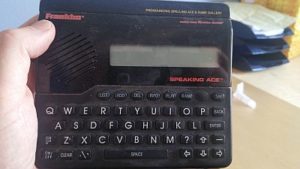 I soon realized that I needed to improve my English and pass the TOEFL and GRE tests. So, I subscribed to the two weekly magazines Time and Newsweek and bought the amazing new electronic gadgets from Franklin with speaking dictionaries and thesauruses. Used the gadgets to look up all unknown words to be familiar with every single word in a complete Magazine. My English writing skills improved considerably when I systematically started to use PC software to check spelling, grammar and readability. These tools were extremely useful for a computer geek with limited proficiency in the English language.
I soon realized that I needed to improve my English and pass the TOEFL and GRE tests. So, I subscribed to the two weekly magazines Time and Newsweek and bought the amazing new electronic gadgets from Franklin with speaking dictionaries and thesauruses. Used the gadgets to look up all unknown words to be familiar with every single word in a complete Magazine. My English writing skills improved considerably when I systematically started to use PC software to check spelling, grammar and readability. These tools were extremely useful for a computer geek with limited proficiency in the English language.
My hardest decision was whether I could afford to leave a full-time job in Norway and finance a family of three as a student in the US. We decided that the NTNF grant was enough as a start. Hoped to find additional income later. Looking back, I had no need to worry. Renting out our house, reduced taxes and some support from my employer in Norway. Reduced tuition fees and monthly payments as a graduate assistant in the US.
What I learned? Embrace opportunities that come your way.
Penn State
We arrived at University Park Airport with six suitcases. Babs and Diane welcomed us and shuttled us to Nittany Lion In.
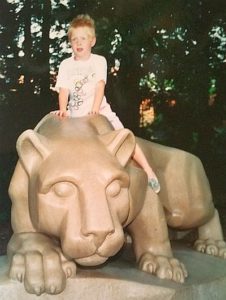
An airport owned by the University in a town named State College. 36 000 students and 12 000 employees out of a 60 000 population. Beaver Football Stadium with 96 000 packed seats whenever Nittany Lions played home matches. Surrounded by farmland. A substantial presence of Amish farms, people, horses and carriages. Devastating to read in the local Centre Daily News about several Amish barn arsons. Amazing to see the collective Amish efforts to rebuild the barns.
The town hierarchy was clear. Three men on the podium. Bronze medal to the Mayor. Silver to the University President. Gold to JoePa. The legendary football coach featured in the TV drama Paterno with Al Pacino as Joe Paterno. A long and impressive career until his disturbing dismissal following the university’s child sex abuse scandal in 2011.
Could only afford to live a week at Nittany Lion Inn. One week to find a place to live, a day care for the three-year-old, wheels and new friends. In totally new environment without internet and mobile phones. We ended up with Heritage Oaks, First Impressions Day Care, a Jeep Cherokee and a lot of good friends from many countries.
I spent nearly $ 3000 on a Compaq LTE notebook computer. Every day I carried it to the university in my backpack. Still based on DOS, it was among the first to include both a built-in hard disk and a 3.5-inch floppy drive. A 4800 bit per second Hayes compatible modem with a built-in fax connected me to the university e-mail and some offices in Norway.
Practicing and Preaching
My first memory of being a student at Penn State was from Professor Kyle Peck’s introductory course in instructional design. He entered the classroom with the unexpected question: What is fun?
To my surprise, the query stirred a very interesting two-hour discussion. My important take away was that American students and teachers were much more engaged in discussion and interaction than I was used to from Norwegian education. I started to ponder: How can we emulate this in online education?
The instructional design course also introduced us to the Apple Macintosh with its revolutionary graphic interface Finder and HyperCard. My first stack used hyperlinks to demonstrate the functionality of the EKKO LMS.
Once a week we had class in the video studio connected to video studios at the Altoona, Eire and Harrisburg Campuses. There, Professor Jovita Ross-Gordon taught an introductory course on adult education with impressive video conferencing skills and technology.
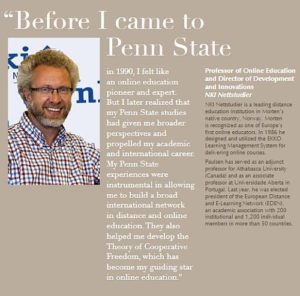
Professor Michael G. Moore’s course International and Comparative Adult Education was a real eye opener. He taught each class from a different campus. Every week students in the four campuses were hooked up with an international expert in a telephone conference. There we had one hour to ask the international guru of the week about their work and the articles they faxed us prior to the conference. Eight guest experts from England, Eastern Germany, Finland, Canada, China, India and Spain. A real motivation to engage in global online education.
Professor Peter S. Cookson was very encouraging and supportive as he prepared for a sabbatical year at the University for Peace in Costa Rica. A year we were fortunate to rent his very nice house in Crabapple Court. A house large enough to sublet rooms downstairs. Wei Runfang stayed there a short while and I still have her 2008 comparative study of China’s Radio and TV Universities and The British Open University. Later we shared the house with my good friend Phil Pinder from Spanish Wells, Bahamas.
The picture presents some reflections about this period when I was featured as alumni in the 2011 issue of Penn State Education Alumni Magazine.
DEOS – The Distance Education Online Symposium
Starting at Penn State in August, I soon got a graduate assistantship at the American Journal of Distance Education. Appreciated to share offices with Margareth Koble and Melody Thompson. The editor, Michael G. Moore, introduced me to the colourful Toni Garcia and challenged us to establish communication services to support the printed journal.
We sat up and tested a CompuServe account (Compuserve: 76436,350) because it was the major commercial online service provider around. However, we soon realized that academics in our field were hard to reach via CompuServe.
Our supportive professor Peter Cookson recommended us to check the automated mailing list management application Listserve developed by Éric Thomas. An appealing freeware managed completely via e-mail messages. Its potential as an online journal dawned on me as I got my first personal e-mail address (MFP101@PSUVM.PSU.EDU) along with all students and employees at Penn State. I soon realized that free e-mail services would revolutionize international communication among academics.
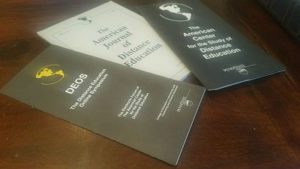 So, we started to develop DEOS – the Distance Education Online Symposium. Much more interactive than printed journals. With more frequent publications. Free of charge since we had no printing and shipping cost. Promoting the printed journal and increasing the number of subscriptions.
So, we started to develop DEOS – the Distance Education Online Symposium. Much more interactive than printed journals. With more frequent publications. Free of charge since we had no printing and shipping cost. Promoting the printed journal and increasing the number of subscriptions.
We approached authors of good contributions that we could not include in the printed journal. Most of them pleased to be published in DEOS. Asked international scholars and pioneers to contribute and received a lot of positive feedback and support.
Wow, I became editor of DEOSNEWS – one of the world’s first online journals. The first issue was published in April 91. A year later, one of the world’s first electronic journals that obtained an International Standard Serial Number (ISSN: 1062-9416).
The ICDE World Conference in Venezuela
In November, we drove down to the Norwegian consulate in Philadelphia to obtain my visa for ICDE’s 15th World Conference in Venezuela. Used the opportunity to see two of the most iconic sites in American history: Liberty Bells and Gettysburg.
Michael G. Moore took his graduate students to arrange the American Center’s ICDE preconference workshop on research in distance education. Phil Pinder, Christopher Clark, Toni Garcia and myself in the Caribbean resort town of Macuto on Venezuela’s north coast. Where we met 50 researchers from six continents. Börje Holmberg, Dan Coldeway, Liz Burge, Fabio Chacon. Wow.
From Macuto we left for the main conference in Caracas – the first ICDE World Conference situated in Latin America. 1300 participants from 60 countries attended the conference at the Universidad Nacional Abierta. The book of abstract was edited by Marian Croft who later became ICDE’s first female president in 1992.
Memories that stuck were the abundance of old, gas-guzzling American cars. The reception at the Norwegian embassy with Torstein Rekkedal, Morten Søby and other invited delegates.
Christmas in the US
Drove to New York City for Christmas shopping and to pick up my brother Frode at the airport. Visited a Pittsburgh exhibition on Santa Claus outfits from around the world. Surprised to see that Norwegians allegedly dressed him up in an unrecognizable, blue costume. But really enjoyed the Bellefonte Victorian Christmas Events and the traditional Swedish Christmas food with professor Sverker Persson’s family on December 24.
Christopher Clark invited us to celebrate Christmas Day with his family. Following Norwegian traditions, I dressed up with polished black shoes, red tie, white shirt and a dark suit. Chris welcomed us in the doorway in his t-shirt, Bermuda-shorts and slippers. We had a big laugh, a quick costume realignment and a wonderful Christmas day with his wife and kids. Remembered the episode with a smile every time we received a Christmas card from the Clarcks.
I really enjoyed playing racket ball with Chris. A local version of squash which I’ve played most of my life. Wanted to meet him again as my guide on the Camino de Santiago when I discovered his free 2020 e-book «Blessings for the Backpack of the Soul».
1991 - Trailing the American dream with DEOS
1991 started dramatically with Soviet soldiers storming the department of defence and the TV-tower in Vilnius to prevent Lithuania’s independence process. Resulting in declarations of independence in Estonia, Latvia, Lithuania, Croatia and Slovenia. The Gulf War started January 17 with a massive U.S.-led air offensive known as Operation Desert Storm.
The same day, Norway’s popular «People’s King» Olav V died 87 years old. For several days Norwegians mourned publicly, lighting hundreds of thousands of candles outside the Royal Palace.
News channels
It was hard to get news from home. In 1991, King Olav V’s death was the only news about Norway in our local News Paper – the Centre Daily Times. We could hardly afford to call long distance to Norway, even though it was thrilling to walk around the house with our new cordless phone.
Luckily, I found out that Computer World Norway had reasonable subscription fees for over sea subscribers in the US. So, I read ICT news from Norway with great interest every time the weekly newspaper arrived.
When the weather conditions were good, we could tune in on short wave radio frequencies to listen to Radio Norway International (1938-2003).
EDEN
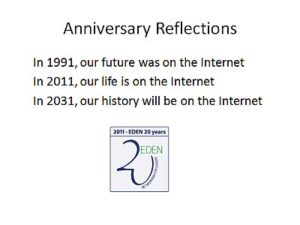
Slide from my 20th anniversary speech
Hungary was in many ways in front of the independence process when the Soviet Union broke down. So, ICDE initiated a European meeting in Budapest in the summer of 1990 to facilitate open education activities across the former Iron Curtain. The initiative instigated the European Distance Education Network (EDEN) which formally was established in Prague in 1991.
With the help of Kerry Mann, EDEN’s Executive Secretary in the UK, I was later able to distribute the first issue of the EDEN newsletter in DEOSNEWS.
According to the newsletter, my Norwegian role model Erling Ljoså was the first president of EDEN. Vice Presidents were Armando Rocha Trindade from Universidade Aberta and Tamas Lajos from the Technical University of Budapest. Executive committee members were John Daniel from Open University, Fred Nickolmann from Deutche FernUniversitat and Bernard Loing from Centre National d’Enseignement` Distance. Reidar Roll was observer for ICDE. Kerry Mann and Andras Szucs represented the secretariat in UK and Hungary.
It was far beyond my imagination that I should celebrate EDEN’s 20th anniversary as its elected President. That I should salute EDEN’s founding president Erling Ljoså at the opening of EDEN’s 2013 conference in Oslo. And that he should send me his conference dinner speech along with a picture from the first meeting in EDEN’s Interim Executive Committee in Warszawa in 1991.
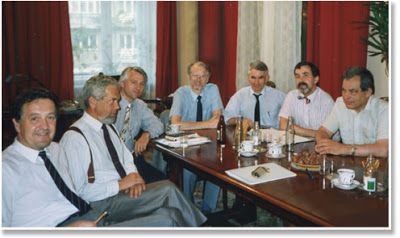
In the picture from left to right: Tamás Lajos (Technical University Budapest), Armando Trindade (Universidade Aberta), Alan Tait (representing John Daniel, OU), Erling Ljosa, Depty Minister Tadeusz Diem, Polen and an unidentified participant.
Her is my excerpt from Erling’s speech:
“The first pan-European meeting at the Technical University of Budapest in May 1990 gave all us who were present a strong feeling of witnessing an historic event. I was particularly impressed by the openness and strength of the appeals from Professor Tamàs Lajos and from the Polish Deputy Minister Tadeusz Diem, urging us to open all the bridges and channels of communication so long closed in Europe. This was an invitation which could not be refused. The meeting decided that there should be a follow-up under the name of The Budapest Platform, with a Steering Committee to meet in Milton Keynes, UK, in the autumn.
The Budapest meeting had been initiated and organized by ICDE, whose President at the time was Dr. David Sewart from the Open University in the UK, and with a newly established Secretariat in Oslo. When we discussed the situation in Milton Keynes, it became clear that there were many bridges to build and channels to open up in Western Europe as well. The European Community had quite recently taken up “Open and Distance Learning” as a field of interest, and some programs had been established, particularly concerning new technologies within vocational and continuing education. Countries outside the EU itself were supposed gradually to become involved. However, we had no open and transparent frameworks, mechanisms or organizations in Western Europe which would cover the whole field. The meeting in Budapest thus offered a golden opportunity not only for Central and Eastern Europe, but for all parts of Europe and for all sectors of distance education.
The Chair of the Budapest meeting and Platform was Dr. Gottfried Leibbrandt, founding President of the Dutch Open Universiteit. As a preparation for the next meeting in Prague 1991 he asked me, who was Director of a private correspondence school, and Professor Armando Trindade, Rector of the Portuguese Universidade Aberta, to help drafting a constitution for a new pan-European Network with the euphonious name EDEN. The constitution was adopted and EDEN became real. The new network aimed from the beginning towards being open to all types of institutions, networks, project participants and even individuals, membership driven with a democratic structure».
Spring break in Mexico
My Easter vacations were synonymous with log cabins and skiing in Norwegian mountains. My American spring break was different. At the airport in Philadelphia, we were very distressed to see hundreds of young boys and girls in military uniforms. Troops on their way to fight in the Gulf War. Such a contrast to see American students’ wild parties in Cancún later in the evening. The next day to reflect on the rise and fall of civilizations from the top of a pyramid in the ruins of the old Maya city Chichen Itza.
Constitution Day in Norway
We returned to Oslo to celebrate the Norwegian Constitution Day on May 17th. So many friends to visit in just a few days. So many impressions to share. That the US was not so free and advanced as we thought. That beaches did not open before the lifeguards arrived. That forests closed for visitors by sunset. That we had to pay invoices by sending checks in envelopes through the mail. That we could not pay gasoline with credit cards at the pumps.
Applauding Columbus, Ohio
June 1991. Drove the Jeep Cherokee to the arch city of Ohio. To attend an international symposium at Ohio State University titled Applications of Computer Conferencing to Teacher Education and Human Resource Development. Among the presentations I appreciated is Teaching by Computer Conferencing by Linda Harasim, Guidelines for constructing Instructional Discussions on a Computer Conference by Mark E. Eisly and Developing a Learning Community in Distance Education by Robin Mason.
Stian liked the opportunity to visit the Columbus zoo and the Sea World of Ohio. We stayed in a motel with a pool and watched TV. The war came so close when mothers and other family members of the soldiers were constantly interviewed on local TV stations. Remarkable to experience that military transport planes were applauded in the streets when they passed over the city with returning soldiers from the Gulf War.
French speaking Canada
Later in June, we ventured into French speaking Canada. Explored Erie, Niagara Falls, Toronto and Montreal. Continued north along the St. Lawrence River to Quebec City. My school French was rusty, but I was surprised to see how strong the French community wanted its independence.
Good Wibes in Santa Barbara
August 5-9. The IFIP TC 3 / WG 3.1 Working Conference on impact of Informatics on the Organization of Education. We flew to LA. Rented a car to visit Disneyland and Universal Studios. Drove Highway 1 to Santa Barbara. Went to the windy beach, rented roller skates and visited Santa Barbara Zoo. Spent a day in Solvang, the Danish village located in Hans Christian Andersen Park.
The conference was organized by Brian Samways and Tom J. van Weert. My presentation was titled: A goal-oriented method for establishing an electronic college. Rolf Kristiansen talked about changes in teacher attitudes toward computers in education and Lone Dircknick-Holmfeld discussed how computer conferences affect learning. I remember the pleasure of meeting Betty Collis and Jef Moonen from the University of Twente. Several Scandinavians participated and I vividly remember socialising with the dedicated and energetic Norwegian educator Jan Wibe and his wife. After a few drinks, he offered me a tailor-made suit if I would engage in the upcoming TeleTeaching 93 conference in Trondheim.
Packed in Madison, Wisconsin
August 13-16 1991. The Seventh Annual Conference on Distance Teaching and Learning. According to Terry Anderson’s review in the American Journal, there were 325 participants at the Holiday Inn hotel. Alone in the elevator for breakfast when it stopped at the 3rd floor. Four enormous men entered and surrounded me. Felt really small when the elevator was packed with muscles looking down at me. So relieved when they invited me to watch them play professional American football in the evening. The Green Bay Packers stayed at the hotel.
The conference included Ports of Entry, a national satellite videoconference about major case studies of distance education. It was introduced by Chere Gibson and confirmed my impression on how advanced US higher education institutions were regarding educational broadcasting and videoconferencing.
Birthday on ice
In October, I rented the local ice-skating hall and invited all our friends to celebrate my 34th birthday. Lucky no one was hurt, but it was hilarious to see my friends from around the world mimicking the Bambi cartoon when they ventured onto the slippery ice. Obviously a first-time experience for my friends from the Caribbean and Latin America.
St. Louis comrades
St. Louis November 1991. ADCIS – The Association for the Development of Computer-Based Instruction of Systems. I was there to present the paper Computer Communication: Four Innovative Projects at Penn State University with Barbara Grabowski, Ellen Taracani, Tim Leso, and David Popp.
We were four students in the car from Penn State. I controlled the cassette player from the front passenger seat. Used the opportunity to play the popular Norwegian group Gitarkameratene. Surprised to hear the back-seat comment: It is the first time I have listened to a full tape without understanding a single word. It started an interesting discussion on exposure to second languages through schools, popular music and TV-subtitles.
Devoted to DEOS
DEOS became my passion and dedication. It was thrilling to reach out to distance educators around the world. To include some of my own writing in Deosnews. To connect with so many dedicated authors and readers. To start and moderate Deos-l as a global discussion forum for distance educators. A network of committed people that I still relish and benefit from.
Altogether, I published 52 issues as editor of Deosnews. My last one, Volume 3.2, was distributed in February 1993 from my home office in Oslo as shown in the local newspaper Budstikka on February 5, 1993.
Deosnews and Deos-l was carried on by the American Center for the Study of Distance Education for another decade with Kenneth W. Borland, Mauri Collins and Melody Thompson as editors. DEOSNEWS 14.1 was the last issue published in January 2005. A complete list of issues is available at https://www.learningdesign.psu.edu/distance-education-online-symposium
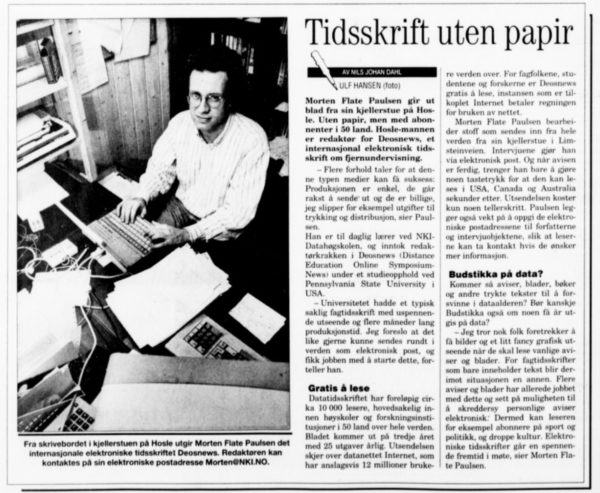
Here is the status report I wrote for the editorial in DEOSNEWS Vol. 1 No. 25:
This is the last issue of DEOSNEWS, Volume 1. Since the introduction in April 1991, 25 issues have been published. A list of all these issues is attached at the end of this file. DEOSNEWS now has about 700 subscribers around the world. Although it can be difficult to identify which countries all e-mail addresses correspond to, a review of the subscriber list indicates that DEOSNEWS has subscribers in these 33 countries: Australia, Austria, Belgium, Bolivia, Brazil, Canada, Chile, Colombia, Costa Rica, Czechoslovakia, Denmark, Egypt, Finland, France, Germany, Greece, Hong Kong, India, Ireland, Israel, Japan, Mexico, the Netherlands, New Zealand, Norway, Poland, Saudi Arabia, Spain, Sweden, Switzerland, Turkey, United Kingdom, and the United States.
Please notify mfp101@psuvm.psu.edu if there are any countries missing on this list. DEOS-L, which was announced in DEOSNEWS #17, already has about 300 subscribers. Although it has not found its final form, DEOS-L has proved that it can be a useful information channel for distance education.
This has been a year with impressive achievements for DEOS as a result of hard work and enthusiastic support from subscribers, authors, and the people at the American Center for the Study of Distance Education. A thank you, to you all and a special thank you to Philip W. Pinder, Janet L. Hartranft, Edward Desautels, Margaret Koble, Melody M. Thompson, Toni Garcia, and Michael G. Moore. Without your support, DEOS could not exist.
DEOSNEWS will be back in January 1992. Until then, enjoy many Happy Holidays.
Morten Flate Paulsen
PS. DEOSNEWS would appreciate old-fashioned Holiday Cards from the subscribers.
DEOS acknowledges and is grateful for the financial support provided by the Annenberg/CPB Project.
To subscribe to DEOSNEWS and DEOS-L (a discussion forum), just post the following commands to LISTSERV@PSUVM or LISTSERV@PSUVM.PSU.EDU:
SUBSCRIBE DEOSNEWS Your Full Name
SUBSCRIBE DEOS-L Your Full Name
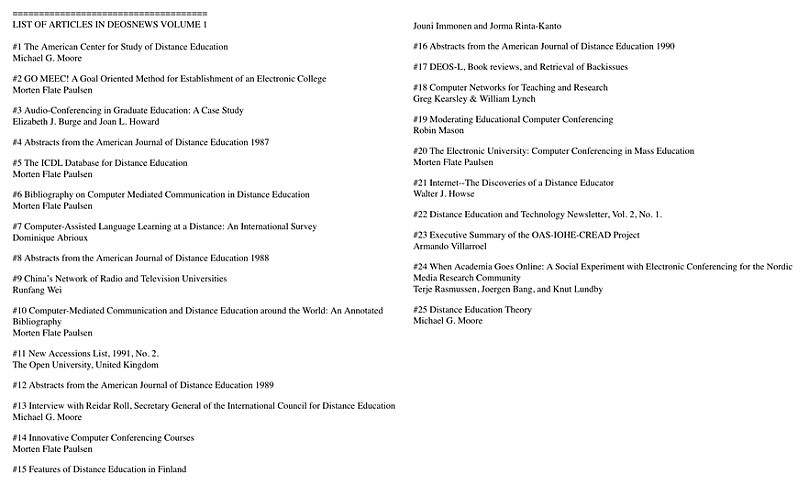
1992 - Returning to Norway with online luggage
Tourists and rioters in Washington DC
We took the four hour drive down to Washington DC several times. Pennsylvania Avenue and the Mall. Took the elevator to the top of the Washington Monument. Had a nice view of The White House where President George H. W. Bush presided. Were overwhelmed by the Korea and Vietnam war memorials. Headed to the impressive Smithsonian. Touched the moon rock at the national air and space museum.
Washington. So far from my desk on Øya in Kragerø. Still very close when I watch Veronica Westhrin’s disturbing reports from Pennsylvania Avenue on Norwegian Television. NRK’s US correspondent is also a neighbour with home office on Øya.
US Capitol. Perceived by many as the temple of democracy. Our guided tour stands out in memory as I write this during the frightening riots incited by President Trump January 6th, 2020.
Oleona lure
During Christmas break, we drove north to Potter County in Pennsylvania. To Oleona – a huge piece of land the grandiose Norwegian violinist Ole Bull bought in 1852. The first year 700 immigrants settled there – lured by his intention to build a New Norway as a perfect community of Scandinavian settlers. An ambitious initiative that still resonates in Norwegian history.
Reality check. We found a road sign spelling out Oleona. In the middle of an unfriendly forest. A few log cabins trying to attract potential tourists. Closed. No wonder many of the immigrants went on and found their American dream in the Mid West. Probably more successful with Oleona than Ole Bull, Pete Seeger popularized a translated version of the parodic Norwegian folk song.
Analogue video and commercial TV
TV2, Norway’s second national TV channel, was due to open in September. To be financed by TV-commercials. A development that motivated me to enrol in a course on video and television production. VHS cameras were available for the students to carry home. So big and heavy that they needed shoulder support. Got hands on experience with studio recording and tedious editing of analogue video. Dreamed about a digital future that made video editing as easy as text editing.
From Bulletin Boards to Electronic Universities
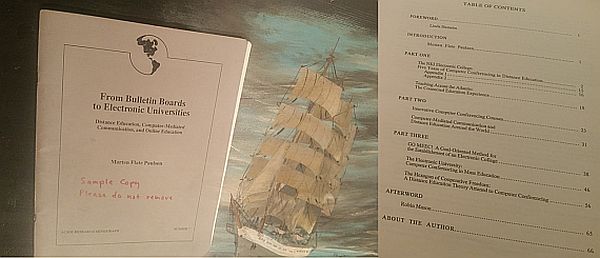
Thank you to the Penn State professors who allowed me to focus on online education in my course work. And to Michael G. Moore who agreed to publish a collection of my course papers as a research monograph at the American Center for the Study of Distance Education.
A 66-page monograph titled From Bulletin Boards to Electronic Universities – Distance Education, Computer-Mediated Communication, and Online Education. Comprising seven of the papers I wrote as Penn State student. Foreword by Linda Harasim and afterword by Robin Mason, two of the most respected scholars in the field.
Several of the articles foreshadowed my dissertation work on teaching techniques for computer-mediated communication. The final article titled The Hexagon on Cooperative Freedom was the seminal version of my theory on cooperative freedom and transparency in online education. A developing theory that ever since has been the guiding star of my online education work.
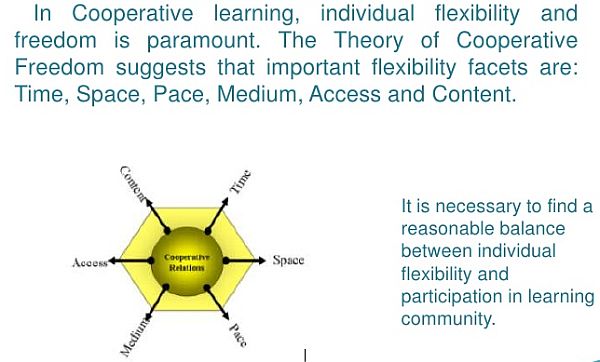
From Fry Drive to Hersey Park
When the Cooksons returned from sabbatical, we moved from Crabapple Court to 222 Fry Drive. A nice brick house without furniture. We bought what we needed at local garage sales. Furniture we garage sold when we returned to Norway in the fall. Announced it in the local newspaper. Woke up at seven the next morning by curious bargain hunters peeping through our bedroom windows. Everything was sold before evening. The next weekend we spent all the money in The Hersey Amusement Park in Harrisburg.
Health care experiences
All foreign Penn State students had to undertake a screen test for tuberculosis. Three-year-old son Stian came along to the medical centre and still remembers the two policemen who accompanied a big black man in hand cuffs sitting next to him in the waiting area.
We also made a few expensive, but unsuccessful visits to a local fertility clinic. One evening Marith got a severe head ace. So, we drove to Center County Community Hospital. They recommended an overnight examination. Luckily, everything was fine, and she could go home in the morning. Next week, we received a bill from the hospital. More than thousand 1992 dollars. Then, one more thousand plus dollar bill arrived to cover medical personnel. Finally, a third large bill appeared for the use of medical tests. Experiences that strengthened our appreciation of the Norwegian health care system.
The best man
Woke up in the middle of the night by a phone call. A cheerful Norwegian voice: Would you like to be my best man?
My long-time friend and neighbour on the phone. Arthur – who introduced me to the carnival in Rio. The host of “Radio Frihet” FM 103.9 who called us on live radio – just in time to reveal our secret honeymoon departure to Vienna. The adopted baby who lost his father when he was three and his mother at seventeen. The lonesome teenager who gradually developed a large social network.
The bachelor who invited potential girlfriends to decorate his Christmas three. Every day in December. Not a single needle left on Christmas Eve.
The young man who found his biological mother. Then identified his biological father as an acquainted co-worker in the company they worked for. Just weeks before the father died.
The newly married house owner who built a concrete floor for the garden greenhouse. Who jumped barefooted into the wet concrete to spread it nicely. Who denied to cancel our ferry trip to Copenhagen the next week. So we had to push his severely concrete-burned legs around in a wheelchair.
The father who took his growing family on numerous spontaneous travels around the world. Said to his oldest kids: You like glam rock, we go Wig Wam concert Saturday. Without concert tickets on arrival in Tokyo, they ended up backstage with the Norwegian glam rock band and special guest tickets.
The grown up, respected family man with an impressive bunch of biological and foster children. The first runner up to become Mayor in his county. The self-made and not so handy man with a lifetime of funny stories about his calamities.
So, we spent a nice summer in Norway with many friends and a memorable summer wedding at the popular Tryvannstua ski and hiking resort in Oslo.
The land of lawn and order
Returning from summer holidays in Norway, we fond a red note from Stage College Health Department on our front door. Stating that we would receive a fine if we did not move our lawn. Some of the grass was too high. The next day the mail man showed up with a fifty dollar fine accompanied with a warning of imprisonment if it was ignored. My illusion of America as the land of freedom never recovered.
Returning home with online luggage
After two years of doctoral studies, it was time to say goodbye to friends, students and faculty at the adult education program. To think of Fred Ralston, Kenneth W. Borland and Patricia Gonzalves. To give a big hug to the outstanding Cathy Watson who ran the department with firm hands.
All coursework completed. All exams passed. “Just” needed to finish the dissertation back home in Norway.
What did I learn as a doctoral student in the US?
- That online education had a bright future, and that the internet was the highway to get there.
- That the internet made it possible to build a global network of colleagues and friends.
- That it is far more interesting to be an adult student with work experience than to be a young student without.
- That academic knowledge and degrees open many doors.
- That interviews, articles and presentations often have greater impact in English than in Norwegian. Even in Norway.
- That Norwegians could learn from Americans to be more self-confident, speak up and promote good achievements.
- That a Norwegian editor of an international journal can improve the writing of native English speakers.
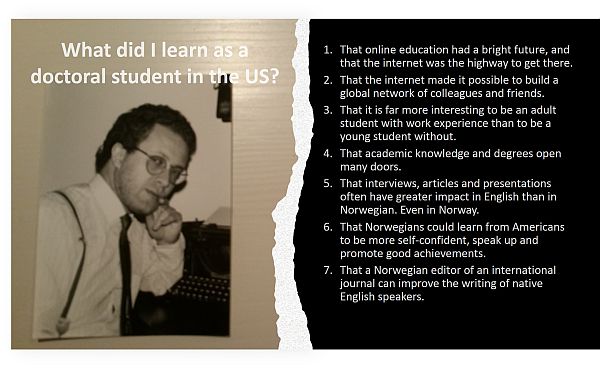
Motivated by Norwegian Prime Minister Gro Harlem Brundtland’s 1992 New Year Speech? Was she right to claim that «it is typically Norwegian to be good»? Anyway, I returned to Norway in the fall. With improved self-confidence and grand ambitions to become an advocate of online education on the internet.
The Bangkok project
ICDE’s 16th World conference in Bangkok – the same year Thailand was connected to the Internet. It was my first dual mode conference. Helped Terry Anderson and Robin Mason to promote and organize the virtual Bangkok Project. Before attending the conference at the Sukhothai Thammathirat Open University (STOU) in November.
In DEOSNEWS 2.7, I interviewed program chair Bruce Scriven about the conference. Reading it again during the 2021 pandemic when most international conferences struggle to go online, I see the Bangkok Project as real pioneer work – and maybe as the world’s first MOOC:
“In order to expand the dialogue and information sharing associated with the ICDE XVI Congress, an innovative use of computer mediated communications is being planned. The project will port discussions and interactions relevant to the Congress themes on a variety of Internet, UseNet, K12net and Bitnet computer networks. The project will commence one month prior to the Congress and include interactions with the delegates in Bangkok. Softwords has donated a CoSy conferencing system to be used by delegates in Bangkok. Distance educators from around the globe can participate by accessing established or new distance education discussion lists carried on the various international networks.”
In DEOSNEWS 2.24, I followed up interviewing Lani Gunawardena, Torstein Rekkedal, Phyllis Olmstead, Elske Heeren, Tony Bates, Bruce Scriven and David Murphy about their conference experiences. Tony Bates reported on his efforts as moderator of one of the six tracks in the online preconference. Elske Heeren’s remarks are also telling:
“As a final remark I would like to mention the six world-wide computer-conferences that have been called the «Bangkok project». I have followed some of these conferences through the DEOS conference list, and would like to conclude that the «Bangkok project» has been more than a great alternative for those who had to stay at home. I have enjoyed both the real conference and the computer conferences.”
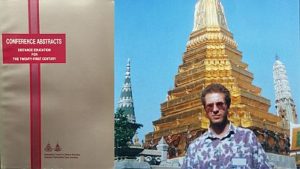 Grateful that Torstein Rekkedal found money on a tight travel budget to take me along to Bangkok. Shared a downtown hotel room with just one bed before we moved on to the university dorms with Morten Søby.
Grateful that Torstein Rekkedal found money on a tight travel budget to take me along to Bangkok. Shared a downtown hotel room with just one bed before we moved on to the university dorms with Morten Søby.
Had good conversations with Kjell Åge Bringsrud and Odd Rudjord. Several great tourist moments at the Grand Palace and on Chao Phraya river. Joined a group of Norwegians on a pub-to-pub tour in one of Bangkok’s go-go districts. Somewhat uncomfortable with the forthright and sparsely dressed female clientele in some of the bars. So happy to have Ingeborg Bø as my chaperon.
Enjoyed the opening reception with the floating candlelight ceremony in conjunction with the Loi Krathong festival. Gave a presentation titled DEOS: The Distance Education Online Symposium. Established new relations among the 800 delegates from 50 counties. Wanted to come back sometime in the future – a dream that came through when I was invited as keynote speaker for the Open University’s 40th anniversary.
1993 - Adopting Brazil
Twenty million people with access to affordable internet services

ANSA – the Association of Norwegian Students Abroad. I wrote an article for the December issue of their magazine ANSA -nytt about useful internet services. Titled “Internet: your contact with Norway”. Estimated that 20 million people in the world had access to internet. Most of them at universities and research institutions in first world countries. 25 thousand through the Norwegian university network Uninett.
Most important – internet gave access to people and digital resources all around the world – for free or just the price of a local telephone call.
The most common internet service was e-mail. But just about 25,000 people in Norway had an e-mail account. And it was hard to find their addresses.
Less known services were:
- NetNews, a distributed conferencing system with thousands of Newsgroups and about three million users. The University of Oslo carried about 1800 of the newsgroups.
- Gopher, a menu driven service that provided access to information and services on the internet.
- Telnet, a service for remote login on computers on the internet.
- FTP, a service for file transfer.
- Archie, a catalogue service for finding files that could be downloaded with FTP.
- Listserv, a system that could archive and distribute e-mail to subscribers of various lists.
These services were difficult to use with text-based and often obscure user interfaces. Impressive services in need for a unified and better solution. Built for the new generation of PCs with colour screens and window interfaces. Some sort of a graphic and colourful world wide web.
Norwaves and Norweave
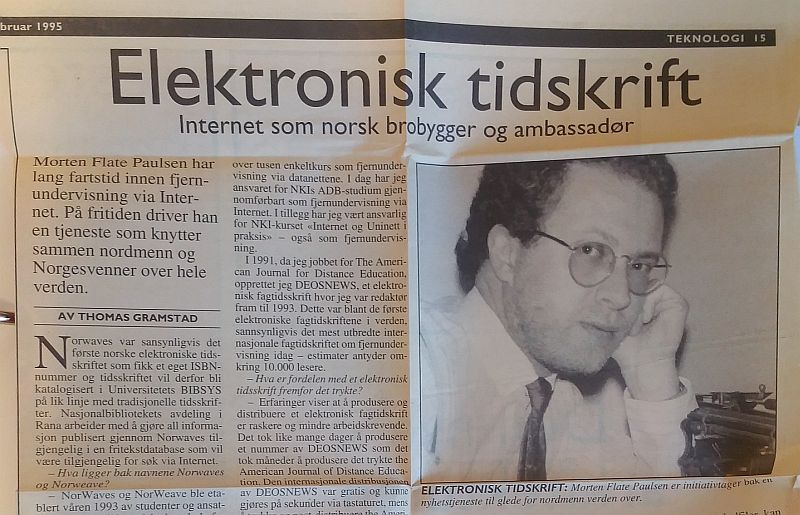
Picture of an article by Thomas Gramstad in Morgenbladet on January 27, 1995
My Norwaves idea was conceived in Pennsylvania. Realized how little news I received about Norway and how much I appreciated what I got. Returning to Norway, I found out that Norwegian embassies communicated via fax – since they did not have access to e-mail. So, I decided to introduce an online news service about Norway.
Then, I contacted Karin Bruun and Ragnvald Berggrav at the Norinform press office who agreed to provide Norwaves with news from Norway in English.
The first issue was published in January 1993. After that, Norwaves was distributed as e-mail via Listserv almost every week until November 1998. A typical issue included ten pages of news from the previous week. All issues were available and searchable in the Norwaves Archive.
After one year of operation, we had about 1000 subscribers in more than 25 countries.
Norwaves received many requests from subscribers who wanted a discussion forum. So, we established NorWeave as a moderated forum for Norwegians and friends of Norway in September 1993 as a supplementary service to Norwaves. The network, which had several hundred subscribers, was established to provide mutual help and support as well as to share information of interest to the Norwegian community. Norweave was first moderated by Kathleen Fletcher, later by Thor Larsen, both volunteers I was able to recruit in the US.
From 1994, the Royal Ministry of Foreign Affairs agreed to snail-mail me weekly news on a 3.5-inch floppy disk. For formatting and distribution. The same information they distributed to the Norwegian embassies via fax. Old-fashioned, but I distributed the online news voluntarily for five years. Imagined that I worked as Norway’s first honorary consul on the Internet.
In March 1994, Norwaves was assigned an ISSN number as the first electronic journal in Norway (see Bok og bibliotek. 1994 Vol. 61 Nr. 8). The National Library chose Norwaves as the first electronic journal to be archived according to the Act of June 9, 1989 «Lov om avleveringsplikt for allment tilgjengelige dokumenter«.
Read more at http://nettstudier.blogspot.com/p/norwaves.html
NATO workshop in Segovia
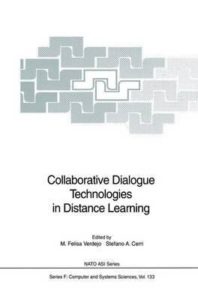 Can’t remember why I was invited to the “NATO Advanced Research Workshop on Collaborative dialogue technologies in distance learning» in Segovia. Pondered what NATO would become after the cold war ended and the Warsaw Pact was disolved in 1991. But a trip to Spain in April sounded as a good opportunity to escape the cold Norwegian winter. Especially after reading about Erling Kagge in the international edition of Time Magazine in March. The Norwegian adventurer who completed the first unsupported and solo expedition to the South Pole. 1,310 km in 50 days without radio contact to the outside world.
Can’t remember why I was invited to the “NATO Advanced Research Workshop on Collaborative dialogue technologies in distance learning» in Segovia. Pondered what NATO would become after the cold war ended and the Warsaw Pact was disolved in 1991. But a trip to Spain in April sounded as a good opportunity to escape the cold Norwegian winter. Especially after reading about Erling Kagge in the international edition of Time Magazine in March. The Norwegian adventurer who completed the first unsupported and solo expedition to the South Pole. 1,310 km in 50 days without radio contact to the outside world.
So, I packed my summer clothes for the flight to Madrid. One hour bus drive north towards the mountains in Sierra de Guadarrama. It started to snow near the altitude of one thousand meters.
Saw the impressive Roman aqueducts and the Alcázar castle. Had a delicious Cochinillo dinner. Roast suckling pig so soft and tender that it was cut with a plate. Huge glasses of local brandy were passed around the table.
The workshop was productive and resulted in a 23-chapter book published by Springer in 1994. Collaborative Dialogue Technologies in Distance Learning. Edited by Felisa Verdejo and Stefano Cerri.
I was first author of first chapter “A Pedagogical Framework for CMC Programmes”. In the third chapter titled “A Pedagogical Framework for CMC Programmes”, I presented the framework below with 31 different online teaching techniques which became a central part of my dissertation work.
Our Oslo Fjord
Living two years in Pennsylvania, it gradually dawned on us how much we missed the sea. That we needed access to salt water. To have a boat. So, we bought an old 22 feet Windrace day cruiser. Nick named Bob Bob Sue. Found a waterfront port nearby. Could be in the boat 20 minutes after work, spend the night there and wake up with the seagulls for a morning swim before work.
Discovered and appreciated the Oslo Fjord as a unique recreational area. Sometimes possible to ice skate in the winter. Usually, good weather conditions and relatively warm water (16-24 centigrades) from May to September. Hundreds of islands and so many places to stay the night in a boat or a tent. Most of the area open for the public. Happy to know that the noisy Fornebu international airport was soon to be closed. More than excited when we spotted killer whales larger than the boat.
Harness Hernes
Knut Bråtane, who worked for the Norwegian Ministry of Education, paid us a friendly visit i State College. There, I demonstrated the Listserv we used for DEOS and he immediately saw its potential.
Back in Norway, Knut asked me to set up an informal Listserv group for people working for and with the Ministry. The most controversial educational topic at the time was the reform of the Norwegian secondary school system called Reform 94. People marched in the streets to protest the reform and condemn Minister of Education Gudmund Hernes. The demonstrators unified under the catchy Norwegian slogan «Hernes må fjernes». Meaning – Hernes must be removed. Harness Hernes is a catchier translation, with a less blunt connotation.
I was asked to add Hernes to our Listserv group the same week Computerworld Norway announced his e-mail address in a news article. The journalist prized him as the first Norwegian minister with a personal e-mail account. This resulted in so many e-mail requests that the Ministry had to add an automatic thank you reply to his account.
The reply obviously was received by all members of our Listserv group – including Hernes. So, starting Friday evening, his automatic reply was repeated every hour in an annoying loop. Checking my e-mail Saturday morning, as the system administrator, I realized that Hernes må fjernes – and I actually did.
Teleteaching 93 in Trondheim
Seven years after attending the very first Teleteaching conference in Budapest, I was proud to be on the advisory committee for the third international Teleteaching conference in Trondheim. Interviewed Programme Chair Jan Wibe and IFIP President Asbjørn Rolstadås about the upcoming conference in Deosnews 2.18.
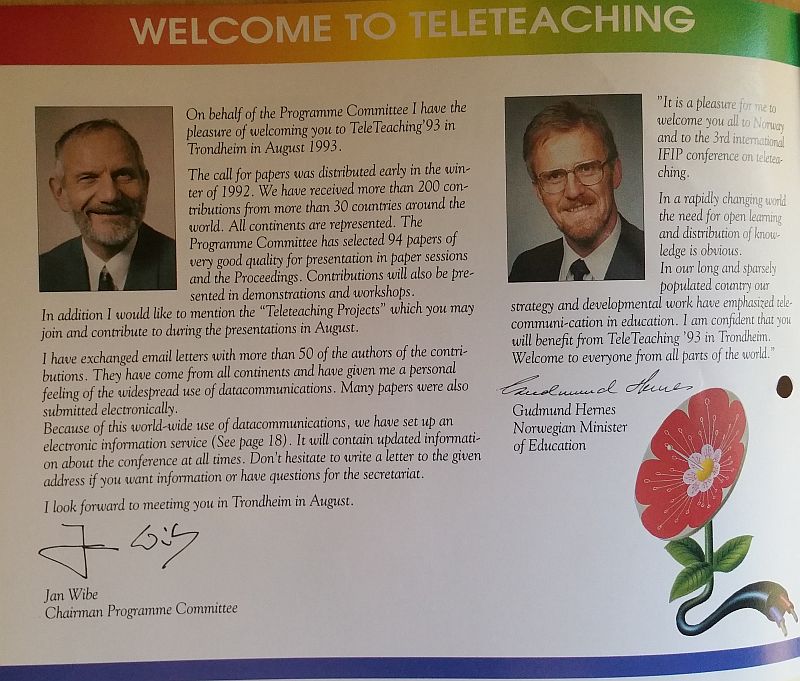
Back on the NTH campus on August 20. The day the first Oslo Accord was signed between the Government of Israel and the Palestine Liberation Organization (PLO) in Washington D.C. Thirteen years after my graduation. Three years before the merger that changed the university name to NTNU.
Impressed by the work of Jan Wibe and his colleagues in Trondheim. Excited to see Rosalie Wells, Tony Bates and Bruce Scriven among the keynote speakers. To befriend Kjell Atle Halvorsen. To talk with Håkon Wium Lie who had just introduced Norway’s first web page named MultiTorg. To meet new Nordic colleagues – Salvor Gissurardottir and Lára Stefánsdóttir from Iceland – Kari Lampikoski from Finland and Mette Ringsted from Denmark.
Now, browsing through my thousand-page proceedings filled with colourful notes, I’m impressed by the list of international scholars we enrolled. The quality of the papers. The broad scope of projects presented by Norwegian colleagues. Many from northern Norway. Papers about EKKO, MUNIN, JITOL, WINIX, SPINN and KIDNET. Altogether, a manifestation of my conviction that tiny Norway was among the five most advanced online education countries in the world. The other four? The much larger, English-speaking countries US, Canada, UK and maybe Australia.
To compliment some of the Norwegian pioneers and their early projects, I have extracted the below list of Norwegian presenters from the conference proceeding’s table of content:
- Klingsheim, T. Kristiansen: The importance of user participation in telecommunication development.
- Sigmund Akselsen, Svein-Ivar Lillehaug: Teaching and learning aspects of remote medical consultations.
- Knut Braatane: Teachers in network.
- Kjell Age Bringsud, Geir Pedersen: The MUNIN project – distributed electronic classrooms with large electronic white boards.
- Annie-Cecilie Fagerlie: Technology is key to supporting Andersen Consulting and Arthur Andersen education strategies.
- Annita Fjuk: The pedagogical and technological challenges in computer-mediated communication in distance education.
- Anne Gjerløw: Datacommunication – a tool in planning and bringing through the SPINN project.
- Ola Hansen: LUPEN – a project in the teaching of literature at elementary levels in secondary school.
- Harald Haugen: Just in time open learning – a European project from a Norwegian point of view.
- Asbjørn Hoem: Distance education that is human, low-cost and high tech.
- Hovig, Håkon Wium Lie: Teleteaching in a graduate seminar: practical experiences and a look ahead.
- Unni Hovstad: San passeport: learning French in Norwegian schools.
- Astrid Elisabeth Jensen: Learning computer network services by using them in familiar surroundings.
- Terje Kristensen: A pedagogical network of schools in the Bergen region.
- Wiggo Lindseth: Distance education in Finnmark, North Norway: a SPINN project.
- Morten Flate Paulsen: Pedagogical techniques for computer-mediated communication.
- Svein Arne Rasmussen: International E-mail in language instruction.
- Torstein Rekkedal: Experiences with computer conferencing and teleteaching at NKI, Norway.
- Frode Rønning, Haakon Waadeland, Jan Wibe: Conference based teaching of a fist year university course in mathematics.
- Ottar Sande, Jan Eide: The FILAM project: a low profile approach to computerized distance teaching.
- Oluf Magnus Solvik: Communication and distance education.
- Anne Weeks, Ola Røyrvik: Using E-mail in an English class at NKI.
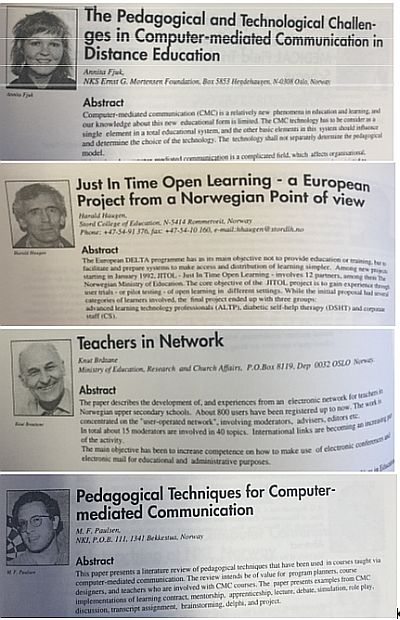
The picture shows «random clips of good looking» Norwegian presenters from the book of conference abstracts.
Andrea
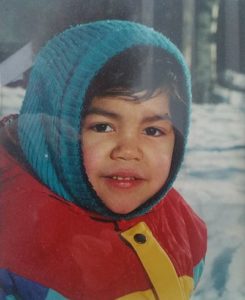 We waited about nine months for the VARIG flight to Sao Paulo. The domestic flight landed in two small towns before we reached our destination. Through the window of the tiny Brazilian aircraft, we spotted only three people in front of the modest terminal building. Two adult women and a cute little girl in a blue dress. Heartbeaten, we immediately understood it was Andrea.
We waited about nine months for the VARIG flight to Sao Paulo. The domestic flight landed in two small towns before we reached our destination. Through the window of the tiny Brazilian aircraft, we spotted only three people in front of the modest terminal building. Two adult women and a cute little girl in a blue dress. Heartbeaten, we immediately understood it was Andrea.
On the ground, we met a smiling two-and-a-half-year-old with a vivid Brazilian temper. The two women were Andrea’s foster mother and the local adoption representative.
They took us to our home for the next number of weeks. In an area and a time with no chance of internet access. A nice hotel with swimming pool, mini zoo and hummingbirds in the reception. There, they left us with Andrea who soon stretched our Portuguese: Mais água, açúcar, sorriso, banho, dedo do pé, meu carrinho.
When do Brazilian toddlers sleep? The first night, we turned out all lights in our hotel room at eight. For several hours we heard her playing and talking content with herself in the dark.
The days were happy, exiting, challenging and filled with feelings. Six-year-old big brother had mixed feelings. Mostly proud and joyous, sometimes jealous to share his parents’ attention. It helped when «Andrea» bought him the Nintendo Game Boy. We also got welcome company from Snorre and Wenche who stayed a couple of weeks at our hotel.
It was a delightful pleasure to visit Andrea’s caring foster family of five and learn more about Andrea’s history. We met her aunt and older half-sister. Shocked when we heard that she had a twin brother who was already adopted. Delighted to be acquainted with Norwegian missionaries in the region and to eat dinner at their place on the first Sunday of Advent.
Since we had to stay in Brazil for several weeks, we decided to explore Pantanal and Foz do Iguaçu. We spent nearly a week at an enormous cattle ranch in Pantanal. Fishing piranha from a small wooden boat surrounded with caimans – the local alligators. Watching scarily close when the locals fed many dozens of wild caimans in the lake by our bungalow. Horseback riding towards hundreds of cattle approaching at a terrifying speed. Happy to have the local boiadeiros (cowboys) divert the cattle.
The boardwalk at Foz de Iguacu was impressive. Watching the enormous waterfalls from a tiny motorboat fighting the currents up the river was awesome. Handling a little girl who adamantly refused to put on a life jacket was especially challenging among locals who did not know why foreigners argued with the Brazilian toddler.
Back in base camp, we could pay the hotel with a Visa Card. However, they charged 20 % extra if we did not pay cash. So, I walked to the local bank to get a lot of the short lived cruzeiro real in a period of very high inflation in Brazil. Waiting in the bank, a money transport arrived in an armoured car. Four heavily armed guards followed the money into the bank vault. After a while I received literary a backpack full of cash and walked somewhat nervously through town to pay for six weeks at the hotel.
Afterthoughts
Three lively boys playing in the Oslo snow. Calling us Bestus and Nonno – nicknames for the Norwegian words – morfar and mormor. The best words we know. Happily reminded of the cheerful two-year old Brazilian girl arriving Norway in cold December snow – one generation earlier.
1994 - Attending the first Olympic Games on the web
The Winter Olympic Games in Lillehammer
Winter sports. Profoundly embedded in Norwegian culture. The Lillehammer Winter Olympics gave a huge surge in Norway’s national pride. We will never forget the moment Juan Antonio Samaranch, President of the International Olympic Committee, proclaimed it the best Olympics Winter games ever. We still admire the Norwegian athletes who won 26 medals – more than any other nation.
Enthralled by the live news service from Oslonett, Norway’s first commercial web company. With the amazing new graphic browser Mosaic, we could get Olympics results from all events immediately on Oslonett’s webpages. Their service titled “WWW meets the 1994 Olympics” was a major success. The first web page for an international sports event and a kick start for the web in Norway.
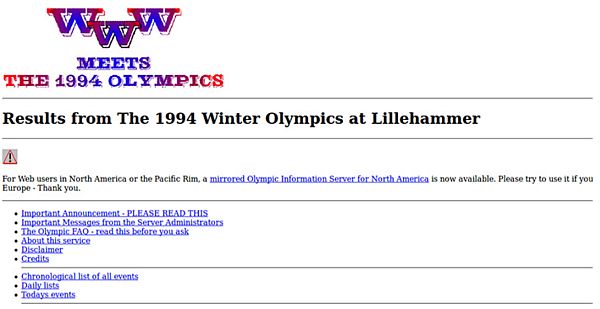
Screen shot of Oslonett’s Olympic web page
We had tickets to two events. Sweden and Slovakia played 4-4 in the Håkons Hall ice hockey rink. Italian cross-country skier Manuela Di Centa won the gold medal in 15 km freestyle.
Lodging was scarce. Fortunately, my childhood friend Atle offered me and six-year-old Stian to stay two nights in his dental office. An office with a view to the ski jumping hill Lysgårdsbakken – the venue of the opening ceremony. I vividly remember reclining in the dental chair with a glass of wine watching the impressing ceremony on TV. The Norwegian actress Liv Ullmann and adventurer Thor Heyerdahl welcomed the world. Sissel Kyrkebø mesmerized us with the Olympic Hymn. Through the dental window, the fireworks and Stein Gruben with the Olympic torch. Before he brought it safely down the ski jump so that Crown Prince Haakon Magnus could light the Olympic cauldron.
In the same moment, Edvard Munch’s iconic painting the scream, was stolen from the Norwegian national museum in Oslo.
Moving the NKI electronic college to internet
NKI had several colleges and departments, but no common strategy on internet access and learning platforms. So, in June 93, the management mandated me to head a project group that should make recommendations for NKI’s future educational network. In September 93, we concluded that all students and employees should have access to internet, e-mail and Listserv as a common conferencing system.
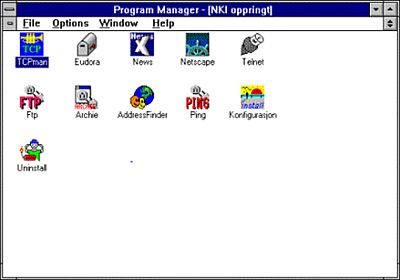
When we had to retire the EKKO host computer, we followed the recommendations and introduced the second generation of the NKI electronic college in the 1994 spring semester. We called it the open electronic college to signal that it was open to the world through the internet. All courses and programmes were offered un-paced with individual startup to provide the students’ need for autonomy and flexibility.
We provided our distance students with internet access, e-mail addresses and PC-software to use the services. A growing number of the students had PCs with Windows and colour interfaces. The software we provided is depicted in the screen shot.
We considered the first generation of the NKI electronic college (1986-1993) to be quite a success. We were recognized as pioneers in the field and had reached 800 enrolments in 10 different online courses. However, we continuously followed other developments in teaching and learning methods. Examined different learning platforms, such as CoSy, PortaCom, FirstClass, internet and the web with the aim of developing a better second-generation system.
The new internet platform represented in several ways a setback compared with our EKKO platform. The interface was still text-based and far from user-friendly. Norwegian characters and email attachments were not supported. On the other hand, we got access to many more potential students and online resources through the internet.
My first external presentation of NKI’s open electronic college was in April at the Norwegian conference IT og Utdanning in the beautiful coastal town of Ålesund.
Online NKI colleagues
Jan Nergård and Anne Karine Akre. Good colleagues that were central in the daily operation and development in our electronic college. Unfortunately, they both passed away just a few months before I write this.
Anne Karine handled requests from prospective students and supported all our online students in an excellent way.
Jan administered and improved the software and hardware for the electronic college. A dear discussion partner for technical and pedagogical advancements of our services. Strengthening my penchant for evolutionary system development. And my convictions that we needed to involve more NKI colleagues in our online education initiatives.
On his spear time, Jan was a tram driver for Oslo tramways. So, we were able to rent his tram for a team building “online” party. Loaded with beer and pizza, we followed the tramlines in Oslo. Still remember the exhilarating feeling I had in the driver’s seat.
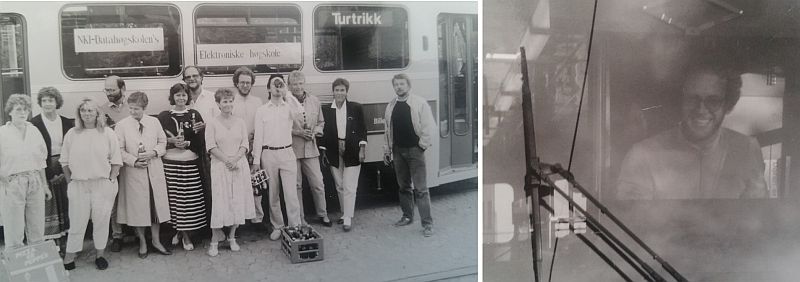
Photos by Jan Nergård
The EU and EEA schism
53.5 % voted no in 1972. I was too young for that referendum. However, in January 1994 Norway joined EEA – the European Economic Area. A treaty between EU, Norway, Lichtenstein and Iceland. An agreement that gave Norwegian educators access to EU-funded projects. And funded numerous European projects through the EEA and Norway Grants.
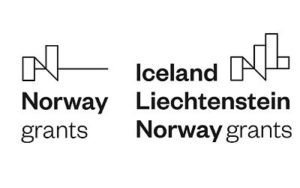
The Norwegian government negotiated and signed a new full membership treaty with EU in June. So, a second conflict-ridden membership referendum was scheduled for November 28. A lot of strong feelings and many more or less valid arguments in the air.
I like to listen to both side of a debate. Need time to contemplate and weigh the arguments.
It was not difficult to understand that Norwegians appreciated independence. After centuries under Demark and Sweden. That a strong EU could take control of our valuable resources. Oil, fish and hydroelectric power. That our tough winter climate would make it hard to compete in a single market.
On the other hand, a small country with 4 million people needed alliances. Very dependent on international trade and markets for our products. Our close neighbours and very important trade partners Denmark, England and Germany were already members. Sweden and Finland joined a few weeks before the referendum in Norway.
I decided to vote yes. Because I believed that the internet and digital services saw no borders. And hoped for future collaboration with all the excellent European online educators that I had met.
The referendum ended with 52.2 % no – but started a period that I was heavily involved with EU-funded projects and European organizations.
1995 - Going online in Birmingham and Berlin
The shareware report
First speaker at the online preconference for the ICDE World Conference in Birmingham. The objective of my session was to give the 500 participants an opportunity to share experiences and comment on the online pedagogical techniques I had written about. Compiled it as the Online Report on Pedagogical Techniques for Computer-mediated Communication.
Decided to publish the 55-page report as an html-document on the web in August. Learned the term shareware from programmers who used it to get some income from the software they shared online. Wondered if this could work for written documents. Decided to test it with the following text on the front page:
“This report’s content on paper and in any electronic form is copyrighted 1995 by Morten Flate Paulsen. The content is shareware, it is not public domain. You are granted a limited read and use license to see if the content is of interest to you. If so, you should mail the equivalent of USD 20 or NOK 100 to Morten Flate Paulsen”.
To my great surprise, I received envelopes with cash from several countries. And according to Google Scholar, the online report is one of my most successful publications with nearly 300 citations.
Mega-universities in Birmingham
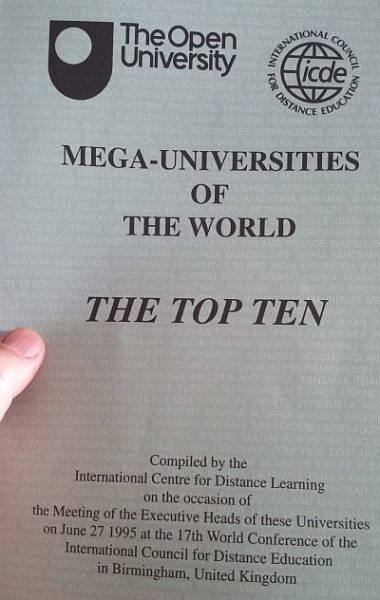 June 1995. The 17th ICDE World Conference in Birmingham. Hosted by the UK Open University. More than 1000 people from 80 countries attended. The conference theme: One World, Many Voices. David Sewart was ICDE President, Programme Chair and editor of the two conference books.
June 1995. The 17th ICDE World Conference in Birmingham. Hosted by the UK Open University. More than 1000 people from 80 countries attended. The conference theme: One World, Many Voices. David Sewart was ICDE President, Programme Chair and editor of the two conference books.
My conference presentation, titled The NKI Open Electronic College, focused on our experiences with the second-generation online education systems. The benefits and challenges of moving the college from a closed LMS environment to an open online college. A college that could be accessed via the internet and gave student access to a host of new global services.
The UK Open University admitted its first students in 1971. By the time of the conference, probably the best known and most respected distance education institution in the world. Some OU delegates even promoted a future system that could identify and support students with little progress.
The OU’s vice chancellor and former ICDE president, Sir John Daniel, put every effort into the success of the conference. He also wrote the foreword to the influential report Mega-universities of the World. A compilation of the ten universities with a student enrolment over 100.000. Produced for the meeting of executive heads of these universities during the conference.
The ten mega-universities included were:
- China: China Central TV and Broadcasting University (CCRTVU)
- France: Centre National d’Enseignementa à Distance (CNED)
- India: Indira Gandhi National Open university (IGNOU)
- Indonesia: Universitas Terbuka (UT)
- Korea: Korea National Open University (KNOU)
- South Africa: University of South Africa (UNISA)
- Spain: Universidad Nacional de Educación a Distancia (UNED)
- Thailand: Sukhothai Thammathirat Open University (STOU)
- Turkey: Anadolu University (OEF)
- United Kingdom: Open University (OU)
Conference members spent a summer evening with entertainment in the Botanic Gardens. During a social break aboard the long canal boats, we realized that the differences between traditional education and distance education started to blur.
Had a memorable evening at a Birmingham pub. Met delegates who arrived through the Chunnel that opened a year earlier. Was pleasantly surprised by international colleagues who recognized Norwegian successes of the year. That Liv Arnesen was the first woman to reach the South Pole alone. That Norwegian composer Rolf Løvland won the European Song Contest in Dublin with Secret Garden’s Nocturne. That the Norwegian women’s team became World Championship in soccer after beating Germany 2-0 in the final.
Discussed Princess Anne’s official opening address. Overheard that she arrived driving the Rolls Royce herself with her chauffeur in the back seat. That she parked on the pavement in front of the convention centre. That a traffic warden placed a parking ticket under the windscreen wiper. That a policeman, working for the Royal Family security, advised him it might not be so wise. According to the story, the traffic warden tore the ticket into pieces and put it in a nearby wastepaper bin. An onlooker later removed the bits from the bin. True or not, he had a good story for the Birmingham pub.
Leaving the pub, I told my company that I should return to my Lichfield Challenger 5 tent. A bargain from an outlet near the hotel. Checked that all parts were faultless by pitching it inside the hotel room. The room maid’s reaction more than confirmed her prejudice about Norwegian men as outdoor maniacs.
The first Online Educa Berlin
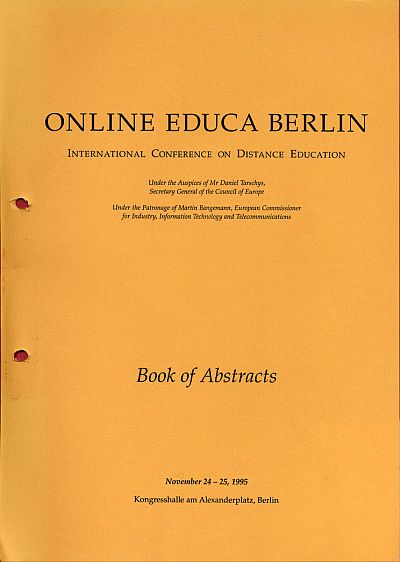 Berlin in late November and early December. Christmas markets, Bratwürsts, Glüwine and nude unisex saunas. Unter den Linden, Brandenburger Tor, Tiergarten, Checkpoint Charlie. Capital of the unified Germany and the home of Online Educa Berlin.
Berlin in late November and early December. Christmas markets, Bratwürsts, Glüwine and nude unisex saunas. Unter den Linden, Brandenburger Tor, Tiergarten, Checkpoint Charlie. Capital of the unified Germany and the home of Online Educa Berlin.
In November, I attended the very first OEB conference. Thought of Christiane F. when I arrived at Bahnhof Zoo. Had no idea that I would return several times to what would become Europe’s most important online education conference for decades. Always many Norwegians around. BI Norwegian Business School, just one of the institutions with two-digit participants year after year. Several Norwegian organizations in the exhibition hall.
Looking back, I find it hard to remember which year my conference memories are from. Very many returning colleagues, the familiar format at Hotel InterContintental every year. So, I asked Rebecca Stromeyer to help me fill in some blanks. Rebecca who launched the first conference with her father Karl Badde.
The first year was different. It was held in the East German flagship congress centre – Kongresshalle am Alexanderplatz. To symbolise that EAST meets WEST, as the idea for OEB was born at an education conference in Moscow in the early 1990s. The conference service could have been better and there was plenty of amusement when we got bananas and sandwiches for lunch.
The differences between East and West Berlin was striking. Results of the wall that separated physically and ideologically from 1961 to 1989. I still have the small part of the Berlin Wall that I bought as a souvenir.
Looking at the program, I especially remember meeting Paul Bacsich, Walter Kugemann, Claudio Dondi and Sally Reynolds. And that several east-west case studies were featured.
NKUL
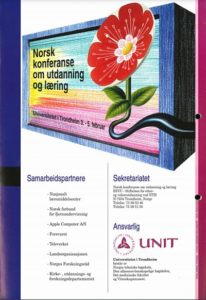 NKUL. Norsk konferanse om utdanning og læring. National conference on ICT in education. The first conference in 1995 was probably inspired by the success of TeleTeaching 93 and organized by several of the same people.
NKUL. Norsk konferanse om utdanning og læring. National conference on ICT in education. The first conference in 1995 was probably inspired by the success of TeleTeaching 93 and organized by several of the same people.
All NKUL programmes are archived on the web. Scrolling through the program of the first conference, three people in the plenary session recall several good memories: Morten Møller who worked in the EU commission for DG XIII – DELTA. Stig Klingstedt and Fred-Arne Ødegaard in the Norwegian Ministry of Education.
Mention NKUL because it has been an important annual conference in Trondheim. But I have never attended NKUL. Still hope that someone will invite me. Maybe to give a presentation on My Online Education World?
More online courses
Online education was still for special interested. In 1995 NKI had a total of 256 enrollments in online courses. But a growing number of colleagues agreed that the future of distance education was online. Still focusing on ICT-related topics, NKI introduced several new online courses and two new online programmes in 1995. I wrote study guides for four of the courses: PC-software, Internet, Web-presentations and English on the internet. The last one with the American-born linguist Curt Rice who later became Rector of OsloMet University.
Webpages and HTML
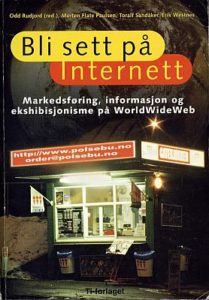
We realized that the web would have a major impact on online education and developed official webpages for NKI. I learned HTML by setting up my personal webpage at www.nki.no/~morten and bought the domain name norwaves.com to learn more about web-services. Used these experiences to write about webpages and HTML-editors in a chapter for the Norwegian book Bli sett på Internett.
My chapter also explained how to include pictures, audio and video files. With the distinct warning: “One should be aware that pictures, audio and video content will take much time to download, and many users will not have the necessary hardware and software to present it”.
Very few institutions considered to develop webpages. Many laughed when I predicted that even small businesses needed to be present on the web. So, I argued that the cover of our new book should show that even hotdog kiosks needed e-mail addresses and webpages.
1996 - Launching the first web based courses
With ENIAC and Al Gore at the Philadelphia Roundtable
New York, Philadelphia and State College in February. First, one night on Manhattan with Tennessee William’s A Streetcar Named Desire. Jet lag, comfortable chairs and a dark auditorium is not an easy combination.
Was invited with Stig Klingstedt from the Norwegian Ministry of Education to the «Philadelphia Roundtable on Adult Learning and Technology in OECD Countries». To present a paper I wrote with Torstein Rekkedal on technology for adult learning in Norway – including a case study on the NKI Electronic College.
The highlight – celebrating the 50th anniversary of ENIAC. To touch and see the world’s first large scale computer developed at the University of Pennsylvania. Vice President Al Gore’s Valentine’s Day speech commemorating the day as he threw a switch and the remaining part of ENIAC counted to 96 with two rows of blinking light bulbs.
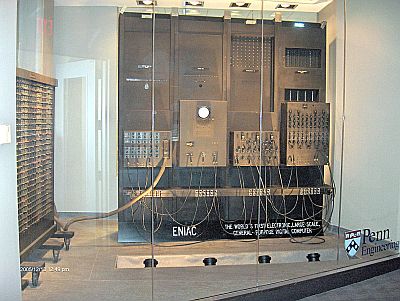
Photo: https://commons.wikimedia.org/wiki/File:ENIAC_Penn1.jpg
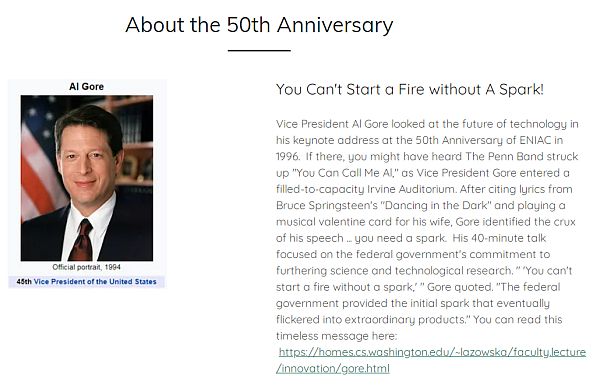
Screenshot from https://eniacday.org/eniac-trivia
As we continued to Penn State, the lack of progress with my thesis work was nagging me. Two kids and a full-time job improving and promoting the electronic college kept me busy. And it had been much more difficult to keep in touch with Penn State than I expected. The university web-services were in its infancy and it was hard to get the information I needed via e-mail. Like many doctoral students, I was occasionally frustrated with my first advisor since he was hard to reach. Probably because he was heavily involved with consultancy work in Africa. Far away from the internet.
Back at Penn State, I got a motivation boost when Gary Miller agreed to take over as my thesis advisor.
Breakthrough for courses on the web
1996 was the breakthrough year for web-courses at NKI. The webpages at www.nki.no/ekko were under continuous development and became an important channel for course marketing and distribution of course content to students. The year we launched the three first web-based courses without any printed course material or study guides: Web-presentations, Multimedia and Java-programming.
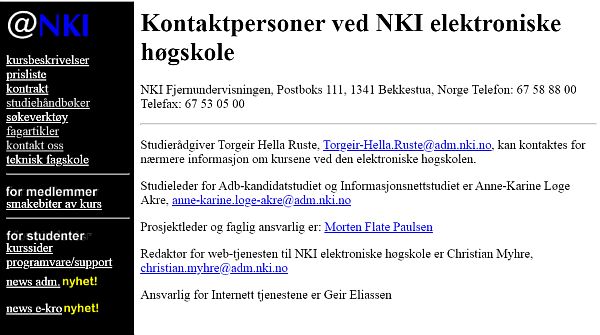
Screenshot of the NKI electronic college’s website with menu bar and contact people
The web-courses had three interesting new aspects for distance education:
- The online course material was integrated with opportunities to communicate with teachers and peer students.
- The costs for printing, storing and shipping of printed course material were eliminated.
- Revisions and updates of courses could be done swift with no need to throw away old versions of printed material or ship new versions to active students.
These NKI courses became the new model for revised versions of the 25 courses we already offered online. 25 different courses with about 450 enrolments and a revenue of more than 100.000 euro in 1996. In addition, NKI received several national and European project grants for innovations and development in online education.
Caught by the mobile phone revolution
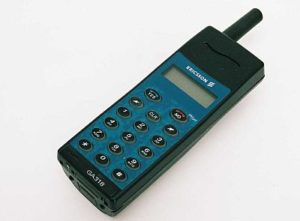
Photo: digitaltmuseum.org
I avoided telephones when I could. Used a desk top phone reluctantly at work. Preferred e-mail communication. The mobile technology fascinated, but threatened my need for concentration and occasional urge to escape a stressful life. Expensive and heavy mobile phones had been available for decades. But the mobile phone revolution was ignited when the first SMS was sent as a Christmas greeting in 1992. A revolution that reached Norway when GSM was introduced in September 1993 and NetCom broke Telenor’s monopoly. GSM, the new digital Global System for Mobile communication. Improved technology that made mobile phones affordable and possible to carry in pockets. Paved the way for SMS messages and a mobile lifestyle – chained to mobile phones.
In 1996, Ericcson and Nokia introduced affordable mobile phones for the consumer market. Suddenly, all adults I knew had a mobile. So, I bought an Ericcson GA318 just before the Olympic Games in Atlanta. In time to hear about the Olympic Park bomb.
Then I started to ponder how we could use the technology for distance education. Could it connect me to the internet? Be used for mobile learning? M-learning?
Introduced to Gruntvig by CTU in Nyhavn
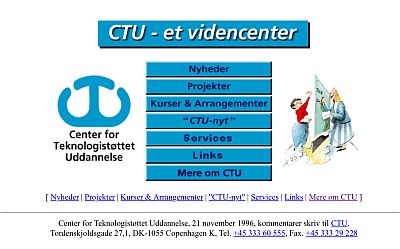 The Danish Centre for Technology-supported Education was established in 1995 and headed by Mette Ringsted. The center managed 100 million DKK over five years. Funded hundreds of initiatives for ICT based transformation of educational activities. Published much quality information on its website (see screenshot) and in its printed magazine.
The Danish Centre for Technology-supported Education was established in 1995 and headed by Mette Ringsted. The center managed 100 million DKK over five years. Funded hundreds of initiatives for ICT based transformation of educational activities. Published much quality information on its website (see screenshot) and in its printed magazine.
CTU invited me to Copenhagen in February to evaluate project applications as an external expert. Returned in May 96 and 97. Met Susanne Panduro, Nina von Staffeldt and Allan Christensen. Learned much about Danish initiatives and education during the evaluation work in the CTU-office. Even more over a few Tuborgs during the social breaks in the nearby Nyhavn area. Learned that the influential Danish philosopher Nikolaj Frederik Severin Grundtvig was the ideological father of the folk high school. Realized how much the social Danes enjoyed meeting face-to-face and that the tiny country had few geographical reasons to focus on distance education. Hence, its penchant for blended learning.
Searching for Alta Vista and Cyberius Zip
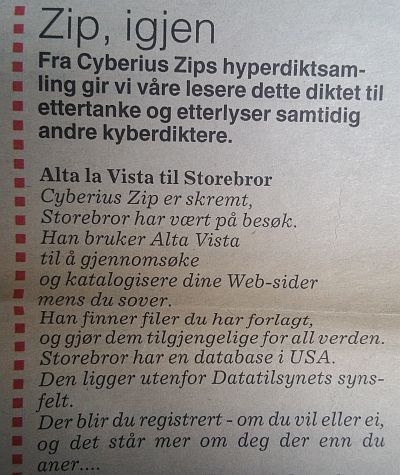
I was thrilled by the new opportunities to search the web. My alter ego was as always more skeptical about emerging technology. So, Cyberius Zip wrote a poem about AltaVista. The first online search engine. Launched by Digital Equipment Corporation (DEC) in December 1995.
But there were few online media channels for cyber poets. The first Norwegian online newspapers Brønnøysunds Avis and Dagbladet were launched in March 1995. Only preceded by Dusken.no – the newspaper for students at NTH in Trondheim.
Computerworld Norway launched its web-site in 1998. So, the poem translated below, was published in the printed version on May 24 under the heading:
Zip up. From Cyberius Zip’s collection of hyper poems.
Alta la Vista to Big Brother
Cyberius Zip is scared.
Big brother is paying a visit.
With Alta Vista,
crawling and mapping the web.
While we sleep in the bed.
He discovers files we misplace
and shares them with the world.
From a database somewhere abroad.
Outside the Norwegian Data Inspectorate’s jurisdiction.
We are listed and watched –
whether we like it or not…
1997 - Returning to Penn State for the ICDE World Conference
ICDE’s 18th World Conference at Penn State
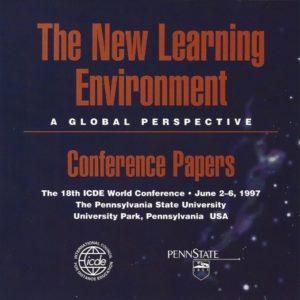 Returned to Happy Valley in June. For the 18th ICDE World Conference at Penn State University. Following the theme: «The New Learning Environment, A Global Perspective».
Returned to Happy Valley in June. For the 18th ICDE World Conference at Penn State University. Following the theme: «The New Learning Environment, A Global Perspective».
The welcome ceremony was held in the main hall of the huge Bryce Jordan Center. Welcome remarks were given by Penn State President Graham B. Spanier, ICDE President Armando Rocha Trindade, ICDE Secretary General Reidar Roll and Program Chair Gary Miller.
Proud that Gary was my thesis advisor. Hoped he was pleased with my latest thesis developments which I presented at the conference under the title «Teaching methods and techniques for computer-mediated communication». In a moderated panel with Sugata Mitra, Janet Mei-Chuen Lin and Douglas Shale.
Thinking of my thesis research, I joined a session on research and evaluation led by Michael G. Moore and Alan Tait at the Penn State Conference Center Hotel. Met Ingeborg Bø who gave a presentation about Quality Guidelines and Standards for the Standing Conference of Presidents. And my dear Norwegian colleagues Monica Johannesen and Leikny Øgrim at a College Avenue Restaurant. Toasting for Liz Burge who grabbed the microphone during the closing ceremony and asked if a woman could stand on the main stage.
Starstruck by talking to Nicholas Negroponte after his keynote. But even the most renowned experts appreciate positive comments after their presentations. The visionary founder of the MIT Media Lab and my favourite columnist in Wired presented the new electronic book concept. Fascinated since I read his printed book Being Digital with great interest. The influential 1995 publication revolving around digitalization of media and the shift “from atoms to bits”. Confirmed my conviction that all educational content could be created, stored and distributed digitally on the web.
So appropriate that we received the conference papers on the CD-ROM in the picture. Probably my first conference CD.
Earthquaked in Rome
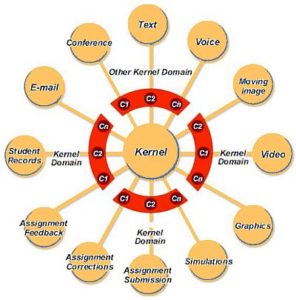 Back in Rome. Twenty-two years after I jumped into a taxi to see the Papal Basilica of Saint Peter and the Vatican. Terrified by the traffic and the hazardous speeding, I realized that I had asked the taxi driver to take us to St. Peter.
Back in Rome. Twenty-two years after I jumped into a taxi to see the Papal Basilica of Saint Peter and the Vatican. Terrified by the traffic and the hazardous speeding, I realized that I had asked the taxi driver to take us to St. Peter.
My first EU-funded project meeting. A Leonardo da Vinci project for development of web-based multimedia content for distance education. MMWWWK (Multimedia WWW Kernel for Open Learning and Distance Education). An important project because I gradually understood that it was possible to build a web-based learning management system. An LMS with a wide veriety of multimedia content and applications.
In the morning of September 26th, we had a project meeting on the third floor in an old building at Universita degli Studi di Roma III. As Torstein Rekkedal presented some thoughts on our kernel model showed in the picture, people started to look at each other when we heard a thunder bolt. I was ready to leave the room immediately when I felt the shaking. The Umbria and Marche earthquake in central Italy. It had a magnitude of 6.0 and the epicentre was in Annifo.
Later, we drove to Frascati to continue the meeting in the impressive Villa Borghese. And appreciated Italian hospitality and food in the excavated ancient cellar of a posh apartment in the Vatican City.
NKI’s project partners were Universita degli Studi di Roma III, Ericsson Systems Expertise and Distance Education International – both located in Dun Laoghaire near Dublin. Central project members were Fintan Costello, Benedetto Vertecchi, Emma Nardi, John Russell and Torstein Rekkedal. The project manager was Desmond Keegan. The renowned author of Foundations of Distance Education. A man who should mean a lot to me in the years to come.
Ten years with online education
In the fall, it was ten years since I taught the first distance education course through NKI’s EKKO learning management system. As we developed a growing number of online courses and services for the web.
Most of our online students still enrolled in the Information Processing Programme. Ten courses equivalent to a one-year full-time programme. Offered three different ways. Three cohorts with the same traditional written four-hour exams.
The online students were outnumbered by face-to-face students and correspondence students. It was not financially viable to offer only online courses, since too few people had access to PCs and modems.
So interesting and useful to follow and study three different student groups, hundreds of students in the same program. To find that online students got better exam results than correspondence students and on-campus students.
NKI was in a unique position with ten years of experience with development, operation and research. Just as online education accelerated with the web. And I shouldered the role as online education evangelist – both internally and externally. NKI’s press releases as well as my many presentations and publications made it easy for journalists to find me. One of the many newspaper articles I promoted online education in was published in Moss Avis on July 4th.
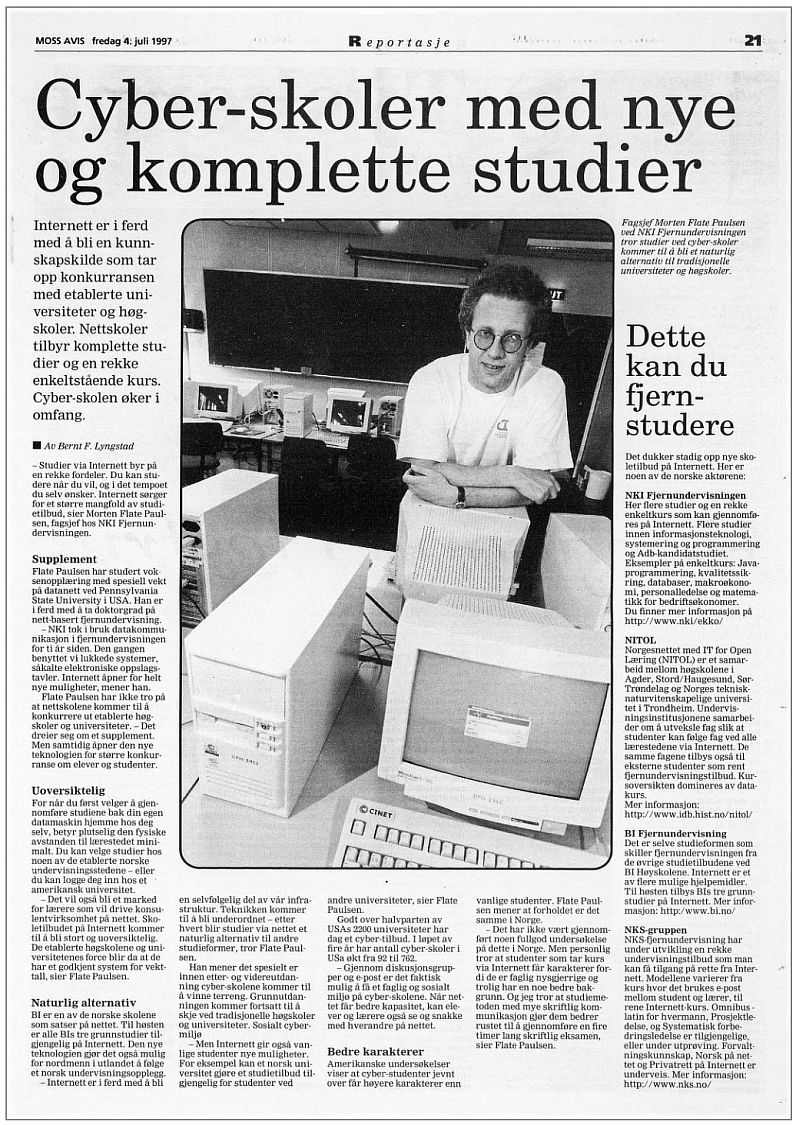
NITOL controversy
SOFF (Sentralorganet for fleksibel læring) was established in 1990 to support flexible education initiatives in Norwegian higher education. It provided grants to many Norwegian R&D-projects and one of the first major beneficiaries was NITOL (Norway-net with IT for Open Learning). An innovative and successful project organized by ICT and pedagogy departments at the four higher education institutions:
- The University of Trondheim, College of Art & Science
- Agder College of Engineering, Department of Computer Science
- Trondheim College of Engineering
- Stord College of Education
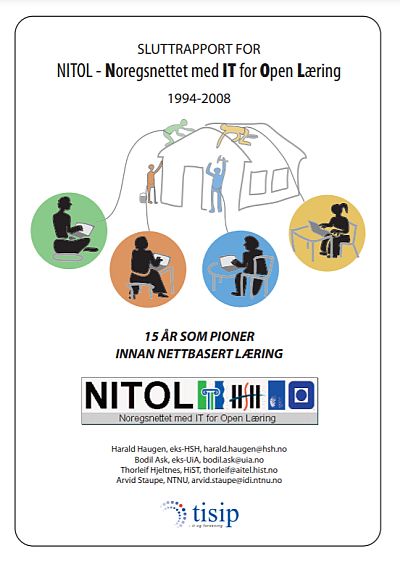
The hard-working pioneers in the project organisation were Arvid Staupe, Thorleif Hjeltnes, Bodil Ask and Harald Haugen.
The four institution first allowed their on-campus student to enrol in online courses developed by the other institutions. Later, they opened the courses for the general public. According to the TISIP Annual Report for 1997, Trondheim College of Engineering had 952 online course enrolments in the fall semester. On-campus students at the Swedish Midthögskolan also enrolled in the courses.
With this backdrop, SOFF invited me to join its first external evaluation group. The other members were Annette Lorentsen, Gunnar Grepperud and Sigmund Lieberg. Øystein Johannessen worked as SOFF’s internal secretary for the group. We had informative and interesting meetings at the Flesland Airport in Bergen 12.09.96, Ålborg 24.11.96 and Stord Haugesund 14.01.97.
The group’s mandate was to evaluate the didactic models used in the NITOL-project. The report resulted in a significant disagreement between the NITOL group and the evaluation group. Especially about how the mandate should be interpreted and which aspects of the project we should focus on. In short, the NITOL group argued that the evaluation report was too narrow and negative.
At the cursor moment, I compliment NITOL’s important contributions to online education from 1994 to 2008. The final report is recommended for those who read Norwegian. The discussion around didactic models is still useful since most online education innovations have been driven by technology rather than pedagogy. Something the establishment maybe have used to discredit online education initiatives.
My Tellurman Dream
I woke up exhausted, remembering the Norwegian athlete Knut Kvalheim told me that running marathon was nothing to brag about and that Ironman Triathlon was for wimps. He challenged me to be a Tellurman and I actually succeeded. In the dream.
My dream evolved to a business idea that never materialized. Maybe because it was before the Web 2.0 and app technologies were available. However, everyone is welcome to use it – if I’m credited for the idea. Maybe someone could pitch it for the Olympic Committee, Nike, Intersport or Strava?
Tellur is the Norwegian word for Tellurium, the chemical element with the symbol Te and atomic number 52. One electron for every week of the year. A rare, silver-white metalloid with a name derived from Tellus – the Latin word for Earth.
I registered www.tellurman.com and prototyped the screen shot web service where everyone could register personal results from their preferred Summer or Winter Olympic sports. Curling, archery, javelin, marathon, ice skating, downhill skiing etc. Any result, impressive or not, should be accepted if it was confirmed by a companion. But you could only register one result per event per calendar year. Everyone who registered at least 52 results in a calendar year could call themselves Tellurman of the specific year.
The website should present various statistics and competitive lists. It should be an honour to be high on lists like: First Tellurman of the Year, Most Tellurman events of the year and Most years as Tellurman.
My idealistic hope was to engage more people in physical activities and try out new sports together with friends. The business idea was to charge yearly fees to register results and sell Tellurman training gear.
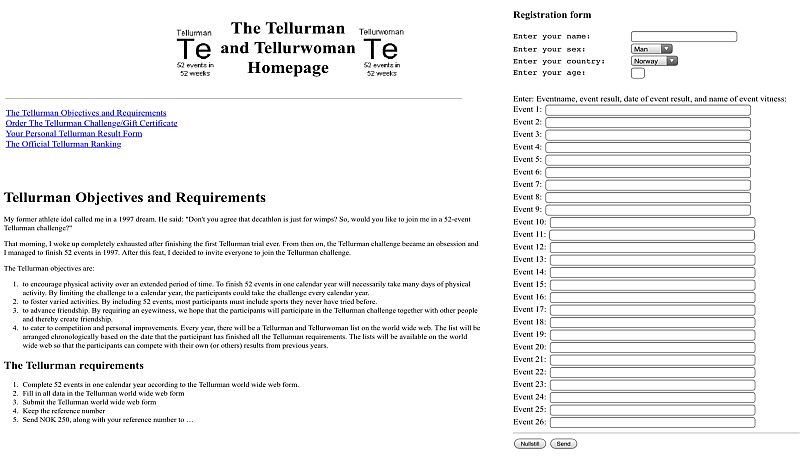
1998 - Defending the dissertation and starting Nettskoleavisen
Betting on London
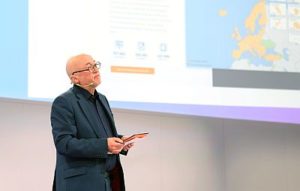 Bett – the British Educational Training and Technology Show. A huge conference and exhibition event in London started in 1985. A good excuse for a trip to London. An annual favourite for very many Nordic educators. In 1993, the Norwegian society of ICT in Education (Norsk pedagogisk dataforening) started organizing yearly study trips for about 100 members in conjunction with Bett.
Bett – the British Educational Training and Technology Show. A huge conference and exhibition event in London started in 1985. A good excuse for a trip to London. An annual favourite for very many Nordic educators. In 1993, the Norwegian society of ICT in Education (Norsk pedagogisk dataforening) started organizing yearly study trips for about 100 members in conjunction with Bett.
So popular that Nordic@Bett sessions have attracted several hundred participants. Arranged by national governments in Norway, Sweden, Finland and Denmark. Supported by the Nordic Council of Ministers.
Per Rune Eknes has covered Bett closely for Skolemagasinet and provided the 2020 Bett picture of Morten Søby, the Norwegian coordinator for Nordic@Bett.
My first and only visit was in January with a group of NKI colleagues. Some of us spent more time at the London Boat Show and in pubs than in the Olympia Exhibition Centre. My experience, however, is that you can learn more from good discussions with the right people in a pub than from an average conference presentation.
Falling in love with Portugal
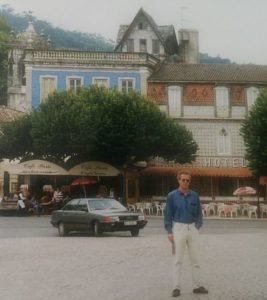 Ana Dias organized the first CISAER meeting in Sintra in June. The Portuguese UNESCO World Heritage Site. The mediaeval Castle of the Moors and the National Palaces of Pena and Sintra. Less known Monserrate Palace and my personal favourite Quinta da Regaleira. Close to Cascais and less than an hour with the train to Lisboa where we visited Expo 98. The World Fair that focused on «The Oceans, a Heritage for the Future» and commemorated 500 years of great Portuguese discoveries.
Ana Dias organized the first CISAER meeting in Sintra in June. The Portuguese UNESCO World Heritage Site. The mediaeval Castle of the Moors and the National Palaces of Pena and Sintra. Less known Monserrate Palace and my personal favourite Quinta da Regaleira. Close to Cascais and less than an hour with the train to Lisboa where we visited Expo 98. The World Fair that focused on «The Oceans, a Heritage for the Future» and commemorated 500 years of great Portuguese discoveries.
More important, we worked with CISAER. Courses on the Internet: survey, analysis, evaluation and recommendation. A project funded under the European Leonardo da Vinci action programme for the implementation of a European vocational training policy.
I learned a lot about online education initiatives around the world from this project and the project partners: Desmond Keegan, Robin Mason from the Open University in the UK, Ana Dias from Techminho in Portugal. Torstein Rekkedal and me from NKI.
We developed a comprehensive analysis of online courses based on literature reviews, catalogue data from 130 institutions in 26 countries and 72 interviews with key persons at these institutions. The analyses resulted in these strategic recommendations:
- Promote national and international harmonization of degrees, certificates, credits, and grades to facilitate online mobility of students.
- Oppose national regulations that inhibits institutions from charging tuition fees.
- Focus on cost effective online education.
- Develop better systems for administration of online education.
- Support initiatives for training of online teachers, administrators, and instructional designers.
- Oppose regulations and attitudes that inhibits online assessment.
- Support further research on online pedagogy and didactics.
- Develop and implement strategies to reduce the workload of online teachers.
Nettskoleavisen
In September 1998, we launched Nettskoleavisen. An online magazine with news from the NKI online college. Interviews with many online students and teachers. News about technological and pedagogical innovations. Results from surveys and research. A chronicle of NKI’s achievements with online education for more than a decade.
It was a joy to be editor for all 29 issues until the final one was published in November 2009. In my opinion a valuable and interesting recollection of our many innovations. Heyday achievements at Scandinavia’s leading online education institution. Twelve years of history from my online education world.
The first paragraph in the first issue focused on the growing number of online students. It can translate to:
After 10 years with a stable, but relatively low, number of students, interest in the Online School is now growing strongly. In 1995 we had 256 course enrolments, in 1996 the number was 416 and in 1997 it grew to 953. Our preliminary forecasts for 1998 indicate that we will end up somewhere between 2,000 and 3,000 course registrations. Most students enroll in several courses during a year, and the number of active students who now follow one or more of the Online School’s 30 courses approaches 500.
All issues of Nettskoleavisen are still available in Norwegian at http://nettskoleavisen.blogspot.com/
Screenshot of Nettskoleavisen’s home page
Doctoral ordeals
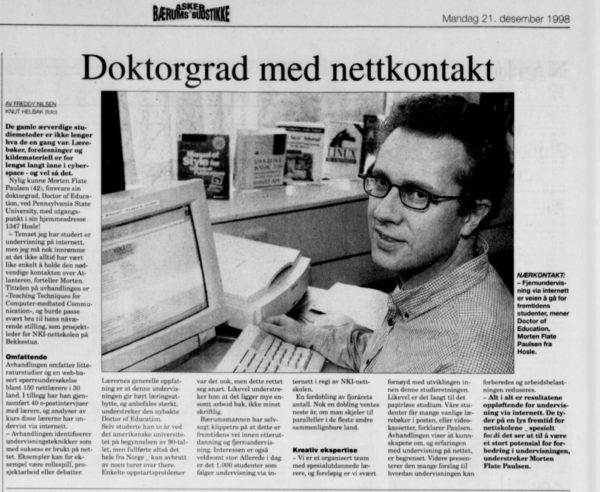 Worked long evenings to identify and describe over 20 online teaching techniques. To analyse online teachers’ perceptions of workload and student learning outcome related to each technique. Web questionnaire responses from 150 teachers in 30 countries. 40 e-mail interviews with 38 teachers. Assignment analyses of 23 courses.
Worked long evenings to identify and describe over 20 online teaching techniques. To analyse online teachers’ perceptions of workload and student learning outcome related to each technique. Web questionnaire responses from 150 teachers in 30 countries. 40 e-mail interviews with 38 teachers. Assignment analyses of 23 courses.
Concluded that the techniques had high learning outcome, recommendability and workload. However, the perception of workload varied considerably with technique and context. Encouraging results for the future of online teaching. Further, there was a gamut of teaching techniques applicable for teachers, program planners, and designers of CMC courses. Many recommended techniques available for inexperienced teachers. A substantial potential for improvement of CMC teaching in the future.
So, when schools in Norway closed for Fall break it was a good opportunity to bring the whole family of four back to Penn State and defend the dissertation. Departed from the old Fornebu Airport. Returned the day the new Gardermoen airport opened. The past and the future – symbolically separated by a dissertation.
A long and tiresome travel from Oslo via Reykavik to State College, Pennsylvania. Five hours in a rented car driving west on Interstate 80 from Newark airport. Ended up in line to be seated at a local diner at North Atherton Street. Saw seven-year-old daughter Andrea collapsing in the corner of my eye. Unconscious on the floor when we called 911. Endless, scared moments before she woke up as the ambulance arrived.
We spent the night at Center County Community Hospital. Andrea was diagnosed with flu, fever and dehydration related to the long travel. It was a though night for her and not the best preparation for my dissertation defence the next morning. In front of Gary Miller, Eunice Askov, David Jonassen and Kyle Peck.
We got through the ordeals and were both proud that daddy could pick her up at the hospital – as a doctor.
Screenshot from www.learntechlib.org/p/126604/
Brasilia keynote
Flying from Sao Paulo in October, I recalled the ecstatic midsummer eve in June. When Norway’s soccer team won 2-1 over Brazil at the World Cup in Marseille. Again. After defeating Brazil 4-2 at home in a private international match at Ullevåll stadium in May 97. I also remembered that Paulo Freire died the year before. The Brazilian advocate of critical pedagogy. Best known for his influential work Pedagogy of the Oppressed – one of the seminal texts of the critical pedagogy movement.
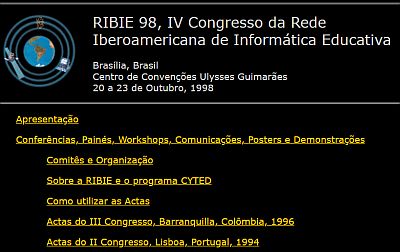
Looking out of the window before landing in Brasilia, the neighbour seat told me that Oscar Niemeyer had just turned 90. The impressive Brazilian architect that laid out the city as an airplane and design the civic buildings when Brasilia became the new Capital in 1960. Always curious about great works of architects like Gaudi, Hundertwasser and the upcoming Norwegian firm Snøhetta. Captivated by Niemeyer’s daunting challenge and exceptional work.
Invited by Fábio Chacón at Universidad Nacional Abierta de Venezuela to be Main Speaker at RIBIE’98. Arranged by the Iberoamerican Network of Educational Informatics. The largest association of scholars and practitioners dealing with educational applications of ICT in the Spanish and Portuguese languages. Several hundred people showed up to listen to my presentation titled: Online Education: Pedagogical, Administrative, and Technological Opportunities and Limitations. The other Main Speakers were Diana Laurillard from the UK Open University and Lucio Teles from Simon Fraser University in Canada. Our conference papers are still available via www.ufrgs.br/niee/eventos/RIBIE/1998/
ICDE think tank in Barcelona
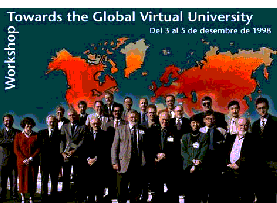 In December, I represented NKI at a think tank in Barcelona. Invited as one of twenty five key players in virtual university development from around the world. To discuss the potential of an ICDE Virtual University. Maybe inspired by the African Virtual University (AVU). A pan-African effort to create an open and affordable distance learning institution. Initiated as a World Bank project in 1997. Developed into an autonomous institution after it was handed over to African governments in 2003.
In December, I represented NKI at a think tank in Barcelona. Invited as one of twenty five key players in virtual university development from around the world. To discuss the potential of an ICDE Virtual University. Maybe inspired by the African Virtual University (AVU). A pan-African effort to create an open and affordable distance learning institution. Initiated as a World Bank project in 1997. Developed into an autonomous institution after it was handed over to African governments in 2003.
The workshop was hosted by President Armando Rocha-Trindade at Universitat Oberta de Catalunya (OUC). A pioneer open university, established in 1994, which still claims to be the worlds first online university. We met in OUC’s beautiful Rectorat Villa and stayed at Plaça d’Espanya near the Magic Fountain of Montjuïc and Palau Nacional.
The workshop did not have any tangible results, but I remember an excellent dinner with more than enough wine and several international leaders in the field. Among them: Secretary General Reidar Roll and President Armando Rocha-Trindade representing ICDE. Presidents from several prominent open universities in Asia. Helmut Hoyer from Deutche Färnuniversitet, Dominique Abrioux from Athabasca University and Gary Miller representing the World Campus at Penn State.
I was impressed by the Norwegian Secretary General. How he easily socialised with university leaders from around the world. Gave eloquent and impromptu speeches in English. Knew the formal protocols and mastered the English language. Competencies I wanted to learn.
Returning home early the next morning. In a mute taxi to the airport with Reidar Roll and Ana Perona. I realized that early morning headache could be part of the learning experience.
1999 - Sojourning Sweden, Svalbard and Sao Paulo
Scandinavian online education barriers
I believed there was a marked for online education across the Scandinavian borders. One more reason to visit Sweden three times in the last year of the millennium. First to the University in Gothenburg in February to establish Nordisk netthøgskole. My first attempt to start a formal Scandinavian online education initiative.
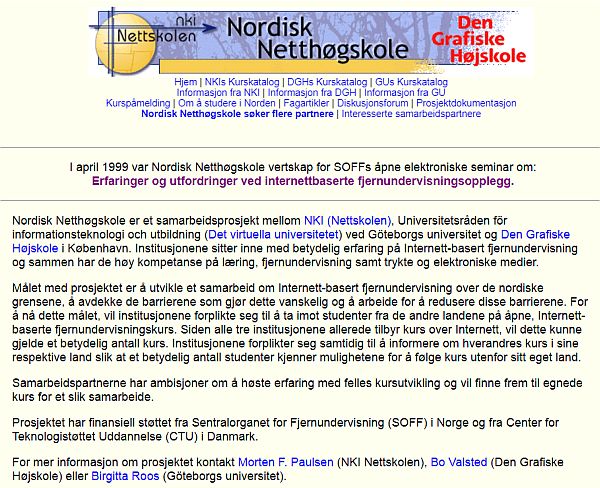
A 1999 screenshot of www.nnh.com
The project received financial support from SOFF in Norway and CTU in Denmark. The main project partners were NKI Distance Education in Norway, the virtual university initiative at the University of Gothenburg in Sweden, and the Graphic Arts Institute of Denmark. The aim of the project was to establish online education collaboration across the Scandinavian borders and to reveal barriers against such collaboration. But the project had limited success and like many other externally funded projects, it was discontinued when the funding ended.
However, the project revealed important barriers and the final project report discussed these nine:
- There is a lack of funding to support Scandinavian online education projects.
- Governmental slowness and bureaucratic indecisiveness make it difficult for formal programs to compete in a global, online education market.
- Even though Scandinavians have a mutual understanding of the Norwegian, Danish, and Swedish languages; they strongly prefer to use their own language.
- There are cultural and pedagogical differences between the countries that make it harder to collaborate.
- There is ongoing harmonization of degrees, credits, and grades in Europe. But there is still a significant lack of educational harmonization even between the Scandinavian countries, which makes collaboration difficult.
- A strong incentive for collaboration is the prospect of additional income. Norwegians and Danes seem to be much more open-minded than Swedes with regard to student fees for online education.
- New educational programs need marketing, and there are few advertising and marketing channels that cover the Scandinavian market.
- Scandinavian collaboration could benefit from exemplary, formal agreements and collaboration models that clearly demonstrate win-win situations. Such exemplary models and agreements are scarce.
- There is very little focus on online education as an export industry in the Scandinavian countries. Very few institutions have ambitions to offer courses abroad, not even across the Scandinavian borders.
Blended learning and Armagnac in Grythyttan
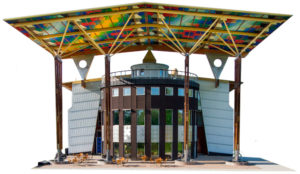
http://maltidenshus.com/
NKI Distance Education had a long and successful history with blended learning. Based on its correspondence courses and face-to-face classes arranged by local partners around Norway. So, in April, we invited our major partners to Grythyttan in Sweden. To discuss how we could offer blended online learning together. One of several memorable NKI seminars Anita Kjensli and Inger Gulbransen organized for NKI’s partners at Folkeuniversitetet and AOF.
My task was to explain how local study centres could organise blended learning based on our online courses. At the cursor moment, I’m sad to say that we never found a model that was both financially attractive enough for our local partners and worth the additional cost for the students.
But it was a culinary delight to stay at Grythyttan Gästgivargård and visit its impressive wine cellar. And a check-out chock for colleague Sveinung to receive the Armagnac bill. We still appreciated the visit to Måltidens Hus and Grythyttan’s Chef and restaurant management school run by the University of Örebro. Hosted in Sweden’s pavilion from Expo ’92 in Seville. A remarkable building that was transported to Grythyttan after the expo.
The Wenner-Gren Symposium, Y2K and virtual universities
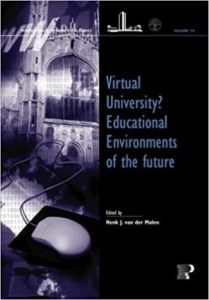 In October, I was invited to Stockholm as a speaker at the Wenner-Gren Foundation’s International Symposium “The Virtual University”. The private foundation was established by Axel Wenner-Gren in 1941. The wealthy Swedish entrepreneur who started the successful Electrolux company. A foundation with a long history of organising symposia and seminars for the advancement of anthropology throughout the world.
In October, I was invited to Stockholm as a speaker at the Wenner-Gren Foundation’s International Symposium “The Virtual University”. The private foundation was established by Axel Wenner-Gren in 1941. The wealthy Swedish entrepreneur who started the successful Electrolux company. A foundation with a long history of organising symposia and seminars for the advancement of anthropology throughout the world.
A simple question initiated the symposium: What will the university be like in the next millennium?
My contribution was titled “Online Education: pedagogical, administrative and technological opportunities and limitations”. As always, I was enthusiastic about the future of online education, but was asked if the year 2000 (Y2K) problem was a challenge for online education. Replied that we had seen a substantial enrolment increase in our COBOL programming course. To update programmers who had designed the vulnerable ICT systems decades earlier.
Following the seminar, Henk J. van der Molen edited the 2001 book «Virtual University?: Educational Environments of the Future«.
Memorable Svalbard phones
Longyearbyen in early May. The world’s northernmost town. Located at the island of Svalbard, far north of the Norwegian mainland. Norgesuniversitetet arranged a seminar about distance education at the university centre. I remember the beautiful midnight sun and the unique scenery from the fast-moving snowmobiles at the polar bear expedition.
We saw the majestic Operafjellet mountain were the Russian Vnukovo Airlines Flight 2801 crashed in August 1996. All 141 passengers and crew members were killed, making it the deadliest aviation accident ever in Norway.
Footprints from the bears were huge and not difficult to find. Reminders of the two separate 1995 instances where people were killed by polar bears. So, everybody had to bring a gun outside the town of Longyearbyen. But the students had to leave their guns at the entrance of the university centre auditorium. I realized that it could be unsafe to give a lousy presentation.
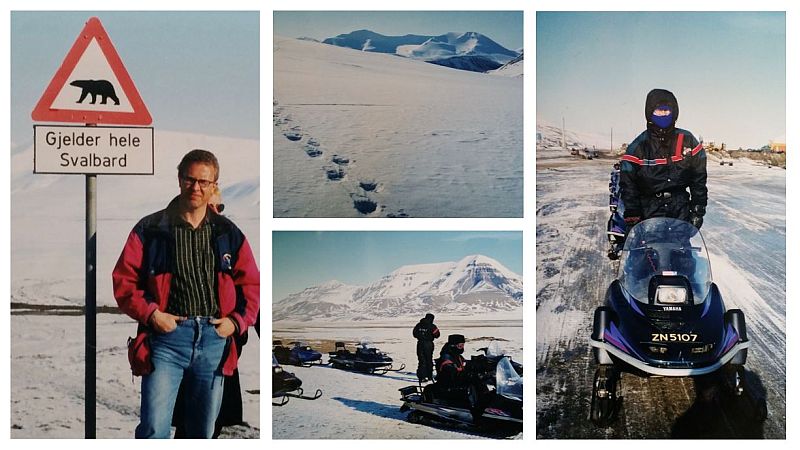
Stayed at Funken hotel where I had vivid discussions with the colourful, intellectual rebellion Tron Øgrim. About Euro – the new digital currency that was introduced in eleven countries January 1st. That Poland, the Czech Republic and Hungary just had joined NATO. About the artificial language Volapyk and the newly launched Iridium satellite telephone network. Launched the in 1998 to provide global telephone access through a network of 66 satellites. As freelance journalist, Tron had got hold of one of the very first Iridium phones and was able to call home to his mother via satellite from Svalbard.
The same day, I received a telephone call from Marith. She was so agitated that she talked English when she asked the receptionist to connect the phone call to my room. Even though the official language at Svalbard is Norwegian. After waiting for nearly five years, we were ready for our second adoption. We even got a picture of a cute Brazilian boy named Marciano.
Embracing Marciano
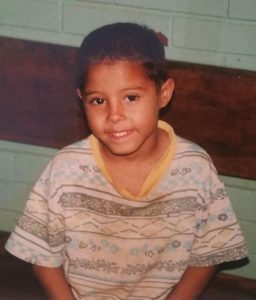
We left Gardermoen Airport the day after three members of the Orderud family were found shot and killed at their country estate half an hour from the airport.
Still a family of four, we stayed the first night in Sao Paulo and the second on the express bus going west. Arlete helped us check in. Two hotel rooms – the home of two adults and three kids for six weeks. Most families know that this could be a challenge even in more conventional settings. Before internet or mobile phones were available in rural areas.
The first afternoon, we had an appointment at the children’s home. Two bright eyes and a big smile showed up from nowhere. Marciano obviously knew us from the pictures we sent. Ran towards his new brother and embraced Stian. Slippers, shorts and T-shirt. Eager to leave with his blue backpack ready.
The next day was his sixth birthday. A ball and a watch wrapped in colourful paper placed in his bed. Boy hiding under sheets. What happened with his life? Buffet breakfast in the hotel’s crowded dining room. How do you explain a six-year-old how to behave in a very unfamiliar situation? With little command of his language? Well, you could never imagine how much food a boy’s plate could hold.
We ordered the largest birthday cake in town and brought it to the children’s home. What a party! The kids were all around. Climbing and hugging us. Begging to come with Marciano. Storming the fence when we left. Heart-breaking moments that stuck.
The kids’ local favourites were the ice cream parlour around the corner and the modest swimming pool at the hotel roof. Marci copied his older brother in everything. Obviously surprised to realise that he could not swim when they jumped into the swimming pool.
Spent a day at the country club playing soccer and sweating in the sauna. It was a much better experience than the depressing conditions in local Indian reserve.
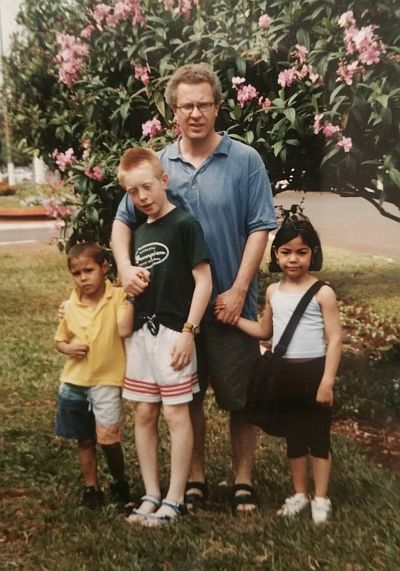 Rented a car and drove to beautiful Bonito. Rainy clouds ahead. The lonely dirt road through the jungle landscape was blocked by a caiman cadaver. Three greedy vultures feasting. Should we move the cadaver or spend a rainy night in the car?
Rented a car and drove to beautiful Bonito. Rainy clouds ahead. The lonely dirt road through the jungle landscape was blocked by a caiman cadaver. Three greedy vultures feasting. Should we move the cadaver or spend a rainy night in the car?
When we finally arrived, Bonito was like Garden of Eden. We rested under a tree with five wild and colourful macaw parrots. Lots of wild parakeets. Roadrunner birds we thought only existed in cartoons.
We snorkelled down the Sucuri river with schools of golden carps. Fed them with cheese doodles. One keen enough to leap half a meter above water and bite Marci’s cheese doodle finger. We rafted down a rapid, stopped for lunch and a swim. Fifty meters down the stream, we understood why the Portuguese only speaking guide was uneasy, pointing at the caiman at the riverbed.
Next day, Grotto Azul. Interviewed by a national TV crew as the only foreigners around. Lingering behind to feed the kids when everybody left. Looking for the car keys, only to find them in the front seat of the locked car. Finding a phone at a nearby farm. No idea how my Portuguese was good enough to explain the situation, but after a couple of hours a local wizard arrived on a motor bike with the necessary tools to open the car door.
Wow. We got an invitation to visit the land worker family of Andrea’s adopted twin brother. Equipped with photographs from Norway, small gifts and a football, we hoped to overcome the language barrier. Four shy twin eyes connected – understanding that they both enjoyed popcorn, juice and playing football. The next day, twin brother came along when we were invited to a nearby farm. Four kids riding horses, picking starfruits and watching animals. Memories for life.
Back home, Marci started first grade after just a couple of weeks in Norway.
New media experiences
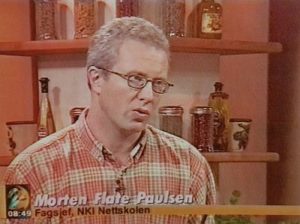 Online education needed media coverage to attract more potential students in Norway and I gradually thrived in the role as a prominent spokesperson for the field. Still introvert but excited by all the positive attention my online education passion and work created. In 1999, I wrote several magazine and newspaper articles. Was interviewed, cited and promoted in the major national newspapers and radio programs. Most notable were my op-ed in Aftenposten and my four feature stories in Computer World Norway.
Online education needed media coverage to attract more potential students in Norway and I gradually thrived in the role as a prominent spokesperson for the field. Still introvert but excited by all the positive attention my online education passion and work created. In 1999, I wrote several magazine and newspaper articles. Was interviewed, cited and promoted in the major national newspapers and radio programs. Most notable were my op-ed in Aftenposten and my four feature stories in Computer World Norway.
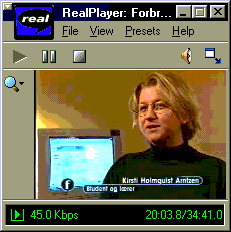
A new experience to be interviewed as an expert on online education in influential national television programs. First on NRK’s prime time feature program Refleks on January 20th with Kirsti Arntzen who was one of the estimated 5000 online students in Norway that year. We even got NRK’s permission to make the program available online through NKI’s new Real Media Server and 2 Mbps internet connection. These new developments made it possible for people to view video files online if they installed video player software on their PCs.
Later, interviewed by www.ventures.dk in two TV programmes about distance education on Danish national Television (DR1 and DR2) in April. Finally live on TV2’s Good Morning Norway on September 23rd. I vividly remember waiting backstage together with artists Tomine Harket and Jon Eikemo. All nervous before our five minutes in the spotlight.
The 2000s: Online Education Growth
The busy 2000 anecdotes were chronicled during 2022

2000 - Going to Beijing with IFIP
Canada SPICE
Athabasca University (AU) was established in Alberta in 1970. Offered its first degrees by distance education in 1976. Ten years later it established its Center for Distance Education to become a global leader in distance education. Home of prestigious online journal IRRODL (International Review of Research in Open and Distance Learning) when it published its first issue in June 2000. Peter S. Cookson, my venerated Penn State Professor, was the first editor. I was happy to be among the consulting editors with Terry Anderson, Tony Bates, Albert Sangra, Sally Reynolds, Marta Mena and many other internationally esteemed colleagues I knew from my work with DEOS and the American Journal of Distance Education.
I was also appointed Adjunct Professor at the AU, Centre for Distance Education from 1999 to 2005. An appointment that helped me recruit Gail Crawford at AU and Michael Spector at Syracuse University to the SPICE Board of Professors.
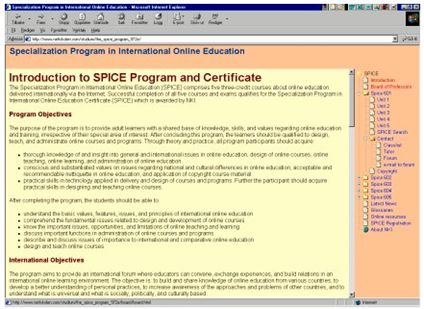 So, in January, I was excited when we introduced NKI’s three first courses in The Specialization Program in International Online Education (SPICE). A program intended for an international market which included the following five CTS credit courses:
So, in January, I was excited when we introduced NKI’s three first courses in The Specialization Program in International Online Education (SPICE). A program intended for an international market which included the following five CTS credit courses:
- SPICE 601 Introduction to International Online Education
- SPICE 602 Design and Development of Online Courses
- SPICE 603 Online Teaching and Learning
- SPICE 604 Administration Systems and Support Services for Online Education
- SPICE 605 International and Comparative Online Education
A group of master students from the University of Syracuse took part in an evaluation of the first three courses in the spring. In the fall, 11 Canadian students completed SPICE 602 with good results as part of the Master of Distance Education program at the University of Athabasca. In November, 17 employees at the University College in Narvik started SPICE 601.
We later got an agreement with DPU (Danish School of Education) granting students a Master degree in ICT Pedagogy if they completed the 30 ECTS credits from SPICE and 30 ECTS credits from DPU.
The old screenshot shows the passworded course content from the SPICE programme, and the SPICE homepage is archived at: web.archive.org/web/20081004212320/http://nettskolen.nki.no/in_english/spice/hovedside.html
Letter to the Newsweek Editor
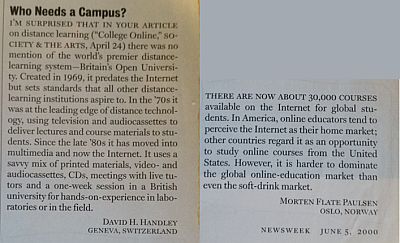
Working with the SPICE program, the TeleCampus database and several other international online education initiatives, it was discouraging to experience the online education barriers between the Scandinavian countries. To see the lack of interest in marketing online programs from Norway to an international audience.
I was concerned that the English-speaking world would dominate international online education. Aware that Australia focused on education as an export industry. Frustrated about how difficult it was to recruit international students to online programs in Norway. Could Norwegian institutions ever compete with institutions like “Britain’s Open University”?
So, when Newsweek published the April 24 feature article College Online, I responded with a lengthy letter to the Editor.
To my surprise, the magazine included the following paragraph from my letter on June 5th:
There are now about 30,000 courses available on the Internet for global students. In America, online educators tend to perceive the Internet as their home market; other countries regard it as an opportunity to study online courses from the United States. However, it is harder to dominate the global online-education market than even the soft-drink market.
My abridged comment about soft-drinks was a reference to the preface in Robin Mason’s 1998 book Global Education, were she stated: Unlike the soft drinks market, education is unlikely to be dominated by a few giant providers. Why? Because it is too difficult; there is too little money to be made, too many complex issues to handle, and too great a need for «people skills» rather than technical skills.
The Faroe Island on the radar and echo sounder
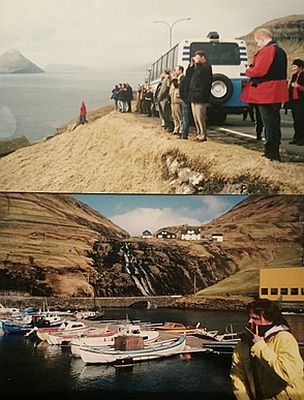 On April 7, we flew to Torshavn. Capital of the Faroe Islands. The exotic, barren and self-governed Danish islands. With a history, nature and language close to Norway. With many friendly locals who told me that they had studied in Norway.
On April 7, we flew to Torshavn. Capital of the Faroe Islands. The exotic, barren and self-governed Danish islands. With a history, nature and language close to Norway. With many friendly locals who told me that they had studied in Norway.
One more exciting workshop organized by Anita Kjensli and Inger Gulbrandsen. A pleasant adventure to travel with NKI colleagues and partners from AOF and Folkeuniversitetet. To discuss flexible education and to eat exotic wild birds or skerpi (air-dried mutton).
Remember the excursion we had with a local fishing vessel. Atlantic puffins and sheep in the steep cliffs. Tore Krogdahl’s seasick face watching the frightening waves. The remarkable navigation inside the caves by the sea cliffs. The fisherman’s statement: If bad weather ― we see seabed on radar and shoreline on echo sounder.
We also visited the Kirkjubøur village, maybe the islands’ most important historical site. With several links to Norway. Sverre Sigurdsson (King of Norway from 1184 to 1202) grew up in the village. Near the 12th century Saint Olav’s Church and the ruins of the Magnus Cathedral.
The private photos show the excursions led by Anita Kjensli and Inger Gulbrandsen.
Search4.edu and TeleCampus in the dot-com era
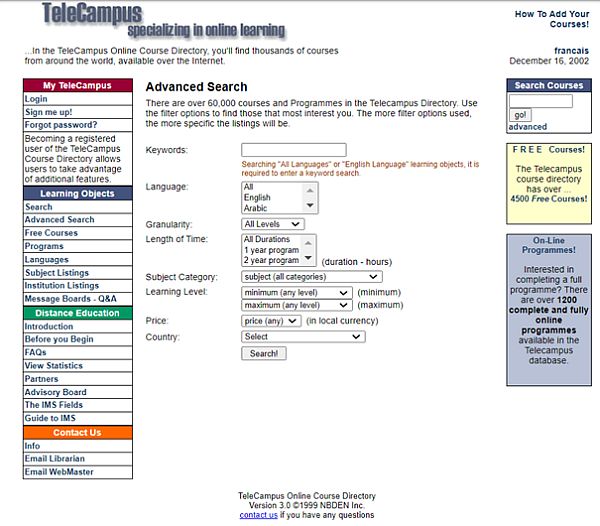
I was approached by CH & LO. They planned to establish an international portal for online courses. Based on a new, intelligent search engine. To sell online ads and charge institutions for course listings. The two Norwegian entrepreneurs wanted me as a partner in a start-up they called Search4.edu. Probably because I was on the Telecampus advisory board. Along with international experts such as Terry Anderson, Ulrich Bernath, Anne Forster, Linda Harasim, Desmond Keegan and Robin Mason.
Telecampus, the impressive database project headed by Rory McGreal at TeleEducation in New Brunswick. Listing 28000 distance education courses from 30 countries. The world’s leading website for students seeking information about online courses. And for institutions wishing to promote their offerings. A potential partner with a need for funding or other sources of income.
On April 14, the start-up team met with international experts and investors in a posh hotel suite at the Oslo Plaza. With a dream of becoming dot-com billionaires. Unfortunately, or not, we failed to find the necessary investors.
Maybe because the dot-com boom started to fade. Or maybe it was too early. The Bologna declaration had just been signed by education ministers from 29 European countries. A declaration aiming to unify Europe in a three-tier system of Higher Education: Bachelor’s; Master’s and PhD degrees. Paving the way for the much more successful www.StudyPortals.eu which started out as www. MastersPortals.eu in 2007.
The screenshot is from https://web.archive.org/web/20021216234131/http://courses.telecampus.edu/search/index.cfm?fuseaction=advSearch
In Beijing with Jiang Zemin
Jiang Zemin, President of The People’s Republic of China, spoke at the opening ceremony in Beijing, August 20.
We attended the 16th IFIP World Computer Congress. Along with about 2000 participants from all around the world. IFIP, the International Federation for Information Processing, celebrated its 40th anniversary. Peter Bollerslev from Denmark was IFIP President, and the conference theme was Information Processing Beyond Year 2000.
My energetic friend Jan Wibe was already appointed chair of the International Program Committee for the next IFIP Congress to be held in Montreal in 2002. His promotion of IFIP convinced several of my Norwegian colleagues to join the Beijing congress. I presume he also proposed the session with me as invited speaker and Kjell Atle Halvorsen as chair. So, I gave a one-hour presentation titled An International Analysis of Web-based Education and Strategic Recommendations for Future Development of Online Education.
We spent social breaks discussing recent international news. That 113 people died when the Air France Flight 4590 crashed with one of the iconic Concordes in Paris on July 25. Further 118 when the Russian nuclear submarine K-141 Kursk sunk August 13. After an onboard explosion in the Barents Sea near the coast of northern Norway. That the just elected Russian President Vladimir Putin called the newly elected Norwegian Prime minister Jens Stoltenberg. To thank him for the assistance provided by Norwegian divers and naval experts.

It was convenient to stay at Beijing Continental Grand Hotel which was connected by a passage to the Beijing International Convention Centre. But it was impossible for me to read menus at local restaurants or ask people for direction. I nearly got lost as a tourist on my own. So, I printed the above note from the conference website.
The memorable concert at the Beijing Opera House was excellent. But the Chinese gentleman next to me was obviously eager to show off with his new mobile phone. Some of us were really annoyed when he had several loud-mouthed mobile conversations during the concert.
We visited the impressive Ming Tombs, Great Wall, Forbidden City and the Summer Palace. The Tiananmen Square brought back memories of the student-led demonstrations during 1989. The tanks and armed troops firing at the demonstrators. Hundreds died; thousands were wounded. Making us worried about China’s growing power and disrespect for human rights.
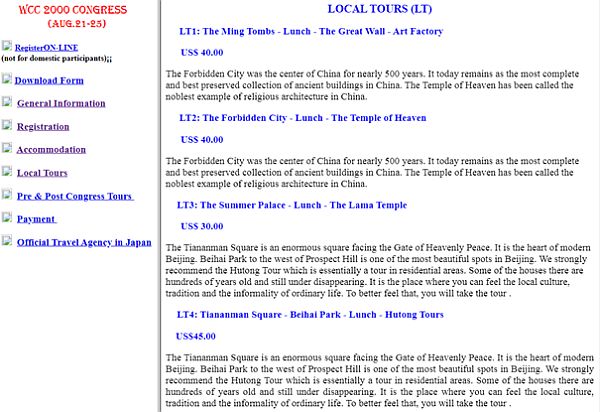
The Ivette workshop in Barcelona
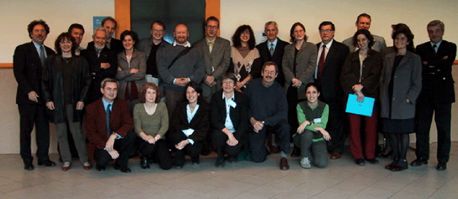 Mario Barajas invited us to the University of Barcelona in November. The second of many visits to one of my favourite cities. Known for the works of Antoni Gaudí and Joan Miró. The scene of Ildefonso Falcones’ fascinating 2009 novel The Cathedral of the Sea. The title of Freddie Mercury’s legendary hit with Montserrat Caballé highlighted during the 1992 Summer Olympics.
Mario Barajas invited us to the University of Barcelona in November. The second of many visits to one of my favourite cities. Known for the works of Antoni Gaudí and Joan Miró. The scene of Ildefonso Falcones’ fascinating 2009 novel The Cathedral of the Sea. The title of Freddie Mercury’s legendary hit with Montserrat Caballé highlighted during the 1992 Summer Olympics.
We were 20 experts at the Ivette workshop Implementation of Virtual Enviroments in Training and Education from November 16-18. Including Armando Rocha-Trinidade, Claudio Dondi, Alfredo Soeiro, Friedrich Scheuerman, Kathy Kikis and Martin Owen.
My paper Online Education – An International Analysis of Web-based Education and Strategic Recommendations for Decision Makers was later translated to Spanish and included in the workshop book. The book was titled La tecnología educativa en la enseñanza superior: entornos virtuales de aprendizaje, edited by Mario Barajas and published by McGraw-Hill in 2003.
It gave me an inspiring boost to realize that some of my papers now were translated to Spanish, Italian and Portuguese.
The photo is from http://www.ub.edu/euelearning/IVETTE-workshop/list.htm
The Danish Parliament and FLUID
Felt honoured and important when I was invited to Landstingssalen at the Christiansborg Palace. The historic auditorium inside the Danish Parliament. To present some analyses and strategic recommendations for online education. At a May 24 conference for Danish politicians and decision makers.
Later, on December 5th, NKI’s Chief Marketing Officer Elisabeth Møystad flew with me to Copenhagen. Vice President Al Gore had not yet conceded defeat to George W. Bush after the very close US presidential election. But we discussed the Rapaport project. Managed by John Russell. The integration between STAS (NKI’s student administrative system), our learning management system and our marketing pages. How we best could personalize and improve our web-courses based on all the information in STAS about students, courses, grades, prices, payments etc.
We were invited by FLUID (the Danish Association of Flexible Education) to present NKI’s experiences with online education. And looked for new opportunities and partners in the Danish market.
Our presentation was titled NKI Nettskolen – 15 Years of Online Education and included the slides below which summarized the status of our achievements.
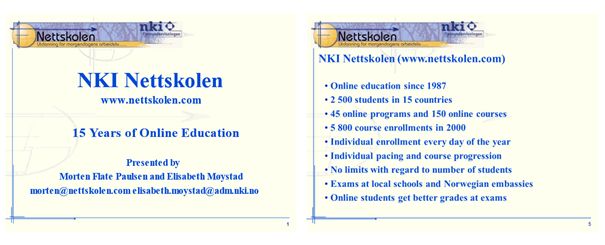
Two slides from the FLUID presentation.
2001 - Introducing m-learning
Booked in Norway and Denmark
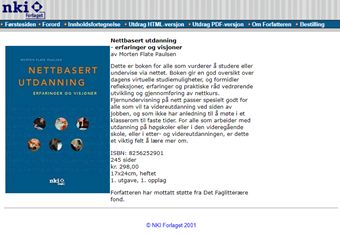 Got a grant to write a book. From the Norwegian Non-Fiction Writers and Translators Association (NFFO). So, in January – after months of work, it was awesome to see it in print. A book in Norwegian presenting my online education experiences and visions. Titled: Nettbasert utdanning – erfaringer og visjoner. Thrilling to find it in local libraries and bookstores.
Got a grant to write a book. From the Norwegian Non-Fiction Writers and Translators Association (NFFO). So, in January – after months of work, it was awesome to see it in print. A book in Norwegian presenting my online education experiences and visions. Titled: Nettbasert utdanning – erfaringer og visjoner. Thrilling to find it in local libraries and bookstores.
The blue cover followed by 245 pages. Comprising eight case descriptions and five sections:
1: Online education status and trends in 2000
2: The Online Students
3: Developing and teaching online courses
4: Administrative challenges
5: Globalization and the future of online education
Pleased that Morten Søby provided an insightful postscript. That online teachers and students would share their advice. That Øystein Mjelve wrote the preface and took it for granted that the book would be available on the Internet. So that Truls Fagerberg developed a website with much of the book’s content. Still available in the Internet Archive.
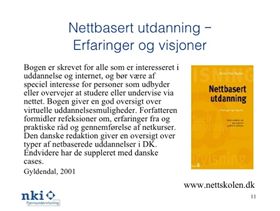 The book sold quite well in Norway and was referred to in several newspapers and articles. Resulted in many interviews and invitations to Scandinavian seminars. So, the Danish publishing house Gyldendal agreed to publish a Danish version. With editorial support from the Danish scholars Jane Andersen and Bent B. Andresen. Adding an overview of online education in Denmark and some Danish case descriptions.
The book sold quite well in Norway and was referred to in several newspapers and articles. Resulted in many interviews and invitations to Scandinavian seminars. So, the Danish publishing house Gyldendal agreed to publish a Danish version. With editorial support from the Danish scholars Jane Andersen and Bent B. Andresen. Adding an overview of online education in Denmark and some Danish case descriptions.
Decided to established www.nettskolen.dk. A portal for the Danish book as well as my other activities in Denmark which is available in the Internet Archive.
2001 presentations
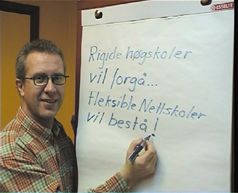 In 2001, I was busy lecturing about online education. I presented content from my new books at seminars in Oslo and Lillehammer, at Aalborg University in Denmark as well as Midthøgskolan Härnösand and Ericsson University in Sweden.
In 2001, I was busy lecturing about online education. I presented content from my new books at seminars in Oslo and Lillehammer, at Aalborg University in Denmark as well as Midthøgskolan Härnösand and Ericsson University in Sweden.
Introductory picture in my 2001 book. The provocative rhyme could translate to:
Rigid high schools will derail…
Flexible net schools will prevail!
Most memorable were the lectures I made in English in May. Paulo Dias invited me to give a plenary speech titled Online Learning Environments on May 10. At the international conference Challenges 2001 held at the University of Minho in Portugal.
On May 3rd at the Ericsson University in Kista in Sweden. It was titled Online Teaching and came as the successful mobile phone company encountered tough competition and considered a joint venture with Sony. Just before my presentation, the employees received internal information that Ericsson planned to lay off 5000 employees in Sweden. No need to say that the audience was in a terrible mood.
M-learning with Ericsson
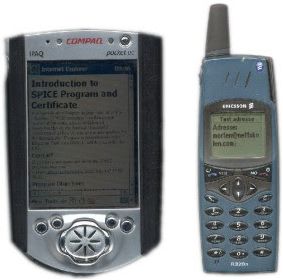 NKI started its first mobile learning project in 2001. From e-Learning to m-Learning. Funded by the EU Leonardo Project and led by LM Ericsson in Dun Laoghaire, Ireland. The other project members were Distance Education International in Ireland, Universita degli Studi di Roma III in Italy, and FernUniversität in Germany. During 2001 we studied international experiences with m-learning, analysed technological solutions and pedagogical needs.
NKI started its first mobile learning project in 2001. From e-Learning to m-Learning. Funded by the EU Leonardo Project and led by LM Ericsson in Dun Laoghaire, Ireland. The other project members were Distance Education International in Ireland, Universita degli Studi di Roma III in Italy, and FernUniversität in Germany. During 2001 we studied international experiences with m-learning, analysed technological solutions and pedagogical needs.
In the spring, we chose to build a learning environment around PDAs (Compaq iPAQ 3630 and 3660) and mobile phones (Ericsson T39 and Ericsson R580). As illustrated in the picture, I used these gadgets to demonstrate mobile access to our two online courses Tutor in distance education and Introduction to International Online Education (SPICE 601).
SESAM
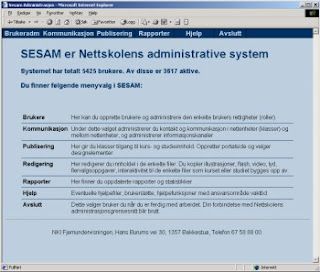 Open sesame!
Open sesame!
March 12th reminded us of the magical phrase in Ali Baba and the Forty Thieves. The famous fairy-tale from One Thousand and One Nights.
John Russell conducted the official opening of SESAM 3.0. The first version that was integrated with NKI’s student administrative system (STAS). A major update of NKI’s third generation Learning Management System. – SESAM, a catchy acronym for our inhouse developed Scalable Educational System for Administration and Maintenance.
This was a crucial moment. We had reached 10 000 enrolments in online courses during a period of fifteen years. Several thousand online students got new LMS features based on data logged in STAS over many years. Including two decades of data about NKIs correspondence courses and students.
A system conceived and proposed in the internal RappApport proposal written by John Russel and me on March 12, 1998. Specified in NKI’s Rapaport project before the new millennium. Developed with Java programmes and an Oracle database. One of the first LMS systems to integrate with student administrative and accounting systems. A web based LMS that handled user login and access control, personalized user interfaces, communication services, class lists, student presentations and a number of administrative functions and reports for teachers and staff.
The backbone of NKI’s online education innovations and successes the next 12 years. My dream and passion as Director of Development for our online education activities. Continuously improved by enthusiastic in-house developers.
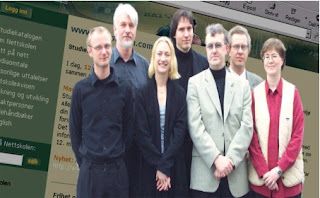 The initial SESAM development team is shown in the picture. From left: Tommy Skodje, Stein Bredal, Elsa Brådland, Truls Fagerberg, John Russel, Morten Flate Paulsen and Bente Midtsveen.
The initial SESAM development team is shown in the picture. From left: Tommy Skodje, Stein Bredal, Elsa Brådland, Truls Fagerberg, John Russel, Morten Flate Paulsen and Bente Midtsveen.
The team got important support from Kristin Vigander and intern students Rune Hellem, Marcello Scotto and Isatou Kaira.
This started a decade of evolutionary system development with frequent updates and new releases of functionality in SESAM. SESAM 4.0 and 4.1 were introduced in October and December with several updates for students, teachers and administrative staff:
- Students could see the grades of their submitted assignments
- Teachers could register and check grades on submitted assignments
- The administration got more and better statistics about the activity in the LMS
- Teachers could see how much they earn
- Improvements to the forum system
- Relaunch of Pedagogen, our forum for online teachers
- Easier printing of course content
- Improved personal presentations
- Animated flash demonstration of the web services that are part of a typical course
The ICDE World Conference in Düsseldorf
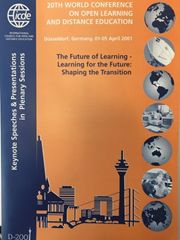 In April, ICDE’s 20th World Conference was hosted in Düsseldorf by the German FernUniversität. Located in the Düsseldorf Congress Centre on the banks of the river Rhine.
In April, ICDE’s 20th World Conference was hosted in Düsseldorf by the German FernUniversität. Located in the Düsseldorf Congress Centre on the banks of the river Rhine.
My first visit abroad after Norway on March 25 became a member of Schengen. The European legislation making travelling easier to all European countries except from UK, Switzerland and the Balkans. Substituting internal border controls within the Schengen Area with stricter controls at the external borders.
The conference was titled The Future of Learning- Learning for the Future: Shaping the Transition and focused on the convergence of open, distance and virtual learning.
1200 participants from 85 countries could choose between 150 conference sessions, accompanying exhibitions and a typical German conference dinner on Rhine River boats. The conference also provided an internet café since Internet access was hard to find in hotels and conference venues. However, something important started to happen after an alliance of vendors in 1999 decided to collaborate on the IEEE802.11 wireless communication standard. A standard they termed WiFi.
I was one of the many members of the International Programme Committee chaired by Helmut Hoyer, Rektor of the FernUniversität. Recognized for the first time a presentation about Learning Objects and the SCORM e-learning standard that was introduced the year before. Heard about a free online encyclopaedia that was launched in January. Developed by a community of volunteers working for Wikipedia.
Observed that most papers still focused on traditional distance education. Read the collection of nine papers about Student Services at the UK Open University. Written by David Sewart, Mary Thorp, Greville Rumble and others. Eighty pages including tentative conclusions that “…web-based courses have the potential to be more cost efficient than television based distance learning courses, but are less efficient than radio or print-based courses”.
So, it was nice to be on a discussion panel with representatives of some of the few institutions having extensive experiences with: Converting Print-based Distance Education Programs to Online Distance Education Programs.
In the panel, Dominique Abrioux, Peter Cookson and Alan Davis represented Athabasca University. Jocelyn Calvert from Deakin University and Bruce King from University of South Australia presented Australian experiences. My mentor and supervisor Torstein Rekkedal and I shared our NKI findings. Findings we already had presented in the IRRODL article: The NKI Internet College: A Review of 15 Years Delivery of 10,000 Online Courses.
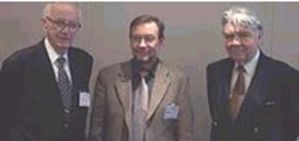 My most memorable conference moment came when Torstein Rekkedal was awarded the ICDE Prize of Excellence for Lifelong Contribution to the field of open learning and distance education. He was the third person in ICDE’s history to receive this prestigious prize. The two previous recipients were Otto Peters and Börje Holmberg and I was able to convene the three of them for a photo session.
My most memorable conference moment came when Torstein Rekkedal was awarded the ICDE Prize of Excellence for Lifelong Contribution to the field of open learning and distance education. He was the third person in ICDE’s history to receive this prestigious prize. The two previous recipients were Otto Peters and Börje Holmberg and I was able to convene the three of them for a photo session.
September soccer
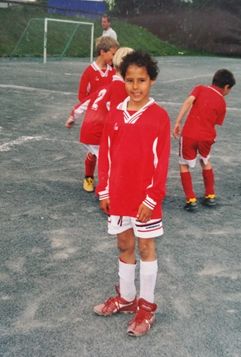 Eight-year-old son Marciano had started third grade. Still struggling to catch up with his classmates who grew up with the Norwegian language. A charming boy who easily got friends. Five close buddies who still take care of each other. Others who tricked him into pranks they knew were easy to blame on him. So, we had frequent visits to the headmaster’s office and devoted many hours to catch up all nuances of the Norwegian language.
Eight-year-old son Marciano had started third grade. Still struggling to catch up with his classmates who grew up with the Norwegian language. A charming boy who easily got friends. Five close buddies who still take care of each other. Others who tricked him into pranks they knew were easy to blame on him. So, we had frequent visits to the headmaster’s office and devoted many hours to catch up all nuances of the Norwegian language.
As a daddy of Brazilian kids, I spent a lot of time as a soccer dad. Driving the kids and their friends to matches, training and activities. Even bought a 7-seat Opel Zafira to have additional space for teammates.
On September 11 we were at Haslum training field with Marciano’s soccer team. I had been up much of the night to follow the parliamentary election. Which resulted in a centre-right coalition with Kjell Magne Bondevik of the Christian Democratic Party as the new Prime Minister.
At the side line, the soccer parents discussed the rebellious period of Mette-Marit Tjessem Høiby. The commoner and single mother who had just married Crown Prince Haakon. When one of the parents got the first news of the Manhattan terrorist attack. Back home, we followed the horrifying TV-footage from the al-Qaeda attacks. Saw the Twin Towers collapsing as I remembered the striking view from the rooftop.
Learned later that 2927 people died in addition to the 19 al Qaeda hijackers. That four Boing 767 and 757 from United Airlines and American Airlines took off from Boston, Washington and New Jersey. Heading for the major symbolic sites in America. The World Trade Centre, Pentagon and the White House or Capitol Hill.
Events that defined the presidency of George W. Bush, changed international aviation and impacted the world for decades.
2002 - Touring Universities in Australia
The Hong Kong break
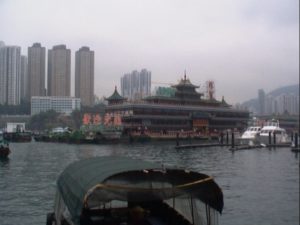 Hong Kong, one of the most developed and densely populated cities in the world. The former British colony that was transferred to China when the 99-year lease ended in 1997. A formal event attended by Prince Charles, Prime Minister Tony Blair and Governor Chris Patten. President Jiang Zemin gave an optimistic speech about the future of one country, two systems.
Hong Kong, one of the most developed and densely populated cities in the world. The former British colony that was transferred to China when the 99-year lease ended in 1997. A formal event attended by Prince Charles, Prime Minister Tony Blair and Governor Chris Patten. President Jiang Zemin gave an optimistic speech about the future of one country, two systems.
On January 25th, we made a 15-hour stopover on the way from Amsterdam to Brisbane. Had lunch at Stanley Market discussing whether the principle of one country, two systems was going to work. Continued with bus to Lantau Island to visit the Tian Tan Buddha (Big Buddha). Ended up with dinner at Newton Hong Kong Hotel.
Pleasant memories that made it easy to sympathise with my Hong Kong friends and the thousands of protesters who were arrested during the huge demonstrations during 2019 and 2020. Worrying memories on how blatantly China disregarded the one country, two systems principle negotiated with the United Kingdom before the 1997 takeover.
Tour de Australia
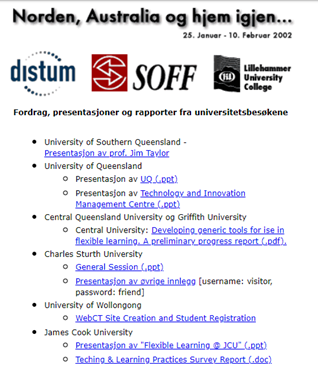 From January 25 to February 10, thirty Norwegians and thirteen Swedes participated in an unforgettable traveling seminar. Much time spent discussing and reflecting upon differences and similarities between the educational systems in Norway, Sweden and Australia.
From January 25 to February 10, thirty Norwegians and thirteen Swedes participated in an unforgettable traveling seminar. Much time spent discussing and reflecting upon differences and similarities between the educational systems in Norway, Sweden and Australia.
The seminar was arranged by the University College of Lillehammer, which developed a website with information about the seminar and articles written by participants (australia.hil.no).
The Lillehammer team deserves a lot of credit for making the travelling seminar one of the best experiences in my professional life. The MPI certified Per Eriksson had perfect control over all itinerary details. Mette Villand, Torild Schulstok, Martin Rønningen, Kjell Ivar Iversen, Geir Haugsback and Svein O. Haaland supervised with knowledge and social skills.
There were so many interesting and experienced participants to learn from. Spent much time with Gunnar Myklebost, Vigdis Amundsen, Tore Hoel, Grete Jamissen and Bodil Ask. Colleagues that became friends.
Learned much about distance education in Sweden from Katrin Holmgren, Brittmarie Myringer, Mats Ericson and Carl Holmberg. Mats Ericson, the director general of the newly established Swedish Netuniversity (Nätuniversitetet). The short-lived governmental initiative that provided 41 million Euros for online education in Sweden during its first two years. Carl Holmberg, the wise gentleman who was elected executive committee member at the EDEN 2001 conference in Stockholm.
Started with a get together session at Ibis Brisbane Hotel. Took the bus to Toowoomba and the University of Southern Queensland. The City Cat ferry boat to the University of Queensland. By foot to the Central Queensland University. Went on to Griffith University.
Left Brisbane by bus. With a short stop at Surfers Paradise to get a taste of the Gold Cost before we checked in at Byron Bay Beach Club. Learned that it was acceptable to bring wine to a restaurant from a bottle shop across the street. If the restaurant was not permitted to sell alcoholic beverages. We even collected enough money to buy a bottle of wine when we performed with a local street musician.
After two days of internal seminars and some leisure time, we flew from Brisbane to Sidney. Stayed at the Millennium Hotel and visited the University of Technology. Were lucky to get tickets to Figaro’s Marriage at the Sidney Opera Hose.
Took the ferry boat to Manly and had a photo stop at Nort Point Manly. An unforgettable day with Charles Sturt University staff. A splendid evening at the Radisson Kestral Hotel with plenty of good food and University labelled wine. Followed vigorous amateur performances of Australian and Scandinavian national songs and dances. Happy that it was not me who need to visit the hospital after stumbling down the stairs.
Spent a day at the University of Wollongong before we flew to Cairnes and checked in at Cairnes Colonial Club. Visited James Cook University and Green Island where we snorkelled at the Great barrier reef. Trilled to swim among green turtles, giant clams, fluorescent corals, and fish of all colours.
Happy Hour University
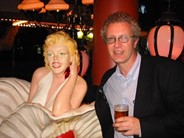 I first understood the cultural difference between Australian and Scandinavian educators on the Queensland bus tour. As usual, I chose to change seat and sit with another colleague after each pit stop. To pick new brains. Unfortunately, I can’t remember who made me realize that contrary to Scandinavian educators, the Australians perceived education as an export industry.
I first understood the cultural difference between Australian and Scandinavian educators on the Queensland bus tour. As usual, I chose to change seat and sit with another colleague after each pit stop. To pick new brains. Unfortunately, I can’t remember who made me realize that contrary to Scandinavian educators, the Australians perceived education as an export industry.
One evening we went to a restaurant to experience local dishes of kangaroo and crocodile meat. There, we had to wait in the bar with Marilyn Monroe until a table was available. We ordered and paid for one drink each but didn’t realize it was happy hour before we all had drinks in both hands. The table was soon ready, the drinks hurriedly finished, and our spirits rose rapidly.
The next day we met with a zealous international relations officer at an Australian university who proposed to establish collaborative master’s degrees, allowing students to spend one year in Scandinavia and one year in Australia. His scheme included offering students two master’s degrees, one from Scandinavia and one from Australia. Then, I immediately realized that I wanted to retire in an Australian Beach house and establish a company with the slogan Happy Hour University: Get two degrees for the price of one.
More seriously, I summarized my Australian experiences in the IRRODL article: Online Education Systems in Scandinavian and Australian Universities: A comparative study.
Available at http://www.irrodl.org/index.php/irrodl/article/view/104/559
Verkmenntaskólinn and termal tubs in Akureyri
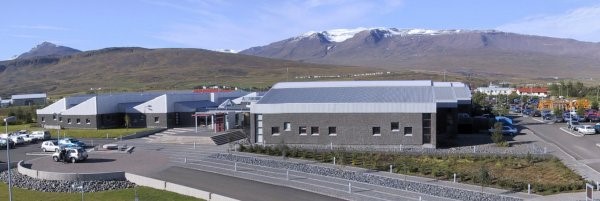
Picture from www.vma.is/is/moya/page/skolinn
In May, 15-year-old son Stian joined me on a trip to Akureyri, a small town in northern Iceland. A nice opportunity for father and son to bond. On the flight to Iceland, he told me LimeWire had become a popular a peer-to-peer service. Substituting Napster which ceased operations in 2001 after losing a wave of lawsuits about copyright infringement. Services that made it possible to download copies of popular CDs and movies. Downloads that could take hours and days to complete with the available bandwidth.
We were eight people in the tiny aircraft flying north from the Keflavik Airport. Spent the first day at the municipal Akureyri Thermal Pool. Enjoyed the outdoor area with hot geothermal tubs with varying temperatures up to 42°C.
The next day, Stian was excited to join a whale watching tour on the Eyjafjörður Fjord. As I gave the presentation Online Education: Experiences and Aspirations at the Verkmenntaskólinn Vocational College.
The third day, our host took us on a day trip to the area around Mývatn – the lake of midges – named by the large numbers of mosquitos in the area. A fascinating landscape that reminded me of hell. A volcanic terrain, boiling water ponds, a lot of vapour, smell of sulphur, lava pillars, minimal vegetation and a lot of mosquitos.
Web-edu
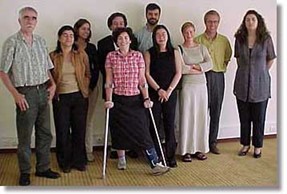 The Web-edu project organized its final project conference at the Portuguese Universidade do Minho in Braga on November 5.
The Web-edu project organized its final project conference at the Portuguese Universidade do Minho in Braga on November 5.
Supported by the European Leonardo da Vinci programme in 2001 and 2002 to study experiences with Learning Management Systems (LMS) in online education and training.
The project partners were Tecminho (Portugal), Distance Education International (Irland), Fern Universität (Germany), Næringslivets kompetansenett (Norway), Minho University (Portugal) and Inofor (Portugal). Project members from left: Helmut Fritsch, X X, Y Y, Paulo Dias, Ana Dias, Pedro Pimenta, Z Z, Gro-Anett Olsen, Morten Flate Paulsen and Carina Baptista.
The picture of the project members is from the project’s archived website at https://web.archive.org/web/20061128020731/http://www.nettskolen.com/in_english/webedusite/
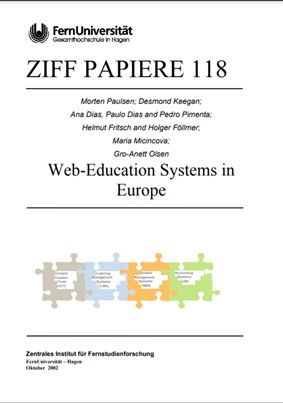 The final conference was titled e-Learning: the role of Learning Management Systems and presented project results that were fresh from the German FernUniversität press as ZIFF Papiere 118. The report is archived at https://web.archive.org/web/20051028015854/https://www.fernuni-hagen.de/ZIFF/ZP_118.pdf
The final conference was titled e-Learning: the role of Learning Management Systems and presented project results that were fresh from the German FernUniversität press as ZIFF Papiere 118. The report is archived at https://web.archive.org/web/20051028015854/https://www.fernuni-hagen.de/ZIFF/ZP_118.pdf
The report presented the major findings from our six regional analyses. Data was collected from in-depth interviews with 113 experts in 17 countries. Usually the e-learning systems managers in the institutions. The analyses of the interviews revealed as many as 52 different commercial and 35 self-developed LMS systems.
The most used commercial systems in the analyses were:
- BlackBoard (14 institutions)
- WebCT (20 institutions)
- FirstClass (7 institutions)
- TopClass (7 institutions)
- Lotus Learning Space (6 institutions)
- ClassFronter (16 institutions)
- LUVIT (5 institutions)
- Tutor2000 (5 institutions)
However, the European market was not dominated by the American systems. In the countries that did not use English as their first language, locally developed LMS systems had successfully repelled the American products. A remarkable large number of the LMS systems used in Europe were commercial systems developed locally or self-developed systems at the institutions.
Boldic kick-off in Kaunas
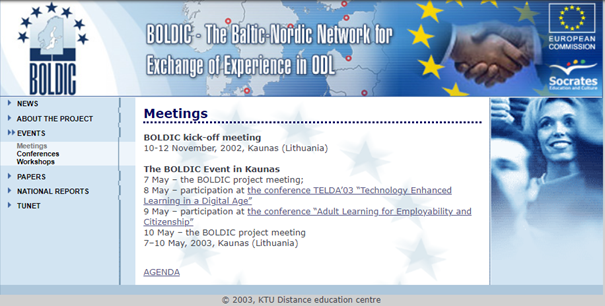
My first visit to the Baltic countries was to attend the Boldic kick-off meeting on November 10-12. Just a month before EU announced that the three Baltic countries would join the union next May.
Arrived the modest airport in Kaunas late in the evening. Without any Lithuanian litas and no money exchange at the airport. Fortunately, one of the taxi drivers accepted my dollar bills.
Jørgen Grubbe was coordinator of the project that was funded by the European Socrates programme. A project aiming to establish a network for exchange of experiences in open and distance learning between Baltic and Nordic countries. The Nordic Associations of Distance Education were represented by Astrid Berg and Jørgen Grubbe (Denmark), Jorma Rinta Kanto (Finland), Erica Sahlin (Sweden) Ingeborg Bø and me (Norway).
The Baltic countries were represented by Sirje Virkus (Estonia), Ilmars Slaidins (Latvia) and Danguolė Rutkauskienė and Audronė Valiuškevičiūtė (Lituania).
The visit and our hospitable Lithuanian hosts increased my interest for the Baltic countries. All the friendly people I encountered and their historic relations with the Soviet Union and the Nordic countries.
Discussed with Ingeborg Bø what we could do to encourage collaboration between the Nordic and Baldic countries. And we decided to propose a Boldic Award. An initiative that later materialized as a yearly award from 2005 to 2016.
The Swedish problems in Ronneby
 Netlearning2002, was held on November 27 in Ronneby in the south of Sweden. An international conference arranged by the Swedish Council for the Renewal of Higher Education and Blekinge Institute of Technology.
Netlearning2002, was held on November 27 in Ronneby in the south of Sweden. An international conference arranged by the Swedish Council for the Renewal of Higher Education and Blekinge Institute of Technology.
My presentation was titled Global Learning. Focusing on international competition in online education. Intended to provoke the Swedish participants as I was invited to the closing panel with Elsebeth Koorsgaard, Erwin Wagner, Lars Haikola and Jonas Almqvist. We discussed Future trends and strategies in front of several hundred people in the Ronneby Congress Center.
I still remember the uncomfortable and ambivalent reactions in the audience when I got the last words at the conference. Presenting my slides with the Swedish problems. Concluding that Sweden would have significant problems competing with online education in other countries since Sweden lacked the economic incentive for change.
The following is a transcript of my statement. A personal, political statement from a Norwegian who intended to stir discussion among the Swedes:
The first Swedish problem is cost-effectiveness. In Norway, online students typically pay € 4,000 for the equivalent of one-year full-time study. Swedish universities receive € 12,000 in governmental funds for this. Three times more than they do for on-campus students. This lavish funding increases development of online courses, but it could easily set a standard for future overspending. In my opinion, the Swedish approach is unwise and not cost-effective.
The second problem has to do with tuition fees. In most countries, there is increasing acceptance of commercialization of education. Swedish universities are still not allowed to charge tuition fees from individual students. Norwegian universities and colleges can charge tuition fees for further and continuing education. This has made it the most dynamic and innovative sector of education. Since Sweden lacks this economic incentive for change, Sweden will have significant problems competing with other countries in the emerging global online education market.
Therefore, I would like to give a personal piece of advice to the Swedish Ministry of Education and to Nätuniversitetet. As I see it, online education in Sweden is far from cost-effective. And it is not sustainable. I predict that most of the online courses that have received financial support from Nätuniversitetet will not be offered again when the lavish, external funding stops. When that happens, another economic incentive should be in place. And I am convinced that Sweden must accept that students pay tuition fees for further and continuing courses that are taught online.
First digital selfie
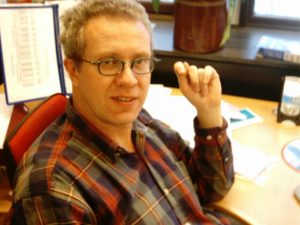 In December 2002, I bought a Mustek gSmart Mini2. So small, cheap and good I realized that digital cameras would be a standard feature in future mobile phones. So, on December 13, I took my very first digital selfie at my NKI office desk in front of my Compaq ipac. My hand-held PDA (personal digital assistance).
In December 2002, I bought a Mustek gSmart Mini2. So small, cheap and good I realized that digital cameras would be a standard feature in future mobile phones. So, on December 13, I took my very first digital selfie at my NKI office desk in front of my Compaq ipac. My hand-held PDA (personal digital assistance).
I later learned that the term selfie probably first appeared in 2002. And that Nokia 7650 was available in Norwegian outlets before Christmas in 2002 as the first mobile phone with built in camera.
2003 - Booking global e-learning in a Scandinavian perspective
Depressed at Delphi kick-off in Barcelona
Back in Barcelona on January 13 and 14. For the Delphi kick-off meeting at the Vall Hebrón Campus. A project supported by the EU programme Minerva. To establish an internet-based observatory on e-learning innovation in thirty EU-funded projects.
With Mario Barajas at Universitat de Barcelona, Katerina Kikis at Forth, Barbara Jones at University of Manchester, Fritz Scheuermann at Universität des Saarlandes, Peter Mirski at Management Center Innsbruck and Torstein Rekkedal at NKI.
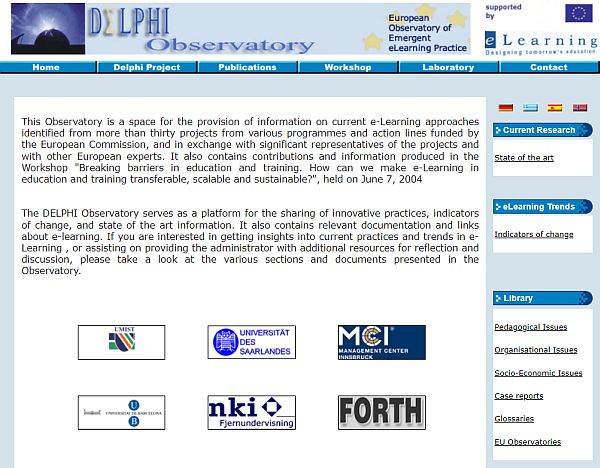
Screenshot of the project website at http://delphi.jura.uni-sb.de/
Felt depressed at the hotel room. Watching CNN, I realized the Iraq war was imminent. Pope John Paul condemned it. Said it still could be avoided and that it would be a defeat for humanity. But British PM Tony Blair, a staunch ally of President George W. Bush, stated that Saddam posed a threat. With his alleged development of weapons of mass destruction.
Decided to see the Columbus monument with Torstein Rekkedal. Bewildered by the direction Columbus pointed. More towards Iraq than America? Disappointed that the observation deck was closed. Heading up la Rambla, we passed the Liceu Opera House. Stopped at the box office and got two last hour, one-euro tickets for the evening. To Vincenzo Bellini’s opera Norma. Reminding us of the Gallic revolt against the Roman occupiers.
Online education trends in Hamburg
My first EADL conference was in Hamburg in May. EADL – The European Association for Distance Learning. Giving me an awkward first impression of entering a gentlemen’s club for wealthy correspondence school owners. But also access to important discussions on how to develop and administrate cost effective education. And valuable insight in how to promote and advertise educational programs
. Practical business cases and marketing knowledge often missing in academic educational conferences dominated by public educators.
The EADL 2003 Annual Conference was held at the Hotel Hafen Hamburg, May 14 to 16. Just six months before Skype was released with a user-friendly interface to Voice over IP calling.
The main theme of the Conference was: The Learning Business in a Changing World. Survival of the Fittest. In the round table discussion about online education trends, I used the below slide to introduce seven important trends.
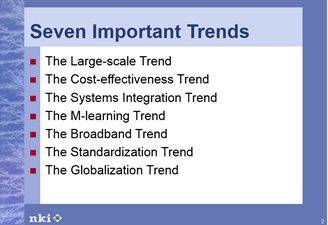
Had to visit Reeperbahn with a female colleague. A centre of Hamburg’s nightlife and the city’s major red-light district. Also nicknamed die Sündigste Meile (the most sinful mile).
Some of us got a tour of ILS – Institut für Lernsysteme. A distance education institution with an impressive operation optimized for correspondence courses. On demand printing and German efficiency in all manual operations. Perfection of a business not fit for survival.
Speech synthesised school
Visited Morten Tollefsen and his guide dog at their home office. The blind pioneer who started Medialt.no to help people with disabilities to utilize ICT services. Impressed by the tools he demonstrated, the competency and skills he possessed. Glad his company would work with NKI and FUNKIS (the Association for Adapted Adult Education in Norway). On a project to improve universal design in online education. Helping blind, visually impaired and dyslectic students. But also providing better services for all students.
Maybe the world’s first fully speech synthesised school? Based on a project supported by SOFF in 2001 and 2002. Providing a free service powered by ReadSpeaker.
A complimentary service that allowed NKI’s 6000 online students to listen to all text included in 400 different online courses. To listen to “Henrik” with no need for special software or hardware. To hear “Henrik’s” speech synthesised voice in front of the actual webpage or from a downloaded MP3-file.
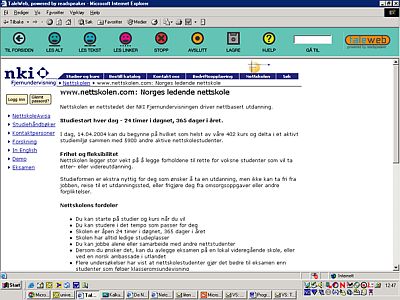
Screenshot of the NKI-hompage with Readspeaker.
Honorary Doctor Rekkedal
I worked closed with Torstein Rekkedal. He supported and inspired me in many ways. On June 14, he went to Newcastle upon Tyne. To receive the award Honorary Doctor of the British Open University. For his “notable contribution to the educational or cultural wellbeing of society”.
The Open University news release included this information:
Torstein Rekkedal is director of research and development at NKI Distance Education, the leading distance education institution in Norway. He has been active in distance education research since 1970. In 2000 he was awarded the Roll of Honour from the European Association for Distance Learning and in 2001 he received The Prize of Excellence for Lifelong Contribution from the International Council for Open and Distance Education. He chairs the Norwegian Standing Committee on Quality in Distance Education.
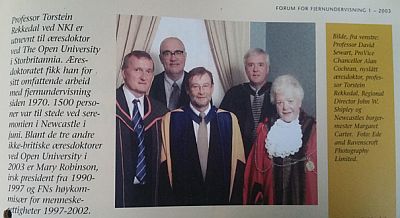
Adoption networks
In September 2003 we celebrated our 10th anniversary at Langesund Hotel and Water Park. Six couples from the Oslo region that first met during evening classes in an adoption preparation course. Organized by Adopsjonsforum during the fall of 1993. A typical year with 543 Norwegian adoptions from abroad. A number that was quite stable during the decade. But decreased steeply towards 46 in 2020.
We were six families counting 25 people at the anniversary. Our firstborn son Stian, twelve adults and twelve lively kids from Brasil, China, Colombia, India, Korea and Ethiopia. Six families that met six Sundays per year – starting in 1993.
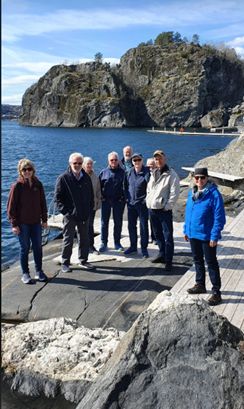 The adults continued the tradition after the kids grew up and left home. At the cursor moment, we have just enjoyed a weekend together in Kragerø. Making me ponder about next year’s 30th anniversary. Remember the four visits from good people who helped us in Brazil. And the gatherings with our “Brazilian” network in Norway. Holyday retreats with Norwegian families that had adopted kids from Brazil. First at Pers Hotel at the Gol Mountain Village in 94. Then, in 95 and 96, at the Hove Summer Camp at the Tromøya island near the coastal town of Arendal. Finally, in July 2000, we rented a holyday home at the Danish water park in Lalandia.
The adults continued the tradition after the kids grew up and left home. At the cursor moment, we have just enjoyed a weekend together in Kragerø. Making me ponder about next year’s 30th anniversary. Remember the four visits from good people who helped us in Brazil. And the gatherings with our “Brazilian” network in Norway. Holyday retreats with Norwegian families that had adopted kids from Brazil. First at Pers Hotel at the Gol Mountain Village in 94. Then, in 95 and 96, at the Hove Summer Camp at the Tromøya island near the coastal town of Arendal. Finally, in July 2000, we rented a holyday home at the Danish water park in Lalandia.
Always many lively kids, much commotion and a lot of Brazilian temper. Parents sharing familiar challenges, useful advice and touching stories. Good memories and valuable experiences that probably made us more open-minded humans. Some of the many adoption-related encounters that have enriched my life.
Important networks of resourceful parents with some common challenges. That shared experiences, joy and questions. About adoption and parenthood. Networks few fathers I know benefit from. Many gatherings that have influenced my emotional life and personality. And hopefully made me a better father.
The Rosing Award
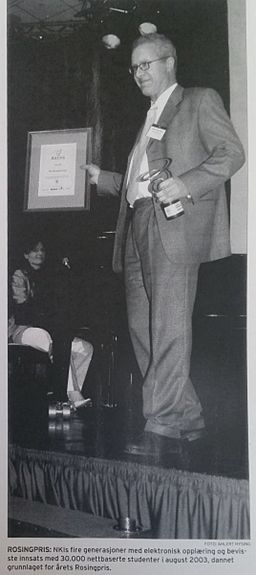
On November 24, the Norwegian Computer Society (DND) celebrated its 50th anniversary. The conference programme included Prime Minister Kjell Magne Bondevik, HKH Crown Prince Haakon, DND President Truls Berg and Gard Titlestad from the Ministry of Trade and Industry.
The conference highlight was still the Rosing Awards. Perceived as the national Oscar awards for the ICT community in Norway. Named after the Norwegian ICT pioneer Fredrik Rosing Bull. So, it was an honour for NKI to receive Rosing’s Competency Award for 2003. A memorable pleasure for me to receive the Rosing Statuette along with a hug from the popular TV host Hilde Hummelvoll who was the conference conferencier. In front of the eminent piano entertainer Ingrid Bjørnov. As shown in the faximile from ItKurs nr. 1 2004.
In its laudation of NKI the jury stated:
The Rosing Competence Award 2003 goes to an organization that has been a pioneer in its field. The organization has in an excellent way used ICT to adapt to a new reality. The organization has transformed itself in a way that has gained great recognition even internationally. Not only has the organization raised its internal ICT competence to achieve its goals, but through its activities it has contributed to increasing the ICT competence of thousands of people in several countries.
After the conference, I was privileged to serve three years as a jury member for the Rosing Competency Award. Along with: Bernt Nilsen, Terje Mikalsen, Øystein Mjelve and Fred Arne Ødegaard.
Global e-learning in a Scandinavian perspective
I had published a stream of articles and reports in English and realized I could write a comprehensive book on online education and learning management systems. With a Scandinavian perspective on e-learning around the world. An ambitious project that resulted in a massive book.
So nice to see it in print in November. With forewords by the former and newly elected EDEN presidents Ervin Wagner and Ingeborg Bø. A Canadian postscript by President Dominique Abrioux of Athabasca University. Comprehensive descriptions of online education in Denmark and Sweden by Søren Nipper and Carl Holmberg.
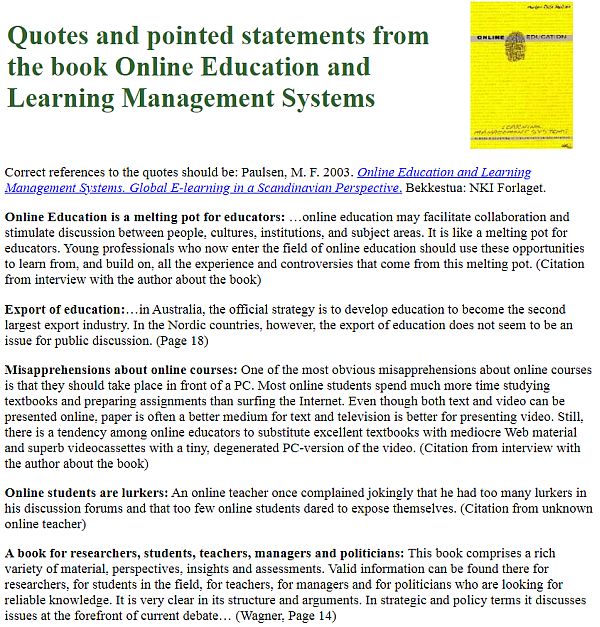
Screenshot from archived www.studymentor.com
Three hundred and thirty-six pages summing up my work, research and experiences. Divided in four parts:
- Online Education, Teaching, and Learning
- Commercial and Self-developed Learning Management Systems
- Global E-learning in a Nordic Perspective
- International Trends and Future Developments
With several Nordic case descriptions such as: Bjørn Helgeby – Online Teacher of the Year; Globalskolen – A Global Primary School; The Scandinavian Virtual Universities; The Swedish Challenges; and The NKI Internet College – Two Online Decades.
The book was used as readings for the Boldic 2003 International Online Conference from October 27 to November 21 and resulted in many conference invitations. It received many good reviews and here are some statements that meant much to me:
- It is a pleasure to welcome a major book on e-learning from a European author….This book should be of the greatest interest to the European Commission and steps should be taken at once to draw the attention of senior administrators within the Commission to it… (Desmond Keegan, Distance Education International, Ireland)
- The book is interesting, important, innovative, international, and impressive. (Dr. Erwin Wagner, former President of EDEN)
- One is overwhelmed by the amount of material presented in the book – and impressed by the clear structure of its presentation. (Christian Dalsgaard, University of Aarhus, Denmark)
- [It] is an interesting and important contribution to the growing literature on technology-enabled learning…. the scope of the book goes far beyond LMS, providing a very useful historical and international review and perspective of online education. (Eilif Trondsen, Ph.D., Founder and CEO, eLearning Forum, U.S.A)
- This book is a much welcomed addition to the literature on the development of online education. It is of great interest not just because the author reports and builds on the evolution of e-learning pedagogy and learning management systems in the Nordic countries, but because he does so from a comparatist’s perspective. (Dominique Abrioux, President of Athabasca University, Canada)
- This book is designed for a broad, international audience and is a must-have for anybody in the business of running online education. (Sirje Virkus, Manchester Metropolitan University, UK)
- This is a «must have» resource for students, practitioners and policy-makers in the online education world. (Norine Wark, MDE, Athabasca University, Canada)
- …it is evident that this book is not only of great interest but also a kind of thesaurus of information on online education of very great value to distance educators and others who are interested in the status of online education today. (Börje Holmberg, Sweden)
The book can be downloaded from https://www.nooa.no/online-education-and-learning-management-systems/ and its website is archived at https://web.archive.org/web/20120208072204/http://www.studymentor.com/
Ipswich gap
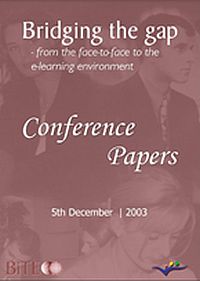 I have no recollection of how I got to Ipswich. But I did go to the British Telecom Lab in Adastral Park. Invited by Gearoid O Suilleabhain, project co-ordinator of the the Minerva BiTE project. To give a keynote presentation titled: Trends and Future Developments in European Online Education. My contribution is included in the conference report titled Bridging the gap – from face-to-face to the e-learning environment. A report that is available at https://citeseerx.ist.psu.edu/viewdoc/download?doi=10.1.1.457.9269&rep=rep1&type=pdf
I have no recollection of how I got to Ipswich. But I did go to the British Telecom Lab in Adastral Park. Invited by Gearoid O Suilleabhain, project co-ordinator of the the Minerva BiTE project. To give a keynote presentation titled: Trends and Future Developments in European Online Education. My contribution is included in the conference report titled Bridging the gap – from face-to-face to the e-learning environment. A report that is available at https://citeseerx.ist.psu.edu/viewdoc/download?doi=10.1.1.457.9269&rep=rep1&type=pdf
2004 - Launching online submission, response barometer and individual planning
Spring innovations
Traditional universities enrolled students one time per year. Athabasca University was more flexible and enrolled distance students one time per month. NKI enrolled online students every day.
As the head of development, I conducted numerous surveys to find out which services we should develop for NKI’s flexible model. Resulting in three new and innovative LMS-services in the spring. Online submission, response barometer and individual planning.
Online submission and assessment
We first required students to upload their assignments to the LMS. And the teachers to assess and grade the assignments in the LMS. A feature that archived all assignments and assessments in our SESAM LMS and provided numerous opportunities for future improvements.
A development that made me realize that LMS-systems could log activity and collect data to analyse and improve online teaching and learning. Nearly a decade before learning analytics emerged as a common term in the field.
Quality barometer tracking teacher response time
Our surveys of online education maintained that swift teacher response is essential for student satisfaction. Especially for students with individual start-up and progress plans. Quite hard to follow up since all 150 online teachers worked part-time from their home offices.
So, we developed a system in our SESAM LMS system that recorded the time from a student submitted an assignment to the teacher registered the corresponding grade. The system allowed us to provide personalized information and statistics at the teachers’ personal web page.
When teachers logged on, they found their assignment to-do lists and current barometer readings as shown in this example:
- NKI’s goal is that it should take no longer than 2 days from a student submits an assignment to the teacher registers the grade.
- The last six months the teachers’ overall average is 2.8 days, your average is 1.9 days.
- The last month the teachers’ overall average is 1.9 days, your average is 1.7 days.
This innovative service was introduced in May 2004. Maybe the first response barometer in the world. It resulted in much discussion in the teachers’ online forum. A few teachers voiced strong criticism, doubts and reservations. However, it was interesting to observe that among all150 online teachers, the overall average response time accumulated over the last six months dropped month by month during the Fall of 2004. In October it showed 3.97 days, in November 3.06 days and in December 2.76 days. The following years, the overall average response time was less than three days, except from the summer holidays.
A few teachers still had an unacceptable long response time, so we later introduced an automated e-mail reminder to teachers who had not registered a grade after seven days.
The experience triggered my interest in how information transparency and various quality barometers could be used to improve online education.
Individual planning system
Many adult students need or prefer individual start-up and progress to cope with a busy life, job and family responsibilities. But the flexibility may increase procrastination and drop out. And the amount of work needed to follow up each student.
So, we introduced an individual planning system as a voluntary option for the online students in May 2004. The screenshot shows one student’s plan in December 2004.
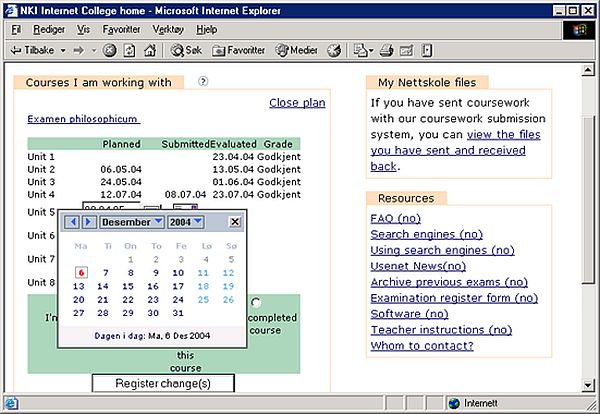
When students logged on, they saw the number of days to their next planned submission. They also received reminders when they were delayed. After 10 days: a standard e-mail generated by the LMS. After 20 days: the teacher was prompted to send a personal e-mail. After 90 days: the individual plan was purged, and the student was contacted via land mail.
The class lists also provided information about the students progress plans. This was meant as incentives for students to maintain up-to-date progress plans and support peers who fall behind their plans.
Celebrating Tore Krogdahl and Svein Qvist-Eriksen
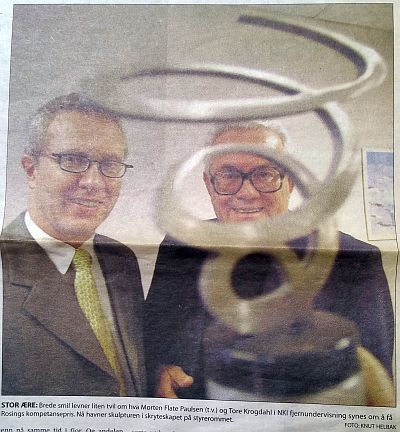 About fifty employees took the newly refurbished ferry boat MS Prinsesse Ragnhild from Oslo to Kiel in Germany. To honour Tore Krogdahl as retiring rector of NKI Distance Education on April 1. NKI’s third employee when NKI’s Norway office was establish in 1959. A mentor who encouraged women to become leaders. As the Royal Family was about to baptise Princess Ingrid Alexandra. The first female heir apparent to the Norwegian throne in modern history.
About fifty employees took the newly refurbished ferry boat MS Prinsesse Ragnhild from Oslo to Kiel in Germany. To honour Tore Krogdahl as retiring rector of NKI Distance Education on April 1. NKI’s third employee when NKI’s Norway office was establish in 1959. A mentor who encouraged women to become leaders. As the Royal Family was about to baptise Princess Ingrid Alexandra. The first female heir apparent to the Norwegian throne in modern history.
An esteemed boss we honoured with a rap written by Jan Erik Nymo. My first and only rap performance. With a silly wig in front of an audience.
After five successful decades and various positions in the NKI organisation, Tore had reached his goal: to develop NKI into Norway’s largest distance education school.
At the cursor moment, just coming home from Tore’s funeral, I look at the old newspaper picture of us (Facsimile from Budstikka, November 26, 2003) and remember him as a wise man. A scholar I felt reciprocated my respect. A principal I pushed hard in my quest to transform the correspondence school to an online school. A leader who wisely pushed back. Arguing that NKI could not survive the transformation without the crucial income from correspondence students.
At the same evening Svein Qvist-Eriksen stepped up as the new rector. A pedagogue and correspondence school connoisseur working for NKI since 1977.
As the growing number of nearly 6000 online students approached the number of correspondence students. Making many senior employees uneasy as their correspondence school expertise became less vital.
Wondered how Svein would handle the increasing disputes between the old and new school? The potential clash between the correspondence and online fractions?
Trends and developments at the Estonian e-University
Ene Koitla and Jüri Lõssenko invited us to a conference arranged by the Estonian e-University in Tallinn in April 2004. The year Estonia became member of both EU and NATO.
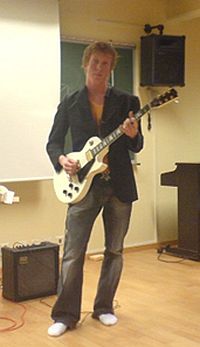 17-year-old son Stian came along, and our hosts welcomed him home and spend a day sightseeing with local teenagers. They helped us find tickets to Puccini’s Madame Butterfly at the Estonian National Opera. A good experience that reminded us of two memorable concerts we attended in 2003. Lou Reed at Oslo Concert House in May. David Bowie at Oslo Spectrum in October. Two of our favourite artists.
17-year-old son Stian came along, and our hosts welcomed him home and spend a day sightseeing with local teenagers. They helped us find tickets to Puccini’s Madame Butterfly at the Estonian National Opera. A good experience that reminded us of two memorable concerts we attended in 2003. Lou Reed at Oslo Concert House in May. David Bowie at Oslo Spectrum in October. Two of our favourite artists.
When I was young, I tried hard before I gave up the guitar. Stian, however got the talent. I was a proud father when his band performed the last day of primary school. In secondary school, he easily sang and covered Bowie, Reed and Øystein Greni on his electric and acoustic guitars. Tributed the Norwegian bands Young Neils and De Lillos as Le Dildos. With much of their lyrics learned by heart. Talents that were augmented by new internet services providing an aboundance of chords, lyrics and soundtracks to stimulate and help amateur musicians. And PC software for recording and editing music. Along with the video editing software Pinnacle Studio to make skateboard-, snowboard- and music videos.
Estonia had built a reputation as one of the world’s most digitized countries. At the same time, PlayStations, PCs and internet were more widespread in Norway than elsewhere. Father and son discussed how much time Norwegian kids should spend without supervision in their rooms with PCs and internet. For good and bad. An environment that fostered an unprecedented generation of Norwegian music and video talents as well as gamers and – extremists.
Current issues that influenced my conference presentation that was titled Trends and Future Developments in European Online Education.
Open educational resources at Phuket Island
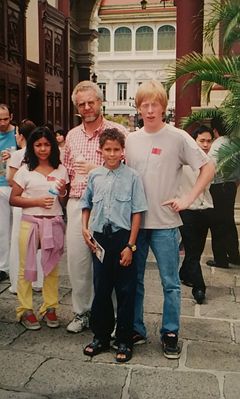 My cousin Stein had moved to the west coast of Phuket Island. An important tourist destination in Thailand. We wanted to visit him. So, we rented a bungalow in his neighbourhood.
My cousin Stein had moved to the west coast of Phuket Island. An important tourist destination in Thailand. We wanted to visit him. So, we rented a bungalow in his neighbourhood.
My vacation reading was Theory and Practice of Online Learning. A 421-page book edited by Terry Anderson and Fathi Elloumi. Which I had accepted to review for IRRODL. Since it presented experiences coming out of Athabasca University. And was published as an open-source book under a Creative Commons License. A scheme encouraged by UNESCO as a way of bridging the digital divide and helping to bring online learning to all the world’s people. As interest for open educational resources (OER) was growing. Spearheaded by the MIT OpenCourseWare project. Based on its 2001 promise to publish all educational materials from undergraduate and graduate courses online. Free and open to anyone, anywhere.
We rented a Toyota pickup truck which had a right-hand steering wheel. That only provided space for three kids back in the truck bed. That drove clockwise in the roundabouts. That turned on the window wipers when I used the indicator.
Honestly, it was a small problem to deal with left hand driving. The real challenge appeared when I focused on the crazy traffic. Trucks speeding at 120 km an hour. Packed with standing schoolkids in the truck bed. Three on the rear bumper. Scores of motorcycles with whole families aboard. Sometimes driving on the right side of the road.
Except from the book review, the road traffic and the slack safety practice, the holyday was wonderful. We met friendly locals. Ate delicious Thai food at simple beach restaurants. Fed monkeys. Rode elephants in Phuket and Tuk Tuks in Bangkok.
Had a marvellous day trip with a long tail boat in the beautiful Ao Phang Nga National Park with its amazing limestone tower karst islands. Visited the Ko Panyi fishing village on stilts and Khao Phing Kan. Called James Bond Island after the 1974 movie: The Man with the Golden Gun.
There were often heavy rainfalls at night during the rainy summer season in July. Fortunately, we did not listen to the people who advised us to wait until our Christmas vacation.
The earthquake in the Indian Ocean and the following tsunami occurred on December 26. Many communities along the coasts of the Indian Ocean were devastated. The tsunamis killed an estimated 227,898 people in 14 countries. Making it one of the deadliest natural disasters in recorded history. Even 84 Norwegians died in the tsunami. Most of them tourists on Thailand’s west coast.
First Norwegian professor of online education
I found it very stimulating to work towards a goal. I always had some that were ambitious and achievable. To finish a marathon, publish a book, develop a new online education feature, etc. So, August 23 was a memorable day. Twenty-two years after I started to work for the NKI correspondence school, I was appointed Norway’s first professor of online education.
Appreciated the engraved vase I received from NKI’s CEO Sverre Harald Amundsen, the media coverage and the committee’ concluding statement: Paulsen is an international expert and competent researcher in the field of online and distance education.
The appointment and the release of our innovative online education serviced resulted in many invitations to present at conferences. In 2004, I gave at least 15 presentations in Norway, Manchester, Cork, Tallinn, Turku, Berlin, Reykjavik, Gothenburg, Stockholm and Copenhagen.
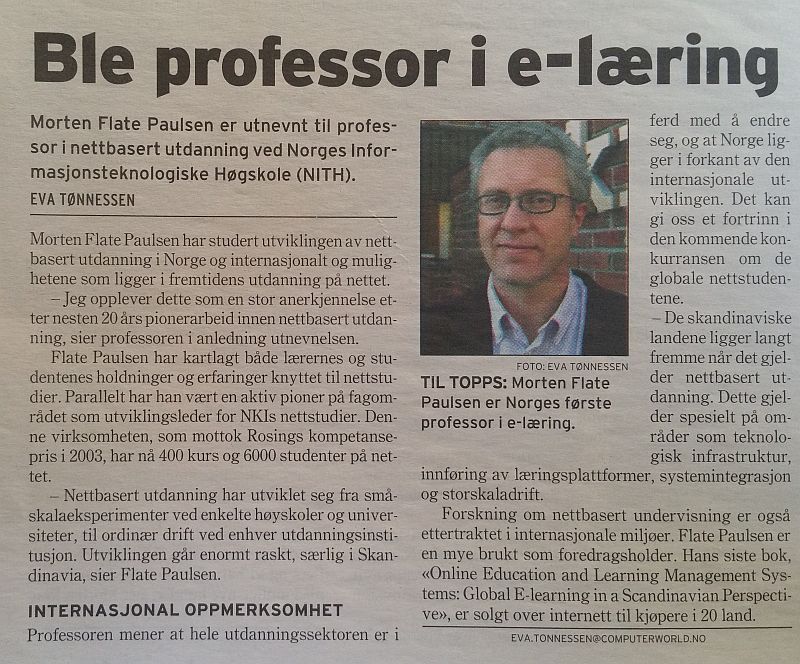
Faximile from Computerworld Norge 07.05.2004
Flexible Nordic education in Reykjavik
Flew low fare. As we always did at NKI. Used to the prudent tradition in a private school that had to compete with free public tuition. Annoyed to see all the public servants flying business class to Reykjavik. To attend the September 23-24 conference on flexible learning in a global market. Arranged by the Nordic Council of Ministers. The official body for inter-governmental co-operation in the Nordic Region.
From my point of view the lasting outcomes of the conference were the good memories from swimming in the Blue Lagune, dining in the revolving restaurant Perlan at Reykjavík’s highest hill and joining the Golden Triangle excursion. Featuring the Gullfoss Waterfall, Geysir Geothermal Field, and Thingvellir National Park.
However, Lars Skjold Wilhelmsen’s presentation was interesting. The title could be translated to: The global education market – a tough Nordic tangle to solve.
He suggested that Nordic educational collaboration could focus on:
- stopping leakage of student to other countries
- establishing a common arena for learning
- becoming a global provider
My presentation focused on Nordic differences and challenges and was based on my article in publicservice.co.uk
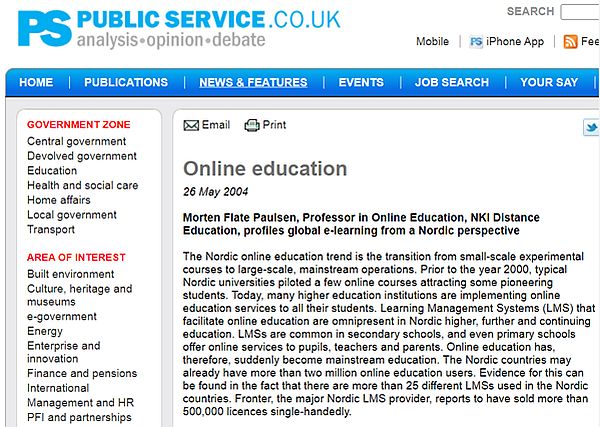
Screenshot of article in publicservice.co.uk
Below is an excerpt from the article which is still worth reading:
Danish education is firmly rooted in a long-standing tradition for learning through ‘the living word’ as opposed to the printed word. It emphasises online education that includes face to face seminars and collaborative learning. So far, this may have been a wise strategy since collaborative learning is relatively swift and inexpensive to develop. But one may question if the use of face to face seminars make Danish online education more expensive and less flexible. One may also discuss whether collaborative learning is suitable in large-scale environments.
Norway has a long tradition of supporting distance education. It was the first country to regulate correspondence education by an act of Parliament in 1948. Since then, distance education has been recognised as an important part of the educational system. However, independent distance education institutions have experienced reduced State support from nearly 100% in 1975 to about 10% in 2004.
A distinctive characteristic of Norwegian online education is that two nationally developed LMSs (Fronter and It’s learning) totally dominate the market from primary to tertiary education. This may stimulate collaboration between institutions and focus investments and resources towards services that could benefit the whole nation. Another interesting observation is that there are four major providers of distance online education: NKI, BI, NKS and Nettverksuniversitetet. Three of the four are private educational foundations. The fourth is a consortium of public university colleges. All four initiatives have proven to be sustainable, and NKI Distance Education has operated online education courses every day since 1987.
Three Swedish distance education consortia have received considerable governmental funding. At most, they offered 50 courses to 6,000 students per year. After nearly 10 years of operation, their funding was discontinued when the Government decided to establish Netuniversitetet. Apart from the lack of funding, the consortia had difficulties in building the necessary fundament of knowledge to be efficient producers and deliverers of distance education. Distum was established by the Ministry of Education in 1999 to support the development and use of information technology in distance education. However, it takes time to make an impact at national level, and the necessary political patience was not available. Distum was discontinued after three years when the Ministry decided to support the new political initiative named Netuniversitetet. In 2002, the Swedish universities received SEK211m to support online education, with SEK90,000 per student per year. In 2003 and 2004, online students were provided SEK20,000 per year more than ordinary students. This funding is intended to increase the development of online courses, but it could easily set an unhealthy standard for future overspending.
In most countries, there is increasing acceptance of commercialisation of education, but Swedish universities are still not allowed to charge tuition fees from individual students. Since Sweden lacks this economic incentive for change, Sweden will have significant problems competing with other countries in the emerging global online education market.
To sum up, the Nordic countries have different characteristics and challenges regarding online education. All have potential advantages in the growing international online education market, but they can do much more to capitalise on their competence and technological pre-eminence.
Braking barriers in Manchester
On June 7, Barbara Jones hosted the final Delphi project workshop at the University of Manchester Institute of Science & Technology. Seventeen experts attended the workshop titled Breaking barriers in education and training. We discussed the question: How can we make e-learning in education and training transferable, scalable and sustainable?
I recall meeting Wim van Petegem from the University of Leuven and Atle Løkken from the University College of Stavanger at the workshop. And disturbingly many intoxicated British students and teenagers outside pubs and discos near the university. Had a pleasant evening with Sirje Virkus and Tore Hoel at a British pub after the workshop. Where we discussed that Gmail just had been introduced as the first web-based email service. That the popular Mozilla Firebird browser had changed name to Firefox. That the first version of Skolelinux had just been introduced to promote free software in schools.
My major contribution to the project was as author of the 2003 report E-learning – The State of the Art. It identified and discussed important issues in e-learning that were used to develop a template for further analyses of key innovations in thirty projects funded by the European Socrates, Minerva, IST and Improving Human Potential Programmes.
The workshop contributions were made available at the webpage shown in the screenshot. And my task at the workshop was to conclude and summarise the discussion together with Mario Barajas and German Bernal-Rios.
More reports and recommendations from the project are archived at https://web.archive.org/web/20050309122745fw_/http://www.ub.es/euelearning/delphi/index.htm
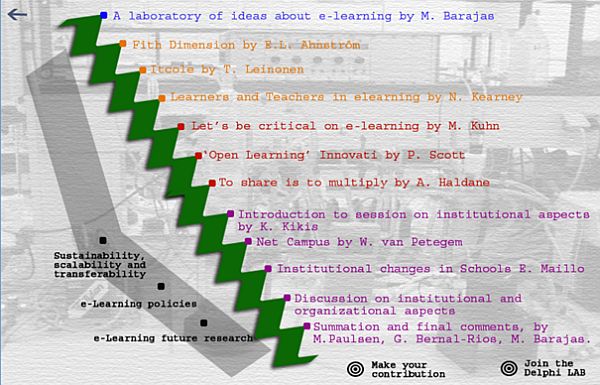
Screenshot of the archived Delphi web-site
Some 2004 Events
My translated selections of events from https://no.wikipedia.org/wiki/2004
January 21 – Princess Ingrid Alexandra, Norwegian heir to the throne was born
February 3 – CIA admits that there was no real danger from Iraqi weapons of mass destruction before the 2003 invasion of Iraq.
February 9 – The Mozilla Firebird browser changes its name to Firefox.
March 2 – A UN report states that Iraq has not had any «significant» weapons of mass destruction since 1994, contrary to popular belief.
March 29 – NATO expands. Bulgaria, Estonia, Latvia, Lithuania, Romania, Slovenia and Slovakia become new members.
March 29 Ireland becomes the first country in the world to ban smoking in all workplaces, including bars and restaurants.
March 31 – Google announces Gmail, the first web-based email service to offer one gigabyte of storage.
April 5 – NOKAS robbery: Norwegian Cash Service in Stavanger is robbed. The robbery is described as the largest and most brutal robbery in Norwegian history. A policeman is shot and killed.
May 1 – Estonia, Cyprus, Latvia, Lithuania, Malta, Poland, Slovakia, Slovenia, the Czech Republic and Hungary join the European Union (EU).
June 1 – The Norwegian law on protection against tobacco damage is extended with a total ban on smoking in restaurants.
June 15 – The Directorate of Education was established.
June 20 – The first release of Skolelinux.
July 4 – Greece wins the European Football Championship by beating Portugal 1-0 in the final.
August 22 – Edvard Munch’s paintings Scream and Madonna are stolen from the Munch Museum in Oslo by armed robbers.
August 28 – Andreas Thorkildsen wins Olympic gold in javelin.
November 23 – World of Warcraft is released in North America.
December 31 – Orange Revolution: Ukrainian President Viktor Yanukovych resigns.
My 2004 Publications
Paulsen, M. F. 2004. Book Review – Theory and Practice of Online Learning. The International Review of Research in Open and Distance Learning. Volume 5, Number 3.
Paulsen, M. F. 2004. Online Education. Public Services Review: Nordic States.
Paulsen, M. F. 2004. E-learning in the North for the Online Educa newsletter.
Paulsen, M. F. 2004. Cooperative Freedom: An Online Education Theory. SVERD’s jubileumsskrift, October 2004.
Paulsen, M.F. og A. Dye. 2004. Evaluering av Nettskolen Høsten 2003.
Paulsen, M. F. 2004. Utfordringer i dansk nettbasert utdanning. Artikkel i Insights@CBS, forskningsbulletin ved Copenhagen Business School.
My 2004 presentations
In 2004, I gave 15 external presentations in Norway and eight other countries.
UK and Ireland
Trends and Future Developments in European Online Education. A presentation at Manchester Metropolitan University, 29.03.04.
Cooperative learning: administration, design and assessment. Keynote presentation at the conference New Assessment for New Learning at DEIS, Cork, Ireland. 12.11.04.
Estonia
Trends and Future Developments in European Online Education. A presentation at a conference organized the Estonian e-University. Tallinn, 11-12.03.04.
Finland
Challenge of Cooperative Learning and Individual Enrollment – How can we take care of both in online learning? A video presentation at a conference for the University of Turku, Finland, 24.11.04.
Germany
I gave the presentation Important Trends in Online Education and took part in the panel discussion Is e-learning a community or a discipline? at Online Educa in Berlin in December 2004.
Iceland
Nettbasert utdanning og globalisering i Norden på Nordisk Ministeråds konferanse Globalt utdanningsmarked – nordisk utfordring i Reykjavík, 23.09.04.
Sweden
Kooperativt lärande: Om nätbaserad distansutbildning med individuell start och progression på SVERDs jubileumskonferanse ved Göteborgs universitet. 5.10.04.
Flexibla lärandemiljöer, möjligheter och utmaningar, i ett Nordiskt perspektiv på konferansen Flexibla lärandemiljöer – ett samarbetsprojekt? i regi av Lärarhögskolan i Stockholm, Sveriges Nätuniversitet och Nationalbiblioteket. 10.11.04.
Denmark
Samarbeidslæring og industrialisert undervisning – Utfordringer i dansk nettbasert utdannelse. Et foredrag for Copenhagen Business School 17.02.04.
Norway
Trender og utfordringer i nettbasert utdanning, foredrag på faglig samling arrangert av it:solutions, Solstrand Fjordhotel, Bergen, 09.12.04.
Jeg var sesjonsleder for Kompetanseutvikling og e-læring på Symposiet eLandet Norge 2004 i Oslo, 19.10.04.
Kompetanseheving i NKI Fjernundervisning. En presentasjon for eforum den 05.02.04.
Universell tilrettelegging av fjernundervisning på Internett. Et foredrag holdt på Norgesuniversitetets konferanse i Oslo 15.-16.04.04 av Morten Flate Paulsen, Ivar Mortensen og Wenche Roald.
Hvorfor satse på nettbasert utdanning og nettpedagogikk? Trender, utfordringer og muligheter. Et foredrag for Høgskolen i Oslo, Avdeling for helsefag. 24.03.04.
Har vi en bærekraftig nettbasert utdanning på Kompetansedagene 2004 for bank og finans, Vettre, 03.09.04.
2005 - Surpassing correspondence education
The point of no return
Online education became gradually more important for NKI’s research, operation and finances. We had completed nine EU-funded online education projects since 1998. Three new were accepted in the spring:
- Megatrends in e-learning provision
- Incorporating mobile learning into mainstream education and training
- E-Learning Quality for SMEs
However, NKI’s strategy was still to offer the vast majority of courses both online and as correspondence courses. A sensible strategy since many preferred correspondence courses even as the proportion of online students increased.
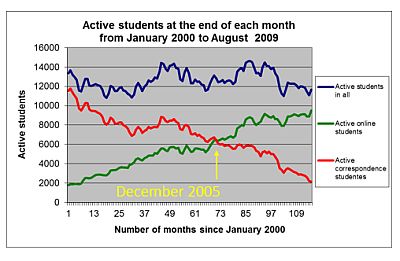 January 2005 was the first month we had more registrations for online than correspondence courses. And the first half year confirmed the trend with 50,4 % of the turnover coming from online courses. At the end of August 2005, we celebrated that Anita Hvila acquired NKI’s online course number 50,000. Almost exactly 18 years after the first four online students started in the autumn of 1987.
January 2005 was the first month we had more registrations for online than correspondence courses. And the first half year confirmed the trend with 50,4 % of the turnover coming from online courses. At the end of August 2005, we celebrated that Anita Hvila acquired NKI’s online course number 50,000. Almost exactly 18 years after the first four online students started in the autumn of 1987.
In December, the number of active online students (6374) for the first time surpassed the number of correspondence students (6062).
In many ways, 2005 made a big change. Online courses had become more important than correspondence courses. And the organization needed to agree on a strategy for the future. I pushed hard, and got acceptance for the following philosophy on cooperative online learning:
NKI Distance Education facilitates individual freedom within a learning community in which online students serve as mutual resources without being dependent on each other.
A philosophy close to my Theory of cooperative freedom and transparency in online education.
Cooperative learner profiles
Many people argued that distance and online students were lonely. Especially when they follow individual progress plans. That students need to learn together in a social community. So, we had to develop better learning communities. Before people had heard about social media. Before Facebook.
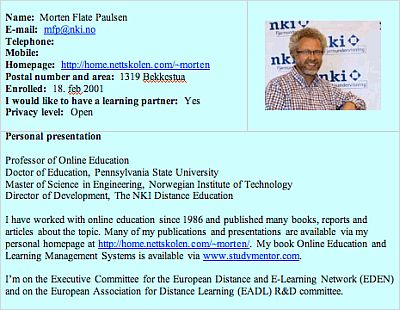
Hence, we initiated and got external funding for the CLIP-project. To develop services based on Cooperative Learner Information Profiles. Making it easier to find learning partners (study-buddies) who would like to support each other. Based on common interest, progress plans or locations.
The first step was to allow students to indicate if they wanted learning partners, then enter and share personal presentations and chosen one of the four privacy levels:
- Global – Everyone on the Internet may see the presentation
- Open – All NKI students may see the presentation
- Limited – The students in the course may see the presentation
- Closed – Only the teacher and NKI administration can see the presentation
At the end of the year, 2000 of the students had made a personal presentation and many included digital photos. Two out of three checked that they wanted a learning partner. Four out of ten chose open profiles. One in ten opted for closed profiles.
Screenshot of my 2005 personal profile.
Edmonton, Athabasca and ICDE
Flew to Edmonton in May. The capital city of Alberta. The Canadian province powered by its oil and gas industry. Learned from a Norwegian oil engineer in the neighbour seat that tar sand and fracking where controversial terms.
Invited by Terry Anderson who took me on a guided tour to West Edmonton Mall. One of the world’s largest. With hotels on the mall. Where couples spent their honeymoons. Seriously?
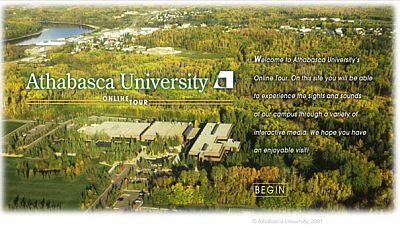 Athabasca University. Canada’s Open University. I knew the campus from the online tour shown in the 2005 screenshot and finally got the opportunity to visit it in Athabasca. A remote campus ― in a town with a population of 3000. With students at a distance and many faculty members living in Edmonton and Calgary.
Athabasca University. Canada’s Open University. I knew the campus from the online tour shown in the 2005 screenshot and finally got the opportunity to visit it in Athabasca. A remote campus ― in a town with a population of 3000. With students at a distance and many faculty members living in Edmonton and Calgary.
The drive from Edmonton took about two hours north on highway 2. Arrived in time to give a lunch presentation for the staff about: Collaboration in Independent Study – the NKI experience. Joined the dinner party honouring Dominique Abrioux when he ended his ten-year term as President of Athabasca University. He was also ICDE’s Vice-President for North America. Frits Pannekoek took over as the new president of Athabasca University in June.
At the cursor moment, it is worthwhile to notice AU’s footprint on ICDE. Since Dominique Abrioux was ICDE’s Vice-President for North America and the later AU Presidents Frits Pannekoek and Neil Fassina both became ICDE presidents. Three ICDE notabilities I met several times.
Cooperative learning in Vancouver
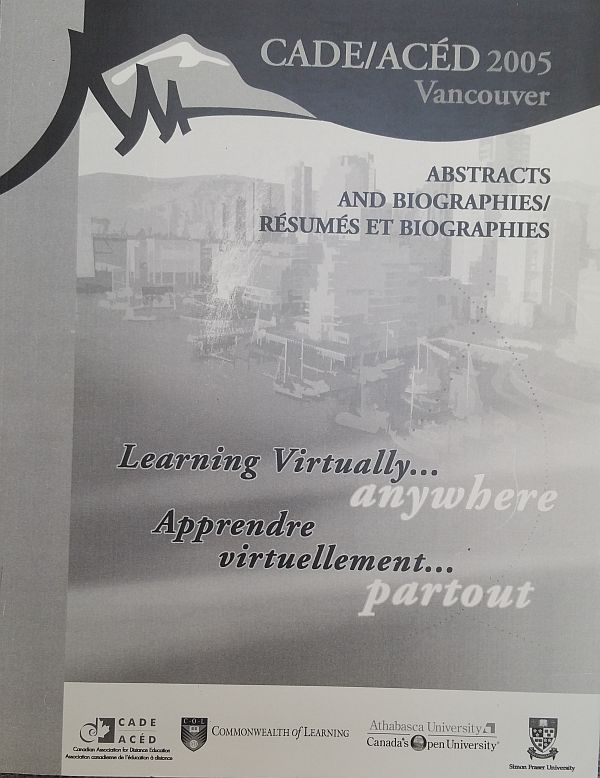
The Canadian Association of Distance Education organized the CADE 2005 International Conference in Vancouver from May 7 to 11, 2005. Hosted by the Centre for Online and Distance Education at Simon Fraser University. With the conference theme: Learning Virtually Anywhere.
Arrived in a white limousine with Terry Anderson and Rory McGreal. From the airport to the Sheraton Wall Centre conference hotel in the heart of Vancouver.
I enjoyed the cracker barrel sessions during the welcome reception. A series of round table discussions where the attendees chose a table with a topic of interest. When the session master blew a whistle, we had to grab some crackers, get some wine and find a new table. A great way to be introduced to many new colleagues.
Learned that a new video publishing service called YouTube was launched in February. An online service that would bring video hosting and sharing to the masses. Heard about a new Vancouver-based image hosting service and online community. Started in 2004, Flickr soon became popular service for both amateurs and professional photographers who wanted to share their high-resolution photos.
My keynote presentation was titled: COGs, CLIPS and Other Instruments to Support Cooperative Learning in Virtual Learning Environments. I also took part in two panel discussions about Mobile Learning at NKI and Distance Education Research in a Scandinavian Perspective.
Gave a presentation about mobile learning at NKI in a session titled Making the Transition to Mobile Learning with Mohamed Ally, Rory McGreal and Judy Roberts. Talked about distance education research in a Scandinavian perspective at Terry Anderson’s CIDER research seminar. And joined a panel titled Research Views from Over There. To provide an international flavour of the challenges facing distance learning researchers and practitioners. With Don Olcot from Western Oregon University, Asha Kanwar from Commonwealth of Learning and Christine von Prummer, from Deutche FernUniversität.
Enjoyed the spectacular views in Stanley Park. Challenged my scare for hights by taking the skyride up Grouse Mountain and crossing the Capilano Suspension Bridge.
Walked the cobbled streets of Gastown and saw the Steam Clock with Christine von Prummer and her feminist followers. Christine, who was widely known for her book on Women and Distance Education. Maybe an evening that increased my support of more female voices in our field. Making it easy to appreciate the cursor moment when my Athabasca colleagues Susan Bainbridge and Norine Wark published the Encyclopedia of Female Pioneers in Online Learning. About thirty prominent women who have influenced me and millions of online students around the world.
EDEN and EADL conferences in Helsinki
Two conferences in Helsinki in June. First the EADL conference June 16-18. Then the EDEN conference June 20-23 as the Finns started to celebrate midsummer.
The theme of the EADL conference was: How to Gain Competitive Advantage in the Learning Industry. I gave a presentation titled Online Pedagogy: Balancing Individual Needs with Collective Support. My NKI colleague Elisabeth Møystad presented How to turn enquiries into registrations. The local organizer was the Finnish marketing institute Markkinointi-instituutti.
Appreciated to be appointed member of the EADL R&D Committee. The committee responsible for the content of EADL’s annual conferences. Where I enjoyed many interesting meetings and discussions with Michael Lammersdorf (chairman), Tony Hopwood, Dirk van der Mark, Heinrich Dieckmann and Kees Veen.
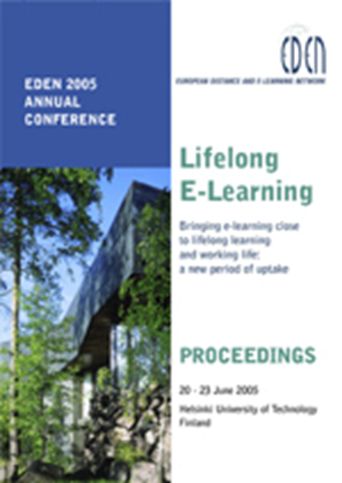 The EDEN annual conference was organized by the Helsinki University of Technology, Lifelong Learning Institute TKK Dipoli. As Ingeborg Bø was president of EDEN. Tapio Koskinen was head of the local organizing committee.
The EDEN annual conference was organized by the Helsinki University of Technology, Lifelong Learning Institute TKK Dipoli. As Ingeborg Bø was president of EDEN. Tapio Koskinen was head of the local organizing committee.
Browsing through the proceedings at the cursor moment, I’m surprized to see so many presenters who have contributed so much to our field. Just as an example, there were four from Norway: Bodil Ask, Sven Åke Bjørke, Torhild Slåtto, Susanne Koch and Astrid Høgmo.
My keynote presentation, titled Success Factors in Large-Scale Online Education, introduced the Megtrends project to analyse large-scale successes and failures in e-learning. A project I initiated and headed for NKI with great partners in EDEN’s orbit:
- EDEN, UK
- Open University of Catalonia, Spain
- Distance education International, Ireland
- Estonian e-University, Estonia
- Norwegian Opening Universities, Norway
- Budapest University of Technology and Economics, Hungary
Sardinian summer with first camera phone
Flew Ryan Air to Italy with my family in July. Three months after Cardinal Joseph Ratzinger was elected pope when John Paul II died at the Vatican.
Got a car at the Italian airport. A car that ate my CD in its CD-player. Owned by a rental company that charged me extra for crashing the car stereo.
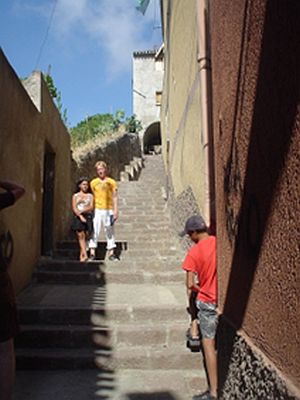
Took 160 photos with Ericsson K750i – my first camera phone. Featuring a 2 mpx camera, autofocus, LED light, video option and memory stick. One of the gadgets that turned the global mobile and camera industries upside down in just a few months.
Rented a house in Bosa by the river Temo on the west coast of Sardinia. A house high up in the hill by the Castle of Serravalle. An area with so many stairs (shown in the private K750i camera photo) that the local women sported gorgeous legs. A house which was eight meters deep, two meters wide and five floors high. Kitchen and a roof terrace at the top. So nice to sit there and enjoy the beautiful scenery and the sunset. So close to the lively, Italian family quarrels in the neighbourhood. With a view to the ashes from a local wildfire. As we discussed why storms with human names got so much media attention. If it was a result of the Kyoto protocol that was ratified by 127 countries in February.
Rested my sore legs and contemplated why the architect found it convenient to instal the bathroom five stairs below the best area to consume wine and beer.
A-ha moments in Frognerparken and my iPod
Norwegian energy giant Norsk Hydro celebrated its 100th anniversary with a free concert August 27 in Frognerparken. My favourite park in Oslo. Full of tourists who want to see the Vigeland installation. Comprising 212 bronze and granite sculptures designed by Gustav Vigeland.
About 120 000 people attended the concert. Making it the largest concert ever staged on Norwegian soil.
Started with the new single Celice followed by several other new tracks. But the audience first took off when Morten Harket started «Crying in the Rain». And flew high when A-ha started «Hunting high and low» and «Take on me». The energetic concert winded down with Stay on These Roads, Analogue, The Sun Always Shines on TV, The Living Daylights and Dark is the Night.
Apple introduced the 20 GB iPod in 2002. My name and email address was engraved in the one I bought in 2004. It was soon filled up with A-ha albums, 5000 other recordings and my favourite play lists. A reliable companion on all my travels for the rest of the decade.
ILIAS in Nürnberg
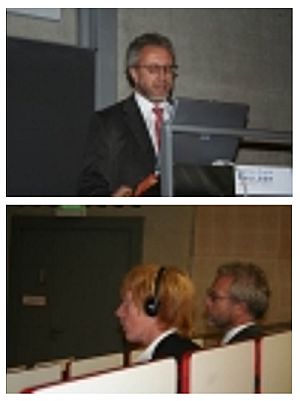 ILIAS was prototyped in 1997 at the University of Cologne. Due to increasing interest of other universities, the project team published ILIAS as one of the very first web-based, open-source LMS systems in 2000.
ILIAS was prototyped in 1997 at the University of Cologne. Due to increasing interest of other universities, the project team published ILIAS as one of the very first web-based, open-source LMS systems in 2000.
In October, I was invited to give a keynote presentation at the at the IVth International ILIAS Conference at Friedrich-Alexander-Universität Erlangen-Nürnberg. The conference was opened by omnipresent Walter Kugemann and my presentation was titled Cooperative Online Education. Pedagogy and technology supporting individual flexibility in virtual learning communities.
Stayed with 18-year-old son Stian at Deutscher Hof in Nürnberg. Adolf Hitler’s favourite hotel. Visited the huge Nazi Documentation Centre and Courtroom 600 in the Palace of Justice. Symbols of the start and the end of World War II. The Centre where the National Socialists held their large rallies from 1933 to 1938. The remains of the huge structures that witness how these propaganda rallies were staged. The Courtroom used in the Nürnberg trials. 24 major World War II criminals were indicted. Resulted in 12 death penalties and several life imprisonments. Visits that made profound impression on us both.
So nice to end the visit with a reflective church concert with the Norwegian jazz singer Solveig Slettahjell.
Braga
Some 2005 Events
My translated selections of events from https://no.wikipedia.org/wiki/2005
February 14 – The YouTube site is launched.
February 16 – The Kyoto Protocol enters into force after being ratified by 127 countries.
April 2 – Pope John Paul II dies at the Vatican.
April 9 – Prince Charles marries Camilla Parker Bowles at Windsor City Hall.
April 19 – Cardinal Joseph Ratzinger is elected pope, taking the name Benedict XVI.
August 30 – New Orleans is flooded and evacuated after Katrina breaks down the dikes.
September 11 – Zhejiang province in China is hit by a violent typhoon. Over a million people are being evacuated.
September 14 – Extreme weather Kristin: Record precipitation causes floods, landslides and destruction in Sogn og Fjordane, Hordaland and Rogaland. Two die and several become homeless after a landslide in Bergen.
October 4 – Hurricane Stan wreaks havoc on floods and landslides in Guatemala and El Salvador. About 4,000 are reported dead or missing.
October 8 – A violent earthquake is causing great destruction in Pakistan, Afghanistan and India. The number of deaths is estimated at over 86,000.
October 17 – Jens Stoltenberg’s 2nd government joins in Norway.
October 24 – Hurricane Wilma sweeps across Florida after ravaging Mexico and Cuba. The hurricane causes great material damage, but few deaths.
November 14 – Heavy rainfall causes floods and landslides in Sogn og Fjordane and Hordaland in Norway. One dies in a landslide in Bergen. The Bergen line, E16 and several smaller roads are closed by landslides and floods.
November 22 – Angela Merkel becomes Germany’s first female chancellor and Microsoft launches Xbox 360 in the US.
December 11 – Extreme weather Mona, with southwesterly full storm and large amounts of precipitation hit Helgeland, Saltfjellet, Salten and Lofoten in Norway.
My 2005 publications
Paulsen, M. F. Resultater fra spørreundersøkelsen om NKI Fjernundervisnings planleggings-og oppfølgingssystem. Internal report. Oslo: NKI
My 2005 presentations
In 2005, I gave 19 external presentations in Norway, Spain, Portugal, Germany, Finland, Canada, Sweden and Denmark.
Spain
Cooperative Learning in Virtual Learning Environments. Presentation for Estudios de Psicología y Ciencias de la Educación, Formación de Postgrado, in Barcelona, Spain, 14.12.05.
Portugal
E-learning: Developing Individual Flexibility and Cooperative Online Education. Presentation at the conference O Ensino da Física no século XXI organized by University of Minho, Braga, Portugal, 12.11.05.
Germany
Cooperative Online Education. Keynote presentation at the 4th International ILIAS Conference in Nuremberg, Germany, 06.10.05.
Video from Campus Innovation in Hamburg 2005. Online Education: Trends and recommendations. Keynote presentation at Campus Innovation 2005, Hamburg, Germany, 20.09.05.
Finland
Online Pedagogy: Balancing Individual Needs with Collective Support. Presentation at the EADL conference in Helsinki, Finland, 16-18.06.05.
Success Factors in Large-Scale Online Education. Keynote presentation at the EDEN 2005 annual conference in Helsinki, Finland, 20-23.06.05.
Canada
COGs, CLIPS and Other Instruments to Support Cooperative Learning in Virtual Learning Environments. Keynote presentation for the Canadian Association for Distance Education at the CADE 2005 conference in Vancouver, Canada, 10.05.05.
Mobile learning at NKI Distance Education. Contribution to the panel discussion Making the Transition to Mobile Learning, at the CADE 2005 conference in Vancouver, Canada, 10.05.05.
Distance Education Research in a Scandinavian Perspective. Contribution to a panel discussion on Research Views at the CIDER research seminar in Vancouver Canada, 08.05.05.
Collaboration in Independent Study – the NKI experience. Presentation at Lunch ‘n’ Learn, Athabasca University 05.05.05.
Sweden
Nettbasert utdanning i stor skala. Foredrag for Utbildningsradioen (UR) i Stockholm, Sverige 12.12.05.
Framgångsfaktorer för storskalig onlineundervisning. Foredrag på et seminar ved Linköpings tekniska högskola 21.04.05.
Denmark
Erfaringer med netbaseret læring – om virtuel læring – netpædagogik. Foredrag på en konferanse i regi av VUC Sønderjylland. Aabenraa, Danmark, 26.01.05.
Norway
Pedagogikk, teknologi, økonomi og kvalitet – fire krevende elementer i nettbasert utdanning. Foredrag på NFFs konferanse i Oslo, 07.12.05.
Paneldebatt på konferansen eLæring 2005 – Lyst til læring! arrangert av Abelia og VOX, Oslo, 24.11.05.
Trender innen e-læring: Pedagogiske og organisatoriske sider ved nettbasert læring. Foredrag i Nettverksforum for nettbasert læring, Oslo, 15.11.05. Medlemmer av nettverket er Statens Vegvesen Vegdirektoratet, Toll- og avgiftsdirektoratet, Riksrevisjonen, Nordea, Forsvaret, Høgskolen i Oslo, Statsbygg, Statskonsult og Skattedirektoratet.
Trender innen e-læring: nettlæring og pedagogikk. Foredrag på seminar i regi av Handels- og Servicenæringens Hovedorganisasjon, 21.09.05.
Nettbasert utdanning: Utviklingstrekk og utfordringer sett gjennom NKI Fjernundervisnings briller. Foredrag på Universitetet for miljø- og biovitenskap, Ås, 04.03.05.
Erfaringer og fremtidsutsikter med nettbasert utdanning med utgangspunkt i NKI Fjernundervisnings utvikling. Foredrag på et seminar i regi av Elinor. 14.02.05.
2006 - Working with learning partners and peer counsellors
Cooperative developments
In the spring, our development team focused on two cooperative projects. Learning partners and peer counselling for online teachers. Two projects based on NKI’s learning philosophy and my theory of cooperative freedom in online education. Conducted in a global environment with growing interest in social media and online sharing.
On March 21, Jack Dorsey tweed “just setting up my twttr” and Twitter debuted in July. Making microblogging with 140 characters popular and widespread around the world.
On April 23, the Swedish audio streaming provider Spotify was founded.
On May 31, The Pirate Bay raid took place in Stockholm. The Swedish website that indexes torrent files was raided by the police and went offline for a few days. Resulting in much media exposure, increased popularity and more visitors.
Peer counselling
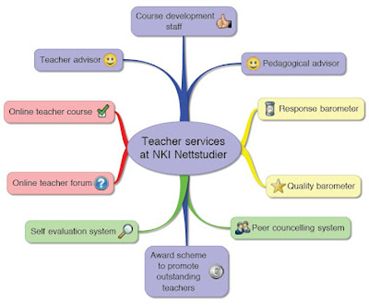 Peer counselling for online teachers was a project focusing on systems and routines encouraging teachers to help, guide and stimulate each other to do an even better job. An important, but touchy project. Since we knew that students wanted quality feedback from their teachers. That some teachers performed better than others. And that it was both sensitive and expensive to engage supervisors to evaluate the teachers.
Peer counselling for online teachers was a project focusing on systems and routines encouraging teachers to help, guide and stimulate each other to do an even better job. An important, but touchy project. Since we knew that students wanted quality feedback from their teachers. That some teachers performed better than others. And that it was both sensitive and expensive to engage supervisors to evaluate the teachers.
When we floated the idea of peer counselling, my impression was that teachers with the largest potential for improvement were most negative to the project. So, we first started peering only volunteers that taught very different subjects. Asking them to focus on their communication with students, not the subject matter.
An administrator pulled out some feedback each teacher had provided to one student and asked the peers to comment on each other’s feedback. Both teachers got extra payment for this counselling.
The pilot project improved our focus on teaching quality and the teachers reported that they benefitted from the peer counselling. The overall teaching quality seemed to improve, we gradually included more peers and the experiences made me argue that we could develop a quality barometer.
The teacher services improved over the years leading up to my 2011 blogpost Online Teachers Deserve Decent Support Services discussing the teacher services shown in the figure.
EADL and CHANED in Paris
Paris in May, a perfect location for the EADL 2006 conference. Hosted by CHANED – Chambre Syndicale Nationale de l’Enseignement Privé à Distance. The R&D Committee met twice in Paris before the EADL conference took place from May 10-12 at the Maison des Polytechniciens. Near the impressive Louvre and Orsay museums, Place de la Concorde, the Latin Quarter and Notre Dame.
Our conference theme was The modern mosaic of distance learning. Its focus was on marketing, course management, delivery and media.
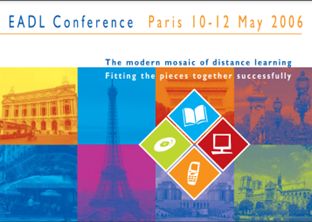
We met with the local host in September 2005 to plan the conference. The first of several work-related visits to Paris the next year. Making it hard to remember when my most noteworthy Paris experiences took place. The Catacombs with its walls of bones and stacking of skulls. The Père Lachaise Cemetery with the graves of Frederic Chopin, Jim Morrison and Oscar Wilde. The Pompidou Centre. The extravagant, but also minimalistic, burlesque shows at Lido, Moulin Rouge and Crazy Horse.
Eating with Dominique Richy at the fine restaurant with opera singing waiters. Tasting La Mère Chaterine’s frog legs at Place du Tertre, the lamb chops and at the local restaurant on the corner of L’eglise de la Madelaine. The falafels at Chez Marianne. Missing the great photo opportunity with a mouse passing by our table at Café de la Paix after a visit to Palais Garnier.
Had a memorable social conference evening on the Seine River Boat. Passing the illuminated Eiffel Tower and the down-scaled replica of the Statue of Liberty. Followed up with several bottles of wine at the riverbanks near Notre Dame.
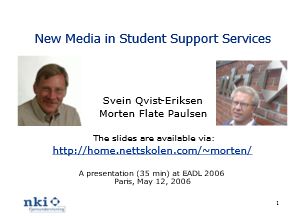
Remember Torunn Gjelsvik and Kjersti Hatlevoll represented the Distance Education Center at BI Norwegian School of Management. With a presentation titled: From print to digital marketing.
Svein Qvist-Eriksen’s and my presentation was titled New media in students support services. Including results from telephone interviews with 47 students about three phases of student support. Concluded that:
- direct personal contact with advisors is important in the prospective phase
- introduction to study techniques is important in the registration and start-up phase.
- quality feedback and quick turn-around time are important in the learning phase.
Mobile learning in Vienna with EDEN
The most painful learning experience at the EDEN 2006 annual conference in Vienna? My first encounter with the new term pocket dialling. My apologize goes out to my female colleague at the receiving end.
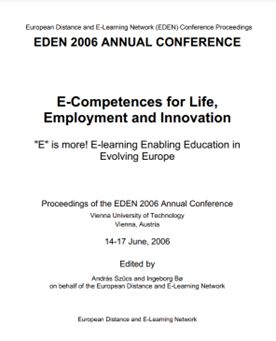 The conference was hosted by the Vienna University of Technology from June 14th to 17th. Marketed under the slogans:
The conference was hosted by the Vienna University of Technology from June 14th to 17th. Marketed under the slogans:
E-Competences for Life, Employment and Innovation
«E» is more! E-learning Enabling Education in Evolving Europe
Among the plenary speakers were Maruja Gutierrez-Diaz, Mary Thorpe, Gary Miller, Claudio Dondi and Carl Holmberg.
Norwegian notabilities and presenters were Ingeborg Bø, Torstein Rekkedal, Per R. Stokke, Torhild Slåtto, Alexander Dye, Hege Christin Stenhammer, Bodil Ask, Harald Haugen and Per Arneberg.
I chaired the session: Institutional Practice of Integrating E-learning. Shared some of NKI’s experiences with mobile learning. The other contributors who focused on m-learning in the session were:
- Aleksander Dye – Nettskolen, NKI, Norway,
- Bryan Jones – Ericsson, Ireland,
- Gabor Kismihok – Corvinius University of Budapest, Hungary
Remember attending a social evening in the Stadtpark. And the conference dinner at Castle Belvedere. The baroque castle surrounded by charming gardens with a nice view over the city and the inspiring painting the Kiss by Gustav Klimt.
At the cursor moment, I recall many thrilling experiences from several visits to Vienna. Among them are the roller coaster in the Prater amusement park, the concert in the Musikverein, the Lipizzaner horses at the Spanish Riding School, the Hundertwasser house and the Freud Museum. The hydrofoil on Danube from Vienna to Budapest is also recommendable. And of course, the world famous Sachertorte.
E-learning quality in European SMEs
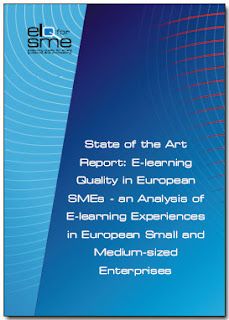 The report was published in October. The first publication from the ELQ-SME project. Funded by the Leonardo da Vinci Programme.
The report was published in October. The first publication from the ELQ-SME project. Funded by the Leonardo da Vinci Programme.
Edited by Vanda Vieira and me. The State of the Art Report: E-learning Quality in European SMEs. An Analysis of E-learning Experiences in European Small and Medium-sized Enterprises.
E-learning was not common in SMEs in 2006. But we included 18 transnational case studies of e-learning experiences from SMEs in Austria, Denmark, Estonia, Germany, Norway, the Netherlands, Portugal and Spain. Presenting examples of excellence from small, medium and large enterprises as well as training providers.
The project coordinator was Vanda Vieira from CECOA in Lisboa. Other central participants were: Alexandra Costa Artur (CECOA), Rene J.M. van Leeuwen (N.V. Interpolis), Natalie Morawietz (F-BB), Diederick Stoel (Profitwise) and Niels Chr. Moe (NKI).
The following e-learning advantages were especially pointed out in the case descriptions:
- Improved flexibility in time and location
- Reduced costs for travel, accommodation and seminar rooms
- Swifter and cheaper distribution of learning material
- Quicker introduction of new products due to accelerated training of many employees
- Increased sales because customers perceive e-learning as a sign of high competence
- Increased sales because e-learning could add value to the product
- Improved relations with customers and suppliers
EDEN Research Workshop Castelldefels
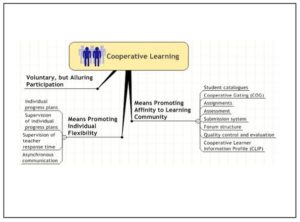 Flew to Barcelona on October 25th. To attend the EDEN Research Workshop in Castelldefels. It was EDEN’s fourth research workshop and my first. So, I was surprised that my paper COGs, CLIPs and Other Instruments to Support Cooperative Learning in Virtual Learning Environments was selected as finalist in the Best Paper Award competition.
Flew to Barcelona on October 25th. To attend the EDEN Research Workshop in Castelldefels. It was EDEN’s fourth research workshop and my first. So, I was surprised that my paper COGs, CLIPs and Other Instruments to Support Cooperative Learning in Virtual Learning Environments was selected as finalist in the Best Paper Award competition.
The paper is available from page 268 in the conference proceedings.
Mind map showing cooperative learning issues discussed in the paper.
I defined gating as a technique that denies students access to information before they have completed prerequisite task. The acronym COG – Cooperative Gating –signalled that students must meet a condition to get access to a cooperative resource. This could for example be used as a stimulus for motivating students to answer intext questions or share reflections. They are allowed to see what others have answered only if they provide an answer others may read.
Baldic Award for learning partner system
We introduced NKI’s learning partner service in March 16. 2006. Allowing students to:
- register a personal presentation
- decide who may access it
- search the presentations for potential learning partners
- invite others to become their learning partner
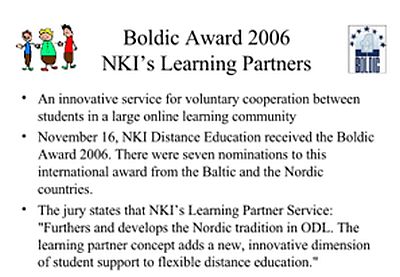
The system could be used to:
- establish informal contact between students who live in the same area or have matching progress plans
- establish formal groups to improve course completion
- match senior students with junior students in special assignments
In October, 3000 students had registered a personal presentation and 2701 had indicated their privacy preference regarding having learning partners. 55 percent wanted a learning partner, 45 preferred not to have one.
On November 16, we received the Boldic Award 2006 for the Learning Partner services. The jury stated that it: «Furthers and develops the Nordic tradition in ODL. The learning partner concept adds a new, innovative dimension of student support to flexible distance education.»
Megatrends at the EADTU conference in Tallin
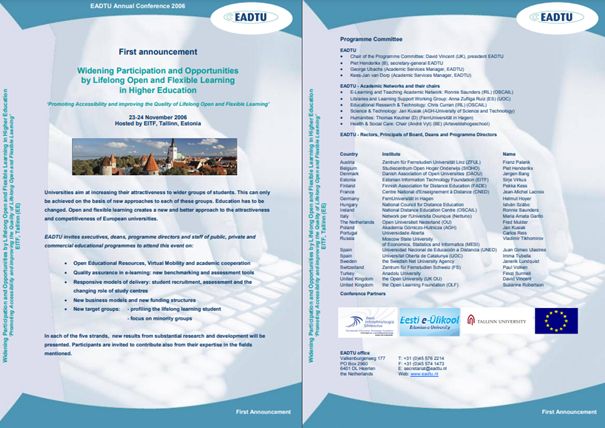
Back in Tallin on November 24. To give a presentation at the annual EADTU conference titled European Megaproviders of Online Education. Based on the preliminary results of the Megatrends project.
A project aiming to identify and analyse the largest European online schools. Concentrating on online distance learning at institutions that had more than 5,000 course registrations or 100 different courses in 2005. The preliminary results showed that Norway had no less than three institutions on the top twenty list and only Great Britain had more large online schools:
- Learn Direct (UK)
- Open Universiteit Nederland (Netherlands)
- Virtual Hochschule Bayern (Germany)
- Manchester Metropolitan University (UK)
- NKI (Norway)
- Staffordshire University (UK)
- The Open University (UK)
- Lund University (Sweden)
- Oncampus, Fachhochschule Lübeck (Germany)
- BI (Norway)
- Hungarian Telecom (Hungary)
- The University of Leicester (United Kingdom)
- Riga Technical University (Latvia)
- University of Tartu (Estonia)
- Dennis Gabor College (Hungary)
- NKS (Norway)
- The University of Ulster (Great Britain)
- Universitat de Barcelona Virtual (Spain)
- Universidad Politécnica de Madrid (Spain)
- Universitat Oberta de Catalunya (Spain)
Some 2006 Events
My translated selections of events from https://no.wikipedia.org/wiki/2006
February 18 – Kjetil André Aamodt wins Olympic gold in super-G.
May 31 – The Pirate Bay raid.
June 19 – The decision to build the Svalbard global seed vault was announced during a Scandinavian Prime Minister’s meeting in Longyearbyen.
July 1 – The new Labour and Welfare Administration (NAV) was established. A major change in the Norwegian welfare system.
August 23 – Natascha Kampusch, an 18-year-old girl who had been abducted for over 8 years, managed to escape from her kidnapper, Wolfgang Prikopil.
August 24 – As a result of a planet definition adopted at the International Astronomical Union’s annual meeting in Prague, Pluto was demoted to a dwarf planet.
October 9 – North Korea announced that it had conducted its first nuclear test.
October 13 – Ban Ki-moon was elected as Secretary-General of the United Nations to succeed Kofi Annan from 1 January 2007.
November 17 – The PlayStation 3 gaming machine was launched in the US.
December 8 – Nintendo Wii hits the market.
December 30- Saddam Hussein was executed in the Camp Copper military prison in Iraq.
My 2006 Publications
Slaatto, T. and M. F. Paulsen. 2006. Learning partner – opportunities for cooperation in distance learning. elearningeuropa.
Paulsen, M. F. and V. Vieira (Eds.) 2006. State of the Art Report: E-learning Quality in European SMEs – an Analysis of E-learning Experiences in European Small and Medium-sized Enterprises. Bekkestua, NKI. (161 pages, pdf-format)
Paulsen, M. F. 2006. COGs, CLIPs e outros instrumentos de apoio à aprendizagem cooperativa realizada em ambientes virtuais.
My 2006 Presentations
In 2006, I gave 10 external presentations in Norway, France, Estonia and Austria.
France
Private Distance Learning in Norway. A presentation at the CHANED Annual Meeting in Paris, 15.12.06.
New Media in Student Support Services a presentation at the EADL conference in Paris, France, 12.05.06.
Estonia
European Megaproviders of Online Education. A presentation at the annual EADTU conference in Tallin, 24.11.06.
Austria
I chaired the session: Institutional Practice of Integrating E-learning at the EDEN 2006 Annual Conference, Vienna, 16.06.06.
I took part in the presentation Mobile Learning: The Next Generation of Learning Exploring Online Services in a Mobile Environment at the EDEN 2006 Annual Conference, Vienna, 16.06.06.
Norway
Lessons Learned from the EU project: E-learning Quality for SMEs – Guidance and Counseling. A presentation at the Gevinst workshop in Oslo, 08.06.06.
Kvalitet og kooperativ læring i nettbasert utdanning. Foredrag på nettverkskonferansen for universitets- og høgskolepedagogikk i Trondheim, 28.09.06.
Presentasjon av EU-prosjektet ELQ-SME. NKI Fjernundervisning deltar i EU-prosjektet E-learning Quality in Small and Medium-sized Enterprises. Det er et toårig prosjekt om kvalitet i e-læring med spesiell fokus på kostnadseffektivitet og små og mellomstore bedrifter. Foredraget presenterer bakgrunnen for prosjektet og de foreløpige resultatene fra arbeidet. Foredrag på Abelia seminar i Oslo, 04.04.06.
Kvalitet i e-læring: Hva skjer når alle fjernstudentene får tilgang til Nettskolen? Foredrag på seminar for NKIs samarbeidspartnere i Tromsø, 24-26.04.06.
Nevu workshop i regi av Norgesuniversitetet i Tromsø. 18-20.01.06.
2007 - Searching for megatrends in online education
Acquired by ABNU
NKI Distance Education did well, but the other branches of the company struggled financially. So, ABNU acquired the NKI Group in January. Including NKI Distance Education, The Norwegian School of Information Technology (NITH), The Business Training Centre (NA) and NKI Publishing House.
Owned by two brothers, Nicolai and Peder Løvenskiold, ABNU was the educational branch of a private company named after Anthon B. Nilsen. A name passed on to his great grandson Anthon B. Nilsen – the current chair of the NKI board.
As many acquisitions, it initiated concern, hope and opportunities. Personally, I was excited by ABNU’s focus on the Scandinavian market and its ambition to take a leading position in the fast-growing market for e-learning. Expressed in the press release ABNU published on its website on January 3, 2007:
“Anthon B Nilsen AS has today announced that it has entered into an agreement to acquire the NKI Group with its educational operations in the IT, business and e-learning sectors. With this addition to its current activities, ABN Education, the education business area of Anthon B Nilsen AS, will further strengthen its position as a leading player in the Scandinavian market for private educational programs. The schools and programs run by the company will on an annual basis involve some 25 000 full time and part time students with a total turnover of NOK 562 Mill (Euro 68 Mill).
– During the recent eight years we have developed our position as a provider of private education with leading brands like Westerdals, Treider, Bjørknes and NISS in Norway and Berghs in Sweden. With the acquisition of the NKI activities, we will further extend our professional offerings and take a leading position in the fast growing market for e-learning programs making us the fifth largest player in Europe in this area, says Nicolai H. Løvenskiold, vice president of ABN Education. »
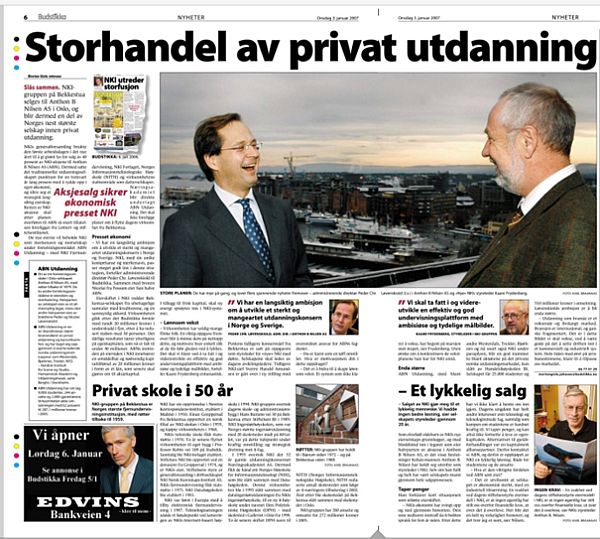
Facsimile from Aftenposten 03.01.07
NVU conference and Tisip’s e-learning award
The NVU 2007 conference was organized by the Bergen University College on March 13th and 14th. One in a series of yearly conferences from 2002 to 2011 arranged by four Norwegian University colleges that offered online courses through NVU (Nettverksuniversitetet).
Terry Anderson’s presentation was titled: Opportunities for learning with new Social Software – new tools for researching and evaluating these interventions.
Olav Skundberg talked about educational video resources. Svend Andreas Horgen shared his experiences with Moodle, Anders Foyn Heldal discussed LMS systems and web 2.0 and Astrid de Mora presented NKI’s experiences with learning partners.
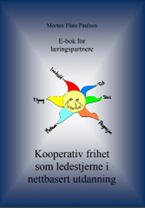 During my presentation about cooperative freedom in online education, I had the pleasure of handing out the first printed issues of my new book Kooperativ frihet som ledestjerne i nettbasert utdanning. A 78-page book in Norwegian detailing my thoughts and experiences with cooperative freedom in online education as we had implemented it in NKI’s LMS and operation.
During my presentation about cooperative freedom in online education, I had the pleasure of handing out the first printed issues of my new book Kooperativ frihet som ledestjerne i nettbasert utdanning. A 78-page book in Norwegian detailing my thoughts and experiences with cooperative freedom in online education as we had implemented it in NKI’s LMS and operation.
My speech at the conference dinner was very emotional. Talking about how we, as online educators, had made it possible for thousands of people to reach their educational goals. Thanking Thorleif Hjeltnes and his dedicated colleagues at the TISIP foundation and the Faculty of Information Technology and E-Learning at Sør-Trøndelag University College. As I received TISIP’s E-learning Award and NOK 50.000.
The award committee stated:
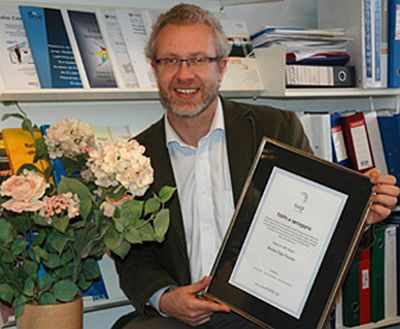 The price winner has worked with e-learning for 20 years. Since 1986, he has been the central person behind the development of the NKI Internet College and NKI’s LMS systems. During these years, he has made more than hundred presentations at national and international conferences. He has published a large number of books, reports and articles about e-learning in Norwegian, English and several other languages. He has taken part in about 20 Norwegian and European research and development projects about e-learning. For the development of NKI’s Learning Partner services, he received NKI’s Boldic Award for the best development in distance education in the Nordic and Baltic countries in 2006. His Theory of Cooperative Freedom is quite frequently referred to in the international field of e-learning. Morten Flate Paulsen has without doubt made a substantial and thorough research and development work in the field of online education.
The price winner has worked with e-learning for 20 years. Since 1986, he has been the central person behind the development of the NKI Internet College and NKI’s LMS systems. During these years, he has made more than hundred presentations at national and international conferences. He has published a large number of books, reports and articles about e-learning in Norwegian, English and several other languages. He has taken part in about 20 Norwegian and European research and development projects about e-learning. For the development of NKI’s Learning Partner services, he received NKI’s Boldic Award for the best development in distance education in the Nordic and Baltic countries in 2006. His Theory of Cooperative Freedom is quite frequently referred to in the international field of e-learning. Morten Flate Paulsen has without doubt made a substantial and thorough research and development work in the field of online education.
Facing Facebook
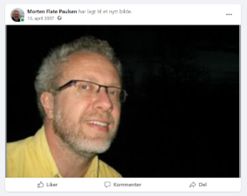 In April, I set up my Facebook profile. To learn more about the social media platform developed by the company Mark Zuckerberg founded in 2004. Created for Harvard students, but gradually expanded to other North American universities. Opened to anyone over 13 years old with an e-mail address in 2006.
In April, I set up my Facebook profile. To learn more about the social media platform developed by the company Mark Zuckerberg founded in 2004. Created for Harvard students, but gradually expanded to other North American universities. Opened to anyone over 13 years old with an e-mail address in 2006.
To my delight, I found many of the same features in Facebook that we had based our SESAM LMS on.
The picture shows my first profile picture on Facebook from April 16, 2007.
Major upgrade of NKI’s learning management system
NKI’s third generation learning platform was introduced in 1996 and named SESAM. Version 6 was launched during summer holidays. A quiet period making it is possible to do tests and upgrades with minimal inconvenience to students and teachers. Initially, the system had few new features, but it was based on new technology and system software. Making further development and maintenance faster and easier for the development team in the picture.
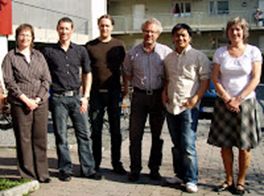 Project manager Aleksander Dye maintained that SESAM 6 was based on open-source code technology providing faster webservices, improved expansion options, more user-friendly interfaces and additional interactive elements.
Project manager Aleksander Dye maintained that SESAM 6 was based on open-source code technology providing faster webservices, improved expansion options, more user-friendly interfaces and additional interactive elements.
SESAM 6 was based on:
- Linux with Apache and Tomcat for stability and scalability
- Java technology such as Spring and Hibernate
- MySql database
- Webdav for file access
- AJAX for interactive web pages
On board to represent NKI employees
Some of my colleagues talked me into being a candidate. So, in May, I was elected to the NKI Board as one of the two board members representing the employees. For a two-year period. As an independent candidate competing with union representatives. My close colleague Niels Christian Moe also represented the employees. The external board members were Kaare Frydenberg (chair), Cato Hellesjø, Anne Otterstad, Sveinung Lunde and. Lars Eric Onarheim took over as chair of the NKI board from 2008.
In 2009, I was re-elected for a new two-year period. The board position gave me new insight and ample opportunity to push further development of NKI’s online education activities. And a front seat view on the management’s new strategies and mounting challenges.
Flying Norwegian to Valencia
The Norwegian Air Shuttle ASA was a growing and very ambitious low-cost airline. On April 24, Norwegian announced that it had bought 100% of the Swedish low-cost airline FlyNordic and become the largest low-fare airline in Scandinavia. On August 30, Norwegian ordered 42 new Boeing 737-800 aircraft, with options for 42 more.
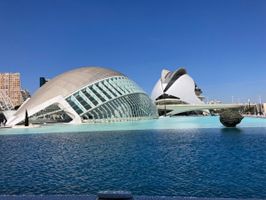 This resulted in many new international low-fare destinations from Oslo which we benefited from. My first of numerous Norwegian flights was a family trip to Valencia around May 1st. We enjoyed the old town with the ancient streets of the Barrio del Carmen, the Cathedral and the large Central Market. Were impressed by the futuristic City of Arts and Sciences. Relaxed at the beach – reading Michael F. Shaughnessy fresh contribution in EdNews.org. An Interview with Morten Flate Paulsen: Focusing on His Theory of Cooperative Freedom in Online Education.
This resulted in many new international low-fare destinations from Oslo which we benefited from. My first of numerous Norwegian flights was a family trip to Valencia around May 1st. We enjoyed the old town with the ancient streets of the Barrio del Carmen, the Cathedral and the large Central Market. Were impressed by the futuristic City of Arts and Sciences. Relaxed at the beach – reading Michael F. Shaughnessy fresh contribution in EdNews.org. An Interview with Morten Flate Paulsen: Focusing on His Theory of Cooperative Freedom in Online Education.
Still unaware that my next visit to Valencia in2010 would change my life.
The EADL conference in Dublin
The EADL conference in Dublin was organized by Kilroy’s College and held at the fashionable Westbury Hotel on Grafton Street. Opened on May 23rd by Dirk van der Mark, Charles and Patrick Kilroy.
As a member of the program committee, I remember we focused on social media and internet marketing. I’m glad we invited Tony Bates to talk about the impact of web 2.0 on distance learning. Christian Dalsgaard to consider social software in LMS. Desmond Keegan to discuss mobile learning.
I knew that the first-generation iPhone would hit the U.S. market in June. But did not realise how profoundly it would change our lives. Anyway, my presentation was about mobile technologies and NKI’s experiences with mobile learning. Based on our work with the four EU-funded projects:
- M-learning: From e-learning to m-learning (2001-2002)
- Mobile Learning: The Next Generation of Learning (2003-2005)
- Incorporating mobile learning into mainstream education and training (2005-2007)
- The role of mobile learning in European education (2006-2008)
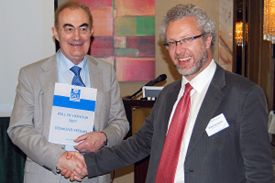 My favourite conference moment came when I could congratulate my role model Desmond Keegan with EADL’s Roll of Honour. Another emotional decision was to withdraw from the EADL R&D Committee du to my growing involvement with EDEN.
My favourite conference moment came when I could congratulate my role model Desmond Keegan with EADL’s Roll of Honour. Another emotional decision was to withdraw from the EADL R&D Committee du to my growing involvement with EDEN.
The Gala Dinner was held at the magnificent Powerscourt House and Gardens. I remember the impressive river dance performance and good conversations with Michael Lammersdorf, Bernd Schachtsiek, Torunn Gjelsvik, John Trasler and Kees Veen.
New EDEN services and executive in Naples
The EDEN annual conference was held at Citta della Scienza in Naples on June 13-16, 2007. The conference theme was New Learning 2.0? Emerging digital territories – Developing continuities – New divides.
The first EDEN conference with an online registration system and conference proceedings on CD. And my panel introduction is the first presentation in my Slideshare account.
I chaired a panel session titled Important success factors for European Megaproviders of Online Education. The panellist Paul Rühl, Pedro Michels and Jan Atle Toska shared and discussed their findings about success and failure in German, Spanish and Norwegian megaproviders.
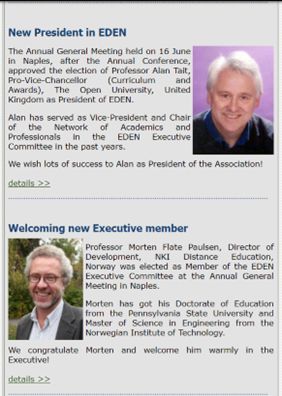 At the conference Alan Tait took over as EDEN President after Ingeborg Bø. And a new era started for me, as I was elected as member of the EDEN executive committee after Carl Holmberg.
At the conference Alan Tait took over as EDEN President after Ingeborg Bø. And a new era started for me, as I was elected as member of the EDEN executive committee after Carl Holmberg.
Vice Presidents were Ulrich Bernath and Martine Vidal. The other committee members were Andrea Kárpáti, Nikitas Kastis, Tapio Koskinen, Danguole Rutkauskiene and Albert Sangra.
The EDEN Fellow scheme was introduced at the conference and the first Senior Fellow and Fellow Awards were presented. The first Senior Fellows were: Sir John Daniel, Erling Ljosa, Erwin Wagner, Ingeborg Bø, Carl Holmberg, Claudio Dondi and Peter Floor.
The Naples waste management crisis was striking. The lack of waste collection and illegal toxic dumping. A formal state of emergency had existed for a decade. A crisis largely attributed to government failure and illegal waste disposal by Camorra.
After the conference, many headed on to Mount Vesuvius and the ruins of Pompeii. I took the train to Rome and spent the weekend in there. Enjoyed Italian cuisine in Trastevere. Saw the Trevi Fountain, the Spanish Steps, Castel Sant’Angelo, the Pantheon and Villa Borghese with the impressive Bernini sculptures and paintings by Titian, Raphael and Caravaggio.
Megatrends in e-learning
I spent a lot of time heading the Megatrends project. Working closely with enthusiastic and competent partners who became friends. Per Arneberg, Lourdes Guàrdia, Desmond Keegan, Jüri Lõssenko, Ildikó Mázár, Pedro Fernández Michels, Torstein Rekkedal, Albert Sangrà, Jan Atle Toska and Dénes Zarka.
We had three project meetings in 2007. Dublin, March 21-26 and May 22-25. Tromsø, September 13-18. Recall a candid evening with Jan Atle Toska. And a fabulous seven course Chinees dinner in Desmond Keegan’s private conservatory.
During 2007, we published four books in English and much of the content was translated into several languages. The most controversial was about E-learning initiatives that did not reach targeted goals. A report I followed up with the 2009 article Resting in e-learning peace (International Journal of Networking and Virtual Organisations 6 (5), 460-475).
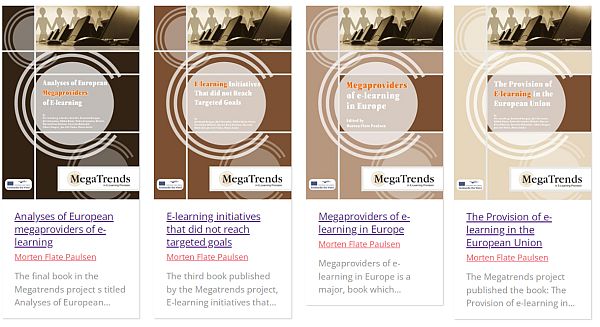
The first book, The Provision of e-learning in the European Union, presents data gathered from Norway and the 25 members of the European Union as an introductory overview of the provision of e-learning in Europe.
The second book, Megaproviders of e-learning in Europe, includes 26 case study articles of European megaproviders of e-learning.
The third book, E-learning initiatives that did not reach targeted goals, provides case study articles and analyses of nine prestigious European e-learning initiatives that did not reach their targeted goals.
The fourth book, Analyses of European megaproviders of e-learning, presents important success factors identified by the in-depth analyses of both the megaproviders and the discontinued initiatives identified in the project.
EDEN board on Hurtigruta
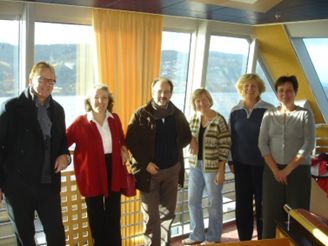 MS Midnattsol started its journey on October 18. Up the Norwegian coast from Trondheim to Tromsø. Ingeborg Bø’s chosen venue for her last meeting on EDEN’s Executive Committee. My first meeting following Carl Holmberg as elected member of the committee.
MS Midnattsol started its journey on October 18. Up the Norwegian coast from Trondheim to Tromsø. Ingeborg Bø’s chosen venue for her last meeting on EDEN’s Executive Committee. My first meeting following Carl Holmberg as elected member of the committee.
We started the executive meeting in a seminar room on the fifth deck in front of the boat. On the agenda were the upcoming conferences in Lisbon and Paris.
Sailing out the fjord, approaching the Norwegian Sea, I first observed sprays of sea water outside on the window. Then a growing number of uncomfortable faces around the table. No major discussions. Seasickness is recommended for quick agreements.
On the journey towards Bodø, we passed the Arctic Circle. Northern latitude 66 degrees and 33 minutes. The imaginary boarder to the land of the midnight sun. Where tourists at Hurtigruta are baptised by King Neptun with ice cubes.
We had a few hours stop in Bodø. Alan Tait and I went on a tour with a RIB. Rigid inflatable boat. Watching sea eagles flying close to the boat on the way to Saltstraumen. One of the strongest tidal currents in the world. A huge amount of seawater forces its way through a 3-kilometre long and 150-metre-wide strait every six hours and the tidal current can reach 40 kilometres per hour. We reached Saltstraumen when the current turned. The period when the strait is navigable.
50th Anniversary in Copenhagen
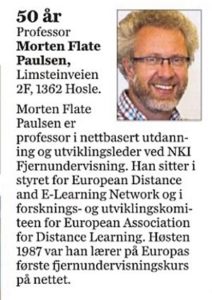 In the fall, 20-year-old son Stian started his bachelor studies in business and administration at the Copenhagen Business School. So, on October 28, the family of five celebrated my 50th anniversary in Copenhagen. Had a pleasant stay at the Copenhagen Marriott Hotel and an interesting visit to Glyptoteket’s exhibition of art and history.
In the fall, 20-year-old son Stian started his bachelor studies in business and administration at the Copenhagen Business School. So, on October 28, the family of five celebrated my 50th anniversary in Copenhagen. Had a pleasant stay at the Copenhagen Marriott Hotel and an interesting visit to Glyptoteket’s exhibition of art and history.
Sensed a fifty-year crisis approached when I read the anniversary note in Aftenposten. Realized that family life could change dramatically when the kids soon would leave home.
Celebrating 20 years of online education
On 20 November, NKI marked its 20th anniversary as an online school with an academic and social event during the NFF’s annual conference. My overview of the history was complemented with anniversary speeches by Desmond Keegan and Ine Marie Eriksen Søreide.
In his presentation, Keegan compared NKI’s development with three major public distance education institutions in Europe. He stated that Open University in the UK has been prudent and not moved rapidly to e-learning. The FernUnversität in Germany made a decision to go 100 % on-line, but the students rejected the move. The CNED in France seems little affected by the move to e-learning. Compared to these institutions, Keegan claimed that NKI has made a wise choice by always allowing the students to choose between online courses and distance education courses.
Ine Marie Eriksen Søreide was the current Chair of the Church, Education and Research Committee at the Norwegian Parliament Her speech was shared in my very first Podcast at https://www.podomatic.com/podcasts/mfpaulsen/episodes/2010-05-16T06_46_37-07_00
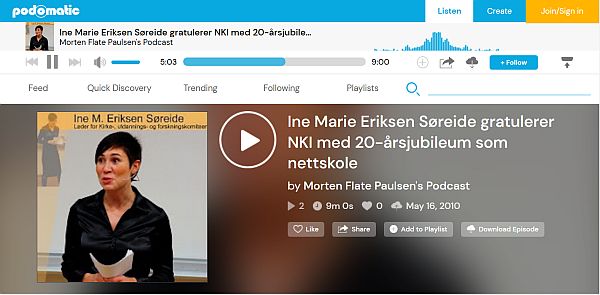
International anniversary greetings
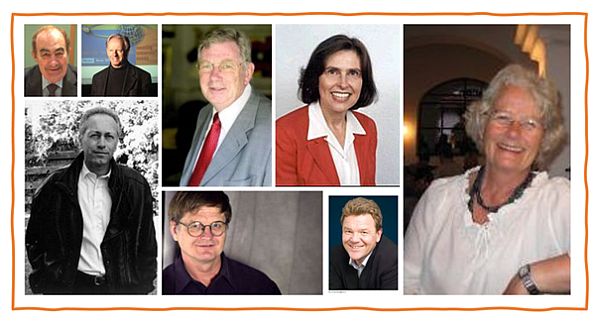
During the Fall NKI has received the following greetings from prominent experts and pioneers in the field.
Andrew Feenberg: The first online education program, at the Western Behavioral Sciences Institute in California, opened in 1982, only five years before NKI entered the field. Now 20 years later NKI is no longer a pioneer but a well established model for others. It has survived and grown through tremendous changes in technologies and mentalities. NKI has remained true to the ideal of bringing human communication to distance learning despite the temptation to automate education which fascinated so many institutional leaders in the 1990s. With the failure of that trend, for both technical and pedagogical reasons, NKI’s humanistic approach appears all the more justified. Congratulations to NKI on its birthday and may it continue to innovate for many years to come!
Robin Mason: Twenty years of online teaching is well worth celebrating. NKI is a true pioneer in the field of elearning. Now various forms of online teaching have become mainstream in most universities, whether on campus or at a distance. In 1987, it was a much more challenging, risky and demanding venture: the technology was non-intuitive, unreliable and less available than is the case now. Web 2.0 tools and approaches are again transforming the social environment in which elearning operates, just as modems, computer conferencing and the Web did in the 1990s. Who knows what elearning will become in another twenty years!
Tony Bates: NKI was a world leader in 1987 when it started offering online programs over the Internet. I was fortunate to be at the launch of this historic initiative, and have followed with great interest NKI’s continued success in this field. Vision, leadership and the professionalism of NKI’s staff are the main reasons for this success. You should enjoy this moment of celebration. As the Internet continues to develop, and new tools such as Web 2.0 continue to offer new opportunities for course design, there is no room for complacency. However, NKI has shown that it is well capable of meeting such challenges. May your next 20 years be as successful!
Terry Anderson: Congratulations to NKI for 20 years of contribution and service to not only thousands of Norwegian learners, but to a world wide community of researchers and on line learning practitioners! NKI is one of the few educational organizations, that though not directly funded or supported to conduct research has consistently and over 20 years, provided both theoretical and empirical research to guide not only its own practice, but that of a world wide community as well. As the editor of the International Review of Research on Open and Distance Learning, it is always a pleasure to receive an article for publication from NKI scholars. As on line learning becomes mainstream, the challenge and the opportunity for pioneers to continue to lead increases. I am confident that NKI will be leading in a new net-infused culture of life long learning for another 20 years – at least!! Best wishes for a joyful celebration of your success!
Øystein Djupedal: Congratulation with the anniversary! It is 20 years since NKI started online distance education. This was pioneer work, not only in Norway but also in Europe. It is not incidental that a Nordic institution is a frontrunner in this kind of education. Distance education is a legitimate child of the democratic knowledge ambition and the Nordic public education tradition. E-learning is a natural extension of the work NKI has conducted for almost 50 years. Education is liberating in itself, but online programs provide special conditions for liberating students from time and location. NKI reaches far to place student needs in the centre; one example is the students? opportunity to enroll anytime during the year. NKI has given other educational institution in Norway something to reach for regarding learning methods and flexibility. I hope NKI continues its development of the Norwegian educational common on the Internet, and wish NKI a successful anniversary.
Ingeborg Bø: Congratulations with the anniversary! You may be especially proud of your achievements during you first 20 years as an online college. NKI has all the time been a pioneer in online education and at the same time been able to develop cost-effective solutions and introduced them in large-scale operations. NKI has offered a large number of people opportunities to acquire an education they else would not be able to obtain. I know that most NKI-students are busy people with job- and family responsibilities and that most of them choose NKI’s online courses because of the unique flexibility. I will however especially mention the important social contributions NKI has achieved through the adaptation of its courses for students with disabilities, Norwegians abroad, women who care for children and elderly, inmates in prisons, and especially all those who have so depressing educational experiences that they never more will enter a class room.
I would also focus on NKI’s impressive list of merits which shows that NKI:
- Was the first European institution to offer online distance education
- Is one of Europe’s largest providers of online distance education
- Has a developed a special system for individual progress planning and supervision which has attracted substantial interest in the international field of online education
- Received the international Boldic Award in 2007 for development of the innovative Learning Partner Service
- Received the Rosing Competence Award in 2003
NKI may be proud its achievements during the past 20 years, and I hope that the authorities will increase their support to this form of online education in the future.
Erling S. Andersen: I congratulate Nettskolen with its 20th anniversary. I applaud Morten Flate Paulsen for his foresight and continuous contribution to the advancement of online education in Norway.
In the mid-eighties, I was Dean of Datahøgskolen, which was owned by NKI. Morten was one of my close colleagues. He came up with the idea of developing an online education service. NKI was one of the leading correspondence schools in Norway and Datahøgskolen had a milieu interested in various applications for information and communication technology, so his proposal was not far fetched. Still, it was a very creative initiative. We must remember that this was long before Internet and e-mail were commonplace. Dedicated learning management software had to be developed. Together with students at Datahøgskolen, Morten designed the learning management system EKKO for Datahøgskolen’s mini computer.
Morten promoted a virtual school and a virtual classroom; he argued that we should develop an electronic college that should be available independent of time and space. He had to endure many wisecracks for introducing the term virtual, meaning imaginary as opposed to real, but as a genuine founder with unfaltering belief in his ideas, he carried on. Because of his efforts, NKI and Datahøgskolen were able to introduce electronic distance education.
I encouraged Morten to pursue further academic studies in the field, and he received a doctoral degree in the US. He has contributed to develop online distance education to an academic field, and he is appointed professor of online education.
I congratulate you and wish further progress for NKI’s online education which presents flexible solutions for people who want to study.
Some 2007 Events
My translated selections of events from https://no.wikipedia.org/wiki/2007
- January 8 – Russian oil supplies are cut to Poland, Germany and Ukraine, following an escalation of the energy dispute between Belarus and Russia. Supplies are restored 3 days later.
- January 15 – Norway’s first 24-hour television news channel, TV 2 Nyhetskanalen, premieres.
- April 6 – The second report from the UN climate panel is presented.
- April 23 – Canada bans regular light bulbs.
- June 29 – The first generation iPhone hit the U.S. market
- December 21 – The Schengen Treaty is extended to include the countries of Hungary, the Czech Republic, Estonia, Latvia, Lithuania, Malta, Poland, Slovakia and Slovenia.
My 2007 Publications
Paulsen, M. F. et al. The Provision of e-learning in the European Union. Bekkestua, NKI.
Paulsen, M. F. (Ed.) 2007. Megaproviders of e-learning in Europe. Bekkestua, NKI. (209 pages)
Paulsen, M. F. et al. E-learning initiatives that did not reach targeted goals. Bekkestua, NKI.
Paulsen, M. F. et al. Analyses of European megaproviders of e-learning. Bekkestua, NKI.
Paulsen, M. F. 2007. COGs, CLIPs and Other Instruments to Support Cooperative Learning in Virtual Learning Environments. In Bernath, U., Sangrá, A. (Eds.) Research and E-Learning: Selected Papers from the 4th EDEN Research Workshop in Castelldefels, Spain 25-28 October, 2006. Volume 13 of the ASF Series on Distance education.
Paulsen, M. F. 2007. Kooperativ frihet som ledestjerne i nettbasert utdanning. NKI Forlaget. Sider: 74. Boken er gratis tilgjengelig på nettet.
CECOA (Edição) 2007. Relatório do Estado da Arte: Qualidade do E-learning para PMEs Europeias – uma Análise de Experiências de E-Learning em Pequenas e Médias Empresas. Lisboa, CECOA. (81 pages, pdf-format)
f-bb 2007. Eine Analyse von E-Learning in europäischen Klein- und Mittelbetrieben. Nürnberg, f-bb (28 pages, pdf-format)
Tartu Ülikool 2007. Hetkeolukorra kirjeldus: e-õppe kvaliteet Euroopa VKE-des e-õppe kogemuse analüüs Euroopa väikese ja keskmise suurusega ettevõtetes (162 pages, pdf-format)
My 2007 presentations
In 2007, I gave 12 external presentations in Norway, Portugal, Germany, Italy, Ireland and Denmark
Portugal
E-learning Quality in European SMEs – an Analysis of the E-learning Experiences in European Small and Medium-Sized Enterprises. A presentation at the international conference E-Learning Quality and Return on Investment for Small and Medium-Sized Enterprises in Lisboa, Portugal, 13.11.07.
Germany
Cooperative Freedom as a Guiding Star for Online Education. A presentation at the University of Hildesheim in Germany, 08.11.07.
Italy
Important success factors for European Megaproviders of Online Education. A presentation at the Megatrends workshop at the EDEN 2007 Conference in Naples, 15.06.07.
Ireland
Mobile technologies – The NKI case study. A presentation at the EADL conference in Dublin, 24.05.07.
Denmark
Megatrends in online distance education – survey and analyses of European megaproviders of e-learning – Experiences and preliminary results. A presentation at the conference E-learning in Europe: From projects to practice in Copenhagen 23-24.04.07.
Norway
Kooperativ frihet i nettbasert utdanning. Et foredrag på konferansen Oppvekst i den digitale tidsalder på Sandvika videregående skole i regi av Akershus fylkeskommune, 25.10.07.
Kooperativ frihet i nettbasert utdanning ved NKI Fjernundervisning. Foredrag på et åpent BI-seminar i Oslo, 31.05.07. Se omtale av foredraget på BIs nettsider med tittelen: Stor interesse for kooperativ læring.
Kooperativ frihet som ledestjerne i nettbasert utdanning. Et foredrag på NFFs årsmøte 17.04.07.
Kooperativ frihet som ledestjerne i nettbasert utdanning – Sentrale og strategiske tjenester for Nettskolen. Foredrag på et åpent NKI-seminar den 18.04.07.
Kooperativ frihet som ledestjerne i nettbasert utdanning. Innledningsforedrag på NVU-konferansen i Bergen, 13.03.07. Som oppsummering av konferansen hadde Terry Anderson og jeg en samtale om Læring, teknologi og menneske – Utfordringer i undervisning når læring skal foregå i skjæringspunktet mellom menneske og teknologi. Se også artikkel om konferansen.
Nettbasert utdanning ved NKI Fjernundervisning. Foredrag på Attføringskonferansen i regi av NKI Fjernundervisning på Hell, Stjørdal, 22.03.07.
NKI Fjernundervisnings erfaringer fra deltakelse i et dusin EU-prosjekter om nettbasert utdanning. Foredrag på et seminar i Oslo den 25.01.07, i regi av Norgesuniversitetet, ABM-utvikling og Senter for internasjonalisering av høyere utdanning (SIU).
2008 - Profiling students
Barred in Bergen
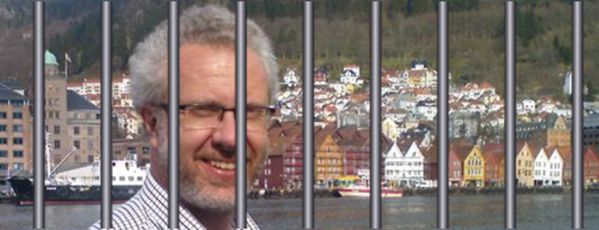
Wikipedia had just passed 10 million articles and the new Oslo Opera House had barely opened, when I flew to Bergen on April 23. To attend a seminar that inspired me to write the following blogpost Barred from the Internet:
I recently spent two days in the picturesque Norwegian town of Bergen, attending a captivating workshop on online education in prisons. Going home, I imagined myself as newly released, trying to find work and handle my daily life after being barred from the Internet for ten years. It dawned on me that I was deprived of basic human skills.
Understandably, inmates have limited access to the Internet. But there are technical solutions secure enough to provide inmates, even in high security prisons, access to the web. These solutions are basically based on gateways that:
- only allow access to whitelisted domains
- accept inbound information, but reject outbound messages
- provides detailed log files of all traffic
Working at NKI Distance Education, I’m pleased to understand that inmates for decades have followed our correspondence courses and that several low security prisons now allow them to study our online courses. Some telephone calls, certain addresses, and special examination arrangements points to prisons, but as far as I know, NKI doesn’t have, and probably shouldn’t have, any statistics or systematic information about the extent and outcome of its prison education.
Generally, the challenges in European prison education are dire and tough. There is a broad range of individual needs that are handled with limited resources. Many inmates are drop-outs with distressing school experiences. Security, learning disabilities and foreign language issues are demanding. But The European Convention on Human Rights states in Article 2 that, “No person shall be denied the right to education”. So, in my quest to learn more about these issues, I found comfort in the thirteen recommendations on education in prisons provided by the European Council. They are all listed at a web site for the European Prison Education Association.
I also found two relevant European projects. The objective of the Pipline project was to improve prison education in Europe by making ICT available to learners and teachers. The HERO project focused on health promotion and educational support for the rehabilitation of offenders. Both projects developed, piloted and demonstrated online education solutions for high security prisons. It troubles me however, that they had to rely on inside learning management systems that deny access to the vast range of outside courses. It also disturbs me that inmates consequently are not able to continue these inside courses after they are released.
My conclusion is that online education has a potential to improve prison education significantly. First of all, it may increase the range of available courses dramatically. Secondly, it makes it much easier to stay the course in spite of the frequent relocations that are common in prisons. Finally, it may help prisoners continue and complete courses after they are released.
War in Europe
In May 2008, Dmitry Medvedev was sworn in as President of Russia and Vladimir Putin was then elected Prime Minister. In August, the Russo-Georgian War took place. The war between Georgia, Russia and the Russian-backed self-proclaimed republics of South Ossetia and Abkhazia. Following a period of worsening relations between Russia and Georgia. Former Soviet republics fighting in the strategically important South Caucasus region. Regarded as the first European war of the 21st century.
At the cursor moment, as President Putin annex four Ukrainian regions, we were reminded of the Russo-Georgian War, Russia’s 2014 annexation of Crim and invasion of Ukraine in 2022. Dire reminders of the horrors of war.
The first EDEN conference blog in Lisbon
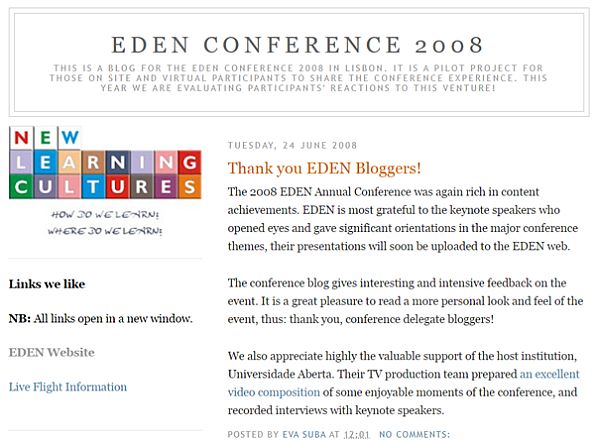
The EDEN annual conference was held 11-14 June at the Cultural Center in Belém near Lisbon. Organized in collaboration with Universidade Aberta (UAb) in Portugal. The public university that was established for distance education in 1988. Which has offered all programs online since 2008.
UAb’s Pro Rector António Moreira Teixeira deserves a lot of credit for making the conference a success for the 529 delegates representing 42 nationalities. As one of the 40 participants from Norway, I enjoyed the delicious Pastéis de Belém and many of Belém’s historic attractions.
The Belém Palace with its official residence of the Portuguese President. The Jerónimos Monastery with Vasco da Gama’s sarcophagus. The Belém Tower that served as a point of embarkation and disembarkation for Portuguese explorers. The 52-metre-high Monument of Discoveries. And the 2277-meter suspension bridge crossing the Tagus River. Named after the date of the Carnation Revolution 25 de Abril, 1974. Towards the outstretched arms of the Christ the King sanctuary. Reminding us of Corcovado.
We prepared the conference in Executive Committee meetings at the UAb office in Lisbon in February and the OUUK office in London in April. Decided that the conference slogan was New Learning Cultures – How do we learn? Where do we learn?
Web 2.0 and social media were hot topics at the conference. So, it made sense to introduce the first EDEN conference blog http://edenconference08.blogspot.com/
Reading the blog, gave me more vivid memories from this conference than the other conferences I have chronicled. The pictures and the personal accounts virtually brought me back to the venue. So, kudos to Steve Wheeler, Eva Suba, Anna Grabowska and Jack Koumi who were among the most active contributors. The pictures and the personal accounts virtually brought me back to the venue. They reminded me that Torstein Rekkedal and Walter Kugemann were honoured as EDEN Senior Fellows. And that I probably chaired a crowded session.
Global student profiles and 100.000 enrolments
We celebrated August 22. That we had accumulated one hundred thousand online course enrolments. An enthusiastic group of colleagues, teachers and students were treated with cake and interviews by local TV. The clip from TV Budstikka is still available at https://www.youtube.com/watch?v=DBTlk4Yibvc
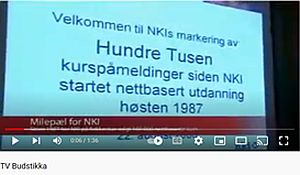
Five students with impressive global student profiles were specially invited as guests of honour.
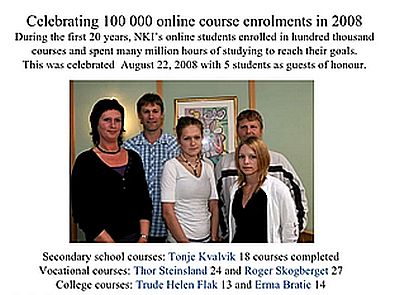
Here are my reflections on the celebration posted in the EDEN President’s Blog:
In August 2008, NKI Distance Education celebrated its online course enrolment number one hundred thousand. At the same time, we developed and introduced NKI’s new online catalogue profiling students, tutors and employees. All 9500 users registered in NKI’s Learning Management Systems have personal presentations which automatically list relevant information about the users and their courses. In addition, most users add a photo and some information about their previous education, work experience and personal interests.
Now, all users can choose to include their presentation in the open catalogue, by clicking the Global visibility checkbox in their user profile. One month after the catalogue was launched; 250 people (2.5 percent of the users) had chosen global visibility. If 10 percent of the users eventually opt for global visibility, the catalogue will include about one thousand personal presentations. This is a significant development which should be of interest to EDEN members for three reasons:
Firstly, it seems like many students appreciate the opportunity to share information about their online course activities with family, friends and colleagues. Others seem to use the presentation as an online CV to support job applications. In any case, most presentations act as favourable personal homepages that focus on the students’ achievements.
Secondly, the catalogue appears to be a valuable resource for NKI. The users are excellent ambassadors for NKI when they share their presentation with others. They provide a lot of relevant information for prospective students and key words for the search engines. All the positive and trustworthy testimonials from current students and teachers will probably have a positive effect on NKI’s future course enrolments.
Thirdly, the fact that so many serious, hard-working and successful students are willing to share achievements and experiences in an open, online catalogue is valuable for the field of online education. Traditionally, distance students tend to be quite invisible compared to other groups of students. They are so dispersed and so busy with their courses, jobs and family obligations that they seldom form action groups or student unions. Online student catalogues may help these students become more visible as a group that deserves more attention.
Even though NKI’s catalogue is in Norwegian, I promise you an interesting surprise if you brows it with Google’s automatic translation service. Maybe EDEN could do something similar for its NAP members?
Electronic badges to senior and fellow students
In 2011, the Mozilla Foundation announced their plan to develop an open technical standard called Open Badges.
Three years earlier, I was fascinated by the introduction of the EDEN Fellows scheme and used this an inspiration to honour students who had completed many online courses. Fortunately, we had comprehensive historic data in our student administrative system. About students who had completed NKI’s correspondence courses and online courses. A treasure chest that automatically could be included in the students’ personal profiles.
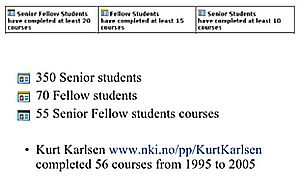 So, on August 22 we started to show all completed courses in the student profiles. Along with bronze, silver and gold badges provided to student who had completed many courses. In November, we used this to introduce an online Roll of Honour. Presenting automatically generated lists of Senior Fellow students, Fellow students and Senior students. Students who respectively had completed 20, 15 and 10 online courses. All qualified students were listed automatically when they ticked Global visibility on their profile page. At the introduction, we had 55 Senior Fellows, 70 Fellows and 350 Seniors who qualified to be on the Roll of Honour. Most impressive was Kurt Karlsen who topped the list as he had completed 56 courses as a distance student.
So, on August 22 we started to show all completed courses in the student profiles. Along with bronze, silver and gold badges provided to student who had completed many courses. In November, we used this to introduce an online Roll of Honour. Presenting automatically generated lists of Senior Fellow students, Fellow students and Senior students. Students who respectively had completed 20, 15 and 10 online courses. All qualified students were listed automatically when they ticked Global visibility on their profile page. At the introduction, we had 55 Senior Fellows, 70 Fellows and 350 Seniors who qualified to be on the Roll of Honour. Most impressive was Kurt Karlsen who topped the list as he had completed 56 courses as a distance student.
My review of the global student profiles available at www.nki.no/pp indicated that NKI’s 9,000 online students represented a broad section of the population. The vast majority were ordinary people who found that online studies was a good and flexible form of study. For many, online studies had nevertheless been the only relevant opportunity to get the education they wanted. This applied, for example, to working people who did not have time or opportunity to follow traditional education, women with care for young children (70% of NKI’s online students were women), Norwegians abroad (NKI had online students in at least 35 countries), students with disabilities, people on rehabilitation and inmates in prisons.
Study online journalism
We received NOK 300,000 in support from Norgesuniversitetet to develop a course in Online Journalism. Initiating an innovative and inspiring collaboration with Arne Jansen and Nhat Chu to create Webjournalisten.com. NKI’s online journal for students in Online Journalism. Allowing students to work in a virtual newsroom and publish articles in Joomla.
The screenshot shows one page with Google translate. A service offering Norwegian translations from May 2008.
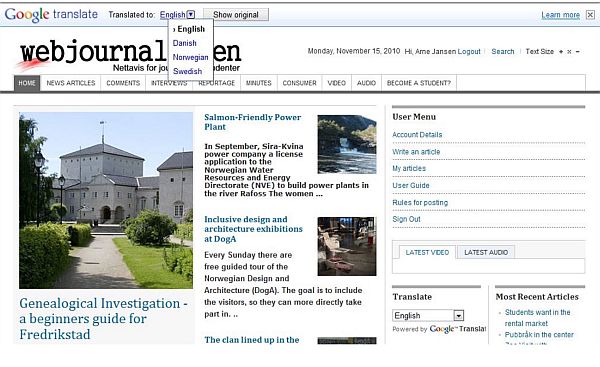
Inspired by the City University of New York’s Graduate School of Journalism and their student driven online journal NYCityNewsService. A service promoted as a state-of-the-art multi-media-newsroom.
In September, the international financial crisis accelerated when the American investment bank Lehman Brothers filed for bankruptcy. At the same time, Arne Jansen published the first articles as editor of Webjournalisten.com and teacher in Online Journalism. He argued that online journalism differed from traditional journalism in several areas. Continuous updating, use of photo series, video, flash animations and links created new opportunities and challenges for journalists. And that students appreciated the opportunity to publish their work in an online newspaper written by students and open to everyone. So much more transparent, real and interesting than just submitting their student work to a teacher.
At the cursor moment, I miss Arne Jansen who passed away far too early during the pandemic. An online pioneer and esteemed colleague we honoured by attending the funeral which was streamed online.
EDEN research workshop in Paris
The 5th EDEN Research Workshop was organized October 20-22 in Paris. In co-operation with CNED – the French national distance learning centre (Centre National d’Enseignement a Distance). Under the patronage of UNESCO and in its head quarter at Place de Fontenoy. Close to Tour Eiffel and Hôtel des Invalides with Napoleon’s tomb.
The conference theme was Researching and Promoting Access to Education and Training – The Role of Distance Education and e-Learning in Technology-Enhanced Environments. The EDEN Vice Presidents Martine Vidal and Ulrich Bernath contributed much to the conference program and improved the referee scheme for acceptance of research papers.
We invited Thor Steinsland to share his experiences as an online student at NKI. In a presentation titled How to manage 28 self-paced courses, three kids and a job in the North Sea.
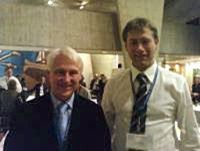 He had the following advice for others who want to combine online education with work and family life:
He had the following advice for others who want to combine online education with work and family life:
- Focus on family, work and studies
- Cut organized leisure activities, they steal too much time
- Don’t study during the holidays, if you don’t absolutely have to
- Reserve your own desk and PC for your studies to avoid conflicts
- Agree your weekly schedule with your family
- Ensure support and understanding from your employer
- Be positive – it’s your choice to study
Transparency cartoons in Seminar.net
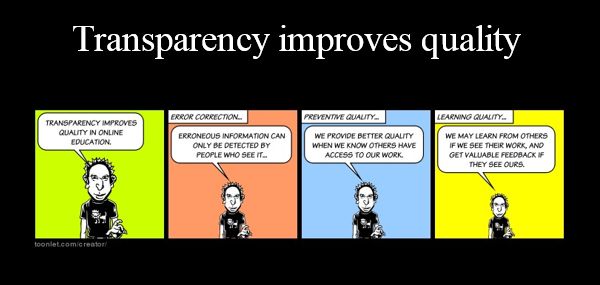
The editorial team asked authors to include videos that introduced their articles. An innovative, but challenging approach. So, Bente Midtsveen helped me make a video to introduce my article Cooperative Online Education that went online in November. In the second 2008 issue of Seminar.net. With a video including cartoons, speech synthesis and an interview with the author. Maybe a contribution that got me into the journal’s editorial board?
The first issue of Seminar.net was published in January 2005. An online journal focusing on ICT and media is used in education. With an editorial team at the University College of Lillhammer in Norway. Still headed by professor Yngve Nordkvelle.
Working with new web 2.0 services and the article, I became more aware that transparency in online education was both important and challenging. As expressed in the cartoons developed for the video presentation.
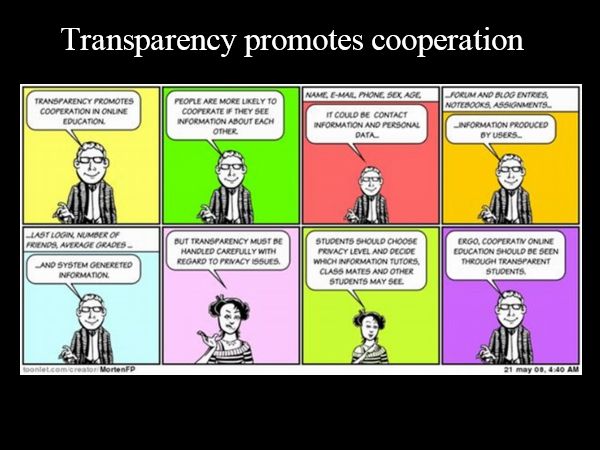
Some 2008 Events
My translated selections of events from https://no.wikipedia.org/wiki/2008
- February 19 – Fidel Castro announced that he was stepping down as President of Cuba.
- February 24 – Raul Castro was elected as the new president of Cuba.
- February 26 – Official opening of the Svalbard global seed vault.
- March 27 – Wikipedia passed 10 million articles.
- April 12 – Opening of the new opera house in Oslo.
- May 7 – Dmitry Medvedev was sworn in as President of Russia and Vladimir Putin was later elected Prime Minister.
- August 8 – 24 – Beijing hosted the 29th Summer Olympic Games.
- September 15 – The American investment bank Lehman Brothers files for bankruptcy, accelerating the international financial crisis.
My 2008 Publications
Paulsen, M.F. and Rekkedal, T. 2008. The Role of Mobile Learning in Denmark. In: Carvalho, J. et al. The Role of Mobile Learning in Europe Today. pp. 50-58.
Paulsen, M. F. 2008. Cooperative Online Education. Seminar.net, Vol. 4, No. 2.
My 2008 presentations
In 2008, I gave 6 external presentations in Norway, Germany, Belgium, Denmark and UK.
Germany
Cooperative Virtual Learning Environments. A presentation at Online Educa, Berlin, December 5, 2008
Belgium
The Megatrends Project and Online Education Consortia. A Keynote presentation at the EuNeOn founding ceremony on October 7 in Brussels.
UK
Success Factors for Megaproviders of Online Education. A presentation at the Research Workshop – Strategies for Delivering Global Education, Organized by ifs School of Finance. London, June 27, 2008.
Denmark
Kooperativ frihet i nettbasert utdanning: Eksempler og erfaringer fra NKI Fjernundervisning. Foredrag på seminaret: Viden og medier ved Aarhus universitet, 05.05.08.
Norway
Utvikling av- og erfaringer med nettbasert utdanning i NKIs nye læringsplattform. Foredrag på NFFs årskonferanse, Oslo 19.11.08.
Gode døme på nettstøtta utdanning og Praktiske erfaringer frå eit nettlæringslandskap. Foredrag på et seminar i Bergen i regi av Fylkesmannen i Hordaland, 23.04.08.
2009 - Moving to Portugal and Universidade Aberta
Individual monthly progress reports
We already had five years of experience with NKI’s individual planning system. An innovative tool in the SESAM learning portal that helped students register and follow their individual plans. An important tool that initiated reminders to procrastinating students from the portal, teachers and student advisors.
But these reminders could also be annoying. Like payment notices and bank overdraft notifications.
So, I argued that we should develop individual monthly progress reports that were more informative, encouraging and rewarding. For both procrastinating students and students who followed their plans. Reports that should be e-mailed to all student, not only to the students who fell behind their plans.
Reports that should reach out with news and information to all students, encourage them to log on more frequently and improve the data quality in the LMS.
From January 2009 we started to e-mail these individual monthly progress reports to all students. The students could also order an updated report any time from their online account.
An example report translated to English with individual information coloured red is shown in the figure:
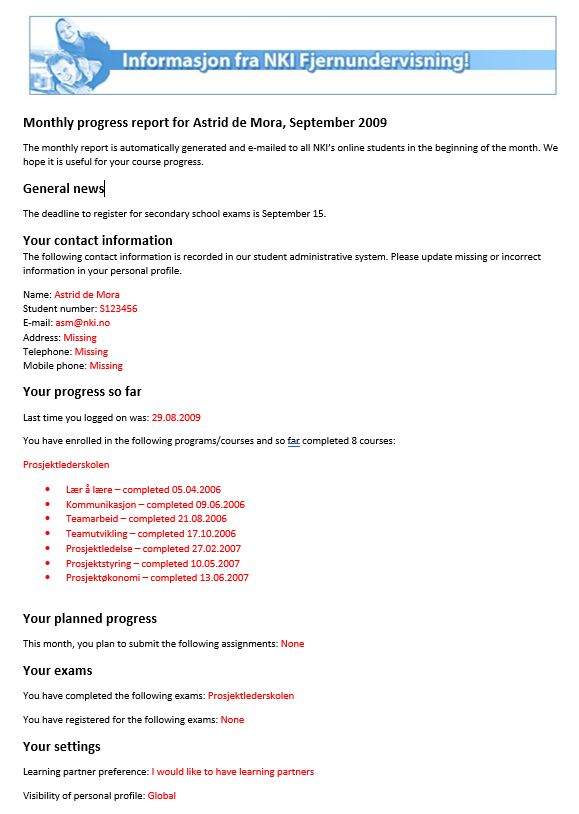
With Løvenskiold at Berghs in Stockholm
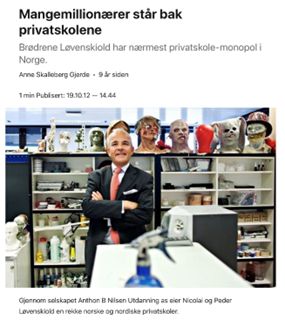 In February 2009, Nicolai Løvenskiold, invited me to visit Berghs School of Communication. As one of the two brothers who owned NKI, Berghs and several other private schools in Scandinavia. Eager to show me Berghs school in Stockholm. Wanted me to present NKI’s online education activities and opportunities for collaboration between his schools. So, I met CEO Pär Lager and his team. Floated the idea of establishing a Scandinavian cooperative program for multimedia journalism. Offering courses in web-journalism, audio-journalism and video-journalism to Scandinavian students. And allow them to publish their work in Webjournalisten – the web-based newspaper we had developed for students.
In February 2009, Nicolai Løvenskiold, invited me to visit Berghs School of Communication. As one of the two brothers who owned NKI, Berghs and several other private schools in Scandinavia. Eager to show me Berghs school in Stockholm. Wanted me to present NKI’s online education activities and opportunities for collaboration between his schools. So, I met CEO Pär Lager and his team. Floated the idea of establishing a Scandinavian cooperative program for multimedia journalism. Offering courses in web-journalism, audio-journalism and video-journalism to Scandinavian students. And allow them to publish their work in Webjournalisten – the web-based newspaper we had developed for students.
Flying home with Nicolai, he voiced grand visions for NKI’s online education activities and supported my wish for a sabbatical. Said the new owners needed a year to refine the organization and find a new management. Confirmed that I would have a position in the management team when I returned.
So, I contacted Albert Sangrà and António Teixeira about opportunities for a sabbatical in Barcelona or Lisboa.
NKI’s 50th anniversary with EADL in Oslo
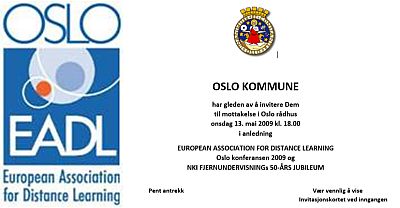 The European Association for Distance Learning (EADL) held its conference at Grand Hotel in Oslo from May 13 to 15. A fashionable hotel located at Karl Johans gate, nestled between the Royal Palace and the Parliament in the city centre. The social program included a reception with the Mayor in Oslo City Hall followed by folklore, music and traditional food at Akershus Castle. A guided tour to the Nobel Peace Center and a conference dinner in the Hall of Mirrors at the Grand Hotel.
The European Association for Distance Learning (EADL) held its conference at Grand Hotel in Oslo from May 13 to 15. A fashionable hotel located at Karl Johans gate, nestled between the Royal Palace and the Parliament in the city centre. The social program included a reception with the Mayor in Oslo City Hall followed by folklore, music and traditional food at Akershus Castle. A guided tour to the Nobel Peace Center and a conference dinner in the Hall of Mirrors at the Grand Hotel.
All NKI employees and EADL conference delegates were invited to the Oslo City Hall on May 13. To celebrate NKI’s 50 years as a Norwegian company. The extended history began in 1910 when Hilbert Norén established Norén’s Correspondence Institute in Sweden. In 1926, several Swedish correspondence schools merged under the name NKI-skolan and in 1959 a separate office was established in Norway. In 1966, the Swedish NKI school was closed and NKI’s association with Sweden ceased.
Torhild Slåtto was executive director of the Norwegian Association for Distance Learning and Flexible Education (NFF). She organized the conference with her staff in close collaboration with NKI and the EADL secretariat. The conference gathered around 80 participants from all over Europe.
NKI’s marketing manager, Elisabeth Møystad, was on the EADL board. The main theme of the conference was «Drinking from the digital well»: How can we utilize the enormous digital opportunities to create digital learning resources and develop good services for distance students?
Chair of the education committee in the Norwegian Parliament, Ine Marie Eriksen Søreide, gave one of the introductory lectures. Eirik Newth, Norwegian astrophysicist, and Danish Klaus Mogensen from the Institute for Future Research in Copenhagen discussed the future of digital education. Svein Qvist-Eriksen presented NKI Distance Education 1959 – 2009: Celebrating 50 years as a Norwegian Institution. My presentation was titled Risks and opportunities of a social network.
The following presentations listed in the program indicate our focus in 2009:
- Michael Lambert: What does the global economic crisis mean for distance learning
- Eirik Newth: Learning in the Cloud
- Klaus Æ. Mogensen: The future of learning
- Kirsti Kierulf: How to use web2.0 for knowledge management and innovative processes
- Bent Kure: Vivid images – vivid learning
- Anne Rønning: Being sure to be seen
- Morten F. Paulsen: Let your learners learn together
- Kenneth Gvein: Let your students do the marketing for you
- Christianne Orto, Stefan Karapetkov: Encore, Interactive Music Performance, Educations and More
- Stephen Bourne: How does a publishing house behave in the digital age?
- Sven Åke Bjørke: e-learning in higher education
Pushing all online – or not?
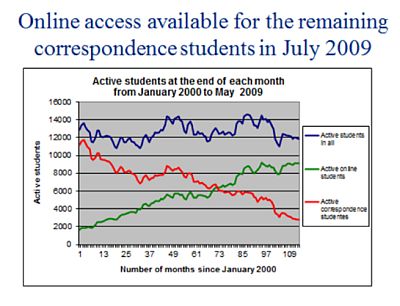 In the spring, we established the project group All Online with the aim of getting all correspondence students online. They finished a successful test period with 300 students who had enrolled as correspondence students but volunteered to access the online version of their courses. So, in June, we offered all correspondence students the same opportunity. They could continue as correspondence students if they preferred, but we urged them to test the value-added services they got as online students. Including records of all courses they had completed and grades they had accrued as correspondence students.
In the spring, we established the project group All Online with the aim of getting all correspondence students online. They finished a successful test period with 300 students who had enrolled as correspondence students but volunteered to access the online version of their courses. So, in June, we offered all correspondence students the same opportunity. They could continue as correspondence students if they preferred, but we urged them to test the value-added services they got as online students. Including records of all courses they had completed and grades they had accrued as correspondence students.
The graph shows that the number of online students increased continuously at the expense of correspondence students. In May 2009, nearly 80 % of NKI’s 12000 students were enrolled as online students.
The whole world was going online. So, some of us were really frustrated that a substantial number of our NKI colleagues resisted to come aboard. They preferred to work with correspondence courses and students. In December 2008, only 47 of my 71 colleagues had written an online profile.
The management encouraged all employees to be good role models for our teachers and students. Demanded that they wrote informative personal profiles with pictures so that the teachers and students could see them.
Many correspondence colleagues boycotted. So, one night, we printed out all personal profiles and taped them at the office doors. A controversial and anonymous prank that stirred the office. A story so far only shared with my accomplices.
At the same time, most NKI teachers had both online and correspondence students in their courses. All teachers had some experiences as online teachers. And a growing number resisted to handle new correspondence students.
As they gained online access, the teachers’ work became easier and more transparent because they had online access to updated and complete information about the students and their progress. They did not need to keep manual lists of submissions and could register the correspondence students’ grades online. In addition, they got a better overview of earned and paid wages.
Facing twelve hundred online students
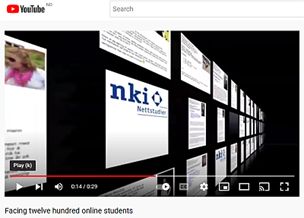 I was fascinated by the information the online students provided in their online profile. How much we could learn about our students’ ambitions, needs, challenges and successes. Information that made me proud of working with online education.
I was fascinated by the information the online students provided in their online profile. How much we could learn about our students’ ambitions, needs, challenges and successes. Information that made me proud of working with online education.
So, my son helped me make a YouTube video to promote the online profiles and wrote an article in Norwegian with Christine Rabe Moe. Wenche Halvorsen also made some comments. An article that discussed the preliminary experiences with NKI’s global personal presentations that where accessible to everyone on the Internet. The article was based on available system statistics, a systematic review of 100 arbitrary global presentations, as well as the authors’ reflections based on observations of many internal presentations and over one thousand global student presentations.
We concluded that the global presentations showed that many students appreciated NKIs flexibility and opportunity to find learning partners. In addition, many presentations provided information about learning difficulties, disabilities or illnesses. Of the 100 selected presentations, 10% tell that they can be online students despite their challenges. Other groups that stand out in the presentations are the many mothers with small children, students living abroad and immigrant women.
Resting in e-learning peace?
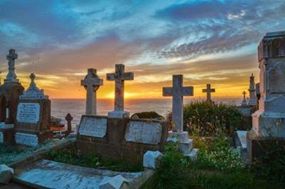 My article Resting in e-learning peace was published in June. Probably not popular among people involved with ten e-learning initiatives in Norway, UK, USA and Hungary. Ten initiatives that spent about €150M before they were shut down after an average of four years in operation.
My article Resting in e-learning peace was published in June. Probably not popular among people involved with ten e-learning initiatives in Norway, UK, USA and Hungary. Ten initiatives that spent about €150M before they were shut down after an average of four years in operation.
But there is much to learn from failures and terminated initiatives. So, the article presented the ten discontinued initiatives shown in the table. Comprising four consortia, two institutional initiatives and four governmental and political initiatives.
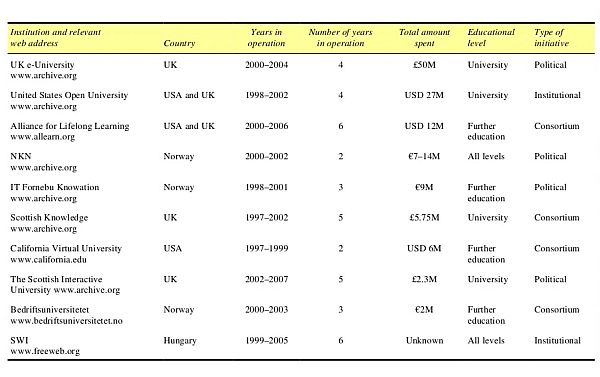
The article included a discussion on why they failed and concluded with the following seven recommendations that are drawn from the analyses of the ten initiatives:
- Be sceptical about top-down political and boardroom initiatives.
- Be sceptical about a consortium of institutions that compete with each other and the consortium.
- ‘Hard-nosed’ market research is essential for the success of any e-learning initiative.
- E-learning initiatives should plan carefully for and carefully control their revenue and expenses.
- The choice of courses and their accreditation are crucial.
- E-learning initiatives should precisely define the relationships of their initiative to existing providers and the institutional model they will adopt.
- E-learning initiatives should plan carefully to manage both their educational and business activities.
EDEN presidents and secretaries in Gdansk
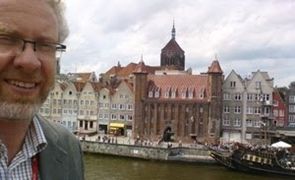 Gdansk in June. Poland’s main seaport at the Baltic coast. The city of the Lenin shipyards, the birthplace of the Solidarity movement. Fronted by Lech Wałęsa. The first independent labour union in the Soviet bloc. Playing a major role in bringing an end to Communism in Poland.
Gdansk in June. Poland’s main seaport at the Baltic coast. The city of the Lenin shipyards, the birthplace of the Solidarity movement. Fronted by Lech Wałęsa. The first independent labour union in the Soviet bloc. Playing a major role in bringing an end to Communism in Poland.
EDEN’s annual conference gathered 325 participants from 44 countries in the Gdansk Music and Congress centre on June 10-13. The conference theme was Innovation in Learning Communities. What did you invent for tomorrow?
Web 2.0 had become a well-known term and was frequent in the book of abstract. And my keynote presentation was titled Social Innovations in Online Learning: Sharing individual progress plans, learning partners and global student profiles with NKI Distance Education.
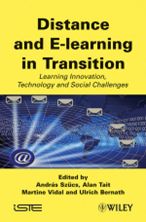 A comprehensive, new EDEN book was presented at the conference. Its title was Distance and E-learning in Transition: Learning Innovation, Technology and Social Challenges. The editors were András Szűcs, Alan Tait, Martine Vidal and Ulrich Bernath. My contribution was titled Tools and Instruments Supporting Cooperative Freedom in Virtual Learning Environments.
A comprehensive, new EDEN book was presented at the conference. Its title was Distance and E-learning in Transition: Learning Innovation, Technology and Social Challenges. The editors were András Szűcs, Alan Tait, Martine Vidal and Ulrich Bernath. My contribution was titled Tools and Instruments Supporting Cooperative Freedom in Virtual Learning Environments.
Glad to meet three people who have influenced my work: Alan Bruce, Otto Peters and Gilly Salmon. Really surprised by being asked and then elected to Vice-President of EDEN during the Annual General Meeting on June 10. Turned out to be a great honour and pleasure to work more closely with EDEN President Alan Tait and Secretary General András Szűcs.
EDEN Secretary General András Szűcs
EDEN executives, worked with András Szűcs. The kind Secretary. The tough General who served for 25 years (1997-2022). The one and only Secretary General as long as the UK registered association had its secretariat in Hungary. Until the Brexit-initiated changes. As EDEN Digital Learning Europe, with a new secretariat in Tallin, was created to continue the operation once the UK left the EU.
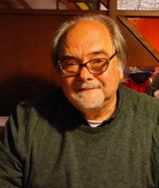 Dr Szűcs, the experienced manager who continuously developed EDEN along with nine of the ten presidents. From 1997, when EDEN’s second President Tamas Lajos moved the secretariat from Milton Keynes to the Budapest University of Technology and Economics.
Dr Szűcs, the experienced manager who continuously developed EDEN along with nine of the ten presidents. From 1997, when EDEN’s second President Tamas Lajos moved the secretariat from Milton Keynes to the Budapest University of Technology and Economics.
András, the pragmatic strategist and prudent manager who consolidated the organization around a sound and sustainable business model. Who built a reliable organization and a recognizable brand.
The kind man raised in a conservative intellectual family that actively followed Roman catholic religion. In a Hungarian society during the Soviet era. The humble listener with telling eyes that forebode his strong, and sometimes controversial, opinions. A diplomat, but not always diplomatic. The great gourmet. A friend of dogs and horses. A cultivated man, who likes classical music as much as hunting and horse-riding.
A respected colleague with high skills in EU policies and projects. Quite possibly the man who has contributed most to the progress and development of distance education and e-learning in Europe.
Online in Cascais
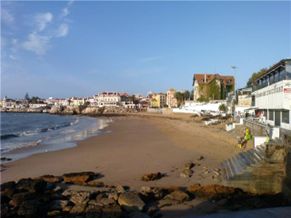 Thanks to António Teixeira, I was appointment for one year as professor associado at Universidade Aberta. To develop and teach the online course Processos Pedagógicos em Elearning as a part of the master program Mestrado em Pedagogia do Elearning.
Thanks to António Teixeira, I was appointment for one year as professor associado at Universidade Aberta. To develop and teach the online course Processos Pedagógicos em Elearning as a part of the master program Mestrado em Pedagogia do Elearning.
We packed our Opel Zafira and drove 3500 km from Oslo to Lisboa. Through Sweden, Germany, Belgium, France and Spain. Realized that the inventor of GPS deserved the Nobel Peace Prize. Since we had no front seat skirmishes about the directions through Europe.
Listened to CDs with Alexander Rybak, the Norwegian artist who won the 2009 Eurovision Song Contest in April with Fairytale. To Michael Jackson, the King of Pop, who was pronounced dead in June. To Leonard Cohen’s So Long, Marianne. Knowing it was about his Norwegian girlfriend Marianne Ihlen.
Stopped to see the fascinating Guggenheim Museum in Bilbao. Admired the artwork along with two elderly men with hats. Regretted that I did not have the guts to approach Leonard Cohen.
So, on September 30, I wrote the following post on Facebook: “I’m now online from my apartment in Cascais, Portugal. The temperature is agreeable (28 centigrades), especially when I hear that it snows in Norway, the wine is affordable, and my balcony view to the beach is not bad”.
During the sabbatical, we had pleasant visits from dozens of friends and family in Norway. Maybe due to the Norwegian climate. December had a record daily snowfall of 89 centimetres in Hundseid and record cold temperature of minus 45.6 centigrades in Folldal.
We chose Cascais to reintroduce our two Brazilian born kids to the Portuguese language. Engaged Louisa as their private tutor. Who taught them a lot about daily life in Portugal. A friend they still communicate with – in English. Talking about good memories from the Arco Vocational School, the handsome surf instructors, the sailing courses, the tragic fado music and the “delicious” caracoise snack.
We rented a posh eight floor apartment at Avenida 25 de Abril. Close to Boca do Inferno and the Paula Rego Museum. Coming from a Norwegian social democratic environment, it was strange to have access to a private swimming pool. To have neighbours with private chauffeurs and maids that carried their suitcases.
At UAb, I was taken well care of by Lina Morgado and José Mota. Got to know many new colleagues and students. As there was a financial crisis in Portugal and the Lisbon Treaty entered into force. Appreciated to learn more about the university, its pedagogical model and the Moodle platform.
It took several weeks to get a Portuguese bank account. The local bank required formal documentation that I lived in Portugal, had a Portuguese employer and could verify my mother’s maiden name. A bureaucratic system relying of physical attendance. Several years after I opened an online account in a Norwegian bank with no physical offices.
On the contrary, international telecommunication technology had improved immensely since our US years in the early 90s. It took just minutes to get four mobile phone accounts in a local shop. And we could operate our local Norwegian home number via ip-telephony on the internet. It even allowed us to call oldest son Stian’s mobile phone for free during his exchange semester at Queen’s School of Business in Canada.
Cable TV was omnipresent. So, the analogue TV network in Norway was about to be switched off after 50 years of operation. Norwegian TV was accessible in Portugal via internet, but frustrating to watch since the bandwidth in our apartment building seemed to decline after office hours. So, we rented VHS-videos at a local shop. And watched the Vancouver Winter Olympics on Portuguese TV. So strange to hear winter sport commentaries in Portuguese.
A special thank you to our neighbourhood friends Arnt and Helene who presented us to so many of their Norwegian and local acquaintances in the area. To Odd and Maria who introduced us to Portuguese language, food, vine, culture, traditions and nearby towns. The charming fishing town Ericeira. Óbidos with its medieval architecture and fortified walls. The Gothic cathedral and Roman temple in Evora. Fátima with the impressive Catholic pilgrimage site Sanctuary of Fátima. And all the tourist towns along the Algarve coast.
EDEN Open Classroom on Twitter in Porto
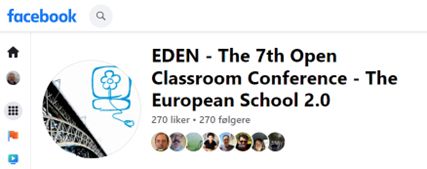
Drove with António Teixeira to Porto. Chair of the local organizing committee. To attend the seventh EDEN Open Classroom Conference October 15-17. Organized with Universidade Aberta and the University of Porto at the Alfândega do Porto convention center. Under the slogan Incubating Creativity and the Capacity for Innovation: Open Content, Social Networking Tools and Creative Learning for All.
The first EDEN conference with a dedicated Facebook page and a coordinated Twitter coverage using the #edenporto09 tag. A top trending Twitter hashtag in Portugal, due to the hard work of Paulo Simões who posted this on the conference Facebook page: “In the European year of Creativity and Innovation, conference delegates attending Porto 2009 are encouraged to bring their laptops, PDAs, notebooks or Twitter enabled phones. Free access Wi-Fi will be provided for everyone to be an active contributor to the event. Follow Porto Open Classroom Conference debates on Twitter @PortoEden09 at #EdenPorto09 or on Facebook and make your contribution”.
Remember a pleasant university dinner with local co-chair Alfred Soeiro. And José Mota’s conference pictures in Flickr.
The Portuguese Ministry of Education accredited the Conference as an official 13-hour training course for teachers’ professional development. Anestis Papadopoulos and Alan Bruce received the best paper award for Preparing Pupils for a Changing Planet: Learner Empowerment and Cultural Competence through Innovative Best Practice.
The conference also introduced a new EDEN award for Leading Innovative Practice. The winning paper was The Use of Internet Social Networks in a Pedagogical Context: A Case Study in a Basic Portuguese School by Rita Oliveira António Teixeira.
Globalskolen
Since my youngest son was an online student at Globalskolen, I enjoyed Bjørn Teistung’s interesting EDEN Porto lecture about this online primary school for Norwegian children abroad.
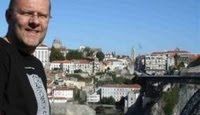 Globalskolen offered training in the three special Norwegian subjects (Norwegian, social studies and RLE) which were not available at the local and international schools the children attend. The Globalskolenhad 1,000 students in 90 countries from first to tenth grade.
Globalskolen offered training in the three special Norwegian subjects (Norwegian, social studies and RLE) which were not available at the local and international schools the children attend. The Globalskolenhad 1,000 students in 90 countries from first to tenth grade.
I had followed the development of the Globalskolen since it started in 1998 and wrote the article A Global Primary School in 2003. Nevertheless, the lecture in Porto was particularly interesting since my kids went to school in Lisbon and were students at NKI Nettstudier and Globalskolen.
Since Globalskolen had students aged six and up, the school depended on parents helping the kids. Therefore, parents got a separate account at Globalskolen to have full insight into their children’s schoolwork. This gave me better insight into my son’s schoolwork than I had when he went to a regular school.
After a couple of months’ experience with the Globalskolen, I was particularly impressed by the multimedia content and the good communication between my son and his teacher Arne Heimestøl. The tenth-grade teacher was very accessible on Skype and he could easily demonstrate the websites if there was something my son needed help with.
My conclusion was that the Globalskolen was a good opportunity for Norwegian children abroad. I also expected that they had older siblings or parents who might enjoy taking online courses from Norwegian institutions.
2009 events
My translated selections of events from https://no.wikipedia.org/wiki/2009
- January 20 – Barack Obama became president of the United States.
- June 25 – Michael Jackson was pronounced dead.
- September 11 – The Ibsen Prize was awarded to Christopher Nielsen for the play Worthless Men.
- September 29– Thorbjørn Jagland was appointed Secretary General of the Council of Europe.
- October 9– US President Barack Obama was awarded the Nobel Peace Prize.
- November 5– Finland and Sweden approved the construction of the Nord Stream pipeline in the Baltic Sea.
- November 19– Karl Ove Knausgård was awarded the Norwegian Brage prize for the first book in his series My Struggle (Min kamp).
- December 1 – The Lisbon Treaty entered into force.
- December 1 – The analogue TV network in Norway was switched off after 50 years of operation.
- December 23– Norwegian record snowfall of 89 centimetres in Hundseid and record cold temperature −45.6 °C in Folldal.
My 2009 Publications
Paulsen, M. F. 2009. Resting in e-learning peace. IJNVO Vol 6, No 5.
Dalsgaard, C. and M. F. Paulsen 2009, Transparency in Cooperative Online Education, IRRODL Vol 10, No 3.
Paulsen, M. F. 2009. Successful E-learning in Small and Medium-sized Enterprises. EURODL, 2009/I
Paulsen, M. F. 2009. Tools and Instruments Supporting Cooperative Freedom in Virtual Learning Environments. In Bernath, U. Bernath, U., Szücs, A., Tait, A., and Vidal, M. (Eds.). Distance and E-learning in Transition – Learning Innovation, Technology and Social Challenges. Wiley.
Paulsen, M. F. 2009. An Analysis of European Megaproviders of E-Learning: Recommendations for Robustness and Sustainability. In Stannsfield, M. and Connolly, T. (Eds.) Institutional Transformation through Best Practices in Virtual Campus Development: Advancing E-learning Policies. Page 127-146. Hershey, Pennsylvania: Idea Group Inc (IGI).
Moe, C. R., W. Halvorsen og M. F. Paulsen 2009. Tusen NKI-studenter viser ansikt. I Haugen H. Læringsmiljø på nett – erfaringer fra forsøk og prosjekt. Trondheim: Tapir Akademisk Forlag.
Learning Review España No 5, 2009. La educación online exitosa debe ser robusta y sustentable. The interview was also translated to English.
My 2009 presentations
In 2009, I gave 3 external presentations in Norway, UK and Poland.
UK
Visualizing Student Profiles through NKI’s Online Catalogue and Student Network. A keynote presentation at The Cambridge International Conference on Open and Distance Learning 2009 22.09.09.
Poland
Social Innovations in Online Learning: Sharing individual progress plans, learning partners and global student profiles with NKI Distance Education. A keynote presentation at the EDEN conference in Gdansk 12.06.2009.
Norway
Let your learners learn together! Risks and opportunities of a social network. A presentation at the EADL conference in Oslo 14.05.2009
The 2010s: Online Education Becomes Mainstream
The turbulent 2010 anecdotes were chronicled during 2023

2010 - Chairing EDEN
A Scandinavian program in multimedia journalism
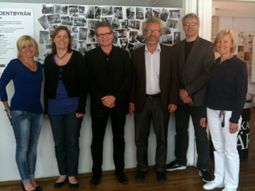 The project group first meeting was in Oslo on 28 January 2010. The second on 26 and 27 May in Stockholm. With financial support from Norgesuniversitetet to establish a Scandinavian program in multimedia journalism.
The project group first meeting was in Oslo on 28 January 2010. The second on 26 and 27 May in Stockholm. With financial support from Norgesuniversitetet to establish a Scandinavian program in multimedia journalism.
Photo of the project team: Åsa Marklund, Annegrete Skovbjerg, Steen K. Rasmussen, Morten Flate Paulsen, Arne Jansen and Kristiina Müllersdorf.
Three online courses giving 30 ECTS:
- A Swedish course on audio journalism with podcasting developed by Berghs School of Communication
- A Danish course on video journalism on the web developed by UPDATE – the Danish School of Media and Journalism
- A Norwegian course on text journalism in a virtual newsroom developed by NITH – the Norwegian School of Information Technology
The courses were administered by NKI and the students published their articles, videos and audio files in www.webjournalisten.com. Arne Jansen also initiated a Facebook page titled Multimediejournalistikk.
The courses had individual start up and progression. We also introduced individual exam dates. Told students that they could choose a date they wanted to do their exam. And that they should submit three news stories that day. One text, one video and one audio. The topic of the stories would be relived in the morning of the exam day.
For some students it was a challenge and a barrier to read course content in another language. Something we tried to alleviate by installing Google translate on the web server.
I also did an informal survey about how Scandinavians understand each other. Concluded that Norwegians, Swedes and Danes would rather have online courses in English than in another Scandinavian language. There were still many who could imagine courses in a Scandinavian language.
Anyway, it turned out that most of the students were Norwegian.
Transparent teaching and learning on an open MPeL stage
In May 2010, I wrote the blogpost E-viva em Portugal about my Portuguese teaching experiences at UAb’s master program Mestrado em Pedagogia do Elearning. Embedding and linking to a variety of examples of the students’ coursework.
The following is an abridged version which written as I prepare for a virtual Keynote for 15th anniversary of MPeL’s pedagogical model for online education. A shortened version which excludes defunct links and embeds. Making me realize that digital information could be volatile. And that it was wise to inscribe the ten commandments in stone tablets.
The course framework
I was responsible for both development and implementation of a 16-week online course with about 20 students in both fall and spring semester. The course had 8 ECTS credits and students were expected to study about 8 hours a week. Before the course started, I had to create a learning contract describing learning goals, content, implementation and evaluation. The teaching should be conducted in Moodle, but with the active use of Web 2.0 services. I was also told that all students had their own blogs on open sites such as www.blogspot.com and www.wordpress.com.
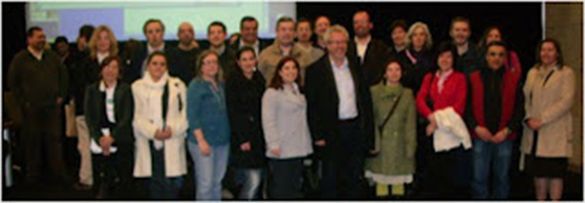
The picture was taken with the students who were present at my presentation Cooperative Freedom and Transparency in Online Education at the Futuralia Convention Center in Lisboa.
It was mostly up to me to choose the course content, but we agreed that I should make four study units around my presentations and publications on the three themes: The Theory of Cooperative Freedom, Online Teaching Techniques and Transparency in Online Education. Important parts of the content were discussed in my book Online Education and Learning Management Systems and article Transparency in Cooperative Online Education. I also wanted to demonstrate what I mean by cooperative freedom and transparency with these four week-long tasks in the three first course units:
Task 1 – Find, study and share materials related to the theme in a blog-based annotated bibliography
Task 2 – produce a learning object related to the theme and publish it somewhere
Task 3 – write reviews in the forum on one annotated bibliography and one learning object published by colleagues
Task 4 – take part in a structured discussion on issues related to the theme
It was probably an unpleasant surprise for some of the students that the course was taught in English. They were used to read articles in English, but writing English was a serious additional challenge for several of them. Therefore, I recommended them to cooperate on the written assignments and to develop learning objects in web2.0 services such as www.youtube.com, www.slideshare.com and www.toonlet.com. Services that focus less on the written language. I further invited the students to develop bibliographies which included references to multimedia elements as shown in Juliana’s bibliography on Online Teaching Techniques.
Cooperative freedom in a very transparent learning environment
The students published their bibliographies, their learning objects and various reflections and comments about the course activities in their blogs so that their work was available for everyone on the internet. This extreme transparency resulted in feedback not only from classmates but also from other colleagues and experts. In this way, the students had much freedom to learn in a network – without being dependent on each other. This very open and transparent learning environment was probably as daunting and stimulating for the students as it was for me as the tutor. Since much of the students’ coursework would be available online for many years.
In the spring course, Maria João established an index of the course work made by both classes in a wiki at http://ppel4.pbworks.com. In the fall course, Paulo and José made a Diigo group http://groups.diigo.com/group/uab-mpel3 including bookmarks for nearly 200 references the students made during the course. Sandra and Mónica initiated the open Facebook group Online Teaching in which the students’ course work and reflections were published. The group soon attracted 500 members. Many of the students also used Twitter and Facebook actively in their learning process. I decided to accept invitations to become Facebook friends with the students and I found it fascinating to follow the Twitter-messages from Paulo.
It was interesting to see that the students were able to involve people from outside the class. Paulo and José, for example, made this interactive VoiceTread presentation about cooperative learning which includes both text and audio comments from several participants outside our class. In our structured discussions we arranged role plays about online workload, debates on transparency and one-question-interviews with online education experts like Terry Anderson on Cooperative Freedom and Stephen Downs on Collaboration vs. Cooperation.
In the last unit, the students were asked to write final reports in which they should compile and improve their work, develop reflection papers an evaluate their work. Even though these are quite personal documents, several students chose to publish them on the internet. Sónia, for example, made her final report in Issuu and Eduarda published her Compilation of personal work in Issuu.
Several of the web2.0 services were new to me and I was impressed by the student achievements. So, impressed that I later included this slide in several PowerPoint presentations.
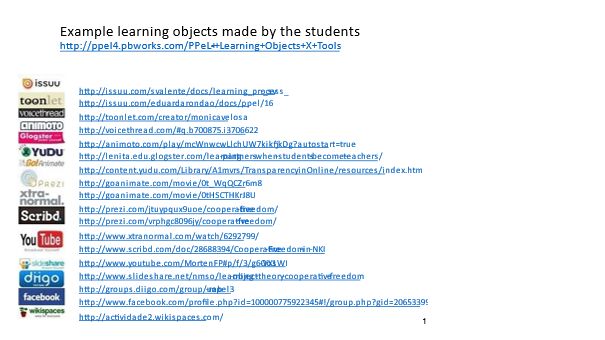
Conclusion
It was interesting, but work intensive, to follow the students’ work because they were published in several different web2.0 services at various blogs and webpages. It was also thought-provoking that everyone can observe what the students produce in my course. Neither teachers nor students are always doing good work, and in such transparent environments low quality work is easy to spot. However, maybe we therefore struggle a little harder to do our best?
Web- and vote casting at the EDEN Annual Conference in Valencia
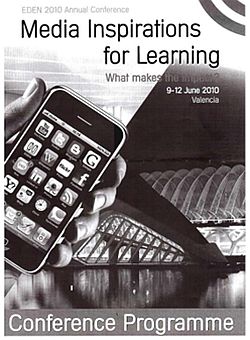 The EDEN 2010 Annual Conference made a great impact. At least on me. Taking place at the Universidad Politecnica de Valencia in Spain on June 9-12. The conference theme was: Media Inspirations for Learning What makes the impact?
The EDEN 2010 Annual Conference made a great impact. At least on me. Taking place at the Universidad Politecnica de Valencia in Spain on June 9-12. The conference theme was: Media Inspirations for Learning What makes the impact?
Documented in the conference blog. With numerous observations and photos by Steve Wheeler. Witty reflections about Mr. Bean and the new EDEN president. Nice photos of the new Senior Fellow Michael G. Moore. And new Fellows Antonio Teixeira, Airina Volungeviciene, Deborah Arnold and my Norwegian colleague Berit Johnsen.
Rolf Reinhardt pointed out two innovations: The first name on the conference badge was written bigger than the second one, because the conference delegates simply call each other only with the first name. Secondly, the live stream of the plenary sessions was very successful! Although I was in the plenary just 5 meter in front of the speaker, I logged in the live stream and saw the enormous amount of followers. In particular in Twitter the live stream was posted several times. Great!
Eva Suba started the conference blog with this post:
The university campus on Avenida de los Naranjos is beautifully decorated with lilac akazia trees in blossom. The pleasant breeze from the Mediterranean see is refreshing the Valencian summer. The modern new „Nexus” building of the Universidad Politechnica de Valencia is ready to welcome the delegates of the EDEN 2010 Annual Conference starting tomorrow.
Nearly 400 expert colleagues of distance and e-learning registered for the event from 49 countries to follow the most interesting programme of the event. This year an exceptional attention of colleagues from outside Europe has accompanied the conference, representing 17% of the delegates.
Conference delegates members partners and friends of EDEN are invited to follow the 2010 Conference either from the session rooms in Valencia or by watching the online webcast of the plenary sessions.
I was hesitant. Uncomfortable. Consulted EDEN friends and NKI colleagues. Had a long conversation with Ingeborg Bø. Uncertain if I could handle a resolute Hungarian secretariat. Chair tough executive meetings in English. Preside over annual general meetings. Dress and behave properly at formal dinners. Smile to photographers. Shake hands with dignitaries and socialize with conference delegates. Give improvised speeches for an international audience.
People I talked with either encouraged me or pushed me. Said: Go for it. And I realized that it was an excellent opportunity to continue my efforts to include more women in bold EDEN positions. And to introduce and promote online service to strengthen the EDEN community.
So, I accepted to be nominated by the Executive Committee. Then endorsed to take over as EDEN president after Alan Tait. At EDEN’s 19th annual general meeting on June 10th in Valencia.
Gradually realized that I enjoyed the position and the interaction with so many kind and gifted EDEN members. Could handle formal speeches and ceremonies with excellent help and preparation by the EDEN secretariat. Office Manager Anna Wagner always served me with detailed agendas, speaking points and all necessary assistance. She deserves a special thank you for all the support and hard work for EDEN executives and members. And the certificate of excellence she received for her “long term exceptional commitment, the smart and generous contributions to the success of the association over the years”.
During my presidency, I reiterated that my favourite words were Flexibility, Cooperation, Transparency and Celebration. A statement that made it easier to prioritize and make large and small decisions. Words that influenced my inaugural speech that also was posted in the EDEN President’s blog:
Dear EDEN colleagues and friends, I’m pleased and honoured to take over as the 7th President of EDEN after Erling Ljosa (1992-1995), Tamás Lajos (1995-1997), Valerio Grementieri (1997-2000), Erwin Wagner (2000-2003), Ingeborg Boe (2003-2007) and Alan Tait (2007-2010). The length of the list reminds me that e-learning no longer is a new development; EDEN will celebrate its 20th anniversary next year and it is strange to acknowledge that I taught my first online course 23 years ago.
My first recollection of EDEN was from the very early 1990s when I discussed with Erling Ljosa how a new European organization could establish an electronic newsletter for distance education. Now, nearly 20 years later, I’m proud of what we have achieved and what we are doing in the field of distance education and e-learning. The members of EDEN have made it possible for millions of students to get the education they want, and we should all be proud of this important contribution to the society.
As I said at the Annual General Meeting, the three favourite words in my e-learning vocabulary are: Flexibility, Cooperation and Transparency. I hope and think these words will be used frequently during my EDEN presidency. One issue which is related to transparency is that I want the members to have easy access to more information about the representatives in EDEN committees and groups. Therefore, I’m especially enthusiastic about the new NAP-members area which could become a very useful service for EDEN members. It already has more than 1200 members and a potential to grow considerably. For those of us who struggle to remember names or faces, it is useful to know that the NAP area already includes a lot of names, pictures, EDEN roles and further information about friends and colleagues. Now, I hope to see new “NAP-friends” and additional information every time I log on.
I’m also excited about the impressive list of EDEN Fellows, and I contemplate how we can initiate an interesting and useful forum for the EDEN Fellows. There are now 13 EDEN-Senior fellows and 30 EDEN-fellows. Some of them have already started to make the information in their NAP-presentations public and I’m sure public NAP-presentations of these distinguished ambassadors will enhance the online visibility of EDEN. Their public NAP-presentations are available via this list.
I’m confident that I have a strong team of people who will help me develop EDEN further. I’m looking forward to continuing a good relationship with Secretary General, Dr András Szûcs, Office Manager, Anna Wagner and their excellent Secretariat in Budapest.
I’m also happy to have two very good and hardworking colleagues as Vice-Presidents. Antonio Teixeira (Portugal) and Alan Bruce (Ireland). The EDEN Executive Committee meets about 4 times a year and contributes a lot to the success of EDEN. Now, after the Annual General meeting, we have increased the number of EC-members to eleven and I’m pleased to welcome our new colleagues Gilly Salmon (UK), Costas Tsolakidis (Greece), Deborah Arnold (France), Airina Volungeviciene (Lithuania) and Ene Koitla (Estonia) as new members of the EC. The figure shows all the EC members from a screenshot of one of my NAP-pages. You can also see the presentations of the EC-members.
Together with 190 institutional members and a lot of competent and devoted members, I’m convinced that we together can continue the successes of EDEN.
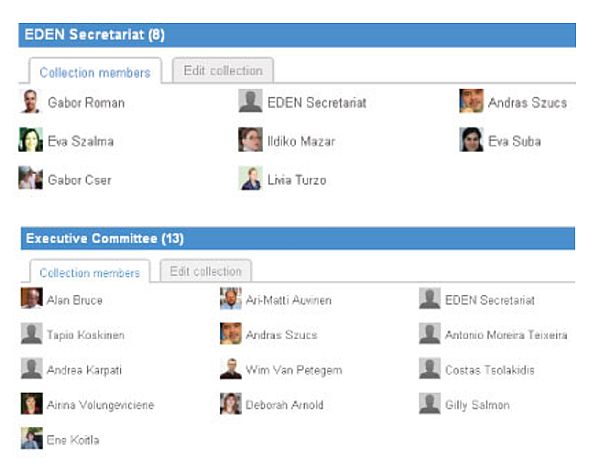
Driving home through Europe
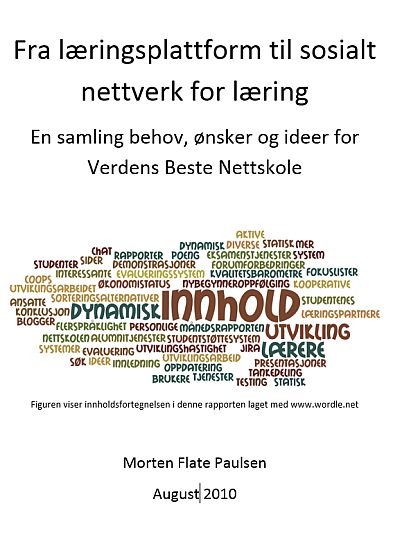 Woke up in Switzerland on July 30. Heading towards Germany, Copenhagen and Oslo. Had driven through Portugal, Valencia, Cannes, Nice and Monte Carlo. Passed Barcelona two weeks after 1 million people demonstrate for greater Catalan autonomy.
Woke up in Switzerland on July 30. Heading towards Germany, Copenhagen and Oslo. Had driven through Portugal, Valencia, Cannes, Nice and Monte Carlo. Passed Barcelona two weeks after 1 million people demonstrate for greater Catalan autonomy.
Recalled that I replied “Who? Never heard of him!” When Lars Eric Onarheim called me in March. As a member of his NKI Board. To inform me that the owners wanted Kjetil Ørbeck as CEO of NKI. Admitted that he had not worked with education but prized his experience from a TV project raising funds for children affected by HIV and AIDS.
Wondered if a CEO of a private school could be successful without experience in the educational field. Hoped that he would support the development proposals I described in the 60-page document: From learning platform to social network for learning. A comprehensive document with many potential improvements in NKI’s online education services. Including a quality barometer and a student support system integrated in our SESAM LMS.
Celebrating 12500 enrolments at the SEM seminar
As soon as I returned from Portugal to my NKI position in August, I met the new CEO Kjetil Ørbeck. Found his energy and boyish charm easy to like. Confident he could help accelerate our online education developments. Follow my advice and initiate necessary change.
On September 4, he summoned us to an NKI management seminar at the idyllic Sem Guesthouse in the outskirt of Oslo. Morten B, Svein, Wenche, Anne Marie, Truls, Guro and me. Torger Granli from The Performance Group (TPG) was engaged as facilitator of the meeting. A consulting company that happened to be Kjetil Ørbeck’s company.
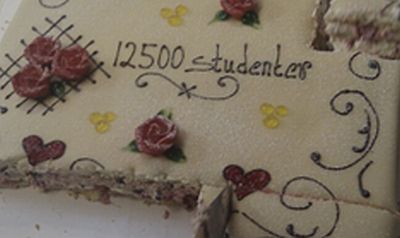
At the beginning of the meeting, Torger Granli asked for a private meeting with me. Turned out to be a very strange meeting. Said he had heard that I had strong opinions and was difficult to work with. That it was important that I backed and supported the new CEO and his team.
The only concrete outcome of the meeting that I can remember? That we decided to serve cake on September 7. To celebrate that NKI had accumulated 12.500 enrolments in online courses. An impressive number compared with the figures revealed in Aftenposten 20.09.11 That the total number of students registered under distance education at Norway’s public universities and colleges had steadily increased from 4551 in 2006 to 5836 in 2009.
Nope envelope
People and systems are hard to change. And too many NKI people and systems remained in the correspondence age. To address this challenge, I followed the paper trail and interviewed the people who did the paperwork.
A memory that stuck, was my daughter’s comment after she enrolled in one of NKI’s online courses: “Dad, I don’t understand what I’m going to do with all this paper”.
Fortunately, I was able to make some headway in September. With a presentation that showed the incredible vast of resources NKI still spent on mailing expensive, unnecessary and confusing correspondence material to its online students.
The screenshot shows a translation of my original PowerPoint slides in Norwegian.
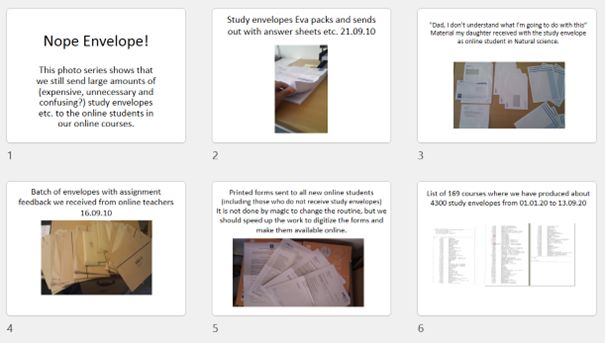
Explosion of video lectures
Bandwidth, storage capacity and video technology gradually improved. So, video lectures and education videos popped up all over the Internet. Noticed that an increasing number of presentations by EDEN colleagues were available as online videos. Pondered if university resources were well spent on mass production of web lectures. If miserable lectures were worthy to be record for the future.
The interview I did with Portuguese television was available online. Several amateur video scenes from my presentation at Futuralia in Lisbon were posted online by students in the audience.
In March, my presentation Transparens i nettbasert utdanning at Bodø University college was recorded at a Mediasite server. At the annual EDEN conference in June, the Plenary Sessions were webcasted and recorded by Elluminate.
The keynote presentations the November conference of the Norwegian Association for Distance Education were also videotaped. Inclluding Grainne Conole’s presentation Towards new forms of open, social and participatory learning and Jane Hart’s talk on The Social Learning Revolution. Along with my Norwegian presentation Læring for åpen scene.
In September, I attended the thought-provoking conference Læring rett I lomma at the University of Oslo. Featuring several international presentations on video lectures. Videos of the presentations were of course available online.
Marianne Talbot, from the University of Oxford, presented her reflections on her very successful philosophy course which ranked number one of the top downloads from ITunes U. Gilly Salmon, who was on the EDEN EC, gave an interesting presentation titled The renaissance for voice: Transforming learning. Maria Hancock and Ben Hubbard from UC Berkeley gave the presentation Fifteen years’ experience with podcast.
Conference chair Bent Kure challenged me to sum up the conference. So, in my concluding video presentation, I indicated that future students would make much more innovative web2.0 presentations than most video lectures we saw in 2010. And that a lot of students already had their own YouTube channels.
Educational institutions experimented with a range of additional products and services such as Itunes U, YouTube, Matterhorn and Camtasia to make lectures available on the web. This was good for educational transparency and flexibility. But are everyday lectures worthwhile distributing via the web – or is it wiser to spend some of the resources on developing better or alternative instructional content?
Maybe 2010 initiated an industrial revolution of video lectures on the internet.
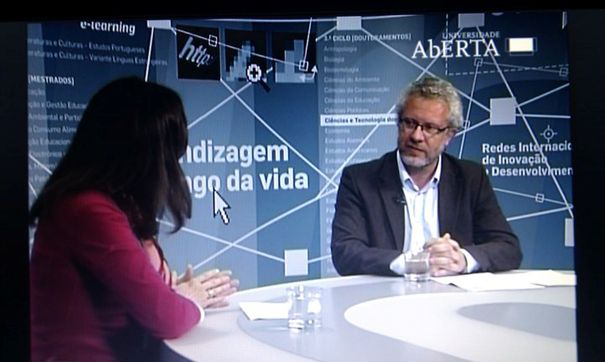
On lines in Mexico
Flew to Guadalajara in October. A metropolitan district in western Mexico and the capital of the state of Jalisco. Spent a chaotic day at the San Juan de Dios Market—maybe the largest indoor market in Latin America. Recovered with two Mexican bottles of beer in the hot tub located in the middle of the hotel suite living room.
Gave the opening Keynote and a workshop at the Aprenred V conference on Web Citizenship. Held at the University of Guadalajara from October 5-8, 2010. The title of my presentation and workshop was Cooperative freedom, transparency and student profiles in online education.
Remember Efrén de la mora’s hospital workshop facilitation. The private dinner with the local organizers. The two international speakers Yolanda Gayol and Grainne Conole. Found it interesting to hear about Youlanda’s experiences with training the trainers to use Moodle. And should have paid more attention to Grainne’s research on e-learning and organizational change. Learned that 2010 was the year that my Penn State mentor Michael G. Moore was awarded both an EDEN Senior Fellowship and an Honorary Doctorate by the University of Guadalajara.
Flew over Sierra Madre to experience Puerto Vallarta and the Mexican Pacific. Enjoyed the magnificent ocean sunset, the vibrant nightlife and open-air performances along the Malecon boardwalk. Dared to go on a full day excursion starting with jeeps and mules taking us up the hills and towards the mountains. Back down with several high, long and very scary ziplines. Rappelling down waterfalls and wading down rivers. A perfect day to be offline on a zipline.
2010 The EDEN research workshop in Budapest
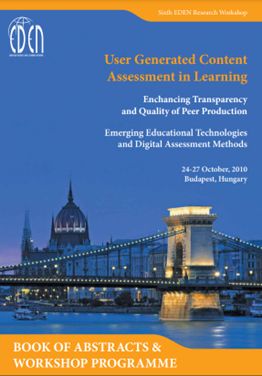 Planned the research workshop in a Budapest executive meeting. Outside the hotel, people were cheering, dancing and drinking in the square. Celebrating that the right-wing party Fidesz, led by Viktor Orbán, won an absolute majority in the first-round parliamentary elections. Lucky to reach home on April 14th, just before the ash clouds from the eruptions at Eyjafjallajökull. The Icelandic volcano which caused millions of air passengers to be stranded across the world.
Planned the research workshop in a Budapest executive meeting. Outside the hotel, people were cheering, dancing and drinking in the square. Celebrating that the right-wing party Fidesz, led by Viktor Orbán, won an absolute majority in the first-round parliamentary elections. Lucky to reach home on April 14th, just before the ash clouds from the eruptions at Eyjafjallajökull. The Icelandic volcano which caused millions of air passengers to be stranded across the world.
Returned to Budapest in the fall for the 6th EDEN Research Workshop on October 24-27. Located at the Budapest University of Technology and Economics. Focusing on User Generated Content Assessment in Learning: Enhancing Transparency and Quality of Peer Production – Emerging Educational Technologies and Digital Assessment Methods.
As president, I had a busy agenda: Meet executives and partners. Present the EDEN Fellow Awards at the Welcome Reception. Chair the first plenary session with Andras Benedek’s Opening Address and keynotes from Gilly Salmon, Olaf Zawacki-Richter and Grainne Conole. Present the Best Research Paper Awards with Gilly Salmon.
I also took part in the plenary panel discussing Quality Issues for Open Educational Resources. With Rory McGreal, Grainne Conole, Demetrios Sampson and Don Olcott. The same Don Olcott who received the EDEN Fellows Award and gave the concluding remarks at the conference.
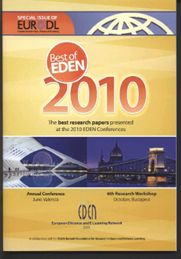
We enjoyed the Hungarian Rhapsody folk dance programme performed by the Hungarian Folk Ensemble at the Hungarian Heritage House. Followed by a Conference Reception with Hungarian wines and special dishes.
After the conference, András Szűcs and Ulrich Bernath edited the first in a series of Best of EDEN publications. A collection of best research papers presented at EDEN conferences.
Connecting with George Siemens in Oslo
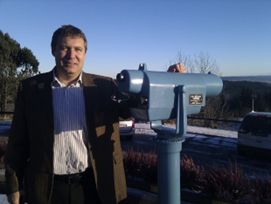 George Siemens was in Oslo in November. I had recently met him at the EDEN 2009 conference in Valencia and read Ebba Kåber’s interview with in Synkron.
George Siemens was in Oslo in November. I had recently met him at the EDEN 2009 conference in Valencia and read Ebba Kåber’s interview with in Synkron.
The Canadian who introduced connectivism in a 2004 blog post. And refined it in his 2005 article Connectivism: A Learning Theory for the Digital Age. Published in the International Journal of Instructional Technology and Distance Learning.
A theory emphasizing that internet and social networks provide new opportunities for learning.
In 2008, George delivered the online course Connectivism and Connective Knowledge with Stephen Downes. The course content explained connectivism and used some of the theory. The course was free to anyone and over 2000 people around the world enrolled. The phrase Massive Open Online Course (MOOC) may have come from this course.
So, it was a pleasure to be his personal Oslo guide on November 11. On a tour to Holmenkollen, we talked about connectivism and my theory of cooperative freedom and transparency in online education. A theory I first introduced in 1992. A theory arguing that cooperative online learning happens in networks. A theory that evolved around all my online education activities since 1986.
My personal impression was that connectivism in many ways resembled my theory of cooperative freedom and transparency in online education.
NADE’s Social learning conferences
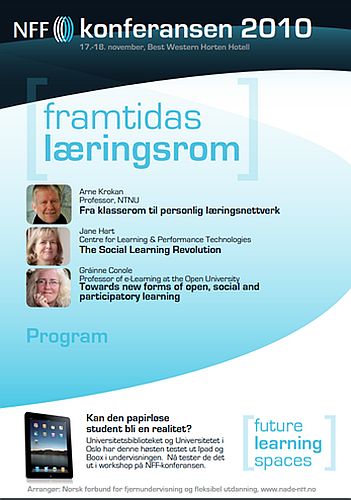 The Norwegian Association for Distance Education (NADE) often had its annual conference in November. Usually in with a social dinner and a very interesting program of national and international presenters. So, the conference was always high on my priority list.
The Norwegian Association for Distance Education (NADE) often had its annual conference in November. Usually in with a social dinner and a very interesting program of national and international presenters. So, the conference was always high on my priority list.
In 2010, the conference was in Horten, November 17-18. The small costal town where I served one year in the navy.
The program was published in Synkron and a recurring theme was open and social learning.
My presentation, “Læring for åpen scene” discussed my experiences from Universidade Aberta. It was filmed by Jørgen Grubbe and is still available on Vimeo.
Arne Krokan and Alastair Creelman gave noteworthy presentations about personal learning networks and open learning resources. Jane Hart and Grainne Conole gave keynote presentations in English titled The Social Learning Revolution and Towards new forms of open, social and participatory learning.
Grainne was so kind that she spent an extra day in Oslo to give a presentation about learning design at our NKI office.
In 2008 NADE introduced awards for the online teacher and student of the year. At the 2010 conference, the awards were given to Mathis Bongo and Marte Baade.
Mathis Bongo at Sámi University College received NADE’s Teacher of the year Award for innovative use of technology in online education for reindeer herders.
Marte Baade was honoured as online student of the year. As a severely visually impaired student, she had problems keeping up at upper secondary school. Therefore, she chose to study online instead. She completed education as a school assistant and educational assistant with good grades.
Some 2010 events
- January 27 – Apple unveiled the iPad.
- March 11 – The two Norwegian publishing houses Aschehoug and Gyldendal decided to discontinue their printed encyclopaedia (Store norske leksikon).
- March 28 – Ford agreed to sell Volvo Cars to the Chinese company Geely.
- April 11 – The right-wing party Fidesz, led by Viktor Orbán, won an absolute majority in the first round of Hungary’s parliamentary elections.
- April 11 – The Euro countries decided to give Greece a loan of 40 billion dollars, at a lower interest rate than the country would get from commercial institutions.
- April 14– Ash from Eyjafjallajökull’s volcanic eruption led to a halt in air traffic in several countries in Northern Europe.
- May 29– The Eurovision Song Contest 2010 took place in Telenor Arena outside Oslo.
- July 10 – 1 million people demonstrated in Barcelona for greater Catalan autonomy. After a court said there was no basis for Catalonia to call itself a nation.
- July 22– Facebook passed 500 million registered members.
- November 24– General strike in Portugal because the government wanted to cut the wages of public servants, freeze pensions and raise taxes.
My 2010 publications and interviews
Morten Flate Paulse and András Szűcs (eds). 2010. European Distance and E-learning Network (EDEN) Conference Proceedings. Sixth EDEN Research Workshop in Budapest, Hungary. Published by the European Distance and E-Learning Network.
Morten f. Paulsen, 2010. E-viva em Portugal. Synkron No. 1, 2010.
Interview with Ruben Eiras and Vanda Viera for the Portuguese Journal Formar. A teoria da apredizagem cooperative na educacao on-line.
Intervju med Torhild Slåtto for Nordisk nettverk for voksnes læring: Globale studentpresentasjoner – unik kilde til kunnskap om nettstudenter
My 2010 presentations
Portugal
Cooperative Freedom and Transparency in Online Education. A presentation at an e-learning conference in Lisbon, during FUTURÁLIA – the biggest Portuguese fair on education and training @ FIL – Feira Internacional de Lisboa – Parque das Nações. 12 of March 2010.
Germany
E-learning in Norway: Some important features, projects and providers. A presentation at the eLearning Baltics (eLBa) 2010. International Scientific eLearning Conference. July 01-02, 2010, Rostock, Germany
Norway
Læring for åpen scene. Foredrag på NFFs konferanse 17.11.2010
2011 - Loosing a platform
The NKIpad and course catalogue app
Steve Jobs introduced the iPad in January 2010, and I soon realized that the new tablets could be an important tool for online educators. I adamantly argued that my colleagues should learn more about the new platform.
In January 2011, NKI arranged an internal seminar focusing on iPads and online education. The attendance was high because many foresaw that the trendy tablets would change the behaviour of online teachers and students. The enthusiasm increased as more educational opportunities were revealed. Peaked when 60 surprised employees received iPads as their new work devices.
Reception of the NKiPads was linked to an obligatory internal online course about NKI’s strategy and quality work. This created a collective enthusiasm and curiosity which led to increased communication between colleagues and departments. But also exposed digital resistance and internal tension. The course forum provided everyone with more insight in work-related opportunities and challenges.
In June, I wrote an internal analysis of all posts in the course forums. All together 175 pages with comments. The kind of qualitative analysis I enjoyed because it gave so much insight. And an excellent opportunity to conclude and make recommendations for improvements.
After six months of extensive use, the iPad had changed the way I worked and connected with colleagues. Realized that tablets with WiFi would accelerate the development of online education. Affordable prices would make them common and strengthen the most competitive advantage of online education – the opportunity to study independent of time and place.
At the cursor moment, I realize that the iPad also increased the digital gap and blurred the boarders between work and family time.
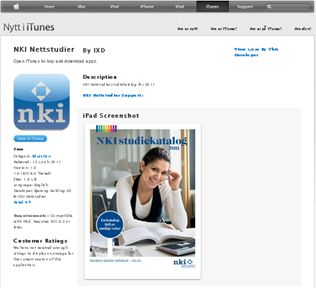 Every year NKI printed thousands of glossy and comprehensive course catalogues. Mailed them to prospective students all around the country. Threw away a lot when next year’s catalogue was printed. Expensive and not friendly to the environment. Especially since the same information was available at NKI’s website.
Every year NKI printed thousands of glossy and comprehensive course catalogues. Mailed them to prospective students all around the country. Threw away a lot when next year’s catalogue was printed. Expensive and not friendly to the environment. Especially since the same information was available at NKI’s website.
App Store was opened on July 10, 2008, with an initial 500 applications available. The number of available apps grew rapidly.
So, in March 2011, NKI’s printed catalogue with 400 online courses was launched as an iPad app. An innovation I expected other course providers would follow. In my view, the design of the NKI App was professional, the navigation elegant and the video with world champion Ole Einar Bjørndalen made it more vivid than the printed catalogue. It was however frustrating to realize that Apple needed 75 days to accept it for distribution via App Store. It turned out that NKI’s webpages were much more dynamic, the app was never updated and the printed course catalogue was history.
Consulting challenges
Kjetil Ørbeck started a lot of initiatives. Some were sensible. Others definitively not. My greatest concern was that all initiatives were initiated at the same time. I had great belief in evolutionary system development. But this was extremely revolutionary system development. Which created a lot of worries and resistance in the organization. An organization which had become the most successful online education institution in Scandinavia.
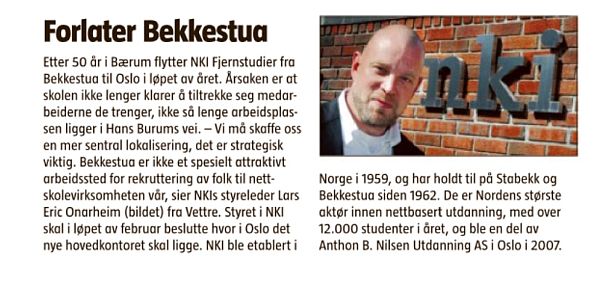
He wanted to move the NKI office to the centre of Oslo. Buy companies. Outsource services. Wind down EU funded project activities. Change accounting system. Shift to another bank. Implement a new student administration system. Develop a new LMS. Get a new management group. Give them fancy titles and increased wages.
He sponsored Biathlon World Champion Ole Einar Bjørndalen. And hole 16 at Kragerø Golf Resort. Near the CEO’s and chairman’s summer houses.
Spent much more money on dining, networking, social activities and travels than previous CEOs. Engaged friends as employees and consultants. TPG did management training. Dynamo helped with marketing. Carat provided market insight. IXD developed a new website. Tangram worked on a new marketing profile which never was implemented.
Spent a lot of money and resources on these consultants. I worked most with Procedo and Alfaventa. Two small companies with only two employees each. Alfaventa analysed sales and marketing. Interviewed many colleagues and reported privately that I often was referred to as a company hero. Which was of little comfort when I saw the extraordinary turnover of colleagues.
Procedo analysed NKI’s ICT systems. Systems that were well integrated to support large scale online education. A daunting challenge that probably was way over their league. As far as I see, their advice made a lot of harm to NKI.
Studiesenteret.no – a Norwegian hub of rural study centres
Flew to Malaga and spent one night in Ronda. Renowned for its cliff-side location and the deep Guadalevín River chasm that divides the town.
Invited by CEO Lars Utstøl to give a presentation on March 21st about the future of local study centres. For Studiesenteret.no. The hub in a network of study centres linking 103 municipalities and seven university colleges in Norway. Financed by the member municipalities, university colleges and Norwegian authorities.
Lars then invited me, Michael G. Moore and Will Diehl to lobby for Studiesenteret.no in the Norwegian Parliament on May 27th.
Soon after, we signed an agreement which stated that Studiesenteret should promote and sell NKI’s online courses and that the local study centres should supported NKI’s local online students.
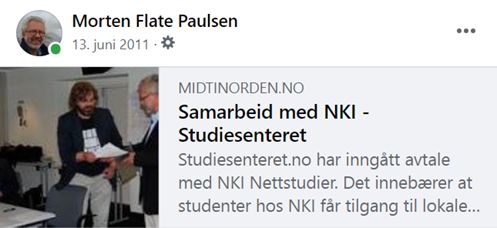
The following year, I accepted to sit on the board of Studiesenteret.no for three years. Still have fond memories of my visit to Studiesenteret’s headquarter 19-20 June 2014. Lars picked me up at the Evenes airport and drove me through the magnificent northern landscape. To have a board meeting with Major Ivar Prestbakmo in the Sjøvegan Municipality.
Lars and his wife Astrid Høgmo were rural entrepreneurs and zealots. Taught me a lot about challenges and opportunities for rural study centres. How they built a national structure for tertiary education and lifelong learning. Struggled with the finances and succeeded in attracting significant revenue from innovation and development projects.
EDEN’s 20th anniversary conference in Dublin
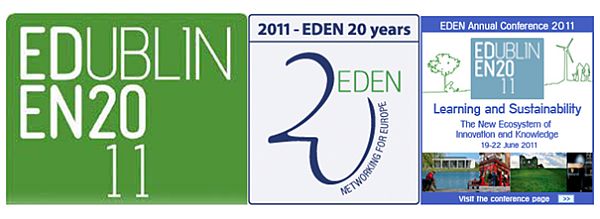
EDEN celebrated its 20th anniversary in Dublin during the annual conference on June 17-22. Organised in collaboration with the Dun Laoghaire Institute of Art Design and Technology. The conference theme was Learning and Sustainability – The New Ecosystem of innovation and Knowledge.
The best conference so far in my life. My first annual conference as EDEN president. What a privilege to be in the centre of all the celebration. To talk with so many friendly colleagues around the world.
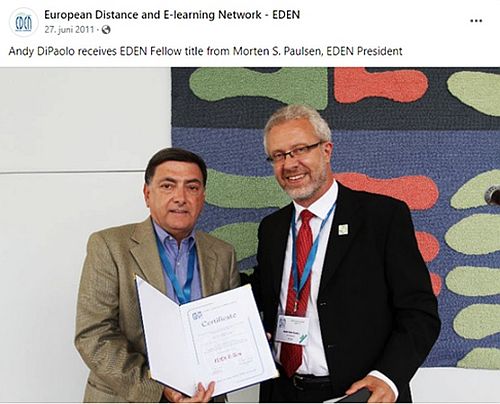 The conference gathered 170 speakers among 425 participants from 40 countries and all continents. Norway and Sweden were well represented with 28 and 30 participants respectively. The Norway Opening Universities (Norgesuniversitetet) held its board meeting in extension of the conference and Geir Hareide Hansen and Atle Kristensen reported from the conference on Nordland University’s blog. Sarah McSeveny from the ICDE secretariat wrote 20 years in the garden of EDEN summing up ICDE members’ contributions at the conference. As usual, Alastar Creelman posted interesting Twitter messages and blog reflections.
The conference gathered 170 speakers among 425 participants from 40 countries and all continents. Norway and Sweden were well represented with 28 and 30 participants respectively. The Norway Opening Universities (Norgesuniversitetet) held its board meeting in extension of the conference and Geir Hareide Hansen and Atle Kristensen reported from the conference on Nordland University’s blog. Sarah McSeveny from the ICDE secretariat wrote 20 years in the garden of EDEN summing up ICDE members’ contributions at the conference. As usual, Alastar Creelman posted interesting Twitter messages and blog reflections.
At the reception, I had the honour of presenting diplomas to six new EDEN Fellows: Andy diPaolo (USA, see photo), Tapio Koskinen (Finland), Natalia Tikhomirova (Russia), Jim Devine (Ireland), Ilaria Mascitti (Italy) and Rafi Nachmias (Israel).
My lead-in remarks were as usual: Dear colleagues and friends of EDEN. Made me feel safe as I kicked off the opening session with the video recorded presentation Welcome to EDEN and the Conference.
Handed out more awards after the talk. Marci Powell received a Certificate of Honour on behalf of Polycom, the conference’s main sponsor. Principal Jim Devine a plaque in recognition of his efforts as local event committee manager.
So delightful to hand out diplomas to representatives of the eight institutions that had been loyal members since EDEN was established 20 years earlier. As a Scandinavian, it was interesting to see four Norwegian and one Danish institution in company with three of Europe’s most renowned open universities.
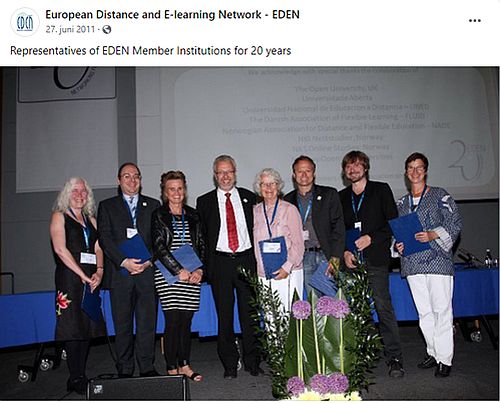
From left in the picture:
- Open University in England by Grainne Conole
- Universidade Aberta in Portugal by Antonio Teixeira
- FLUID in Denmark by Elsebeth Sorensen
- EDEN President Morten Flate Paulsen
- NFF by Ingeborg Bø
- NKI Online Education by Kjetil Ørbeck
- NKS Online studies by Anders Nome
- Norgesuniversitetet by Julie Feilberg
- UNED in Spain was not represented in the picture
The two keynotes in the opening session were by Sir John Daniel from the Commonwealth of Learning and Dennis Pamlin from the WWF. Particularly thought-provoking was Sir John’s description of the Iron Triangle. Showing that traditional educational institutions cannot match online schools in increasing access, improving quality and reducing costs.
Both PowerPoint presentations and videos from EDEN’s Keynotes are available at http://www.eden-online.org/resources/keynotes/
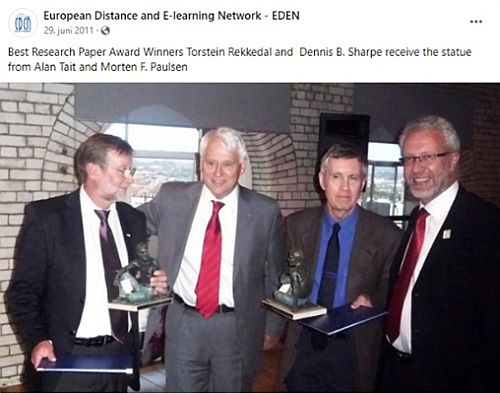
The conference dinner and dance were at Guinness Store House. A well-suited venue for EDEN’s ambition to facilitate networking and exchange of experiences. Before the dinner, Ingeborg Bø gave a congratulation speech to EDEN from ICDE, where she emphasized that EDEN had agreed to become an associate member of ICDE.
The highlight of the evening was the presentation of the Best Research Paper Awards. 57 of the 170 papers were defined as research work. Of these, 7 were nominated and jury leader Alan Tait presented the awards to Torstein Rekkedal and Dennis B. Sharpe.
Torstein’s paper was titled Local Support for online learners with possible learning disadvantages. Based on a report about experiences with NKI’s learning space from interviews with online students on rehabilitation, supervisors in rehabilitation companies and rehabilitation consultants in the Norwegian Labour and Welfare Administration (NAV).
Her Excellency Mary McAleese, President of Ireland, addressed 425 delegates from 40 countries. It was the first time a Head of State addressed an EDEN conference, and the audience was really impressed by her speech.
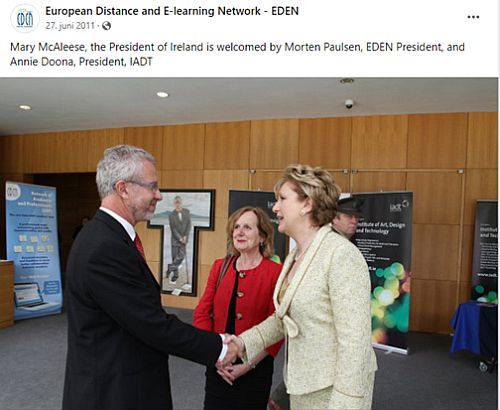 EDEN Vice President Alan Bruce was Master of Ceremony, and IADT President Annie Doona welcomed President McAleese. After her address, it was my privilege to give a thank you speech to the President.
EDEN Vice President Alan Bruce was Master of Ceremony, and IADT President Annie Doona welcomed President McAleese. After her address, it was my privilege to give a thank you speech to the President.
The #edendublin Tweeters reported that the President sparkled, and the delegates’ heartly applause was echoed in Steve Wheeler’s blog:
“For at least 20 minutes, she held her audience spellbound as she recounted a history of learning technology and applauded EDEN for its massive contribution to our understanding of the digital incursions into education through the years.”
The standing ovation was prolonged in Alastair Creelman’s blog: “The standard of the keynote speakers at the conference was very high and all made excellent contributions but the strongest impression in my opinion was the address given by the Irish President, Mary McAleese…. Her address was as much a keynote speech as the other experts.”
We have different dreams. Liv Arnesen’s dream was to reach the South Pole on skis. In the closing session, she talked about her expeditions where she imparted knowledge about nature and the environment to schoolchildren using modern technology and learning activities. Her pictures from the polar regions showed that there are few limits to online education.
The conference was rounded off with the surprising and thought-provoking YouTube video The Future of Publishing. Giving hope that crises in traditional education can be reversed with online education.
Finally, I wished all colleagues and friends of EDEN a reunion in Athens at the October conference Never Waist a Crisis and in Porto for the next annual conference on Open Learning Generations.
The first EDEN Fellows’ day
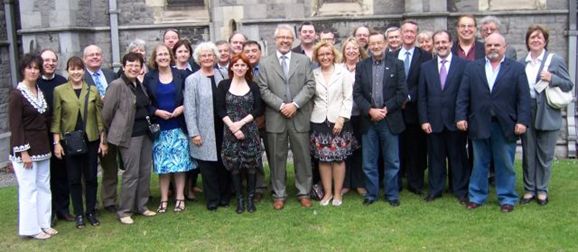
The EDEN Fellow scheme was established to honour distinguished colleagues and to provide validation and support through a respected scheme of recognition. The first EDEN Senior Fellow and Fellow Awards were presented at the 2007 Annual Conference in Naples.
On June18 2011, 24 EDEN Fellows, as well as members of the EDEN Executive Committee and invited guests from the USDLA took part in the first EDEN Fellows Day in Christchurch Cathedral, Dublin. To celebrate EDEN’s 20th anniversary and to reflect on the remarkable developments in e-learning and the challenges ahead.
In my opening presentation, I honoured the two EDEN Vice Presidents Antonio Teixeira and Alan Bruce for instigating the first EDEN Fellows’ day. Pointed out that after the Award Ceremony at the Dublin welcome reception, there were 13 Senior Fellows and 40 Fellows. Looking at the Fellows list, I counted 18 women and 35 men. They represent 19 countries.
In the morning, the following eye-opening keynote presentations were delivered:
- Sir John Daniel (one of the three founders of EDEN): Open Schooling: The Next Frontier for Distance Education?
- Maruja Gutierrez-Diaz: Developments and evaluation of the past decade(s) in ICT for education from a European policy perspective
- Andras Szucs: EDEN Developments from management perspective
- Marci Powell: An Overview of the United States Distance Learning Association (USDLA)
The workshop concluded that all major developments during the last five years had been predicted, although not by all. Even so, the Fellows agreed that resistance to educational innovation persisted. In fact, developments were mostly substantial slower than foreseen because educational institutions inertia was much more effective than hoped.
Important emerging technologies pointed out by the Fellows were: social media; open educational resources and practices; mobile learning and personal learning environments.
The Fellows also focused on the financial constraints facing the European countries and their impact on learner support, curriculum restraints, new developments etc. So, EDEN used the political and economic situation in Athens as backdrop for the Open Classroom conference: Never Waste a Crisis.
The delegates focused more on opportunities for change than on the dire economic situation in Europe. Several of the presenters argued that an educational crisis would spur innovation and that the need for cost-effective education would result in many opportunities for e-learning.
Several colleagues reminded me that the financial situation would enforce more competition, mergers and new financial models. This would create both opportunities and challenges for ODL providers which needed to find sustainable and large-scale solutions in more competitive markets.
The July 22 massacre
We were invited to my brother for a Friday barbeque dinner. Ready to leave my office, I heard a thunderbolt. Wondered if the weather would ruin the garden party. Turning on the car radio, I heard the news.
A car bomb had exploded in the Government Quarter in Oslo at 15:25 on Friday, July 22, 2011. Eight people were killed and nine severely injured. Nearly 500 people were in the vicinity when the bomb exploded. Many of them were exposed to physical injuries and psychological trauma. The explosion caused massive material damage.
At my brother’s house, we tried to follow the news on television without scaring his two little girls. Starting about 17:30, a massacre began at the Labour Party Youth League’s (AUF) annual summer camp. 564 people were on the Utøya island, 69 were killed by shooting or gunshot wounds. An additional 33 youths were severely injured. A large number suffered psychological trauma.
The perpetrator, Anders Behring Breivik, was arrested by the Norwegian Police’s Emergency Response Unit on Utøya at 18:34. During both his interrogation and testimony in the Oslo District Court, Breivik stated right-wing extremist and anti-Islamic political motives. Extreme manifestos that he accrued and propagated on the Internet. On the 24th of August 2012, he was sentenced to the strictest sentence in Norwegian law: 21 years of preventative detention, with a minimum of 10 years.
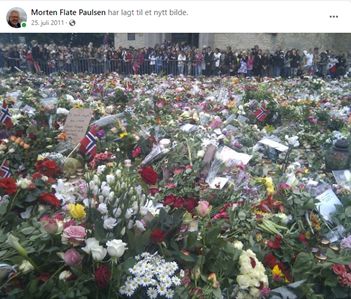
In the evening of 22 July 2011, AUF member Helle Gannestad tweeted: If one man can cause so much evil, imagine how much love we can create together.
This message went viral, and a sense of unity spread via social media within hours. Hundreds of thousands of people came together in public commemorations during the following days. We joined a huge flower procession downtown Oslo on July 25. A ceremony that started with Crown Prince Haakon Magnus’s appeal and Prime Minister Jens Stoltenberg’s speech. Everybody carried flowers to adorn the city centre. An exceptionally strong memory and fine gesture of unity.
After the July 22 massacre in Norway, we should remind both young and mature learners of the dangers of unlimited and unattended access to extreme networks and resources on the Internet.
Nanolearning with Junglemap
The press release was dated September 8, 2011. NKI acquired Junglemap. A promising Nanolearning company with an interesting strategy. The company boasted 400.000 users in 150 countries from companies including Nokia, Microsoft and the Norwegian Ministry of Foreign Affairs.
Junglemap compared nanolearning with vitamin pills. Argued that we need a small amount every day. The courses consisted of a series of short modules that were e-mailed to the learners on certain dates. Each module took 2-5 minutes to complete. Meaning that you clicked the next button about five times to see or read all content in the module.
All NKI employees were enrolled in a five module nanocourse to improve their skills in Microsoft Words. I found the experience interesting, but several colleagues were annoyed. The most digital argued that they learned nothing new and that the least digital just clicked the next button five times without learning anything.
The system had a real-time dashboard that allowed managers to see the progress of individual learners. Junglemap reported that they had 2 million lessons completed and an overall completion rate of 95,4 %.
I understood that the purchase helped Kjetil Ørbeck meet the owners tough mandate for growth. But there was a cultural learning gap between the companies. Many NKI colleagues became upset by Kjetil’s enthusiasm for Junglemap and its simplistic LMS. His meaningless comparisons of NKI’s and Junglemap’s completion rates. He did not seem to realize that it was harder to complete NKI’s courses that required hundreds of hours studying than to complete five short modules with five clicks of the mouse.
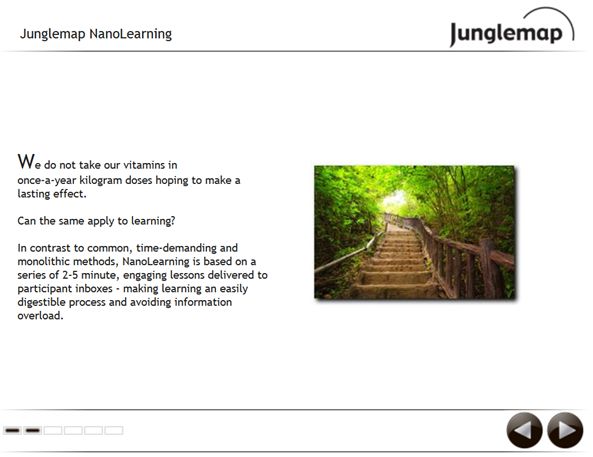
Never waste a crisis in Athens

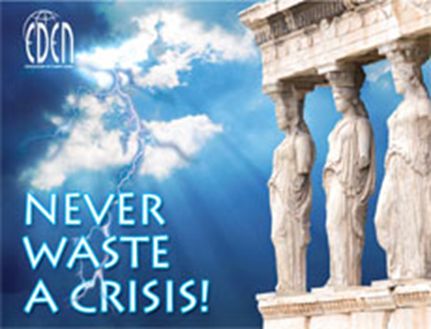
We planned the conference in a February executive meeting in Athens. Made some reflections during my following recreational excursion. To the port city of Piraeus and its Riviera. Why could an expensive private school be successful in times of economic crises?
Obviously, there were many rich people in Greece. Successful lawyers, doctors and dentists. But still, I concluded that private schools only succeed if they are better than, or different than, public schools.
Back in Athens. Late October. The perfect time and place for EDEN´s Open Classroom conference – Never Waste a Crisis. With the political and economic backdrop, I was intrigued by the optimistic attitude of the 206 delegates from 28 countries who focused more on opportunities for change than on the dire economic situation in Europe. Several of the presenters argued that an educational crisis would spur innovation and that the need for cost effective education would result in many opportunities for e-learning.
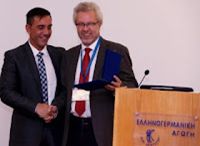 Our 9th Open Classroom Conference was certainly amongst the most successful in EDEN’s history, and the support, competence and commitment of Sofoklis Sotiriou and his excellent team at Ellinogermaniki Agogi was essential for the success. The private K-12 school celebrated its 50th anniversary this year, and it was a special pleasure for me to hand over the EDEN Anniversary Award Plaque to Stavros Savas for the school´s leadership and contributions to the professional development and international collaboration in open, distance and e-learning.
Our 9th Open Classroom Conference was certainly amongst the most successful in EDEN’s history, and the support, competence and commitment of Sofoklis Sotiriou and his excellent team at Ellinogermaniki Agogi was essential for the success. The private K-12 school celebrated its 50th anniversary this year, and it was a special pleasure for me to hand over the EDEN Anniversary Award Plaque to Stavros Savas for the school´s leadership and contributions to the professional development and international collaboration in open, distance and e-learning.
The active involvement of many delegates from the Greek professional community of schoolteachers was a special asset of the conference. The special treatment at the conference dinner – including Alan Bruce’ speech – and the special guided tour to the Acropolis Museum made my October 28th birthday very memorable.
The conference Proceeding CD included 25 papers, 15 workshops, 5 demos, 6 posters, 5 case studies and 5 best practices. Among the highlights were the 7 highly appreciated Key Note Presentations, and personally I learned a lot from:
- Demetrios Sampson’s overview of Learning Object Repositories and Learning Design Repositories
- Alan Bruce’s presentation on educational Visions, Challenges and Perspectives
- Erik Duval’s introduction to Learning Analytics
I was also pleased to see that the conference proceeding was available in EDEN NAP-members area shortly after the conference.
A model for quality barometers in education
The teacher response time barometer we introduced in 2004 was a great success. It made me wonder if we could develop more barometers. Maybe a general model that could be used in all sorts of education?
So, I came up with the term Quality Barometers. Started to discuss them with people at NKI and colleagues in the field.
Understood that quality barometers should show the momentary state of quality. That readings should change continuously. Making them especially suited for online education with individual start and progression.
Realized that barometers should stimulate improvement by setting institutional aims and warning levels. To do that, some sort of transparency was needed. But transparency is controversial and needs to be treated both on an individual and a cooperative level.
The discussion and contemplation made me develop the general model for Quality Barometers in online education. New tools that could support my Theory of Cooperative Freedom and Transparency in Online Education.
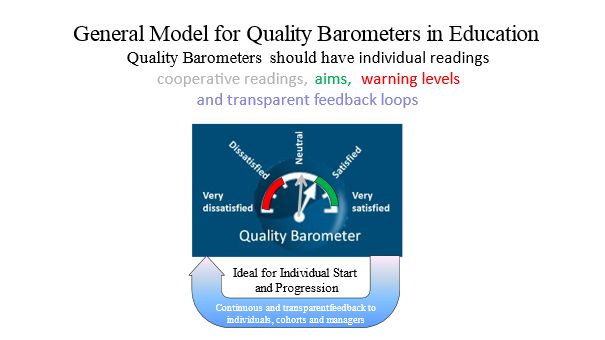
Knew that transparency in education can contribute to better quality. The challenge was to find the right balance between the private and the transparent. To show useful information without making people feel naked in front of an audience, So, we chose to show the teachers and course designers their individual results compared with the average results of their colleagues.
Was aware that quality barometers should be used with caution. That good evaluations are not the same as a high learning outcome. That barometers can produce undesirable results. Not impossible that some teachers, consciously or unconsciously, give more positive feedback to students to achieve good evaluations. But this phenomenon is hardly greater in online education than in more traditional education.
Was concerned that quality barometers could contribute to a strong focus on some of the elements of overall quality. In other words, there was a risk that increased attention in one area may come at the expense of the quality in other areas. We therefore deliberately chose to focus on three barometers. Teacher response time, quality of teacher work and overall course quality.
Three successful quality barometers
We updated SESAM with an improved graphic interface in September. The screenshot shows the updated design of our individual planning system for a student who studied the four courses included in Multimedia journalism.
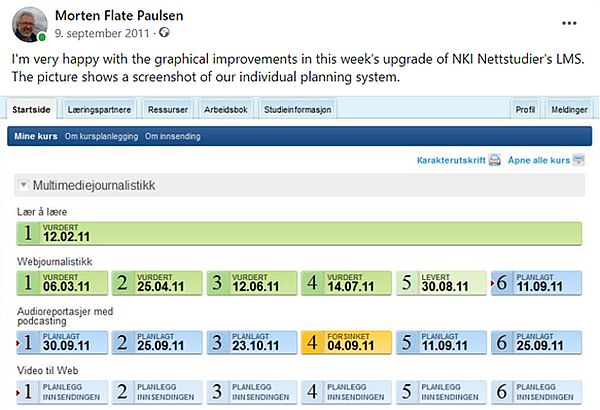
Built on the successful quality barometer for teacher response time introduced seven years ago. Followed up in October with two new barometers for teaching and course quality. Urged students to evaluate the teachers after each study unit. And the course after completion of all study units.
Had vivid discussions on how to agree on a useful and encouraging scale for quality barometers. Decided to use VESS (meaning Very Satisfied or Satisfied). Based on a 5-point Likert-scale with the five alternatives: Very satisfied, Satisfied, Neutral, Dissatisfied and Very Dissatisfied. Calculated the percentage of Very satisfied and Satisfied out of the total number of evaluations. If the evaluations were equally distributed among all five alternatives, the calculated quality would be 40 %. A lower VESS reading indicated quality challenges.
The screenshot shows the window allowing students to click the five-point Likert scale. And enter an open text evaluation.
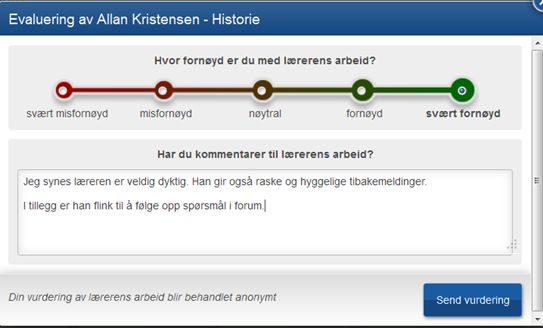
The evaluations results were available for teachers and staff as quality barometers and detailed reports of open text evaluations as shown belove.
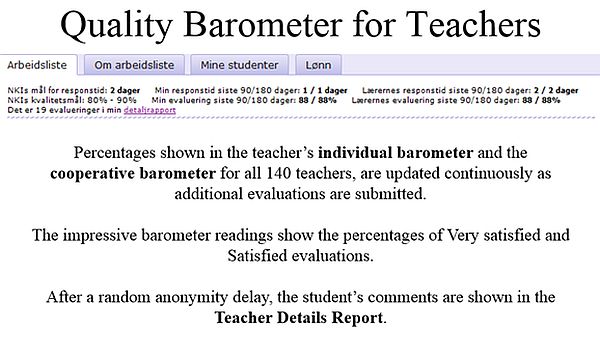
NKI’s 12000 online students started to evaluate their teachers and courses September 7. On October 12, we gave our 140 online teachers access to the first results. As 2000 evaluations were recorded. Enough time to secure anonymity and quality check the result. 88% were Very Satisfied or Satisfied.
It took more time to get results from the course evaluations, since students only could evaluate a course after finishing all study units. However, the project report I wrote in November showed that after the first 419 course evaluations 88 % were very satisfied or satisfied with their courses. And the first 4017 teacher evaluations showed that 90 % were very satisfied or satisfied with their teacher.
The open text evaluations were fewer but provided very useful insight and help for teachers and staff who wanted to improve the quality of their work.
EDEN President’s blog and Professor Paulsen’s corner

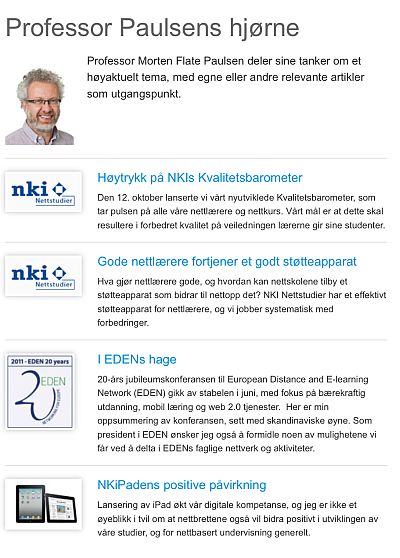
A new version of NKI’s marketing website was launched in June 2009. As usual, a major task which included discussions about how much of the old content was worthwhile to transfer. The new management was not very interested in preserving old content. So, they decided not to include Nettskoleavisen. Neither the 29 issues I wrote from 1998 to 2009. Nor a space to publish new issues.
In my opinion, valuable historic material. And the management agreed that I transferred it to nettskoleavisen.blogspot.com.
Fortunately, I had the EDEN President’s blog to alleviate my writing itch. So, I wrote 13 blogposts that reflected some of my current thinking. Posts that have shaped several anecdotes in My Online Education World.
At the cursor moment, it is good to see that EDEN has been able to preserve so much of its historic material online. Something that NKI and very many other institutions should reflect on.
However, I missed my editorial NKI work and accepted when Wenche Halvorsen asked me to write “Professor Paulsen’s Corner”. So, I contributed with the four 2011 articles shown in the screenshot. Stopped as the articles were edited extensively and published without my acceptance.
The articles are now only available in Archive.org
Over Board
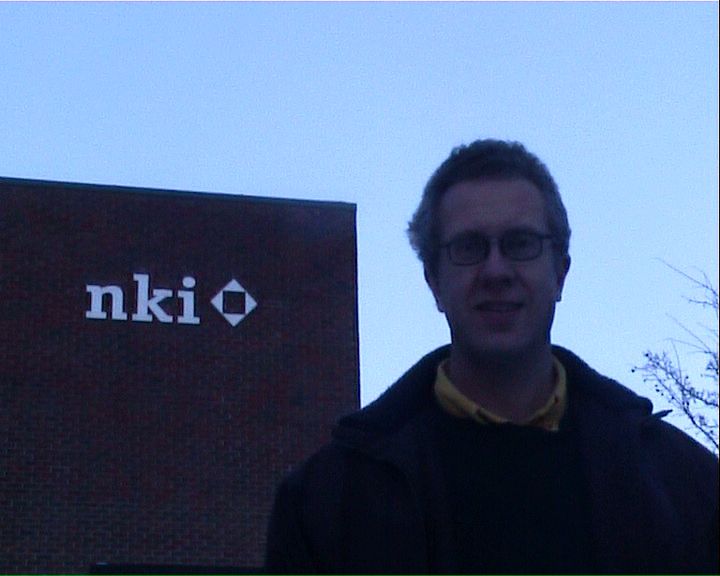 In the fall, there was a growing unrest in the organization. Some colleagues saw an opportunity to climb the hierarchy. Most were uncomfortable with all the changes and feared they would lose their job.
In the fall, there was a growing unrest in the organization. Some colleagues saw an opportunity to climb the hierarchy. Most were uncomfortable with all the changes and feared they would lose their job.
John Vigrestad was engaged as Director of Innovation. A position that was never advertised. Took soon over as Director of marketing and sales. Wondered what he understood of online education and NKI’s operation. Maybe his real assignment was to make people quit? At least a substantial number of colleagues pointed at him as a major reason for quitting. I counted a turnover of about hundred people over a period of three years.
The unions became stronger and mobilized before the NKI board election. So, my time as an independent representative on the NKI board ended. Taken over by a union member.
Soon after the election, Kjetil Ørbeck reorganized the management team. Gave all seven executive members the fancy Norwegian title “Direktør”. And kicked me out. Maybe I was too naïve. Did not care enough of my personal NKI career. Dared to question Kjetil’s ideas. Always said what I meant was best for NKI and our online students.
I later heard disturbing news about one competent senior colleague who openly challenged some of the management’s arguments. Arriving work an early morning, she found that her access card to the office building did not work. That all her passwords were defunct and that her office was emptied. Just one of several colleagues who had to engage lawyers to be treated properly.
Anyway, September 1, my job title was changed from Director of development to Senior Adviser. Transferred from the development department to the support department. Reporting to Wenche Halvorsen. A huge setback after so many inspiring years working for Torstein Rekkedal. My long-term boss who was degraded to senior researcher. As it was decided that NKI should no longer engage in international research projects.
Project coordinator
Fortunately, NKI wanted my competence to coordinate the 13 ongoing research and development projects. Projects that had received NOK 4.5 million in external funding. Many I had initiated and written applications for.
I was further asked to write new project applications to the Norwegian agency VOX. Which resulted in a total of NOK 6 765 000 for nine new development projects in 2012. An interesting challenge that gave me much influence on NKI development.
But I was not welcome to attend the management meetings when the project applications were discussed. And to my great surprise, they asked me to write an application just a few days before the application deadline. To develop a new learning management system. A request I declined. Because I lacked time and arguments to write a credible application.
The 21 projects I coordinated are shown in the figure.
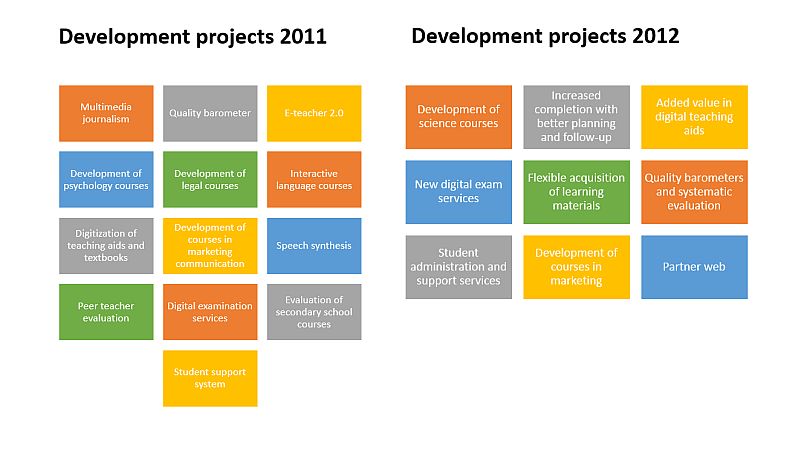
Despite of the difficulties with the NKI management, it was a valuable experience to coordinate these 21 projects. Write so many successful project applications and final reports.
Déjà vu in Vaasa
Had a déjà vu moment when I checked into the Hotel in Vaasa on November 23. Next to the hotel Jon, Stein, Bjørn, and I had as students in the late 1970s. When we drove from Trondheim and took the ferry boat from Sundsvall in Sweden to Vaasa in Finland. Probably my only trip abroad that year.
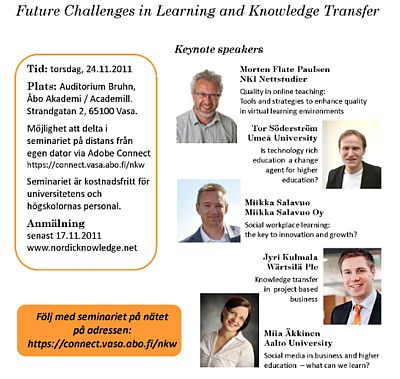
Made a keynote presentation at a conference about Future Challenges in Learning and Knowledge Transfer. Arranged by the project Nordic Knowledge on the Web. The presentation was titled Quality in online teaching: Tools and strategies to enhance quality in virtual learning environments.
During the conference, I agreed to do a spontaneous video interview about online education barometers and transparency. Felt as usual awkward in front of a camera. Uncomfortable to talk without preparation. But did my best to explain my current thinking. Stated that grandfather’s barometer measured air pressure in millibar. That quality barometers measured pulse and blood pressure of the quality in online learning environments.
Alone, at the hotel, I reflected on how much life had changed since my first visit to Vaasa. The previous week I was hosted by the tourist board in Rotterdam. Vaasa was my second visit to Finland this year. After giving a keynote in Helsinki in March. About cooperative online and blended learning environments. Four trips to Sweden. Made presentations at the Gotland University Campus in Visby in April and the University of Gothenburg in May. Received the Baldic award in Stockholm in October. Even rented a summer house near the idyllic Swedish coastal town of Mollesund for a family holyday in July.
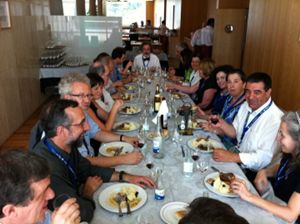 A year with exciting working trips to Greece, Ireland, Spain and Portugal. Took my youngest son to Cascais May 11-18. As I continued to Universidade do Minho. To give a presentation at the VII International Conference on ICT in Education – Challenges 2011. And dine with the Portuguese colleagues in the picture. Back in Cascais, we had a strenuous scenic hike all the way from the fabulous Guincho Beach to the lighthouse of Cabo de Rocha. And celebrated our constitution day May 17th at the Norwegian embassy in Lisbon. With delicious Norwegian seafood and Portuguese wine.
A year with exciting working trips to Greece, Ireland, Spain and Portugal. Took my youngest son to Cascais May 11-18. As I continued to Universidade do Minho. To give a presentation at the VII International Conference on ICT in Education – Challenges 2011. And dine with the Portuguese colleagues in the picture. Back in Cascais, we had a strenuous scenic hike all the way from the fabulous Guincho Beach to the lighthouse of Cabo de Rocha. And celebrated our constitution day May 17th at the Norwegian embassy in Lisbon. With delicious Norwegian seafood and Portuguese wine.
An exciting year with many good memories. Despite all the trouble at my beloved NKI.
Some 2011 events
- February 11 – Egyptian President Hosni Mubarak resigned following the revolution.
- February 20 – The uprising in Libya led to massacres in Benghazi.
- March 18 – The UN Security Council adopts a no-fly zone over Libya during the uprising in Libya and Gaddafi’s counter-offensive.
- May 2 – Osama bin Laden, founder of the terrorist network al-Qaeda, was killed by US special forces in Pakistan.
- June 17 – Norwegian Slow TV from the ferry boat Hurtigruten was broadcasted on NRK2.
- July 7 – The agreement between Russia and Norway on the border line in the Barents Sea entered into force.
- July 22 – The terrorist attacks in the Norwegian Government Quarter and Utøya. 77 people died, many were injured, and there were great material damages.
- August 5 – The authorities in Syria put down the rebellion in Hamah and killed at least 300 demonstrators.
- August 22 – During the civil war in Libya, the rebels captured most of Tripoli and Gaddafi’s bunker.
- October 20 – Libya’s former leader Muammar al-Gaddafi was killed.
- October 27 – Wikimedia Norge was awarded the Folkeopplysningsprisen for 2011 by the Adult Education Association.
- December 29 – Kim Jong-il was buried with a two-day ceremony in North Korea.
- December 31 – Kim Jong-un was appointed head of the world’s fourth largest standing military, the Korean People’s Army.
My 2011 publications
Morten Flate Paulsen and András Szűcs (eds) 2011. EDEN 2011 Annual Conference Proceedings. Learning and Sustainability. The New Ecosystem of Innovation and Knowledge. University College of Dublin, Ireland 19-22 June.
My 2011 presentations
In 2011, I gave 14 external presentations in Ireland, Finland, Portugal, Greece, Sweden and Norway.
Ireland
EDEN Fellows’ Day in Christ Church Cathedral, Dublin, 18.06.11.
Welcome to EDEN and the conference.
Twenty years with EDEN. A presentation at the EDEN annual conference in Dublin, 21.06.11.
The President’s report at the EDEN Annual General Meeting in Dublin, 20.06.11
Finland
Cooperative online and blended learning environments. A 75-minutes keynote presentation, 10.03.2011.
Quality in online teaching: Tools and strategies to enhance quality in virtual learning environments. A presentation at Nordic Knowledge on the Web. Vasa, Finland 24.11.11
Portugal
Cooperative Online Education. A keynote presentation at Challenges 2011. 13.05.11, Universidade do Minho, Portugal.
Greece
Introduction to EDEN and the conference. Presentation at the EDEN Open Classroom Conference. Athens October 2011.
Sweden
Att skapa studentaktiva och stödjande nätstudier. Foredrag på GU Online, Göteborgs universitet. 04.05.11.
Fleksibilitet, samarbeid og transparens i nettbasert utdanning. Et 90-minutters foredrag, Högskolan på Gotland, Sverige, 06.04.2011.
Norway
Cooperative Online Education – Independence with the help of others. A presentation at the workshop: New technology – new possibilities and new challenges? Developing networks in teacher education and research. 22.08.2011, University of Tromsø.
Provision of Online Education Programs. An overview of pedagogical and administrative aspects in online teaching and learning with focus on efficient administration and transparency in cooperative online education. A 60-minutes presentation at the www.youthstudies.eu workshop: Making a success of an international and integrated blended learning degree course. University of Oslo, 01.07.2011.
Læring i kooperativ frihet. Kvalitetsvurderinger og erfaringer som er viktige i NKI Nettstudiers virksomhet. Foredrag på Norgesuniversitetets høstkonferanse.19.09.11
Fleksibel nettbasert utdanning. Et 45-minutters foredrag, 17.02.2011, Universitetet i Nordland
EDEN, NKI og Globalskolen. Noen erfaringer og personlige refleksjoner. Et 60-minutters foredrag på Globalskolens lærersamling 11.08.11.
2012 - Quitting NKI and starting NooA
Moodlemoot2012 in Dublin
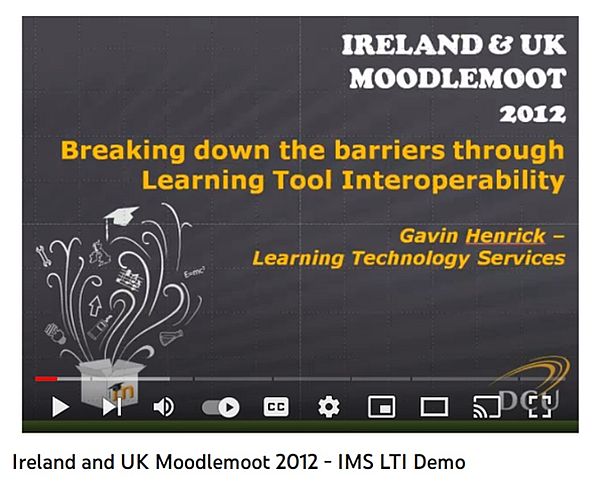 Spent the Easter holidays in Dublin. As the very first EDEN Newsflash was prepared. To attend my first Moodlemoot held at DCU on April 2 and 3, 2012. Without telling my NKI colleagues that I wanted to learn more about Moodle. An LMS used by Universidade Aberta, OUUK and many other EDEN members. An open source LMS with a potential to support my theory of cooperative freedom and transparency in online education.
Spent the Easter holidays in Dublin. As the very first EDEN Newsflash was prepared. To attend my first Moodlemoot held at DCU on April 2 and 3, 2012. Without telling my NKI colleagues that I wanted to learn more about Moodle. An LMS used by Universidade Aberta, OUUK and many other EDEN members. An open source LMS with a potential to support my theory of cooperative freedom and transparency in online education.
An inspiring user conference with people who wanted to share and help each other. Remember talking with Gavin Hendrick about the opportunities with Learning Tool Interoperability (LTI) in an Irish pub. Very cold after watching seals during a RIB excursion along the Dublin coastline. Warmed by a pink cardigan handed over by a friendly female soulmate.
Read the conference abstracts and decided to set up a private Moodle server and become a certified Moodle course developer to learn more about the popular Open Source LMS.
The unfortunate LMS-project
Development of SESAM was frozen after the quality barometers were implemented. In my view, halting the further development of NKI’s primary competitive advantage. The management had decided that NKI should outsource the development of a brand-new Learning Management System. That it was too expensive to retain inhouse ICT-employees to develop and maintain an LMS. So, a project group was established to specify the new system. Headed by Jørgen Offstad. A NKI rookie who adamantly claimed that NKI would be bankrupt if we did not have a new LMS by the end of the year.
I was not consulted or asked to be part of the group. Was however asked to head a reference group. A reference group that received minimal information during the project.
If someone had asked me, I would estimate that it required three years and 3 million euros to develop a better system than the current SESAM 6. Time and money that could be spent much wiser. If necessary, to go for an enhanced and integrated Moodle version as the UKOU had done.
On Thursday April 12, the reference group received the first documentation from the project. And a cover letter with a two working days deadline:
«The management group will make a decision on supplier and tools during the management meeting next week. Tuesday (17.04.12) at 12:00 is the deadline to provide any input and views.»
The reference group of 10 NKI colleagues managed to hand in a 7-page report before the management meeting that took place in Spain.
We pointed out that there had been a lot of internal unrest and disagreement about the timing, usefulness and wisdom of the LMS project. Stated that the decision involved considerable risk and was very important for NKI’s future. The group was therefore puzzled by the short deadlines.
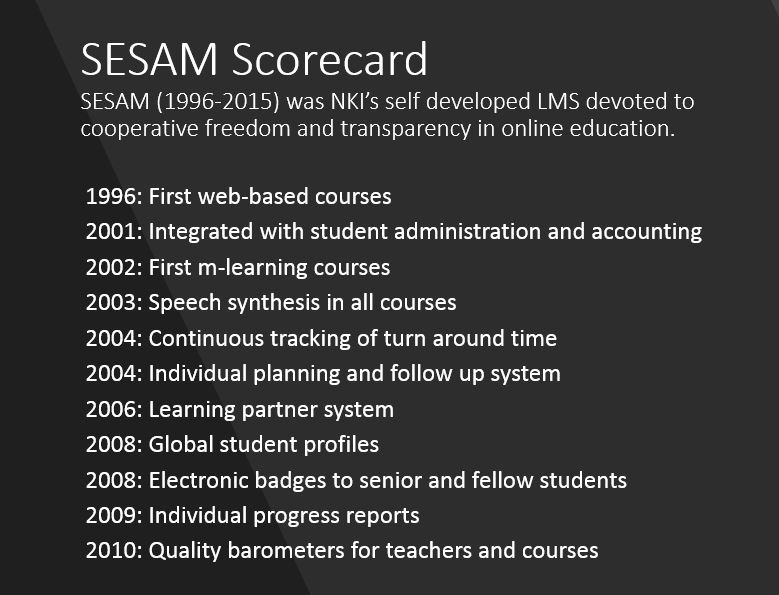
We discussed some of the many shortcomings. Questioned if it was realistic to have a new system up and running by the end of the year for about 325 thousand euros. Were sceptical about how wise it was to choose one of the two small and financially stressed development companies that were suggested.
The project group’s recommendations were soon turned down by the NKI Board. But the harm was irreversible. Valuable SESAM time and competence was already lost. I realized that it could take years for NKI to recover. And the frozen SESAM was still in operation for three years as a new LMS was developed.
Was approached by colleagues who wanted to start a new company to develop SESAM 6 further. As a commercial or open source LMS. They argued that it probably was the world’s best LMS for online education based on individual start-up and progression. Listened to them but did not consider this seriously. Did not believe that the NKI-management would agree and realized that I did not have the knowledge and resources to start an international LMS-company.
Landing NKI and NooA in Montreal

Fortunately, I was invited to give a keynote in Montreal in May. At the Colloque scientifique international sur les TIC en Education (International Scientific Conference on ICT and Education). About Quality schemes in cooperative learning environments. Remember how impressed the Canadians were by our SESAM LMS opportunities.
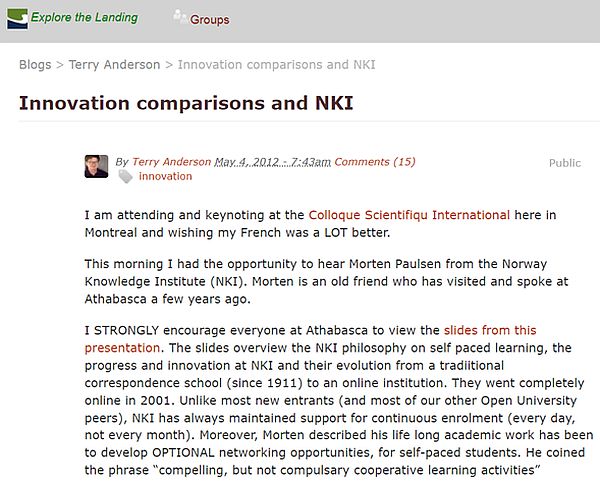 My school French was not good enough to follow presentations in French. I did however attend Terry Anderson’s keynote in English. And appreciated Terry’s post in Athabasca University’s discussion forum The Landing. Especially that he commented on the many NKI innovations. Stated that I coined the phrase “compelling, but not compulsory cooperative learning activities”. That NKI had rolled out significant innovations across the whole system. And called for a similar innovation timeline at Athabasca University. A call that resulted in a long thread of interesting comments about NKI, Athabasca University, innovations, research, SESAM and Moodle.
My school French was not good enough to follow presentations in French. I did however attend Terry Anderson’s keynote in English. And appreciated Terry’s post in Athabasca University’s discussion forum The Landing. Especially that he commented on the many NKI innovations. Stated that I coined the phrase “compelling, but not compulsory cooperative learning activities”. That NKI had rolled out significant innovations across the whole system. And called for a similar innovation timeline at Athabasca University. A call that resulted in a long thread of interesting comments about NKI, Athabasca University, innovations, research, SESAM and Moodle.
Decided to combine the Montreal trip with a week of vacation to get away from my NKI frustrations. So, I flew to New York. Rented a car. Stayed a night at an Atlantic City casino. Strolling the boardwalk, I realized that NKI would soon be without SESAM, its development team and EU-funded projects. In my opinion, the core of NKI’s success and my career.
It gradually dawned on me that all ICT services I needed to establish an online school had become affordable and easily available in the cloud. So, I had a lot to think about driving towards Penn State and Niagara Falls on the way to Montreal.
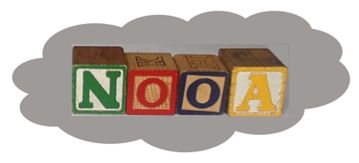
Made a pit stop at an Up State New York antique shop. There, among artifacts, antiquities, junk and childhood treasures, suddenly appeared some wooden alphabet blocks. That load and clear spelled out the colourful word NooA. Showing the blocks to people from various countries, I realized that they could easily pronounce and remember the word. Since most of them associated it with Noah’s Ark.
This happening convinced me that I could establish NooA – the Nordic open online Academy in the cloud. And use blocks as design elements.
Thirty years and one day
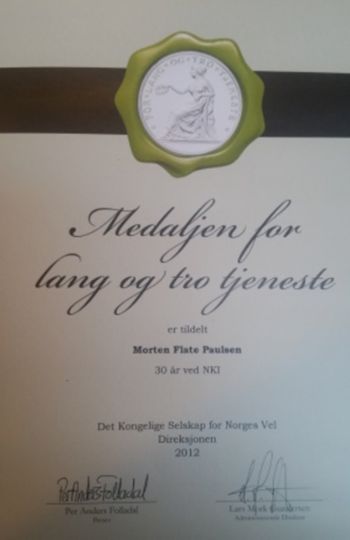 The Royal Norwegian Society for Development introduced its Medal for Long and Faithful Service in 1888. A medal awarded to employees who have been loyal to their employers over a period of at least 25 years.
The Royal Norwegian Society for Development introduced its Medal for Long and Faithful Service in 1888. A medal awarded to employees who have been loyal to their employers over a period of at least 25 years.
I received the 30 years medal at a NKI reception in June. Sent my letter of resignation the next day. Since many people in the field wondered what happened, I got acceptance to publish the June 27 blog post that included the two following paragraphs:
This has been a difficult decision. I’m really thankful for NKI’s longstanding support of my professional development which has made it possible for me to become professor of online education and president of EDEN. However, NKI is now in a tough transformation process with new opportunities and challenges. The prevailing targets and the methods of accomplishing them are making it increasingly difficult for me to feel that I’m contributing sufficiently.
I’m extremely proud of our achievements during the 25 years that have passed since I thought NKI’s first online, distance education course. You know that I care a lot about transparent and cooperative online education, especially the unique opportunities it gives to all the devoted online students and teachers. It’s heartwarming to think about our individual planning system, the response and quality barometers, the learning partner services, the global student profiles and all the other innovative online education services we have pioneered. I like to think that this has been of great benefit for the 55.000 online students we have enrolled in nearly 200.000 courses since 1987.
Reading in between the lines, you see that it was impossible for me to support the management and the way it treated the employees. So, I was somewhat relieved when it a few weeks later was announced that Kjetil Ørbeck would not work for NKI anymore. Not so strange according to the public information available in www.proff.no. During three years with Ørbeck, NKI’s revenue decreased from 113 to 101 million NOK and the 7 million profit was reduced to a deficit of 11 million.
At the cursor moment, none of my old colleagues work at NKI. But more than one hundred NKI veterans are members of a closed Facebook group. Still don’t understand who was most responsible for the NKI demise. CEO Kjetil Ørbeck? Chairman of the NKI Board Lars Erik Onarheim? Or the Løvenskiold brothers who owned the company? I even blame myself for not being able to stand up against more of their unwise decisions.
The day the music died
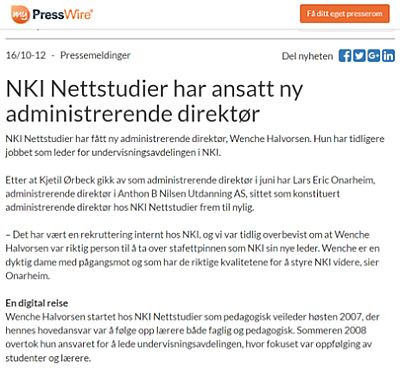 I was shocked in September. Looking at my colleagues in NKI’s large auditorium. Jaws dropped in disbelief around me when Lars Eric Onarheim, Chair of the NKI Board, announced the new CEO. How could they possibly choose Wenche Halvorsen? An unpopular colleague with little merit and trust. Loyal when convenient. Rumoured to change opinion whenever convenient and take credit for her colleagues’ work.
I was shocked in September. Looking at my colleagues in NKI’s large auditorium. Jaws dropped in disbelief around me when Lars Eric Onarheim, Chair of the NKI Board, announced the new CEO. How could they possibly choose Wenche Halvorsen? An unpopular colleague with little merit and trust. Loyal when convenient. Rumoured to change opinion whenever convenient and take credit for her colleagues’ work.
Onarheim’s pep talk faded out of my consciousness. Don McLean faded in. With his American Pie. On repeat: The Day the Music Died.
The Day the Music Died. The Day the Music Died. The Day the Music Died. The Day the Music Died.
EDEN on YouTube in Porto
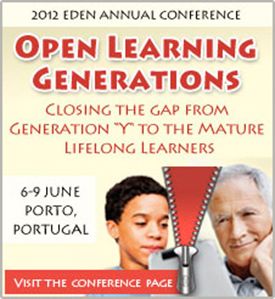 2012 was The European Year of Active Ageing and the Solidarity between Generations. EDEN therefore chose Open Learning Generations – Closing the Gap from Generation Y to the Mature Lifelong Learners as the theme for its 21st Annual Conference.
2012 was The European Year of Active Ageing and the Solidarity between Generations. EDEN therefore chose Open Learning Generations – Closing the Gap from Generation Y to the Mature Lifelong Learners as the theme for its 21st Annual Conference.
The conference started with the welcome reception in the Noble Hall of Alfandega Congress Center. During the reception, I had the pleasure of welcoming the delegates and handing over the diplomas to the new EDEN Fellows: Andrea Karpati, Lisa-Marie Blaschke, Michael Auer, Diana Andone, Laszlo Komaromi and Fabio Nascimbeni.
As EDEN president, I opened the conference with Pro-Rector Ligia Maria Ribeiro from the University of Porto. In the welcome address, I promoted the new NAP member’s Elgg platform to the 350 delegates from 43 countries. The best represented countries at the conference were Belgium (39), Portugal (28) and Norway (27). The number of presentations were 149 (82 papers, 43 posters, 12 workshops, 5 workshops with webinar and 7 demonstrations).
On June 7th, I chaired the Annual General Meeting and presented the president report. During the meeting I thanked the three retiring EC members Andrea Karpati, Tapio Koskinen and Gilly Salmon. And welcomed the three new EC members elected at the meeting: Lisa-Marie Blashcke, Grainne Conole and Fabio Nascimbieni.
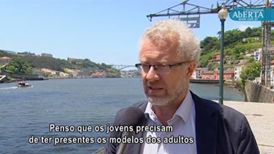 We had introduced an EDEN YouTube channel. So, Antonio Teixeira, Maria Joao, Eva Suba and Livia Turzo worked with a camera-team from Universidade Aberta to make a conference video and a series of video interviews at the conference. Among the interviewed people were Antonio Teixeira, Sally Reynolds and Gard Titlestad.
We had introduced an EDEN YouTube channel. So, Antonio Teixeira, Maria Joao, Eva Suba and Livia Turzo worked with a camera-team from Universidade Aberta to make a conference video and a series of video interviews at the conference. Among the interviewed people were Antonio Teixeira, Sally Reynolds and Gard Titlestad.
Eva Suba e-mailed us some questions in advance and below are the notes I made to prepare my YouTube interview:
Q: This year’s conference focuses on the digital divide among generations. What is your advice for university professors, decision-makers how to deal with the new generation of learners?
A: Digital technology can both divide and join generations. So, my advice is to join the new generation of learners in their exploration of new digital media. Young learners need adult role models that are present in digital media.
Face-book, Twitter, Instagram and Pinterest are potential arenas for grandparents to join children and grandchildren. I like the title of Ingeborg Bø’s presentation, which is: Grandma, may I use your iPad, please? Maybe university professors can learn more from YouTube videos made by students with mobile phones and iPads, than students learn from professorial video lectures?
Q: New learning paths developed around learning methodologies thanks to the speedy technological development. Where do you see the role of public and private educational institutions in learning settings in the future?
A: The differences between public and private institution may be blurring. Tuition fees in public institutions are increasing and the European economy force the institutions to be more cost effective. The technological development makes markets more competitive and international, but it can also facilitate more collaboration between public and private institution.
OER (Open Educational Resources) and PLEs (Personal Learning Environments) provide new opportunities and challenges for both public and private institutions. Students have free access to enormous online learning resources and competent people in their social networks. So far, however, they need to enrol in formal programs to get the certificates and diplomas that propel their career and the personal services that follow the tuition fees. The institutions need to find business models that work well in this open online educational environment. Institutions that succeed with this may excel in the future online education.
Q: What are you looking forward to and what is the most interesting feature of this conference?
A: I think social and professional networking is one of the most important parts of EDEN conferences. In addition, I’m excited about the Workshop hosted by e-learning Gurus Portugal. I have followed this Facebook group since it was started in 2009 and it now has over 1,500 members. I think that the e-learning communities in other countries my learn something from this.
As President of EDEN, it is always a pleasure to hand over the EDEN Fellow Awards. I also look forward to the announcement of the Best Research Paper Award at our conference dinner.
For me, one of the most interesting features of the conference is the increased use of social media. It enhances the conference experience by allowing EDEN friends who are not present in Porto to both follow and contribute to the conference experience. In the same way, people who are in Porto can share their impressions with the online community and enhance the impact of the conference with their online presence.
Flying WiFi to Rhodes and ICICTE 2012
On the way to Rhodes in July, I was reminded of our family holidays t the Greek Islands of Lefkada and Crete. The Lefkada detour to Skorpios. Known as the private island of the late Greek shipping billionaire Aristotle Onassis. The Crete excursion to Spinalonga. The leper colony island described in Victoria Hislop’s award winning novel. And the impressive archaeological site of Knossos.
The Norwegian Airline had installed Wi-Fi abord its newest airplanes. So, approaching Rhodes, I sent my first e-mail from the sky. To conference director Nancy Pyrini. Wrote that I was soon to arrive with my family. To attend the International Conference on Information Communication Technologies (ICICTE) between 5 and 7 July 2012 at the fashionable Rhodes Palace Hotel.
One hundred participants from more than thirty countries could choose between eighty presentations. The conference papers are available from the conference website. Russel Stannard gave an instructive keynote titled Feedback using Screen Capture in which he focused on his experiences with Jing and www.teachertrainingvideos.com.
It was nice to meet EDEN colleagues Airina Volungevičienė and Costas Tsolakidis at the conference. Airina’s paper was titled Measuring conscious use of open content in competence-based education. Costas was on the steering committee and arranged a memorable garden party at his house.
My keynote was titled Cooperative Freedom and Transparency in Online Education. Received a thank you piece of art by Marie Louise Kold and learned about Gorg Mallia’s artistry.
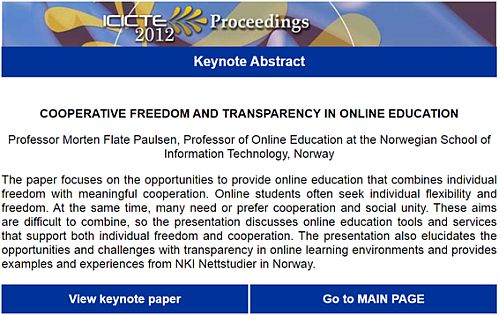
The first evening conference dinner was memorable. Security was strict, as we expected a special guest. And I had the pleasure of sitting next to him. Realised that he had lived in Sweden and understood quite a bit Norwegian. Talked about our kids and discussed several technology and education issues. Was really impressed by his broad overview and in-depth knowledge of our field.
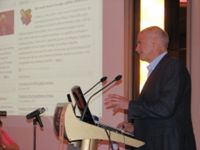 The next day, he used his Ipad actively for note taking during the conference. Before he as the recent Greek Prime Minister and current President of Socialist International was honoured with an ICICTE award for his contributions in the field of education. A video and the full text of George Papandreou’s conference speech is available at the conference website.
The next day, he used his Ipad actively for note taking during the conference. Before he as the recent Greek Prime Minister and current President of Socialist International was honoured with an ICICTE award for his contributions in the field of education. A video and the full text of George Papandreou’s conference speech is available at the conference website.
Was on the panel for the conference Graduate Student Award. The winner was Marcia J. P. Lindqvist from Umeå University in Sweden. Her paper was titled Teachers’ Expectations Regarding Possibilities and Challenges of Learning Practices and Processes in Two Schools in a 1:1 Computer Initiative.
Finally, Nancy Pyrini, George Sarrigeorgiou and their team topped the conference with an excellent social program. Including a boat trip to the beautiful village of Lindos. A guided tour in the old town of Rhodes. Finishing with a Greek dinner and dancing night.
My daughter is still embarrassed of my Greek dancing.
NooA in the sky with Moodle
Started to establish NooA. The Nordic open online Academy. As soon as my three-month notice period at NKI ended. Realized that life as an entrepreneur could be tough. Checked my bank account and found that it could survive without income for six months. If major investments were avoided. Six months to set up an online school, develop courses for sale, reach out to potential customers and generate some income.
Got a free start-up office at AskersHus. With access to other entrepreneurs and people working for the municipality. And publicity in the local newspaper Budstikka.
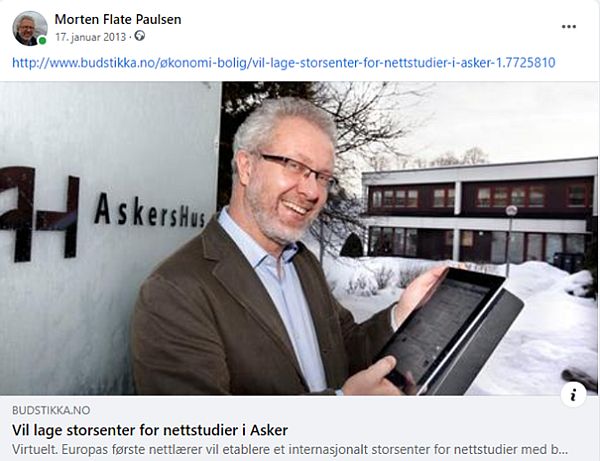
Managed to get NooA approved as an online school by Vox. The national agency that handled grant applications from the 23 approved schools with online courses. Just in time to apply for the annual grants. An application that secured NOK 400.000 for course development in 2013.
With the help of eFaktor, NooA soon had a Moodle platform in the sky. But it took more time to configure the system. Set up the tools and services the way I wanted. Based on my theory of cooperative freedom and transparency. To support continuous enrolment, individual pacing and electronic payment.
Needed partners to provide course content and services. Searched for Scandinavian institutions that could be interested in collaboration. Toured Denmark and Sweden by car in September. To meet people and institutions with online education and Moodle experiences. To learn from them and discuss potential cooperation.
Met interesting people at NetSapiensis, Aspero kompetens, Utbildning.se, Värmdö gymnasium, Åsö Vuxengymnasium, Upgrades and NTI-skolan in Sweden. Forfatterskole, Atwork, Phasos, Innowell and Roskilde University in Denmark.
Learned from the meetings. But found it difficult to establish real partnerships. However, in October we signed an agreement with Forfatterskole.dk. To offer their five writing courses in Norwegian and English.
Looking back, it is hard to understand that it took only six months for a small start-up to get an online school up and running. With the first test student in January 2013 and the first paying student in February. Both completing the first writing course NooA offered in collaboration with Forfatterskole.dk.
Moodle partner Efaktor
Alf Martin Johnsen started Efaktor in 2004. Building the company around his competence on online education and learning management systems. The company gradually specialised on Moodle services.
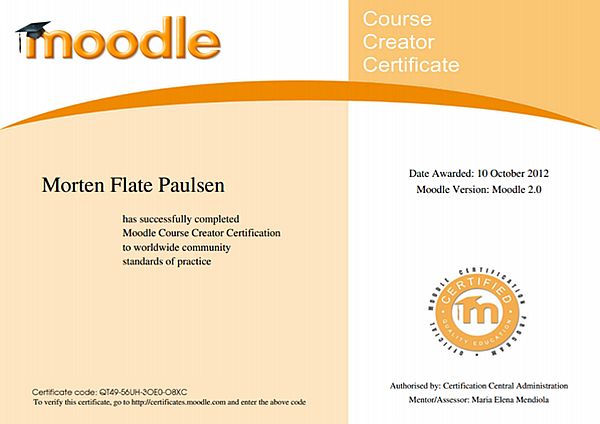
Alf Martin invited me to give a presentation about online education in a European perspective. At Efaktor’s national Moodle conference at Rica Hotel Gardermoen on May 8, 2012.
There, I argued that we both should enrol in an online course to become certified Moodle Course Creators. And found a suitable online course taught by Maryel Mendiola in Mexico. A course provided by HRDNZ (Human Resource Development International Limited) in New Zealand. As far from Norway as you can get. Another reminder of how global online education could be.
Useful to be an online student again. And unnerving to sit for the one-hour online quiz exam in the Moodle platform. But we both succeeded, and it felt good to receive the course certificates. Digital certificates that made me realize that NooA could save a lot of resources if it could be a school without paper.
I encouraged Alf Martin to get Efaktor certified as an official Moodle partner. Which he of course achieved later in the year. So, when I established NooA as a company, Efaktor was a trusted partner as I designed the first online courses and services in Moodle.
Nordic open educational resources (OER)

Paul Bacsich headed the Poerup project on Policies for OER Uptake. A project funded by the European Life Long Learning Program. I was engaged as a consultant for the project in the fall. To write status reports for open education resources in Norway, Denmark, Sweden and Finland. A challenging task that gave me useful insight in OER opportunities and challenges. Specific knowledge on how OER could be incorporated in NooA courses. And a special interest in the Norwegian Digital Learning Arena (NDL) as reported:
NDLA is a Norwegian “portal for OER in secondary education. It is a joint initiative between county councils in Norway that allocates a portion of state funds to ensure free access to textbooks for Norwegian students and to develop digital resources (or purchase from publishers or other producers. The project has produced a large amount of OER and there are many thousand resources available from the portal”.
The national broadcasting corporations stood out with valuable educational content. Following their long-time mission to inform and educate the public.
Found many noteworthy initiatives and interesting resources that had educational value. Few primarily made for educational purposes. Resources that could be difficult for educators to find and trust. Some good, but not updated. Others I expected could be ephemeral. Since they did not generate any income. Maybe dropped when the websites were updated.
Understood that publishing houses were not happy that free content made it harder to sell their textbooks. And that OER providers struggled to find the necessary funds to maintain the resources.
The 7th EDEN Research Workshop in Leuven
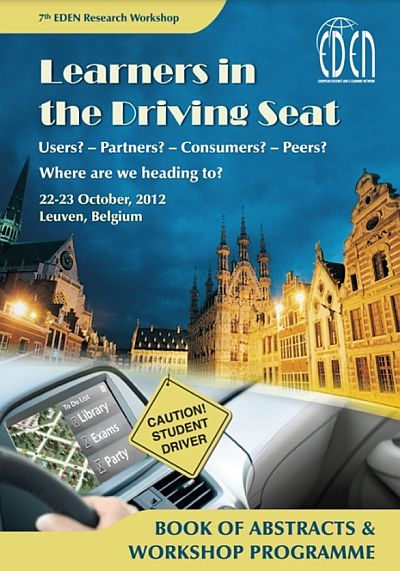 The 7th EDEN Research Workshop took place in Leuven, 22-23 October 2012.
The 7th EDEN Research Workshop took place in Leuven, 22-23 October 2012.
Reflected on how students pushed teachers and instructors to use new learning technologies. How students chose to establish their personal learning environments (PLE).
So, the workshop theme was Learners in the Driving Seat. Users? – Partners? – Consumers? – Peers? Where are we heading to?
Had about 100 participants from 24 countries. The best represented were Belgium (19), UK (11), Lithuania (5), Sweden (5) and Ireland (4). The number of presentations were 42.
The workshop was hosted at KU Leuven. Founded in 1425 and the oldest Catholic University in the world.
The welcome reception at the Gothic City Hall of Leuven. Located at the Market Square since 1439. There, I had the pleasure of honouring the new EDEN Fellows: Fabio Nascimbeni, Diana Andone, Laszlo Komaromi, Andrea Karpati, Lisa-Marie Blaschke and Michael Auer.
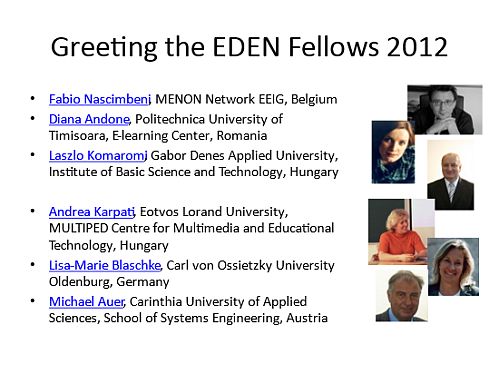 Maybe it was the historic setting, the social environment or some alluring remarks from Alan Bruce, Fabio Nascimbeni or Wim Van Petagem? I don’t know why, but I ended the evening by smoking the first and only cigar in my life.
Maybe it was the historic setting, the social environment or some alluring remarks from Alan Bruce, Fabio Nascimbeni or Wim Van Petagem? I don’t know why, but I ended the evening by smoking the first and only cigar in my life.
I led the opening plenary. Ludo Melis welcomed the participants to the university. Wim Van Petegem introduced the conference theme and Grainne Conole talked about Teaching as a Design Science: Innovations with Pedagogies and Technologies.
Deborah Arnold chaired the second plenary session. As Marianne Poumay asked the rhetorical question Students as Pilots… But Where is the Map? And Rok Primožič from the European Students’ Union (ESU) discussed Student-centred learning: fact, challenge or myth?
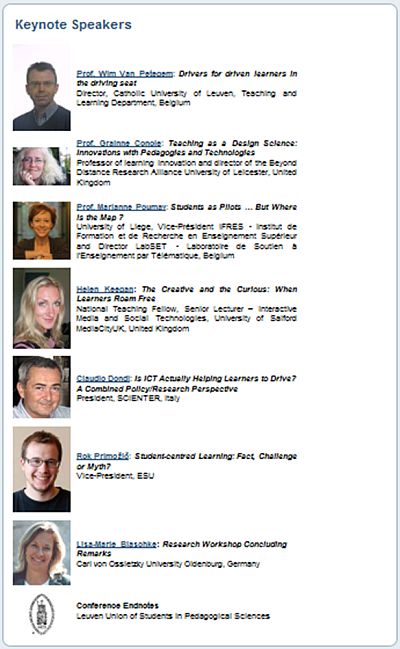 The third plenary session was chaired by Wim Van Petegem. Remember Helen Keegan’s PowerPoints as she presented The Creative and the Curious: When Learners Roam Free. And Claudio Dondi’s policy and research perspective on the question Is ICT Actually Helping Learners to Drive?
The third plenary session was chaired by Wim Van Petegem. Remember Helen Keegan’s PowerPoints as she presented The Creative and the Curious: When Learners Roam Free. And Claudio Dondi’s policy and research perspective on the question Is ICT Actually Helping Learners to Drive?
António Teixeira presided over the closing plenary. In which Lisa Marie Blaschke summed up the conference in her concluding remarks. Along with a representative of Leuven Union of Students in Pedagogical Sciences.
Interesting to interact with the on-campus students at the computer science department. And to attend the workshop on learning analytics. Chaired by Eric Duval. The influential blogger and friendly computer scientist who left us far too early in 2016.
The conference dinner was at the Infirmary Hall. In the Faculty Club with a history from the 13th century. There, Martine Vidal presented the Best Paper Award. To Iolanda Garcia from Universitat Oberta de Catalunya and Anna Escofet from the University of Barcelona. Their paper was titled Students’ Attitude towards ICT Learning Uses: A Comparison between Digital Learners in Blended and Virtual Universities.
Some online pictures recall fine moments from the conference. A conference that stands out because so many students contributed and took active part in the conference.
Some 2012 events
- May 6 – François Hollande was elected president of France.
- May 7 – Vladimir Putin was elected President of Russia for the second time. He was prime minister from 1999 to 2000 and from 2008 to 2012.
- July 15 –The K-pop hit Gangnam Style was released by South Korean rapper Psy. The song and music video went viral and influenced popular culture worldwide.
- July 27–August 12 – The Summer Olympics were held in London.
- November 6 –Barack Obama was re-elected President of the United States.
My 2012 publications
Morten Flate Paulsen and András Szűcs (eds) 2012. Book of abstracts. EDEN 2012 Annual Conference Alfândega do Porto Congress Center Porto, Portugal 6-9 June 2012.
Morten Flate Paulsen and András Szûcs (eds). 2012. Workshop programme & book of abstracts. The European Distance and E-Learning Network (EDEN) Conference proceedings. Leuven, Belgium.
Paulsen, MF. 2012. OER in Norway. An overview of open educational resources in Norway written for the Europen Poerup project. Published at http://poerup.referata.com/wiki/Norway
Paulsen, MF. 2012. OER in Denmark. An overview of open educational resources in Denmark written for the Europen Poerup project. Published at http://poerup.referata.com/wiki/Denmark
Paulsen, MF. 2012. OER in Sweden. An overview of open educational resources in Sweden written for the Europen Poerup project. Published at http://poerup.referata.com/wiki/Sweden
Paulsen, MF. 2012. OER in Finland. An overview of open educational resources in Finland written for the Europen Poerup project. Published at http://poerup.referata.com/wiki/Finland
My 2012 presentations
Portugal
Welcome to EDEN’s 21st Annual Conference. A 10-minutes presentation in Porto. 07.06.12.
President’s report at the EDEN Annual General Meeting in Porto. 07.06.12.
Greece
Cooperative Freedom and Transparency in Online Education. A keynote presentation at ICICTE 2012, Rhodes, Greece 05.07.2012
Canada
Quality schemes in cooperative learning environments. A keynote presentation at the International Scientific Conference on ICT and Education Montreal, May 2012
Norway
The European Scene. A presentation at a seminar organized by the International Council for Distance Education (ICDE) and the Norwegian Association of Higher Education Institutions (UHR), in cooperation with Norway Opening Universities (NOU). Oslo, February 27-28, 2012
Nettbasert utdanning i et europeisk perspektiv. Moodlekonferanse 8. mai 2012, Rica Hotel Gardermoen
2013 Surviving as entrepreneur
Transparent locker room talks
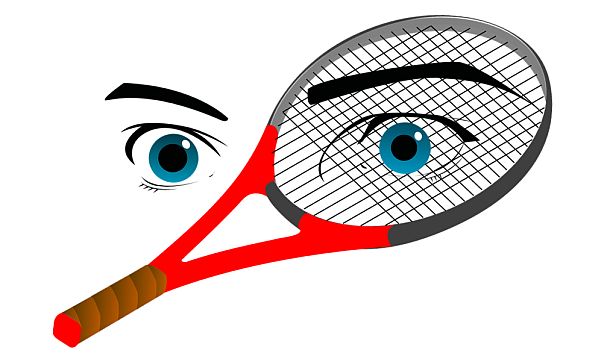 Anders. My childhood friend. Tougher than me. As we discovered table tennis, beer and girls. Invited his friends to play squash and drink snaps. Or vice versa. At his thirtieth anniversary. Starting more than three decades of weekly squash encounters. And personal updates. Too often intercepted by travels.
Anders. My childhood friend. Tougher than me. As we discovered table tennis, beer and girls. Invited his friends to play squash and drink snaps. Or vice versa. At his thirtieth anniversary. Starting more than three decades of weekly squash encounters. And personal updates. Too often intercepted by travels.
In January 2013 we talked about Obama starting his second term as US President. My EDEN executive meeting in Brussels. And my NooA meetings in Copenhagen and Helsingborg. Had several therapeutic talks of my NKI successes and frustrations. NooA ambitions and challenges. Chats about news, music and literature. Last week’s events, kids and grandchildren. Maybe not transparent enough about my inner life. Anyway, a friendship well worth too frequent loses on the squash court.
Struggled with transparency. How much is too much? Professionally and privately? As I followed the controversy around My Struggle. The international bestselling series of six autobiographical novels. By Norwegian author Karl Ove Knausgård. Controversial because he exposed so much about his friends and family.
At the cursor moment, I still promote transparency in online education. But continue to struggle with transparency. With and without consent. And how much private life should we share with friends, social media and autobiographies?
Sander and Bestus
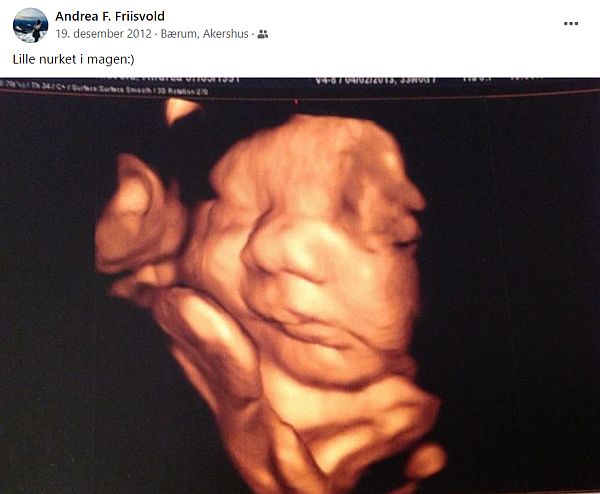 Sander August arrived in February. My firstborn grandson. A digital citizen, born into a global society connected by smart phones and social media. Introduced to the world with a digital photo on Facebook before he was born.
Sander August arrived in February. My firstborn grandson. A digital citizen, born into a global society connected by smart phones and social media. Introduced to the world with a digital photo on Facebook before he was born.
One of 5 051 275 citizens in Norway. Who could claim that their individual market share of the Norwegian Government Pension Fund was NOK 997 569. More than a professor’s yearly salary. Accumulated after Norway discovered oil in the North Sea.
An increasingly wealthier population that had grown from 4 175 521 when my first son was born. And 3 475 890 when I was born. Up 45 % in two generations.
Thought Sander was lucky to live in a country ranked as the world’s best to live in. Every year of the millennium. By the United Nations Development Program. According to the Human Development Index. Predicting his life expectancy to 81.7 years. And school expectancy to 17.7. A strange concept in a time of lifelong and flexible learning.
Made me think of my fortunate life and the massive developments in my lifetime. The globalization, incredible technological progress and unbelievable growth in prosperity. But also, the challenges we face. Global warming, environmental crises, unjust differences in wealth, migration and unpredictable development of technology.
So nice to have him in the neighbourhood. Close to his proud grandparents Nonno and Bestus.
Digressed to the cursor moment by a picture of Gagan Chhabra in Aftenposten. A becoming father who held a 3D-print of his prenatal son in his arms. A fine Christmas present for a blind man.
From STEAM to e-Train
Riga, 23 – 25 September 2013. My first visit to Latvia and the first project meeting in the STEAM project. Acronym for Staff Training in E-learning Administration and Management. A one-year project with a 39.000 EUR grant from the NordPlus Adult program.
Not a lot of money per partner. But as usual, I wanted to join international projects aligned with NooA’s strategy. Knew that they often result in useful products, experiences and friendships. Acknowledged that these grants instigate better relations between people and nations. Hoped for further collaboration on e-learning across the borders.
NooA’s partners were DOF Lillebælt in Denmark. Represented by Rune Riismøller, Børge Jensen and Adam Bindslev. Sarmīte Pīlāte from the Latvian Adult Education Association. Since few evening schools and course providers knew how to provide e-learning, our aim was to help them implement and administrate e-learning courses. Our project communication is still available in a Google group.
The main outcome of the project was the course E-train: e-learning in organizations. A course hosted in NooA’s Moodle platform. A capability that made NooA an attractive partner in several international projects.
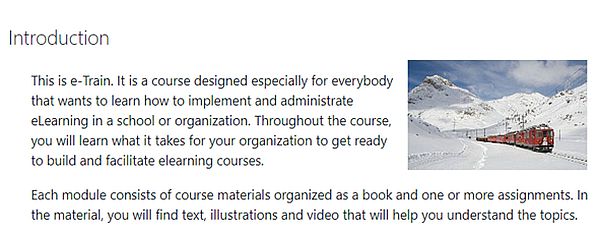
The screen shot shows the introduction to the e-Train course which had eight modules:
- School strategy and e-learning
- E-learning models
- Teachers and course materials
- Marketing of e-learning and blended courses
- Cost effectiveness
- Introduction to learning management systems
- Administration in Moodle
- Implementation and integration
Included was a video interview which explained my NooA experiences and thoughts. Still available at https://youtu.be/0qjtZulekF0
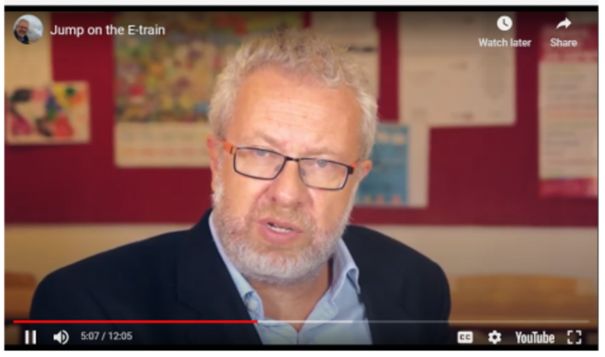
The second project meeting was organized January 22, 2014. Located at the Oslo offices provided by our colleagues at Studieforbundet Næring og Samfunn. The meeting started and ended with further discussions on the overnight ferry boat. Between Copenhagen and Oslo.
The third meeting was June 2, 2014. In Copenhagen. Discussed the pilot testing of e-Train with 20 participants from Denmark, Norway and Latvia. The potential of delivering NooA courses in Denmark with the help of the Danes. And Danish courses through NooA.
The hospital Danes even invited us to Planteskolerock. At Guldbjerg Planteskole in August 2014. A private rock festival at a rural horticulture centre. A reunion of adults who played together in rock bands as teenagers. Inviting friends and families to drink beer and eat Danish hot dogs as they listen to old rock music.
Fell asleep with a smile. In the luxurious and compact caravan provided by our Danish partner. As I agreed with the iconic travel commercial: It’s nice to be Norwegian in Denmark.
The 22nd EDEN annual conference in Oslo
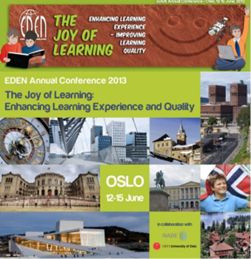 My last conference as EDEN President. Appropriately hosted in my hometown Oslo from June 12 to 15, 2013. A nice opportunity to introduce more Norwegians to EDEN. And Norwegian initiatives to the EDEN community.
My last conference as EDEN President. Appropriately hosted in my hometown Oslo from June 12 to 15, 2013. A nice opportunity to introduce more Norwegians to EDEN. And Norwegian initiatives to the EDEN community.
Organized with the Norwegian Association for Distance Education (FuN) at the University of Oslo. With a lot of work by Torhild Slåtto, Petter Kjendlie, Ebba Køber and Kari Olstad.
The conference theme was The Joy of Learning – Enhancing Learning Experience and Quality. 88 paper presentations, 16 workshops, 38 poster presentations and 12 demos.
376 participants from 45 countries. Best represented were Norway (near 90), UK (33), Belgium (28), Sweden (19) and Spain (17). In addition to the many European participants, there were delegates from Australia, Brazil, Canada, Colombia, Ecuador, Israel, Japan, Mexico, Namibia, New Zealand, Oman, Russia, Singapore, South Africa, South Korea and the USA.
The welcome reception was located at the University’s new library building. Greeted the delegates with the familiar Dear colleagues and friends of EDEN. Presented the Senior Fellow Award to Sofoklis Sotiriou. Fellow Awards to Ilse Op de Beeck, Bill McNeill, Ari-Matti Auvinen, Thomas Kretschmer, Grainne Conole and Sonia Hetzner.
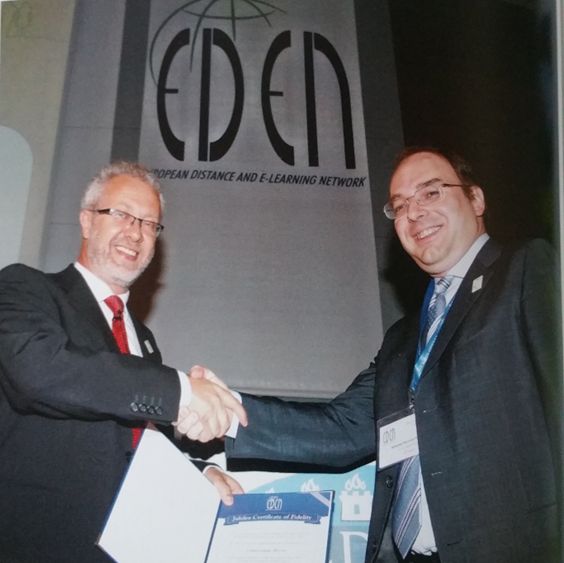 Then incoming EDEN president Antonio Teixera surprised me. Announced that I was included in the exclusive group of twelve EDEN Senior Fellows. An unexpected emotional moment when he read the laudation:
Then incoming EDEN president Antonio Teixera surprised me. Announced that I was included in the exclusive group of twelve EDEN Senior Fellows. An unexpected emotional moment when he read the laudation:
Morten Flate Paulsen – our dear Morten – is one of the most distinguished researchers and practitioners in online learning. Having been one of the pioneers, he has made an extensive and remarkable contribution to the field with such great achievements as the seminal theory of cooperative freedom and transparency in online education and his work at establishing the NKI Internet College and more recently the Nordic open online Academy – NooA.
Morten’s contribution to EDEN has also been extensive and significant. He was an EC member, a regional editor of Eurodl, a Vice-president and also an inspirational President in a time of great challenges for the organization.
Chairing the opening session, I gave a traditional welcome address. Followed by Pro-Rector Inga Bostad from the University of Oslo and Kristin Halvorsen, Norwegian Minister of Education and Research.
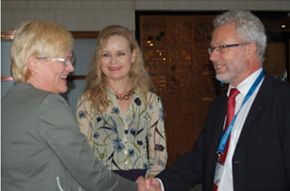 Alastair Creelman wrote in the conference blog: Norway’s education minister Kristin Halvorsen opened up the conference by stressing the promise and potential of technology in education. She ticked nearly all the boxes the EDEN delegates are concerned with; the advantages of openness in education (OER and open access), the potential of MOOCs, the flipped classroom and the need for professional development for teachers.
Alastair Creelman wrote in the conference blog: Norway’s education minister Kristin Halvorsen opened up the conference by stressing the promise and potential of technology in education. She ticked nearly all the boxes the EDEN delegates are concerned with; the advantages of openness in education (OER and open access), the potential of MOOCs, the flipped classroom and the need for professional development for teachers.
The main contributors to the conference blog were Steve Wheeler, Alastair Creelman and Helen Hughes. All the photos by Eva Szalma and Eva Suba help me revive the many special moments and encounters with good people during the busy program. And the conference dinner at the Oslo Military Society Conference Centre.
I introduced the keynotes by Anne Kirah. And Patrick Blessinger who I later signed a strategic partnership with. Between EDEN and HETL – The International Higher Education Teaching and Learning Association.
Steve Wheeler chaired the keynote session with Sir Ken Robinson and Sugata Mitra. Summed it up in his blog post Standing on the shoulders of giants:
… two of the greatest education celebrities of our time. In the room with me was Sugata Mitra, famed for his ‘Hole in the Wall’ computer projects, child driven education, and also more recently for his work around ‘minimally invasive education’ and the School in the Cloud. Just before the conference, it had been announced that he had won the prestigious TED prize of one million US dollars for his innovative research into learning. Sharing the keynote session with him, on a live link from California, was education guru Sir Ken Robinson, celebrated for his TED talks and his unique perspectives on creativity and learning. His TED searing critique of the education system entitled ‘How Schools Kill Creativity’ has alone received over 20 million views.
Both were featured in the special English conference issue of Synkron.
My last executive meeting was special. As I received the 27-page hardcover memory book from the EDEN executive committee. Titled Our Friend, the President. With many nice pictures from my presidency. And personal greetings from dear colleagues and friends. So, THANK YOU Airina, Costas, Deborah, Fabio, Ene, Ama, Wim, Alan, Lisa, Antonio, Andras and Ana.
Proving NooA’s viability
My main mission in 2013 was to demonstrate that NooA was viable. Started to receive a few promising e-mails from PayPal. Stating that money was paid to NooA’s account. The first arrived in February. Immediately after Kristin Manger Lindner made her first online enrolment.
Motivated by the fact that Kristin successfully completed all five writing courses. Followed by more students who proved that we could operate an online school in the cloud. With low costs. Some income and satisfied students.
So, the challenge was basically to find a sustainable financial model, provide more courses and get enough people to enrol. Establish NooA as a platform for a two-sided online education market. Where students and course providers could convene. And NooA provide marketing, student support, pedagogical advice and administrative services.
The financial model was simple and sound. NooA paid nothing (except hard work) for course development. Continuous enrolment provided some income every month. Students had to pay the full course fee to NooA before they could access a course. NooA later paid a part of the fee to the teacher and the course provider. A model which secured liquidity. Since the course income came before the course costs. And was always larger than the course costs.
So easy and soooooooo much work. Because it needed many courses and lots of course enrolments to be profitable.
Launched www.nooa.no to market our courses and investigated social media for further marketing. Established NooA accounts on Facebook, LinkedIn, Twitter, Issuu, Slideshare, YouTube and Instagram. Affordable media channels to promote online courses. Interesting to learn more about, but much work to develop meaningful posts for potential customers.
On March 1st, we got welcome news from Vox – the Norwegian Agency for Lifelong Learning. Granting NOK 400.000 to develop more online courses and services. Made it possible to launch NooA’s secondary school courses with the help of enthusiastic teachers around Norway. Tourism courses with a Norwegian partner in Thailand. And Spanish for adopting parents in partnership with the Norwegian agency Adopsjonsforum.
Used Spanish for adopting parents as an interesting example of our flexible online courses. Since four countries in South America required that adopting parents should be able to speak Spanish with their kids. These becoming parents lived all around Norway and often waited in long adoption queues for several countries. For example, India, China and Colombia. If they got an offer to adopt a child from one of the Spanish speaking countries, they wanted to attend a suitable Spanish course as soon as possible. And continue to study both in South America and when they returned home.
But traditional Spanish courses taught people how to book a hotel, rent a car and order at a restaurant. Not to comfort a kid, explain how to use a toothbrush or tell bedtime stories. Hence, Adopsjonsforum developed a Spanish course with focus on how parents should speak Spanish with kids. A course they offered two times a year. As evening classes in Oslo.
A course that obviously needed a more flexible approach. An online course we developed and offered successfully for several years. Until virtually no more kids were adopted from the actual countries.
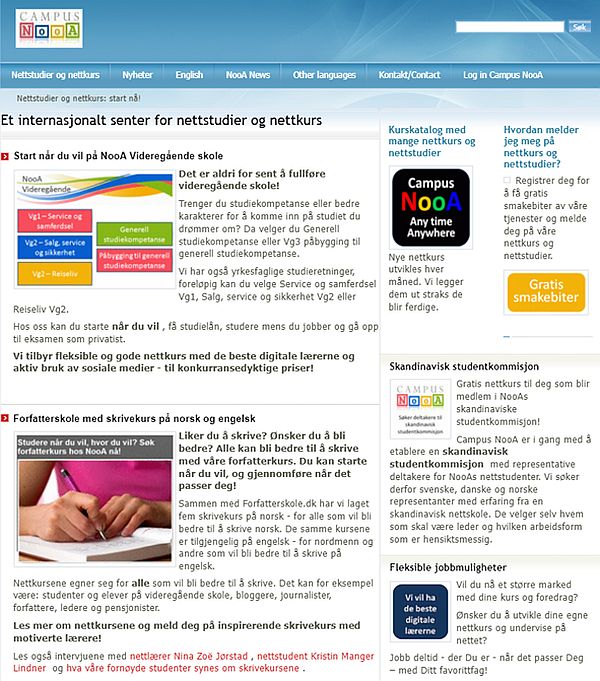
Screenshot of www.nooa.no in 2013.
Merger mania
The VOX grant provided enough income for me to survive as an entrepreneur. But not much financial security. So, I was grateful that Nina Tvenge and Fred Johnsen wanted me as professor II (a 20 % part-time position) at Gjøvik University College (HiG) for the schoolyear starting in the fall 2012. A public university College with 2700 students on campus. Within health and social work, technology, economics and business administration, information technology and media.
Used the Moodle platform in some courses. Was impressed by the e-learning course they developed to teach nurses to calculate correct dozes of medication.
My short, part-time engagement did not make much impact. Maybe because the Moodle courses were discontinued, and online education was not prioritized as much as we hoped. But it was interesting to experience a public university college as an employee. Observe the ICT-systems, financial security, the available resources and the bureaucracy. Compared it with my experiences from private schools. Missed the focus, enthusiasm and agility I knew from NKI’s successful years.
In September 2013 I signed a contract with Sør-Trøndelag University College (HiST). To work as professor II for the Faculty of Informatics and e-Learning (AITel). To teach e-learning at the master programme in ICT-based cooperation.
A position I kept to 2019. In a professional, creative and social environment that meant a lot to me. With several scholars I had known for years. Thorleif Hjeltnes, Geir Maribu, Per Borgersen, Olav Skundberg and Svend Andreas Horgen. Primarily through their involvement with the TISIP foundation that offered ICT courses online and published quality textbooks.
New colleagues and interesting lunch conversations. Discussed the merger wave hitting municipalities and countys. Police districts, hospitals and district courts. Felt the uncertainty, frustration and changes that followed the wave of mergers in the Norwegian education sector.
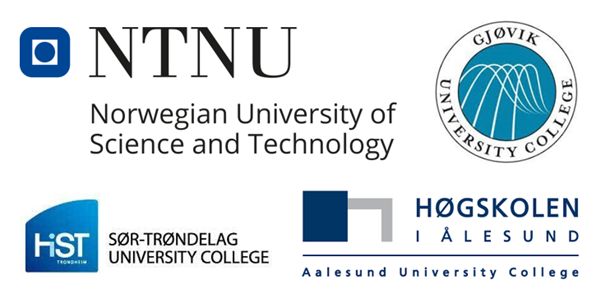
As Gjøvik University College, Sør-Trøndelag University College and Aalesund University College were in a merger process with the Norwegian University of Science and Technology (NTNU). Officially announced in January 2016. A national giant counting 46 000 students and employees. Making me a professor at the university I graduated from in 1980. As described in my very first anecdote in this chronicle.
Just one of many mergers in the Norwegian public university sector. Several more acquisitions and mergers in the private sector. As national funding, regulations and quality schemes made it difficult for smaller schools to survive as independent institutions.
Prompting mergers with larger private institutions with a tradition for on-campus teaching. Such as ABNU, Sonans and Kristiania University College. Mergers that probably reduced diversity, initiative, innovation and flexibility in online education.
eCademy mergers
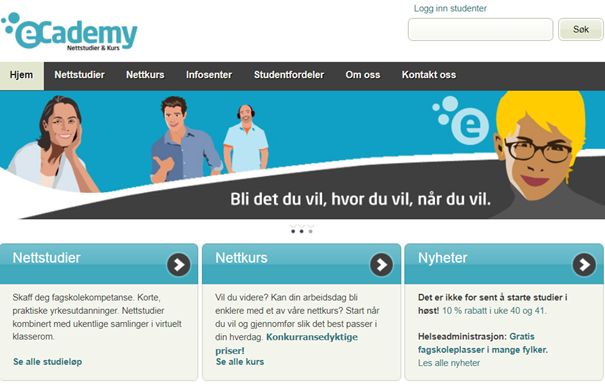
Screenshot of eCademy’s homepage 22.08.13
Many of my former colleagues had left NKI. Four started working for eCademy. A private, online vocational school started by Knut Erik Beyer-Arnesen and Eigil Norén. Which followed my example and chose Moodle as its learning portal. In addition, it pioneered weekly webinars in all courses. Using the evolving Microsoft products Lync, Skype for Business and Teams.
A model that combined asynchronous flexibility in Moodle with synchronous webinar sessions. Specialized for online education. With no need for compromises or concessions to support face-to-face students.
Successful with high completion rates. But challenging to administer several parallel webinars every evening. Totalling more than one thousand webinars per year. Really tough when there were technical problems or teachers didn’t show up. Made me realize that it is stressful to be responsible for synchronous online education. Especially after ordinary work hours.
eCademy was another successful school that suffered by acquisitions. Prompted by NOKUT’s national quality schemes that favoured larger traditional schools. So, eCademy was first acquired by Sonans, Two years later by Kristiania University College. Larger institutions with many students on campus. Mother companies that wanted more online programs and students. That required eCademy to adapt to their LMS, ICT-systems, working hours and strategies. So, eCademy lost its uniqueness, brand, specialists and entrepreneurial enthusiasm.
A fate it shared with many private and public institutions. In a decade with much focus on mergers and large-scale advantages.
So, is bigger better? And what about large scale disadvantages?
Preserving online history
September 5th, Wenche Halvorsen sent an e-mail. Asking me to delete Nettskoleavisen from http://nettskoleavisen.blogspot.com/ Twenty-nine issues describing eleven years of NKI’s innovations, developments and successes.
Responded that it documented important development of online education from 1998 to 2009. That the content had historic value for the entire field. Suggested to change the header so that it was even clearer that it was historic material. To include a page where she could present NKI’s view on the content.
This resulted in an unpleasant exchange of formal communication with an NKI lawyer. Leading me to wonder if they also wanted me to delete hundreds of online books, reports, articles and papers I had written about experiences in my beloved NKI.
Glad I took legal advice from my friends and withstood the pressure.
Still worried about the destiny of all online journals I’ve been involved with. Those that accepted my articles. Those I started and edited: DEOS – the distance education online symposium. NorWaves. Nettskoleavisen. Those I served on the editorial board: IRRODL. EURODL. Seminar.net. The Asian Journal of Distance Education.
Examples of ephemeral journals? Archived in servers relying on enthusiasts, backing institutions, evolving technology and financial support?
Wonder if the history, research, findings and experiences in these online journals will be available in coming decades? Will online education association such as ICDE, EDEN, EADTU and EADL have the will and resources to preserve its online history? Will search engines, artificial intelligence and future practitioners have access to the vast – but vulnerable – amount of experience in these resources?
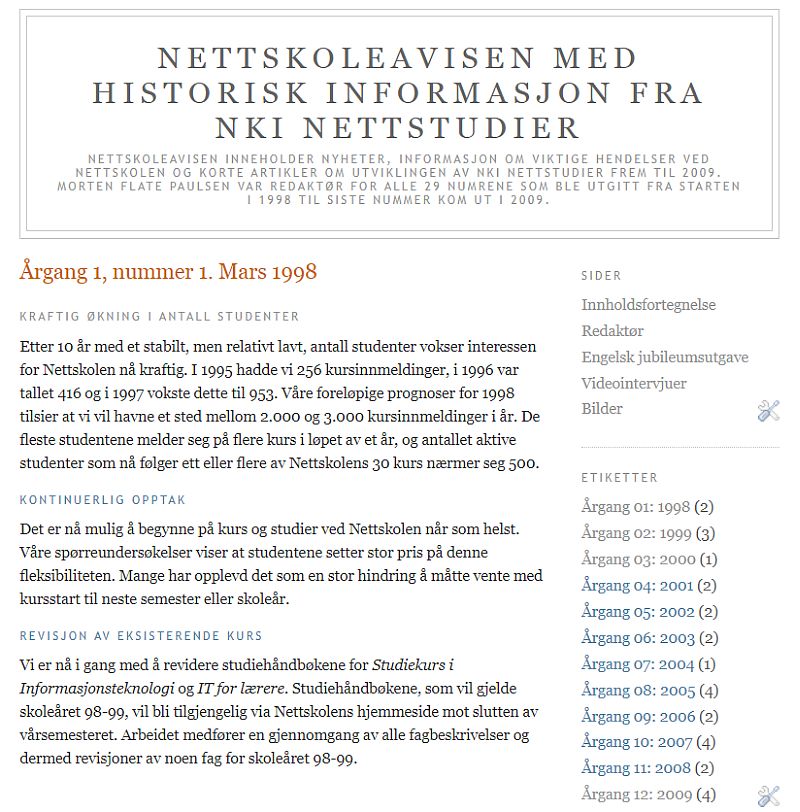
SCOP back to Lisbon
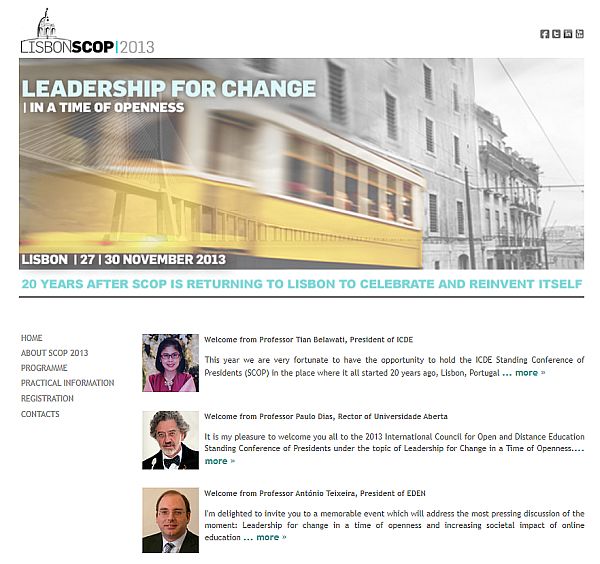
Found it appropriate to check in to hotel Estoril EDEN. To attend the Presidents’ summit in Lisbon. Glad our efforts had resulted in closer connections between ICDE and EDEN. One tangible result was that EDEN substituted its biannual open classroom conference with the joint president’s summit.
So, the Presidents’ Summit 2013 was hosted by Universidade Aberta at the Communications Museum in Lisbon from 27-30 November. As part of the university’s 25th anniversary celebrations. Organized in collaboration with EDEN and ICDE. The overarching theme was Leadership for Change in a Time of Openness.
It was ICDE twentieth Standing Conference of Presidents (SCOP) since Universidade Aberta hosted the very first in 1993. Summits allowing Rectors, Presidents and CEOs of open universities and distance education institutions to share experiences. And influence the global education agenda. High level and prestigious meetings. Initially staged by the impressive honorary committee for the second SCOP Summit in 1994:
- Gro Harlem Bruntland, Prime Minister of Norway
- Jacques Delores, President of the European Union
- Nelson Mandela, President of the Republic of South Africa
- Frederico Mayor, Director General of UNESCO
- Mario Soares, President of Portugal
- Antonio Ruberti, Commissioner for Science, Research and Development of the EU.
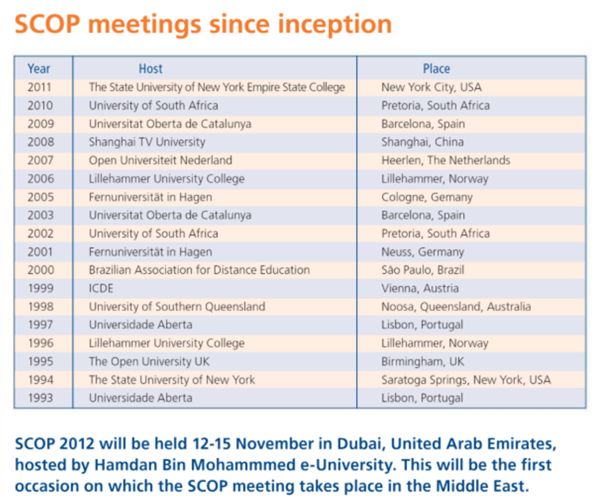
Source: The ICDE Membership Pack 2011 at https://issuu.com/icde/docs
We were welcomed by UAb rector Paulo Dias, ICDE President Tian Belawati and EDEN President António Teixeira. Among the prominent speakers and session chairs were Alan Tait, Tony Bates and António Teixeira. Along with Mandla S. Makhanya, Belinda Tynan and Tian Belawati. ICDE celebrities I met for the first time. People I had no idea would soon become so important for me.
The social program included a reception at the Lisbon Town Hall as well as tours to the Fado Museum and Sintra. And a group picture including many good friends and familiar faces.
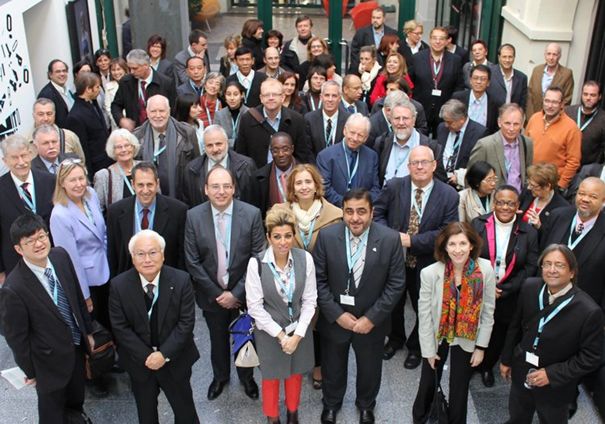
I’m hiding behind Rory McGreal and Tony Bates. Among the people in the foreground are Fred Nickolmann, Ingeborg Bø, António Teixeira, Maxim Jean-Louis, Alan Bruce, Torhild Slåtto, and Mandla Makhanya. Further back Lina Morgado, Maria J. Spilker, Debora Arnold, Lisa Marie Blaschke and Costas Tsolakidis.
One noteworthy outcome from the summit was The ICDE Policy Forum 2013 report. Titled Directions and Challenges for government and institutions when post-secondary tertiary education moves into the MOOC territory: public policies and institutional strategies in the digital learning age.
Still proud the report was authored by my Aberta students: Angelina Costa, Cecília Tomás, Maria J. Spilker, Paula Cardoso, Paula Silva and Sandra Brás.
Flying high in Marrakesh
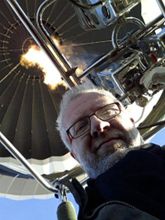 Got up early on New Year’s Eve. As the sun painted valleys and hillsides in the desert near Marrakech in gold, orange and pink. Had a magnificent view to the Atlas Mountains. From a hot-air balloon that drifted through the dawn.
Got up early on New Year’s Eve. As the sun painted valleys and hillsides in the desert near Marrakech in gold, orange and pink. Had a magnificent view to the Atlas Mountains. From a hot-air balloon that drifted through the dawn.
Remember riding camels and motorcycle in the desert near Agadir as a young man. 25 years later, I preferred Berber breakfast and Moroccan massage. Enjoyed the world-famous Jemaa el-Fnaa square. Filled with snake charmers, acrobats, musicians and various entertainers in medieval clothing. The densely packed, walled medieval medina with maze-like alleys. And thriving souks for traditional textiles, pottery and jewellery.
My thoughts flew with the balloon. A good opportunity to ponder on the year that had passed. Looked for my online school in the cloud. Since the mobile headquarter now was in Morocco. Lingered with my first grandson. Mused about the high school kid who often played chess in NKI’s lunchroom. Grandmaster Magnus Carlsen who just conquered Vishy Anand in the World Chess Championship in Chennai. Struggled to comprehend the consequences of transparency, big data and WikiLeaks as Edward Snowden was seeking asylum in Russia. Realized again that creative thinking often happens out of office.
Some 2013 events
- January 20 – Barack Obama was sworn in for a second term as President of the US.
- March 13 – Cardinal Jorge Mario Bergoglio of Argentina was elected the 266th pope and took the name Francis. The first Jesuit pope and the first from the Southern Hemisphere.
- April 15 – Two bombs at the Boston Marathon killed 3 and injuring 264.
- June 6 – Edward Snowden disclosed information about U.S. government mass surveillance program to news publications. Fled the country and was granted asylum in Russia.
- October 16 – Erna Solberg took over as prime minister in Norway replacing Jens Stoltenberg.
- November 22 – Norwegian chess icon Magnus Carlsen won the world championship
My 2013 publications
Morten Flate Paulsen and András Szűcs (eds) 2013. Proceedings EDEN 2013 Annual Conference. The Joy of Learning. Enhancing Learning Experience Improving Learning Quality University of Oslo, Norway 12-15 June.
M.F. Paulsen 2013. Tools and Instruments Supporting Cooperative Freedom in Virtual Learning Environments. Distance and E-learning in Transition. John Wiley & Sons. Page 721-744.
My 2013 presentations
Cooperative Freedom and Transparency in Moodle. A 30-minutes presentation at Gjøvik University College. 03.04.13.
Welcome to EDEN’s 22nd Annual Conference. Oslo, 12.06.13
Utvikling av nettstudier og nettkurs ved Campus NooA. Juli 2013.
2014 Reflecting MOOCs
Courting NKI
I still had good friends at NKI. Heard about harassment, dissatisfaction and high turnover. And vicious interrogations of many employees that were alleged of disloyalty. Aftenposten (22.04.14, page 10) confirmed that NKI suspected that some employees planned to start competing activities. So, they engaged one of Norway’s most experienced investigators to interview employees and examine their PCs and email. As a result, NKI took both employees and a competing online school to court.
Aftenposten followed up with an article (07.05.13, page 10) stating that NKI lost the case on all accounts and had to pay NOK 697 000 to cover the costs of the trial. In addition, NKI had to pay NOK 2 million to BDO consultants for investigation of NKI employees and for legal service to the Haavind law firm.
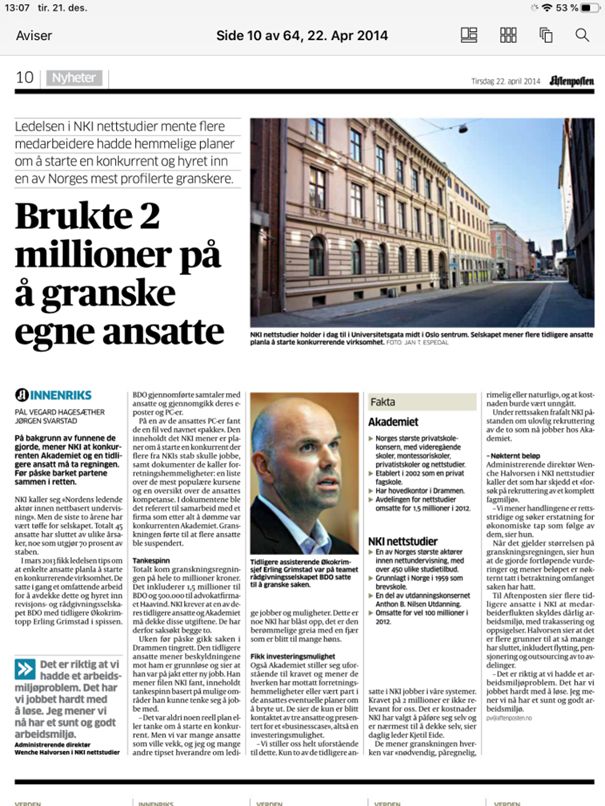
Atlantic crossing with Google Maps
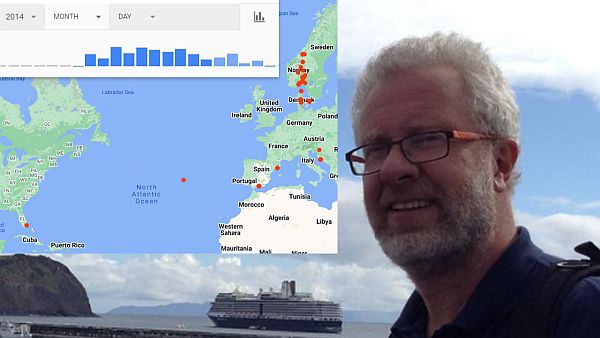 Flew to Miam April 1st. The first international travel recorded on my Google Maps timeline. Spent some days at Miami Beach and enjoyed a one-day excursion to the Everglades. Rode an airboat and saw some lazy alligators.
Flew to Miam April 1st. The first international travel recorded on my Google Maps timeline. Spent some days at Miami Beach and enjoyed a one-day excursion to the Everglades. Rode an airboat and saw some lazy alligators.
Boarded Nieuw Amsterdam to cross the Atlantic. In a comfortable cabin with a nice balcony. Front row to the ocean and the stars. A vantage point to reflect on time and space.
Taught about the Emigrants (Utvandrarna). The Swedish 1971 film starring Max von Sydow and Liv Ullmann. Based on Vilhelm Moberg’s series of novels about Swedes who emigrated to America in the 19th century. The hardship they experienced across the Atlantic.
Compared with our luxurious cruise. With delicious food, good wine, varied entertainment and work out opportunities. My only worry was that it costed a fortune to go onto the Internet. Proved though, that it was possible to operate an online school as we crossed the Atlantic.
Google Maps picked me up again on April 13. When we spent some hours in the town of Horta. Talked about all the Norwegian sailboats that had visited the Azores. In a bar with Internet access.
Continued the good voyage life for several days without any sight of land. Watched the waves and started to understand the fascination of slow TV. Ordinary events broadcasted in its entirety, live and non-stop. The fascinating and ridiculed Norwegian TV phenomenon that started when the Norwegian Broadcasting Corporation (NRK) in 2009 aired Bergensbanen minute by minute. The train journey which depicted the 7-hour train journey from Bergen to Oslo. And in 2011 followed up with Hurtigruten minute by minute. The 134-hour coastal voyage with MS Nordnorge from Bergen to Kirkenes.
Maybe our busy online worlds need some slow TV detox?
The cruise continued with tourist stops in Gibraltar and Palma de Mallorca. Before we flew home from Barcelona on April 20.
The Kragerø Open Online Education Declaration

We gathered around the bonfire in the bright Norwegian summer night. Fourteen Nordic educators and subject experts joining a NooA workshop from May 28 to June 1, 2014. At the Hasselholmen islet close to Kragerø.
Among the social highlights were Astrid’s boat trips and seafood lunch. Bjørn’s diversity icebreaker. Ebba’s morning yoga sessions. Runes rowing expedition. Kristin’s flora presentation. Katrine’s video sessions. Edgar’s LinkedIn advice. And Jørn’s bass songs.
One outcome was the Kragerø declaration. Including 23 statements conceived and discussed at the islet. Refined through a Delphi process and endorsed by all workshop participants:
We strongly believe that the current open education values and practice will improve, innovate and even revolutionize learning and education worldwide. In many cases, it can be more flexible, economical and open than traditional education. Online learning and education can potentially emulate all educational activities in schools and colleges, not only single courses as the MOOCs do.
We urge politicians, bureaucrats, managers, researchers, course designers, teachers and students to develop, promote and support quality online learning and education, because it:
- provides new opportunities to include people with disabilities, social anxieties and negative experiences from previous education
- should be environmental and economically sustainable
- fosters innovation and cooperation since it brings together people from a broad range of subject fields, countries, cultures and types of institutions
- provides opportunities for people with work and family responsibilities
- helps more people enjoy learning
- is available any time (24/7/365) anywhere
- is central in the open education movement which supports MOOCs, Open Educational Resources, Open Badges and transparency
- is potentially the most cost-effective way to reach out and provide learning to large groups of people
- can be social, interactive and facilitate networking
- can be current and up to date since digital learning resources can be more frequently updated than printed resources
- supports cooperative learning with individual start-up and pacing which is good for people who find it difficult or inconvenient to follow the schools’ semester- and timetables
- fosters internationalization and increased diversity
- supports democratic values and humanitarian actions
- is more agile and scalable to suit 21st century demands
- focuses on people, enhanced by technology, it can demonstrate that technology can be our servant, not our master
- fosters what Germans call «Bildung» and Scandinavians “Dannelse”
- is flexible with regard to for example time, space and path
- is available via mobile devices
- benefits the next generation of learners worldwide
- facilitates blended learning and flipped/scrambled classrooms
- can be used for efficient educational administration, and a wide range of student support services
- is used to teach almost everything
- supports both humour and friendliness
The statements that received most votes are at the top. We realize that some of the statements can be grouped together, and we welcome comments and discussion that could result in further refinement of the declaration.
In alphabetical order: Per Olav Apalnes, Astrid de Mora, Bjørn Z. Ekelund, Anne Fox, Katrine Gjærum, Fred Johansen, Nina Zoë Jørstad, Jørn Bue Olsen, Ebba Ossiannilsson, Morten Flate Paulsen, Rune Riismøller, Edgar Valdmanis, Kristin Vigander and Gunnar Østgaard.
MOOCs of Norway
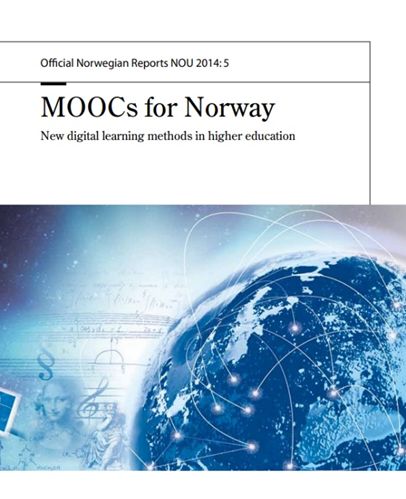 On 21 June 2013, Norway appointed a government commission to examine the potential of massive open online courses (MOOCs). As far as I know, the first country to do so.
On 21 June 2013, Norway appointed a government commission to examine the potential of massive open online courses (MOOCs). As far as I know, the first country to do so.
On June 16, 2014, the official report was released as NOU 2014: 5. MOOC for Norway. New digital learning methods in higher education.
The commission stated that the report was «hairy». Others probably looked at it as hair in the soup. The report suggested governmental measures that required NOK 130-380 (Euro 16-48) million in yearly investments.
I was ambivalent about the hype. Welcomed a debate about all good online education initiatives. And how we could improve future online education.
Feared a wave of unsustainable offers with inferior student support. More focus on individual courses than complete programs and degrees. Less emphasis on the flexibility, systems and efficiency provided by open universities and online schools around the world. And worried more governmental funding would be steered towards traditional universities. Making it harder for private online schools to compete.
Wrote a blog post abridged in the following.
MOOCs are prized for being free and open for everyone. At the same time, criticised for disturbingly high dropout rates, insufficient student support and lacking business models. Arguments that were used in the heyday of educational broadcasting.
Both educational broadcasting and MOOCs need sustainable financial models to succeed. It is thought-provoking that universities start to provide free online courses as newspapers build pay walls. MOOC-providers struggle to find sustainable business models. They test the opportunities to charge for access to teachers, technical support, student support services, exams, certificates and additional content. These services are often lacking or insufficient in MOOCs. But standard services from open universities and online schools.
We need online courses for SMEs. Courses with flexible start-up and progression. Providers that handle a broader range of services that online students, teachers and staff need. So, here are three questions to MOOC-advocates:
- People often have busy lives with job- and family responsibilities that require flexible start-up and progression plans. NooA and some other providers specialise in this. So, I wonder if the MOOCs represent a setback regarding this flexibility?
- Why should universities and colleges provide open online courses to everyone? Shouldn’t they focus on providing a wide range of good online services to their own students? And not only individual MOOC courses, but complete Bachelor, Master and Doctoral programmes?
- SMEs have countless training and learning needs that are well suited for online courses, but not for MOOCs. One example is the course Spanish for adopting parents which NooA provided to about 50 Norwegians. Even for such small groups, online courses can be flexible, cost effective and good. So, why don’t we focus more on flexible online courses that are not so massive and open as MOOCs?
At the cursor moment, many Norwegians have experiences with MOOCs. Often from international MOOC platforms such as Coursera, Khan Academy, edX, Udacity, FutureLearn and Udemy. So, MOOCs have increased globalisation of online courses.
But there are few MOOCs available from Norwegian providers. Invisible in university strategies. Some have been successful. Just a few sustainable.
Anyway, much credit should go to the Norwegian MOOC pioneers and enthusiasts Arne Krokan, Magnus Nohr and Svend Andreas Horgen. Keep on with your good work.
Croatia, Split and EDEN 2014 Zagreb
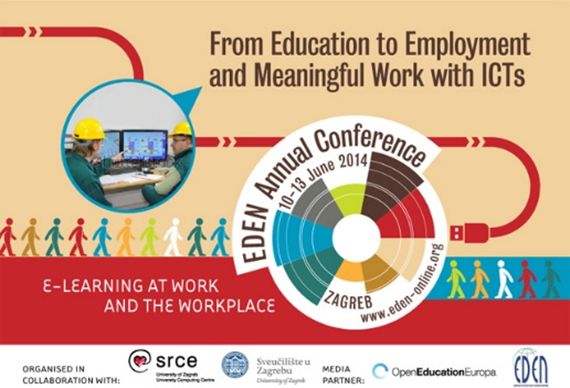 Back in Zagreb. Nearly 38 years after we passed through the city to spend a few days in Split. With an Interrail pass that took us through Tito’s Yugoslavia with many local travellers of several ethnicities.
Back in Zagreb. Nearly 38 years after we passed through the city to spend a few days in Split. With an Interrail pass that took us through Tito’s Yugoslavia with many local travellers of several ethnicities.
Now, the capital of Croatia. A young nation which declared its independence in 1991. And won its war of independence against the Serb-controlled Yugoslav People’s Army in August 1995.
The EDEN conference was located at the HYPO Congress Centre and the SRCE – University of Zagreb University Computing Centre, June 10-13. The theme was E-learning at Work and the Workplace. From Education to Employment and Meaningful Work with ICTs.
The first evening, Torhild Slåtto and FuN invited us to meet the Norwegian ambassador Henrik Ofstad. Who told us that they on July 1st would celebrate the first anniversary of Croatia’s EU membership. And that there where many challenges for a young nation that worked hard to establish all the legal, business and civic structures EU required.
As the former EDEN president, I did not have to wear a tie. Could afford to relax and focus on the social programme. Listen to the saxophone music played by students from the Music Academy at the welcome cocktail in the Zagreb Botanical Garden. Where Ebba Ossiannilsson was honoured as EDEN Fellow by the current and two former EDEN presidents.
Socialized in the evenings with Norwegian colleagues. Drank beer and paid with the local currency kuna. Discussed recent events with Tore Hoel, Eva Gjerdrum, Vigdis Amundsen and Svein Quist-Eriksen. Disturbing news about the Russian annexation of Crimea just after the Winter Olympics in Sochi. King Juan Carlos’ abdication from the Spanish throne and Bashar al-Assad’s victory in Syria’s presidential election.
Appreciated the conference dinner and folklore dance at restaurant Okrugljak. A pleasant surprize to meet Gottfried J. Leibbrandt with Alan Tait at the dinner. Hear their recollections from the foundation of EDEN. The important work they did together with Erling Ljoså and Armando Trindade who shared EDEN experiences with me several times.
Unfortunately, I never had the pleasure to speak with Tamás Lajos about the foundation of EDEN before he passed away at the cursor moment on January 24, 2023. The highly respected professor Tamás Lajos at Budapest University of Technology and Economics. Founder of EDEN, member of the EDEN Executive Committee 1992-1997 and president of EDEN 1995-1997.
Gave priority to the many interesting presentations about MOOCs and OERs. And the closing session chaired by Sandra Kucina. Including Jim Devine’s keynote about Agile Responses to Ireland’s Jobs Crisis. And Terry Anderson’s and Olaf Zawacki-Richter’s discussion about a research agenda for online distance education.
Prolonged the stay in Croatia with a few days of vacation in Split. Enjoyed the charming town with the Diocletian’s Palace, nice beaches and boat trip to nearby islands in the Adriatic Sea.
Regretted booking a cheap apartment. But learned one lesson: Don’t leave clothes, towels, plates, glasses or bottles at the balcony if you live close to a hospital’s heliport.
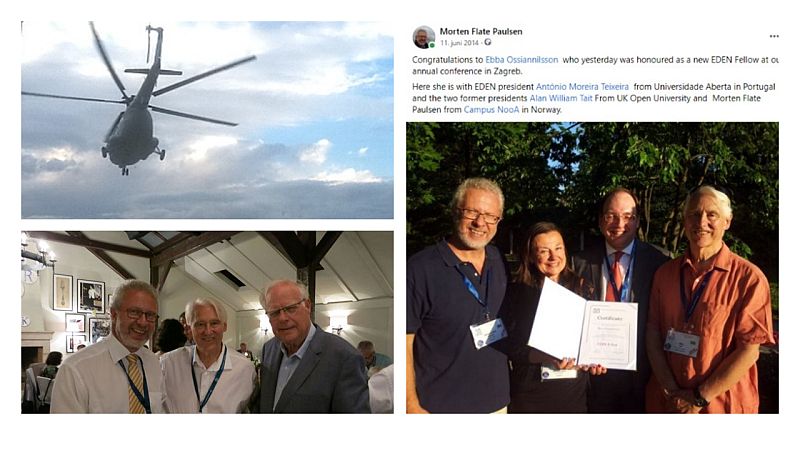
Badges in Berlin
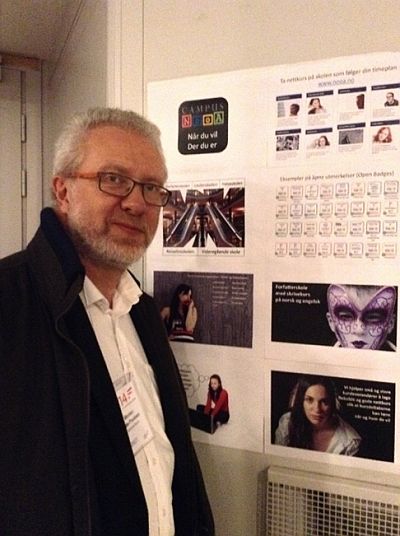 In September 2014, we introduced electronic badges to all students who completed NooA courses. Probably as the first institution in Scandinavia after NKI’s initial attempts in 2008.
In September 2014, we introduced electronic badges to all students who completed NooA courses. Probably as the first institution in Scandinavia after NKI’s initial attempts in 2008.
Wise since it reduced costs and workload. Easy since it was a standard Moodle feature. Tricky because we wanted a sustainable scheme, motivational effect and marketing advantage.
Wanted badges that signalled genuine achievements and brand recognition. Not lightweight badges. But badges students could be proud of. Show them to colleagues, family and friends. Share them in social media.
Made it possible for students to move their badges to http://backpack.openbadges.org. A service provided by the Mozilla Open Badges project. Allowing students to collect standardized badges from several institutions and store them in personal repositories controlled by the student, not the school.
Was really satisfied with the results. Advocated badges in a poster presentation at FuNKon14 November 10-11 in Oslo (see picture). Then Jens Greefe asked me to share my experiences in Berlin on December 3. At an Online Educa preconference organized by the German association for distance learning (FDL) and EADL.
At the cursor moment, more people and initiatives promote badges. Maybe using different words like micro credentials or digital credentials. But I wonder why the formal educational sector has so little knowledge about and interest in this. Is an inflation in lightweight badges making them less coveted? Is there a lack of coordination on institutional and national levels?
Are prestigious institutions too bureaucratic to change? Afraid they will degrade their most important asset? Their privilege to issue certificates, diplomas and degrees?
Riding high and low with NooA in Nerja
Returned with Astrid to Hotel Arcos in Nerja in October. To repeat our enjoyable trip previous November. And appreciate the freedom of working anywhere. To combine work with warm climate. Eat Spanish food at Plaza Balcón de Europa. Swim in the Mediterranean and visit the impressive Nerja Caves. Hike to Frigiliana with its Moorish old quarter and narrow streets decorated with ceramic mosaics. Visit Malaga and Granada at the foot of Sierra Nevada. With the impressive Alhambra palace and fortress.
And celebrate my 57th birthday riding horseback in the hills. A thrilling experience on narrow and steep paths with a beautiful view of the area.
During happy hours in the hotel bar, I vehemently lambasted Norwegian politicians. Who just dropped the project funds to online schools from the state budget. Ending four decades of governmental grants to distance education. After it started to support to correspondence courses in 1975. Support that stimulated so much innovation in Norwegian distance and online education.
My analysis showed that governmental funds gradually had been redirected from independent institutions that specialized in distance education to public institutions that tried to introduce more flexible education initiatives. Such as the much-hyped MOOCs. A development that likely hampered many of the leading online education initiatives in Norway.
I was also frustrated that the new state budget abruptly nullified the chances for more of the project grants that I had based NooA development on. Realizing how crucial it was that I had succeeded to land NOK 400.000 in development grants two years in a row. Suddenly further development seemed unlikely. And alternative income sources were crucial for financial survival.
Fortunately, Astrid cheered me up. As she summarized our NooA achievements during the year. Positive media coverage and a growing number of paying students. Electronic badges and shared reflection assignments in all courses. We had attracted several excellent teachers. Engaged Eivind Jørunland and Teodor Bjerrang as board members. Developed a new WordPress design for www.noa.no.
She also reminded me that we had surpassed 50 courses and 800 users in NooA’s Moodle platform. Upgraded to Moodle version 2.6. With a responsive design which looked equally good on desktops, tablets and phones.
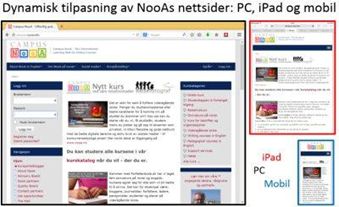
Screenshot of NooA’s Moodle 2.6 login page with responsive design
OUC thesis and Moodlemoot in Barcelona
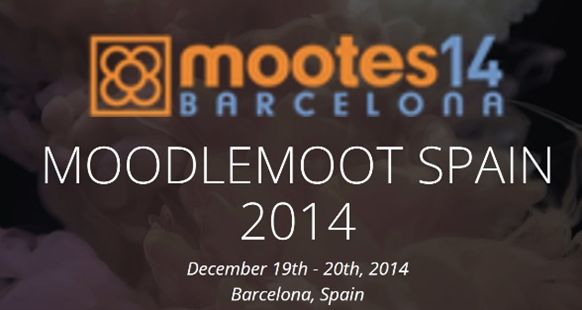
Back in the Catalan capital in December. One month after 80 % supported Catalonian independence in a referendum not recognized by Spain’s national authorities. The year King Juan Carlos handed over the throne to his son Filipe VI. Due to a corruption investigation and a controversial elephant hunting trip.
Invited by Universitat Oberta de Catalunya (OUC) to be on a doctoral commission. In which Antonella Esposito successfully defended her doctoral thesis titled The transition «from student to researcher» in the digital age.
Enjoyed the lunch celebration with Antonella, her supervisor Albert Sangrà and the rest of the commission at a local restaurant. Was surprised by the tradition which implored the defendant to pick up the bill. Appreciated the opportunity to meet my colleague Pedro Fernández from the Megatrends project. And attend a local concert with Albert Sangrà wife’s choir.
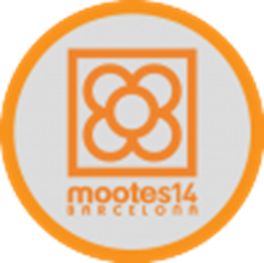
Prolonged the trip to attend MoodleMoot Barcelona at the Escola Superior de Música de Catalunya (ESMUC) on December 19-20. Remember meeting Gavin Henric at hotel Condado for dinner. And a presentation about the status and roadmap for the Moodle Mobile app. By Juan Leyva Delgado. The Moodle Mobile team leader.
Got an electronic badge. Probably the first for attending a conference. Even though I skipped most of the presentations. Since I don’t understand much Spanish. And preferred to spend the time in the good weather at an outdoor café. An experience that made me ambivalent. Giving out a lot of badges for minimal achievement could be good marketing. But depreciate the status of badges.
My 2014 minutes
- January 1 – Latvia adopted euro as its official currency.
- February 7 – 23 – The Winter Olympics were held in Sochi, Russia.
- February 28 – Russian forces took control of the Crimean Peninsula in Ukraine.
- March 18 – Taliban terrorists attacked the Kabul Serena Hotel, killing nine civilians.
- March 23 – The G7 countries agreed to exclude Russia from the G8.
- April 8 – The European Court of Justice declared the Data Retention Directive invalid.
- April 15 – Boko Haram terrorist kidnapped 276 girls from a high school in the city of Chibok in Nigeria.
- June 2 – King Juan Carlos announced he would abdicate the Spanish throne in favour of his son, Crown Prince Felipe.
- June 3 – Presidential elections in Syria ended with the re-election of Bashar al-Assad.
- September 18 – Scotland voted no to secede from the UK.
- October 1 – Jens Stoltenberg took office as Secretary General of NATO.
- October 6 – The Norwegian couple May-Britt and Edvard Moser were awarded the Nobel Prize in Physiology or Medicine together with British-American John O’Keefe.
- October 26 – Dilma Rousseff was re-elected as president of Brazil.
- November 9 – In a referendum on Catalan independence, 80% said yes to Catalonia as an independent state. The vote was not recognized by Spain’s state authorities.
- December 28 – NATO stopped operations in Afghanistan, ending its part of the war in Afghanistan.
My 2014 publications
My 2014 presentations
Cooperative freedom and transparency in online education. Examples and experiences from the Nordic open online Academy (NooA) and its implementation of multilingual and flexible online education in Moodle. A 30-minute presentation at the NORDEFCO ADL Conference. Gol, Norway. 14.05.14
How to practice good e-tutoring. How the Nordic open online Academy (NooA) uses Moodle for Cooperative Freedom and Transparency in Online Education. A 45-minute presentation at the Online Educa pre-conference: Distance E-Learning in Europe: Exchange of Experiences and Knowledge Sharing, Berlin 03.12.14.
12 bilder fra NTH til HiST og Campus NooA. HiSTsamling på Savalen i mars.
Erfaringer fra etableringen av Campus NooA. Eksempler og erfaringer fra et flerspråklig, fleksibelt og sosialt læringsmiljø ved Campus NooA. En 15 minutters presentasjon for kommunal sector. BI Learning Lab. 10.06.14.
Campus NooA i Danmark. Åpent informasjons- og samarbeidsmøte I København. Copenhagen School of Entrepreneurship. 25.08.14.
More anecdotes to come
2015 Going north
Teaching and e-learning at HiST
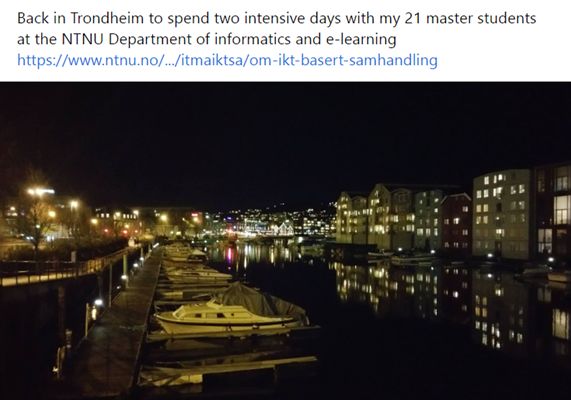
Høgskolen i Sør-Trøndelag (HiST) started its new master programme in Digital Collaboration (IKT-basert samhandling) in the fall of 2014. I advised master theses and taught the second semester course Customized Corporate E-Learning (Bedriftstilpasset e-læring) from 2015 to 2018.
So, I had many visits to Trondheim. Intensive teaching, hotel beds and late flights. Unfamiliar, but very rewarding to teach face-to-face students again. Students in their twenties who challenged my online world with their streaming and mobile mindsets. Students I challenged with my penchant for andragogy, online learning and cooperative freedom. Confronted with my ideas about streaming education and micro guest lectures.
Experienced HiST’s use of Itslearning. The Norwegian LMS platform chosen by HiST. Then Blackboard as HiST merged with NTNU. A strange decision when most higher education institutions in Norway chose Canvas.
The experiences made me conclude that:
- common LMS systems did not differ significantly.
- system managers and institutional choices had considerable impact on the LMS.
- implementing a new LMS was a huge undertaking for the university.
My corporate e-learning course included three assignments for groups of up to three students. Each student should refine the initial group work into individual portfolios and present it in a final report together with references to literature and progress reflections. Finally include arguments for the course grade they deserved.
The assignments were:
- Analyse an e-learning provider
- Analyse an e-learning course
- Develop and publish an e-learning module
The students had to find and choose learning providers, e-learning courses, development tools and publication opportunities. Requirements that frustrated some – because they were not used to so much freedom. Anyway, the students presented and discussed their assignment work during the face-to-face classes. Giving us all interesting insights in a variety of providers, courses and tools.
The first year, we set up a digital exam with Inspera Assessment. A useful experience, but happy that HiST accepted that we later changed to portfolio-based assessment.
We arranged open demo days where the students dressed up, served snacks and demonstrated their e-learning modules to other students and staff. The following examples illustrate what kind of e-learning modules the students developed and demonstrated:
- folk music and fiddle playing
- guitar playing
- piano playing
- bun baking
- carrot cake baking
- Word 2016
- HTML
- first aid
- horses
- the royal family
- hockey
- poker
- FIFA18
All in all, so many good memories and experiences from the years I worked with students and colleagues in Trondheim. Strengthening my conviction that online education has many benefits, but that we all should have some face-to-face education in our adult lives.
Micro guest lectures may enrich the classroom
Universities and vocational schools can invite corporate professionals to share their experiences and expertise. Students can be inspired by international experts and guest lecturers outside academia.
It is easy to increase the scope and frequency of this with micro guest lectures. A term I introduced in my first NTNU course about corporate e-learning in 2015. Didn’t find any references to the term in Google. But lectured about micro learning and micro credentials. So, the new term came naturally and was useful as we dealt with flexible education.
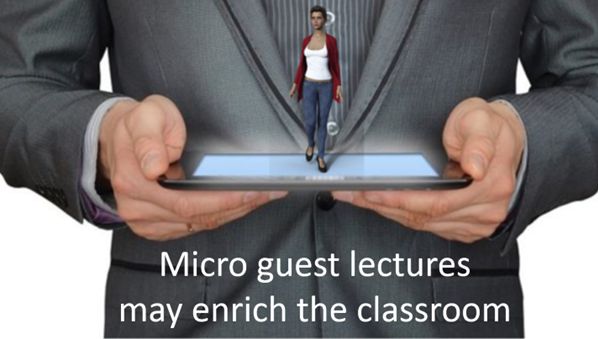
Defined a micro guest lecture as a short, synchronous session in which a guest speaker presents a topic and answers questions via a communication medium. The students are usually gathered in a physical classroom, but online students can also benefit from micro guest lectures.
Several professionals in my network contributed with lectures in the corporate e-learning courses. Found that many were glad to be invited. That professionals often agree to give free micro guest lectures. If they can talk about their work or subjects they are passionate about. Since it requires little preparation. And often is possible to find 15 available minutes even in a busy time schedule. If time slots are flexible and time zones not too far apart.
It is possible to conduct micro guest lectures on the phone. If the classroom is large, you can connect a loudspeaker to the phone. In this way, we had the pleasure of hearing Arnt Jensen’s experiences as an online teacher in NooA’s janitor courses. And Dan Ove Skaalerud’s work with nano learning in Junglemap.
We also arranged several 15-minutes micro guest lectures with Q&A sessions in various video conferencing systems. With one classroom PC connected to a projector, we appreciated that:
- Anne Fox in Denmark talked about her book Online learning: Lessons learned from developing, tutoring and monitoring online courses.
- Bodil Eide in Portugal shared her experiences as a developer and teacher in NooA’s online drawing courses.
- Torgeir Lognvik presented digital learning systems from the Norwegian company Conexus.
- Thea Myhrvold talked about Teachmenow and how she as a young Norwegian entrepreneur established her company in Dubai.
- Trond Markussen presented the Norwegian Research and Educational Network (REN)
- Ebba Køber talked about Flexible education Norway.
- Alf Martin Johnsen presented Moodle partner eFaktor.
- Hege Tollerud presented Oslo Edtech.
- Mette Villand described FUN’s Guide to quality in online teaching and learning.
Found that micro guest lectures have several advantages. Here are some in random order:
- They provide variation and new perspectives to your teaching.
- It is quite easy to get experts from around the world into your classroom.
- Your students can get up-to-date information from experts in the field.
- It costs little or nothing.
- It provides contact between business and school, employers and your students.
My best advice from these micro guest lectures were:
- Give students enough time and information to prepare relevant questions based on the lecturer’s work, specialities and affiliations.
- Prompt students to move to the classroom PC when they ask questions so that the lecturer easily can see and hear them.
- Have a phone number as a backup if there are problems with the video connection.
Concluded that my experiences with micro guest lectures were positive. But my master students were relatively few and especially interested in e-learning. So, it would be interesting to test this in more courses with different subjects and schools.
Hoped that someone would lead a research project or write a master thesis where the students’, teachers’ and lecturers’ experiences with micro guest lectures were analysed.
Streaming education checklist
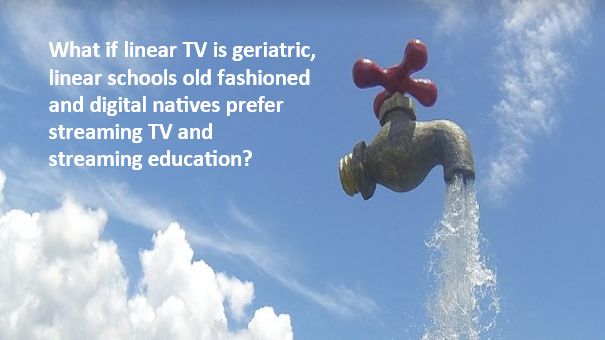
I’m a thinker. Often an ambivalent doubter. An ardent believer in online education. Always searching for new terms and solutions. So, in 2015, I asked my master students at NTNU: Do you prefer linear or streaming television? All preferred streaming TV.
Then I asked: Do you prefer linear or streaming education? They looked confused at me and each other. Tried to merge two separate sets of experiences. Which gradually triggered an interesting discussion. About flexibility of time, rigid schooling, binge learning, podcasts, streaming episodes and seasons.
So, what if linear TV is geriatric, linear schools are old fashioned and digital natives prefer streaming TV and streaming education?
I have promoted online education for decades. Often successful, but not effective enough regarding time-flexibility. So, it helped to introduce the term “streaming education” to illustrate challenges in linear education. To explain why most online education does not provide the time flexibility I promote.
So, let me try again. The term streaming education (Strømmeskole in Norwegian) first appeared in my thinking when I understood that many dropouts from linear schools appreciate streaming music and streaming television.
Streaming media, also termed on demand media, are there whenever we want them. So, why is online education not equally flexible? Why not allow students to binge-study online courses during weekends and holidays?
Voila – welcome streaming education!
Online education (including MOOCs) has all the means to provide streaming education. However, most online education is quite rigid, not benefiting from the full potential of time flexibility.
So, here is my checklist with seven questions that indicate how close you are to provide true streaming education.
Can your students:
- start the course any day convenient to them?
- progress and complete the course as fast or slow they want?
- submit all assignments whenever they like?
- do all course activities whenever they prefer?
- decide which sequence they complete all course tasks and assignments?
- do the course exam any day convenient to them?
- have vacation whenever they like?
My checklist does not indicate that streaming education is better than other online education. It only points out that it is more flexible in time – and maybe more attractive for streaming generations.
However, linear colleagues argue that many online students need the structure of linear schools to reach their goals. This lack of structure is probably the best argument against streaming education – until we improve and refine all current streaming education opportunities.
MoodleMoot in Malmö
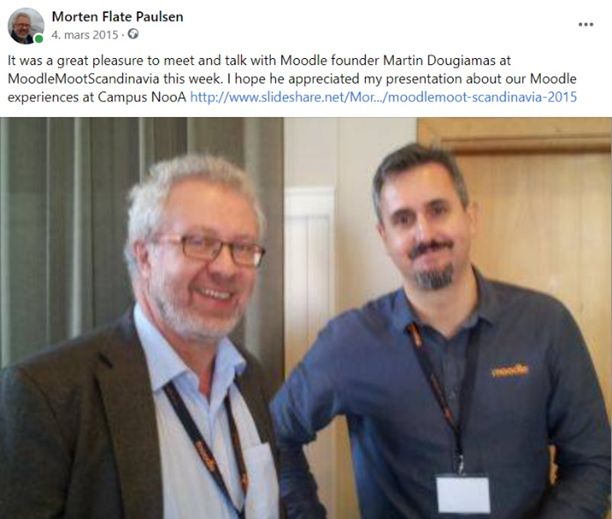
The first MoodleMoot in Scandinavia was organized by Netsapiens and eFaktor at the High Court conference center in Malmö on March 2.
Went together with my eCademy friends and colleagues. Eigil Norén, Lars Erik Rørholt, Astrid de Mora, Kristin Hennum Storflåten and Hege Børke Lillekroken.
Interesting and useful to spend two days with Moodle founder Martin Dougiamas and Moodle guru Gavin Henrick. To get their feedback on my presentation titled Moodle experiences from Campus NooA – the Nordic open online Academy.
A great opportunity to explain how we strived to use Moodle to support individual start-up and progress. But also, a chance to point out some of Moodle’s shortcomings compared to SESAM.
My main concern was how we best could set up Moodle to effectively handle individual start-up and progression. So, high on my Moodle wish list were:
- Student profiles that showed their course expiration dates
- Teacher response barometer to improve response time
- Individual planning and follow-up functionality to improve course completion rates
- More and better school administration tools and reports
- List of submitted assignments not handled by teachers
In addition to Martin Dougiamas and Gavin Henrick, the following Moodle experts were listed as speakers in the conference flier: Laszlo Lukacs, Alf Martin Johnsen, Synnøve Arntsen, Alex Contis, Eivind Tore Hansen, Urs Hunkler, Fred Johansen, Lars Didrik Flingtorp and Lars Sverre Gjölme.
Returned home with better knowledge about how we could use CSS styling, learning analytics, open badges and Big Blue Button webinars in NooA’s Moodle platform.
EDEN 2015 Barcelona

The EDEN annual conference was hosted by Universitat Oberta de Catalunya (UOC) on June 9-12, 2015. As part of its 20th anniversary. In the Catalonia Plaza Hotel at Plaza España. Close to the Magic Fountains and the Palace of Montjüic.
380 delegates from 45 countries convened to learn more about the conference themes: Expanding Learning Scenarios. Opening Out the Educational Landscape.
The welcome reception took place in the Centre de Cultural el Born. EDEN President Antonio Teixeira honoured Alan Bruce, Terry Anderson, Albert Sangra and Roberto Carneiro with Senior Fellow Awards. Concluded with a colourful Catalan castells performance of acrobats forming human tower.
Remember that the conference hashtag #EDEN15 generated over 1400 tweets on the first day. That I talked with future ICDE President Belinda Tynan and the other keynote presenters:
- Martin Weller: The Battle for Open
- Belinda Tynan, Marci Powell, Darcy Hardy: From the Classroom to the Boardroom
- Alan Tait: From Distance Learning to Open Education: A Changing Landscape
- Albert Sangra: Expanding Learning Opportunities for the Last 25 Years
The conference dinner and Mediterranean jazz performance was organised in the former Royal Palace of Pedralbes with its museums and beautiful gardens. Spent much of the evening listening to Gard Titlestad’s monologues. About his work achievements. Before and after he took over as secretary general of ICDE after Carl Holmberg in 2011.
Prolonged the stay with ten days in the coastal town Sitges. Renowned for its carnival and LGBT Culture. A vacation that in several ways echoed the conference theme. By Expanding my Learning Scenarios. About the rich variety of intimate piercing on display at the nude beaches. The colourful rainbow celebrations. Building up to the city’s Pride Parade on June 21st. Crowned with a front row view to the parade from our white wine table at the outdoor restaurant. Where people celebrated that 62 % voted to introduce same-sex marriage in the Irish May 23 referendum. And that same-sex marriage would soon become legal in all US states.
Nordic study labs in Västervik
Drove 566 km from Oslo to Västervik. A charming costal town south of Stockholm. Returned with hopes of exotic travels and Scandinavian collaboration. With new friendships and a large flower painting with red poppies in the back seat.
Fourteen people attended the August 22-25 kick off meeting in the Nordic Study Lab Project. Financed by Nordplus from August 2015 to July 2016. Initiated by Jørgen Grubbe and managed by Holbæk municipality in Denmark.
Partners from Greenland, Iceland, the Faroe Islands, Sweden, Norway and Denmark. Committed to arrange study visits to their home countries. Ten partners from six Nordic countries who had to communicate in English. Representing various organizations and target groups. From primary schools to universities, from informal to formal learning:
- Norway: NooA
- Sweden: NITUS
- Greenland: Qeqqata Akademi/Piareersarfik and Teknikimik Ilinniarfik
- Iceland: Miðstöð símenntunar á Suðurnesjum
- The Faroe Islands: Føroya Handilsskúli
- Denmark: Holbæk municipality, Odsherred municipality, Kalundborg municipality and University College Zealand
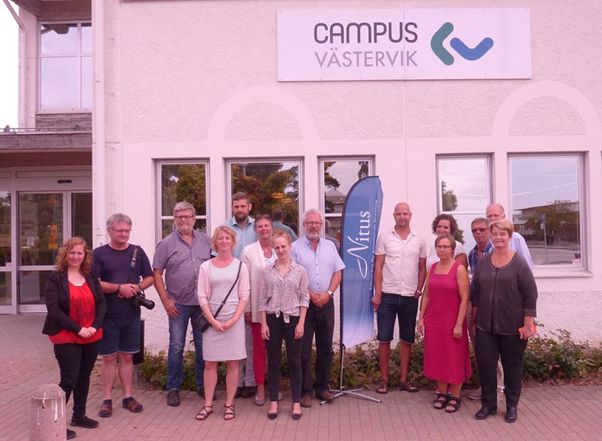 The project focused on distributed study labs in rural areas. Study visits and knowledge-sharing. Transnational workshops, expert presentations, excursions to schools and study labs, video conference meetings, discussions and reflections.
The project focused on distributed study labs in rural areas. Study visits and knowledge-sharing. Transnational workshops, expert presentations, excursions to schools and study labs, video conference meetings, discussions and reflections.
At Campus Västervik, Jutta Lesell explained the Swedish educational system and Kent Wallen introduced NITUS (Nätverksgruppen för IT-baserad utbildning via lokala studiecentra). A national network of about 100 municipal study labs in Sweden.
Jerry Engström presented Campus Västervik and the distributed activities in the campus network. Invited us to the Idö Island and his summer house to taste whiskey. Showed us the view from the old pilot house before we had dinner at the Idö Skärgårdskrog restaurant.
All in all, a memorable kick-off meeting about Nordic learning experiences related to management, technology, communication and teaching in rural areas. A perfect start of a Nordic project that initiated remarkable experiences and lasting friendships.
Photo by Jørgen Grubbe. From left: Guðjónína Sæmundsdóttir, Michael Rasmussen, Kent Wallén, Astrid Hestbech, Emil Erichsen, Astrid de Mora, Anne Kristine Petersen, Morten Flate Paulsen, Anders Vedberg, X, Jutta Lesell, Jerry Engström, Jørgen Grubbe and Nanna Bára.
Keflavik from NATO-based to knowledge based
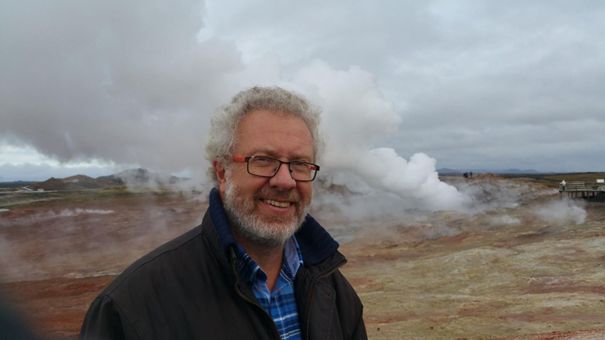
Attended a seminar at the Oslo Stock Exchange on November 26. Arranged by the Norwegian-Icelandic Chamber of Commerce. Found it interesting to discuss Icelandic experiences with Norwegian TV personalities Geir Helljesen and Arne Hjeltnes. Enjoyed the presentation by Icelandic minister for trade and industry Ragnheiður Árnadóttir. About how international media attention could increase tourism. Her advice: Go for volcano eruptions, bank collapses and Justin Bieber videos.
Four weeks earlier, I flew Iceland Air to Keflavik to attend the Nordic Studylab meeting from October 21 to 26. Arranged by our Icelandic partner Miðstöð símenntunar á Suðurnesjum (MSS) in the town of Keflavik. An amazing area with barren and remarkable nature that probably influenced local education and training.
Visited the MSS lifelong learning centre for adults, the Fishery College (Fisktækniskólinn) and the Atlantic Center of Excellence in Keilir (Háskólabrú). Three different schools owned by municipalities, businesses and labour unions. Institutions that offered education to many working students. So, the programs and schedules were flexible.
MSS offered an environment for learning and a variety of flexible programs for individuals and businesses. Personal counselling and educational services to help people with continuing education and new careers.
The Fishery College (Fisktækniskólinn) offered programs for the fishing industry. Trained both newcomers and experienced people in the industry. Some courses were provided in English for guest workers from other countries.
In 2007, the Americans left the NATO-base in Keflavik with 2000 apartments, three schools, two kindergartens and a variety of other buildings. And donated the area near the volcanic Mount Keilir to the municipality. So, it was decided that Keilir should be used for education. Under the slogan: From NATO-based to knowledge based.
Keilir’s goal was to raise the educational level in the area. Offer education at university level: Pilot training and applied technology. With students from all Nordic countries. The University Bridge initiative used flipped learning to offer education for people who had not finished upper secondary school but wished to start higher education.
All classes were recorded. Student should view the videos as preparation before coming to the school. The flipped classroom concept shifted the focus from the teacher to the students. “Student-focused classroom” instead of “teacher-focused classroom”.
Our hosts, Guðjónína Sæmundsdóttir and Nanna Bára, arranged unforgettable excursions. Took us on a tour around the Reykjanes peninsula. Stopped for a taste of the Icelandic schnaps Svartidauði (Black Death) in a volcanic crater. Visited the Hætta geothermal area with is boiling ponds and hot steam vents. Ended up in the Blue Lagoon. Rubbed ourselves with the soft, white mud from the bottom of the lake. Swam in the hot water with an amazing circular current that repeatedly brought us back to the pool bar. Concluded with a 4-course meal in the Lagoon restaurant.
The following day, we stopped by the old Garður lighthouse. Walked across the fissure bridge (Brúin milli heimsálfa) between the diverging European and North American continents. Had an adventurous Icelandic lunch at Njarðarbraut in Reykjanesbær. Dared to taste dried fish (harðfiskur), fermented shark (hákarl), whale fat (hvalspik) and sour ram testicles (súrsaðir hrútspungar). Ended with dinner in Guðjónína’s house.
Returned to Reykjavik with a local late-night bus. As the only two passengers aboard, we learned a lot about Iceland’s financial crises from the former bank manager who drove the bus. The final day we visited the Laugardalslaug public thermal pools and experienced outdoor swimming with a Danish soccer coach among beautiful falling snowflakes.
Location Lilyhammer
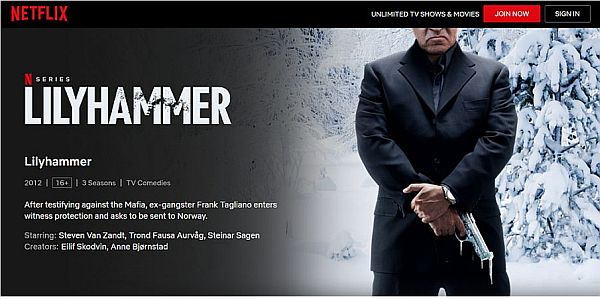
Lilyhammer. The three-season crime comedy starring Steven Van Zandt. Known from Sopranos and E Street Band. As the New York-based gangster Frank «The Fixer» Tagliano. Trying to start a culture conflicted new life in the provincial Lilyhammer. Becoming a Netflix success in 2012. The same year Netflix was launched in Norway. Probably kickstarting the country’s transformation from a linear to a streaming culture.
NooA hosted the Nordic study labs visit to Lillehammer December 7-8, 2015. 21 years after the Lillehammer Winter Olympics. With the kind help of Mette Villand and the Centre for Lifelong Learning at the University College.
Professor Yngve Nordkvelle introduced the University College in Lillehammer. Explained how the Olympic facilities strengthened the college. Talked about the online journal Seminar.net and the differences between asynchronous and synchronous learning. Target group preferences, study habits, computer skills and motivation.
The importance of course platforms was discussed during day two. As we took a closer look at Studentlappen – NooA‘s introductory course for its online students. And Alf Martin Johnsen’s presented eFaktor and the many Moodle opportunities.
The workshop dinner was at Maihaugen. Norway’s largest open-air museum with more than 200 historic houses from the 13th century until present times. Visited the indoor museum collection. And learned that the Nansen Humanistic Academy was founded in Lillehammer in 1938 as a protest against the totalitarian ideologies in Europe. An academy named after the Norwegian polar explorer and Nobel peace prize laureate Fridtjof Nansen.
Two days later, the 2015 Nobel Peace Prize was awarded to the Tunisian National Dialogue Quartet. For its decisive contribution to the building of a democracy in Tunisia in the wake of the 2011 Jasmine Revolution.
So, back in Oslo, I attended the Nobel Concert on December 11. An impressive concert for the first time arranged in Telenor Arena. Remember Jay Leno was conferencier. Proud to see the growing number of famous Norwegians artists among the international stars. Kygo was the main artist who Stole the Show. A-ha performed Summer Moved On, Scoundrel Days and The Sun Always Shines on T.V. Aurora song Runaway. And World Idol winner Kurt Nilsen song Firestone.
My 2015 minutes
- January 1 – Lithuania established euro as its official currency.
- January1 – Norway introduced universal conscription for both sexes and became the first NATO country with gender-neutral conscription.
- January 7 – The editorial office of the satirical magazine Charlie Hebdo in Paris was attacked by terrorist and twelve were killed.
- April 25 – An earthquake with magnitude of 7.8 struck Nepal. At least 7,000 people died. It triggered a Mount Everest avalanche that killed at least 19 people – the deadliest day in the mountain’s history.
- May 23 – In a referendum in Ireland, 62% voted to introduce same-sex marriage.
- June 26 – Same-sex marriage became legal in all US states.
- September 4 – The new Norwegian Postal Act was approved which abolished Posten Norge’s monopoly on letter mail delivery from 2016.
- December 12 – The Paris Agreement was settled at the climate summit in Paris.
My 2015 publications
Morten F. Paulsen. Foreword. In Technology-Enhanced Learning in Higher Education. Editors J Branch, P Bartholomew, C Nygaard. 2015. Libri.
Ordbok for e-læring og nettbasert utdanning
My 2015 presentations
Moodle experiences from Campus NooA – the Nordic open online Academy. A 30-minute presentation at the MoodleMootScandinavia: Malmö, Sweden 2-3.03.15.
2016 Having more FuN
The barren and fertile Faroe Islands
Landed in Tórshavn February 23, 2016. Sixteen years after my first visit to the North Atlantic capital of the Faroe Islands. The 18 rocky islands of volcanic origin with 50.000 inhabitants. To attend the Studylab visit arranged by our local partners Finn Jensen and Heðin Lamhauge.
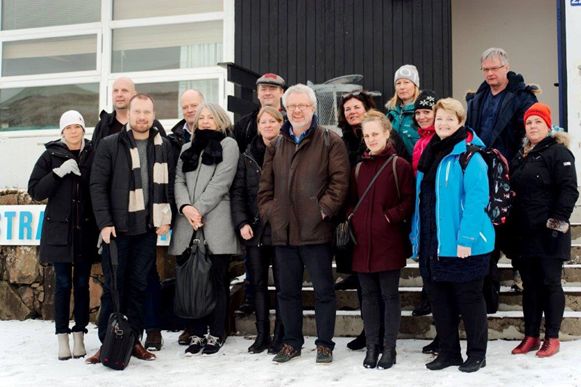
Photo by MSS. The Nordic studylab partners in front of the Vágur studylab
Started with a meeting on board M/F Smyril towards the Suðuroy island. To visit Vágur. A village with about 1,400 people and a declining population.
Mayor Dennis Holm was concerned that young villagers left due to lack of schools and educational opportunities. He wanted people to get education in the village. Stay and get a degree in Vágur instead of moving away. So, he showed us the local studylab. An ordinary detached house. With counsellors and online education technology that provided guidance and access to a variety of educational opportunities from several Nordic institutions. With a free key card for all villagers who wanted to study.
800 people had visited the study lab during its first three years. Spoke with seven young women who were present. Told us that the studylab made it possible to learn in the village they wanted to live. Four of them were pregnant. Noted with a smile that studylabs can offer hope for the future.
Went on to Pál’s Høll. Named after Pál Joensen. A local with an impressive career in international swimming. Who continued to live in Vágur even though there was no 50-metre pool in the country. Stubbornly trained in Vágur’s 25-metre swimming pool. Became a national hero. An inspiration because he made the impossible possible. So, the local community and many volunteers built and crowd-funded a 50-meter swimming pool. Large enough to simultaneously contain all Vágur’s inhabitants.
The next day, we visited the impressive new Glasir university building in Tórshavn. The largest educational institution in the Faroe Islands. An architectural and educational flagship with more than 1.500 students and 250 staff. Offering upper secondary, vocational and higher education. Including online and part-time courses for working students.
Concluded the stay with my first helicopter flight. From Torshavn to Klaksvik. Exciting and affordable since the helicopter rout was part of the public transportation system. Sunshine, light blue sky and deep blue Atlantic water. Extraordinary view of the snowclad rocky islands. So beautiful that even the pilot took photos with his mobile. Photos that remind me of memorable encounters with creative and stubborn people who struggled and succeed in a challenging environment.
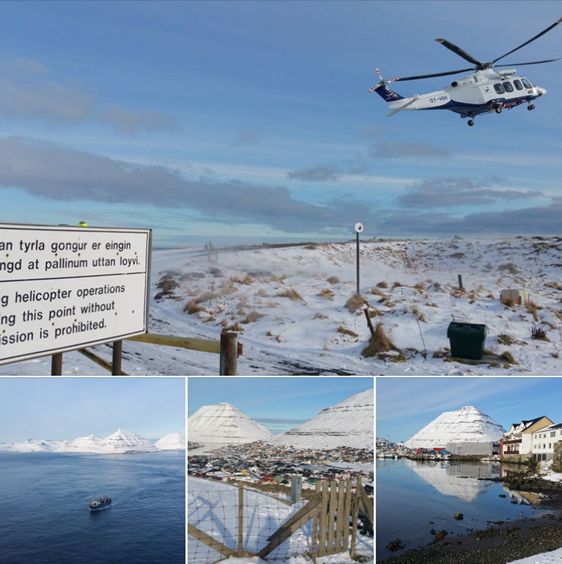
Kalaallit Nunaat
Flew to Sisimiut to attend a Stadylab meeting on April 19. Sisimiut, literally meaning the residents at the foxholes. With 5500 inhabitants, the second largest town after Nuuk.
About 4,500 years after the Saqqaq people immigrated from Arctic Canada to Kalaallit Nunaat. The world’s largest island. The self-governed Danish entity with 56.000 inhabitants and United States Space Force’s northernmost base. The land President Trump wanted to buy.
Norwegian territory until 1814, since Erik the Red founded the first Norse settlement thousand years ago. In the land he named Greenland. Probably as a PR stunt to attract Norwegian settlers and motivate his son Leiv Eiriksson to discover America.
In 1888, Fridtjof Nansen and his team first traversed Greenland on skis. Followed by many more Norwegians. At the cursor moment, even Norwegian Crown Prince Haakon. On skis, supported by a kite and a TV-team.
Checked in to hotel Sjømansheimen. Which charged a considerable fee for internet access. When most western hotels provided complimentary access. Realized that few private homes could afford it. At least, many kids played outdoors.
Observed a lot of husky dogs and snow mobiles outside the colourful houses. But couldn’t find any local stores to buy snacks. Before we realised that sale posters were rare. Finally, found a convenience store hidden in a private house. Offering milk, whiskey, dog food, rifles and munition in shelves next to each other.

We met our partners at Qeqqata Akademi and Teknikimik Ilinniarfik college. Barfuss Ruge shared educational statistics . Anders Øgaard shared some of his Ph.D. work about distance teaching.
We learned that nearly 90 % of the population were Inuits. The rest mostly Danish. Heard that 20% of the population was monolingual in Greenlandic and 10% in Danish. The rest bilingual. Education only provided in Danish. Two thirds with no further education than primary school.
Learned that it is a virtue to be humble in Greenland. A little is enough, holding back is good and taking it slow is fine. Potential culture clashes for well-educated Danes on three-year work contracts.
Greenlanders are very family oriented. Prefer to stay with family, even in the many remote areas with no roads and unaffordable internet access. Causing opportunities and challenges for distance learning projects. Projects often initiated by visionary Danes. Often ending with their three-year contracts.
Due to worrying weather forecasts, we took off early for Kangerlussuaq. The only airport large enough for international flights. Few other local flights made it before the storm. So, we stayed the night waiting for more local passengers. Driven to military barracks in old, yellow American school busses.
During the next day, we had plenty of time to discuss Danish author Peter Høeg and Smilla’s Sense of Snow. While more local flights arrived for our late take off to Copenhagen. So late that we had to stay another night in the Danish capital before flying home.
Realized that a 48-hour delay was nothing. Compared with generations of Norwegian explorers and hunters who had no way to return home before the summer boat arrived.
Boarding FuN
It was an honour to be elected on April 28, 2016. As board member of FuN. The important and stable member association for Norwegian distance and flexible education. For a long period lead by able colleagues and people I admired. Among the elected presidents: Thormod Carlsen and Svein Quist-Eriksen from NKI. Erling Ljoså and Dagny Blom from NKS. Kristin Dahl from BI. Hard working secretariat members: Kari Olstad, Ebba Køber and Petter Kjendlie. Two female general secretaries with substantial respect in the international community. Ingeborg Bø from 1991 to 2006. Torhild Slåtto from 2006 to 2018.
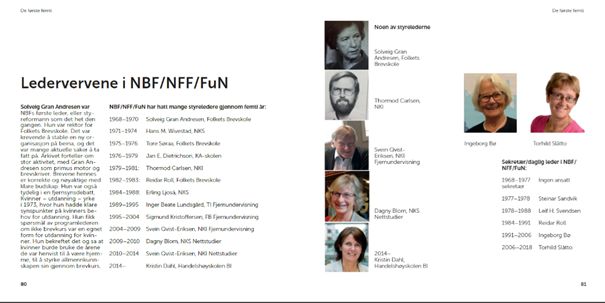
Facsimile presenting executives in FuN’s fiftieth anniversary book: De første femti historien om fleksibel utdanning Norge.
FuN was a national champion and active contributor to the international community. For example, by hosting several memorable conferences in Oslo: The 1988 ICDE World conference, the annual EADL conference in 2009 and the annual EDEN conference in 2013.
With a history that mirrored how distance and flexible education evolved. Established February 27, 1968. By NKI, NKS and four other schools. As the Norwegian association of correspondence schools (NBF – Norsk Brevskoleforbund). Changed name to Norwegian association of distance education (NFF – Norsk forbund for fjernundervisning) in 1985. Added flexible education (Norsk forbund for fjernundervisning og fleksibel utdanning) in 2005. And just Flexible education Norway (FuN – Fleksibel utdanning Norge) in 2013.
Remember FuN engaged me to work with Tunet.net in 1998. An internet portal with resources for adult learning which also arranged a number of online seminars. Recall taking part in so many interesting seminars and successful annual FuN conferences. Often as presenter or member of programme committees.
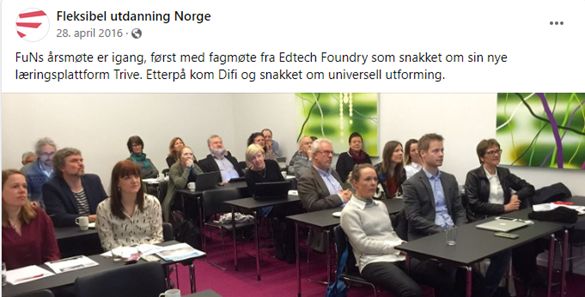
The 2016 annual general meeting supported the candidates proposed by the electoral board. So, I was elected new board member along with Olgunn Ransedokken. And the two new deputy representatives Randi Stemland and Geir Hareide Hansen.
Three of the four sitting board members were re-elected for their second terms. Kristin Dahl (Chair), Anders Nome (Deputy Chair) and Linda Johnsen. The fourth member, NKI director Wenche Halvorsen, was not re-elected.
Nevertheless, I was disappointed that NKI did not renew its membership in FuN. After withdrawing from ICDE, EDEN and EADL. Four associations that had been central in NKI’s proud history.
The Danish castle conclusion
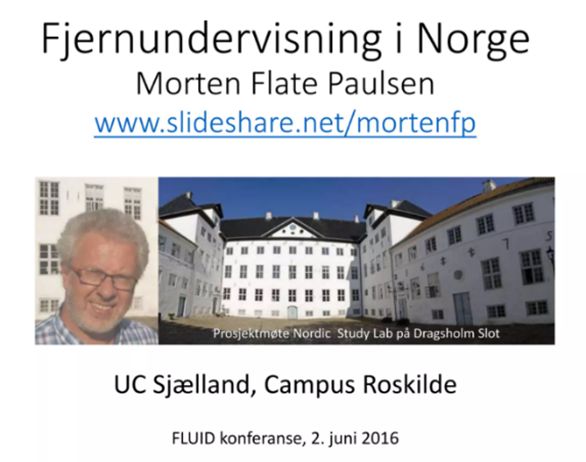
The Nordic Studylabs project concluded with a final meeting in Denmark. Good food in peaceful environment at the fashionable baroque Dragsholm Castle on June 1-3.
The meeting ended with a study-trip on Zealand. About a millennium after Harald Blåtann (Bluetooth) consolidated his rule over most of Jutland and Zealand. Introduced Christianity to Denmark and inspired modern Bluetooth technology. The short-range wireless technology initiated by the Ericsson mobile phone company in 1989. Known for its familiar logo. Designed from Harald Blåtann’s initials ᚼ and ᛒ. Written with Norse letters.
At Geopark Odsherred we experienced how the area looked like in the Ice Age. Using an Augmented Reality app, we downloaded to our mobile phones. Continued to the Brorfelde Observatory to learn about the telescopes and participate in the official opening of the local scientific education centre. Excellent examples of all the informal learning opportunities that are available in local communities.
On June 2, the project partners arranged a conference about future learning at Campus Roskilde. Together with the Danish association for flexible education (FLUID) and the Zealand university centre. Where I was invited to present an overview of distance and online education in Norway.
Karsten Gynther and Astrid Hestbech presented the final report from the Nordic study lab project. Pointed out guidance, coupling and mapping as three success factors for study labs. Guiding citizens to choose an applicable education. Coupling collaboration between local partners. And mapping local needs for employment.
Finally, the report presented the following three recommendations:
- Map local needs for qualified labour.
- Apply resources to establish and maintain couplings between partners in the local community.
- Support students and potential students through the educational system.
The EDEN silver jubilee in Budapest
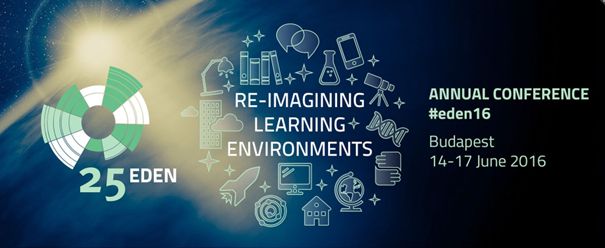
EDEN celebrated its 25th anniversary during the annual conference at the Budapest University of Technology and Economics on June 14-17. The conference was promoted with the slogan Re-Imagining Learning Environments and attracted 310 delegates from 37 countries.
The Budapest University Chorus performed at the opening ceremony in the University Hall. EDEN President António Teixeira presented EDEN Fellow Awards to Paul Bacsich, Antonella Poce, Torhild Slåtto, Elsebeth Korsgaard Sorensen and Belinda Tynan. Senior Fellow Awards to Deborah Arnold and Rory McGreal. Airina Volungeviciene then honoured Antonio with his EDEN Senior Fellow Award.
Torunn Gjelsvik introduced ICDE’s new Global Doctoral Consortium. Which I later joined Mark Brown and Martin Weller in its reference group. At the same time, the EDEN Young Scholars Support Scheme was introduced. Following the Ulrich Bernath Foundation’s a initiative to support young researchers. So, EDEN’s first Young Scholar Award was given to Dávid Sík and Ágnes Gaul-Ács.
Flexible Education Norway (FuN) arranged its traditional member network dinner June 15 at Gellért Brasserie Restaurant. Appreciated to talk with Ingeborg Bø who opened up about her reduced physical strength. But felt miserable as I recognized her symptoms from my father’s fatal disease.
Stayed at the Ensana Thermal hotel at the Margaret Island. Visited the remarkable Budapest Cave Church. When Torhild Slåtto and Alastair Creelman had their session about lurkers. At the cursor moment, I admit that I often was a lurker in secondary school as my thoughts wandered off during boring classes. And that I sometimes turn off my camera during winding webinars.
The EDEN 25th anniversary gala dinner was held at Pesti Vigado. The world heritage site at the Danube embankment. An impressive building which used to be a centre for Hungarian performing art. Featuring many great international musicians as well as world-renowned Hungarian composers Béla Bartók and Franz Liszt.
Sir John Daniel focused on EDEN’s achievements and European challenges in his dinner speech. Jieun Lim and Jennifer Richardson received the best research paper award for: How Social Networking Experience relates to Social Presence and attitude of Using SNS in education.
Special 25th anniversary recognitions were also awarded during the jubilee dinner. Sir John Daniel, Alan Tait and Ulrich Bernath were honoured as outstanding colleagues who made decisive contributions to EDEN’s foundation, consolidation and growth.
The UK Open University, Universitat Oberta de Catalunya, Ellinogermaniki Agogi and Flexible Education Norway received Awards of Institutional Excellence for continuous support. Represented by Mark Nichols, Marta Aymerich, Sofoklis Sotiriou and Torhild Slåtto.
Certificates of honour were presented to Ingeborg Bø, Tamás Lajos, Ari-Matti Auvinen and Erling Ljosa for leadership and consistent support to EDEN throughout the years.
Finally, I was especially pleased to see that Anna Wagner was awarded a certificate of excellence for her long-term exceptional commitment, smart and generous contributions to the success of EDEN over the years.
Remember that many conference papers focused on MOOCs and open badges. Airina Volungeviciene took over as EDEN President and EDEN Vice President Deborah Arnold launched a new EDEN Web Portal.
At the cursor moment, I appreciate the conference photo album and A special collection of President’s blog anniversary posts which António Teixeira, András Szűcs and Ildikó Mázár edited into a jubilee publication.
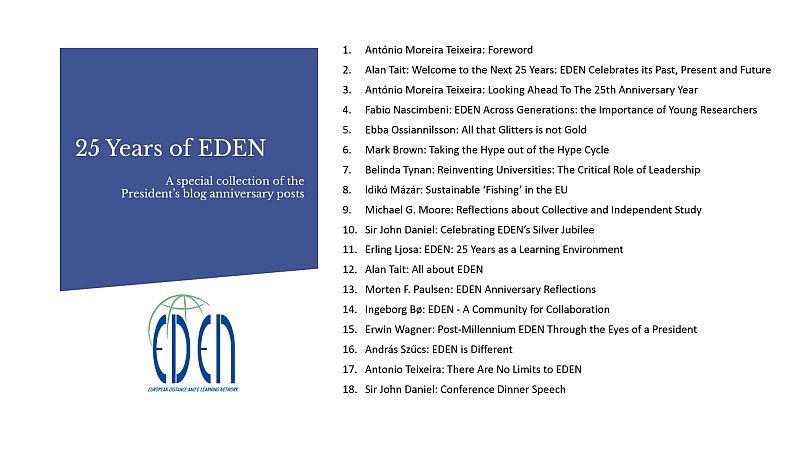
NooA’s ark
We reached the town of Arendal on the 4th of July. The turning point of our twelve-day journey along the Oslo Fjord. Passing Husøy, Verdens Ende, Stavern, Langesund, Kragerø, Portør, Risør and Lyngør. A journey for two. To experience the magnificent coastline, islands, light houses, stars, seabirds and surfs in Blåmann. The faithful 22-foot Polar boat with fiberglass hull, wooden interior and a 28-horsepower engine. A boat with few conveniences. Which seldom exceeds ten knots.
We slept in open air as the boat bobbed on the water. Woke up with the sea gulls, washed and brushed teeth in salt seawater. Answered phone calls and e-mails from students and prospective students who used the summer vacation to study. Found guest harbours when we needed to shower and recharge the batteries. Sunny days and bright summer nights that made it possible to read until midnight without artificial light. So, I read The Sixties. The first of Ketil Bjørnstad’s six autobiographic novels. A chronology that inspired me to write My online education world.
In the boat, we had much time to discuss and reflect on NooA developments. Realize that we had more than 1500 registered users in 25 countries. Plan the launch of Moodle 3.1 and our new Norwegian B1 and B2 courses for immigrants. Discuss how we could improve marketing. Upgrade the students’ progress reports and course pages.
And contemplate on how worklife was changing.
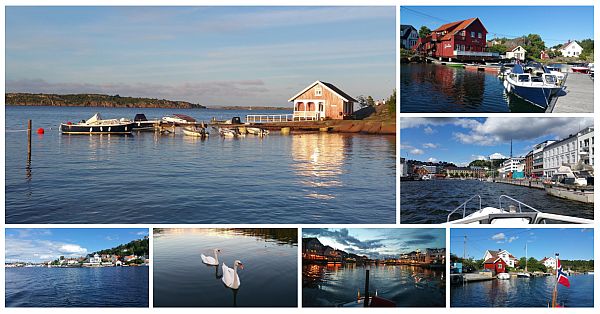
Digital citizens and online education immigrants
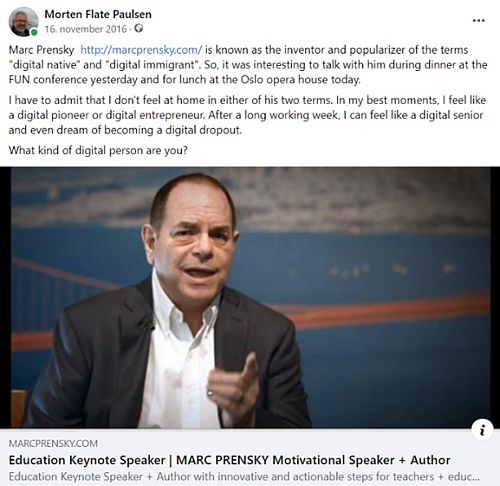 Marc Prensky. Citizen of the country that just elected Donald Trump as president. And Apple recently introduced wireless AirPods.
Marc Prensky. Citizen of the country that just elected Donald Trump as president. And Apple recently introduced wireless AirPods.
Known as the inventor and populariser of the terms «digital native» and «digital immigrant». So, it was interesting to talk with him during dinner at the FUN conference. Continue through the lunch with board members at the iconic Oslo opera house on November 16, 2016.
Admitted that I didn’t feel at home in either of his two categories. In my best moments, I felt like a digital pioneer or digital entrepreneur. After a long working week, I could feel like a digital senior and even dreamt of becoming a digital dropout.
In any case, Marc Prensky’s terms are handy. In an era where immigration is controversial and digitalization both integrate and segregate citizens around the world. And many on campus educators become online education immigrants in the well-established world of open and distance education.
The Brazilian profile
Daddy, daddy – I must show you something! Andrea was agitated on the December 2016 telephone call. Maybe her second-born son had got a new tooth?
But it was obvious when she showed me the Facebook profile. It all made sense. The hometown, the name and the facial features. The Facebook newcomer, primarily connected to family members and people in the local Brazilian community. It had to be Andrea’s biological mother.
When we adopted Andrea in 1993, I had never, ever imagined something like this. I had read disturbing and touching stories. Watched TV-documentaries about adopted children who got professional help to find their biological families. But never heard of anyone who casually succeeded through social media.
So, daddy. What shall we do? We agreed to discuss the unprecedented situation with the secretariat in Adopsjonsforum. Three generations together in the office: Andrea, her second-born, Nonno and Bestus. An eager but apprehensive Andrea decided to follow the advice from the meeting. First register a basic Facebook profile with her Brazilian name and hometown. Then contact an apparently close and resourceful Facebook friend of her Brazilian mother.
An emotional process for a young woman starting her own family in Norway. Recovering missing puzzles from her childhood. Reconnecting with her biological mother, twin brother and several Brazilian family members. With the help of Duolingo and Google translate. Struggling with language and cultural barriers. Helping her realize how privileged she was.

Vilnius ventures
Sat next to Petter Kjenlie December 14. On my third flight to Vilnius in 2016. Listened to his fascinating tales from the upcoming Norwegian TV2 reality series Øya. Where 12 men were provided with video cameras to document their struggle to find food and survive on an isolated island in the Pacific Ocean. Learned how Petter benefited from his military training and dramatic experiences from Libanon.
Followed Petter around Vilnius that evening. In search for Caterpie, Rattata and 150 other virtual spices that invaded our augmented reality in 2016. Fascinated by the new AR game with 500 million downloads in 2016. The mobile phone challenge which combined GPS locations with local advertising to attract Pokémon Go hunters to the neighbourhood.
The next day, we were invited to a seminar and press conference arranged at the Lithuanian Parliament followed by a workshop at the National Library. As Flexible education Norway (FuN) and the Lithuanian College for Democracy were partners in the Norway Grant funded project: Smart public management in the public sector. A project that included development of online Moodle courses for public employees throughout Lithuania.
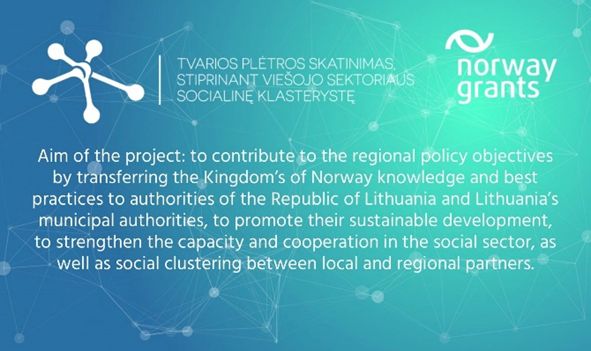
The project aim was shown on the big screen during the press conference. Sat next to Petter as we tried to figure out how we could “transfer the Kingdom of Norway’s knowledge and best practices to authorities of the Republic of Lithuania and Lithuania’s municipal authorities”. We were both grateful that Torhild Slåtto and Giedrė Kvieskienė handled most of these questions. My main contribution was a workshop presentation titled: Online education benefits.
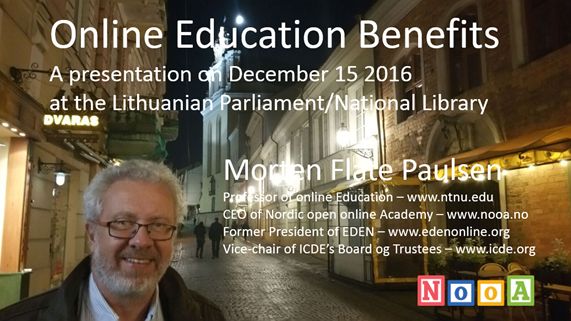
Grateful to Giedrė, Egle and the whole Kvieskienė family for their hospitality. Friends who introduced us to so many good people and interesting experiences in Lithuania. Recommendable local restaurants and nice concerts. The central Christmas market and a memorable visit to the historic town of Trakai. With its beautiful lakes and island castle.
My 2016 minutes
- January 14 – WHO declared the two-year Ebola epidemic in West Africa over.
- March 1 – NetCom changed name to Telia.
- April 3 – The Panama Papers revelations.
- April 11 – The Church of Norway decided that people of the same sex could marry in the church.
- June 8 – The Norwegian Parliament decided that Sør-Trøndelag and Nord-Trøndelag should be merged into Trøndelag county from 1 January 2018.
- June 23 – The Brexit referendum ends with a majority of 51.9 % in favour of the UK leaving the EU.
- July 13 – Theresa May took over as Prime Minister of the UK after David Cameron resigned as a result of the Brexit referendum.
- July 14 – More than 80 people were killed in a terrorist attack on the Promenade des Anglais in Nice.
- July 15 – A military coup was put down in Turkey.
- August 5 – Norwegian princess Märtha Louise and Ari Behn announced divorce.
- August 31 – Dilma Rousseff was ousted as Brazil’s president following an impeachment trial.
- November 8 – Donald Trump was elected president of the United States. The Republican Party retained the majority in both houses of Congress.
- December 19 – Twelve people were killed and 49 injured in a terrorist attack on a Christmas market in Berlin.
My 2016 publications
Morten F. Paulsen: EDEN Anniversary Reflections. In 25 Years of EDEN A Special Collection of the President’s Blog Anniversary Posts. Edited by António Moreira Teixeira, András Szűcs and Ildikó Mázár.
My 2016 presentations
Campus NooA – The Nordic open online Academy. A 10-minute presentation in Vilnius. May 2016.
Online education benefits. A presentation at the Lithuanian Parliament/National Library 15.12.16.
Fjernundervisning i Norge. UC Sjælland, Campus Roskilde. FLUID konferanse, 02.06.16.
2017 Coming to Kragerø
The ICDE Board of Trustees
ICDE President Mandla Makhanya joined us via Zoom from UNISA in South Africa. As we met February 15 2017 in the office ICDE shared with FUN at Lilleaker in Oslo. When Helmut Heyer and I formally took over as chair and vice chair of ICDE’s Board of Trustees. After David Sewart, former Director of Student Services at the Open University in UK. And Svein O Haaland, former Rector of Lillehammer University College in Norway.
Our task was to monitor the conduct of the Secretary General and the members of the Executive Committee. Together with board members from three continents. Tian Belawati, Stavros Xanthopoylos and Meg Benke. As a Norwegian, I had a special obligation to follow ICDE’s operation as a company supported by the Norwegian government and registered in Norway.
An honour and an interesting opportunity to get thorough insight in ICDE’s work and strategic documents. An unpaid assignment I accepted when I heard the workload primarily was to write the annual appraisal report.
I later realized how much I underestimated the workload and responsibility.
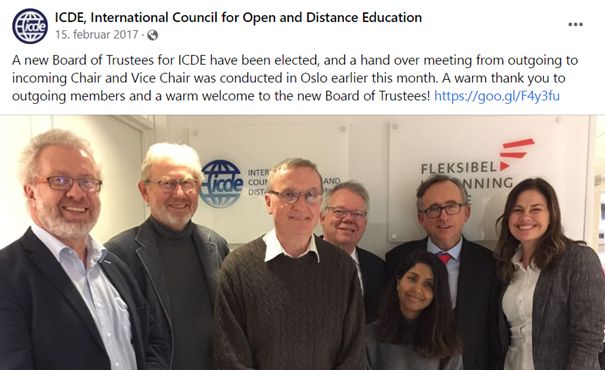
From left in the picture: Board members Morten Flate Paulsen, Svein O Haaland, Dawid Sewart and Helmot Heyer. Secrettariat members Caroline Seville, Gard Titlestad and Torunn Gjelsvik.
Headlines from EADL in Copenhagen
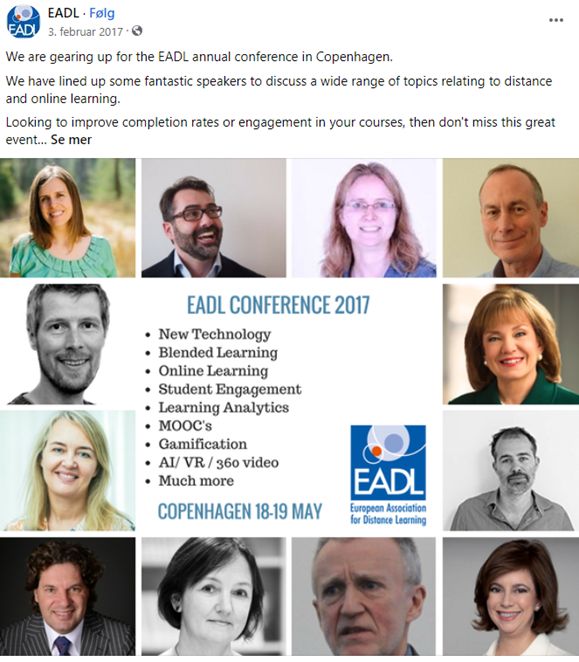 What is your first memory? A sight, touch, smell, taste or sound? Does your answer reveal something about your senses and learning preferences?
What is your first memory? A sight, touch, smell, taste or sound? Does your answer reveal something about your senses and learning preferences?
Questions I remember from the EADL Copenhagen conference dinner on May 18. Triggered by a talk by Danish composer, sound artist and researcher Hans Sydow.
Also remember Dirk van der Mark’s dinner speech. Reflecting his 12 years as EADL president. Thanking executive director Kees Veen for his support during all these years. Before Dirk introduced John Trasler as new president.
After dinner I had to chat with Dirk and Kees. Reminiscing all R&D committee meetings we had. And the transformation of Headlines from a paper-based to an electronic newsletter.
The conference was prepared and hosted by EADL, Fluid in Denmark, FUN in Norway and the Nordic network for adult learning (NVL). Located at Park Inn Radisson Copenhagen Airport Hotel. Focusing on the theme Presence at a Distance – Technologies and Methods for Learner Engagement.
We were welcomed by Jørgen Grubbe on behalf of the Nordic hosts and EADL president Dirk van der Mark. I was happy that EADL sponsored my trip and asked me to share some experiences from NooA.
Three presentations focusing on new learning technology triggered my curiosity: Roy Clariana from Penn State argued that artificial intelligence and virtual reality could create an intelligent virtual environment. Simon Egenfeldt-Nielsen talked about serious interactive games. And Frank Ulrich asked whether 3D learning environments could enhance learning.
After the FLUID annual general meeting, I got updates on more FLUID developments from Poul Tang. Who took over as head of the secretariate in 2016. After Astrid Berg who held the position from 1999.
EDEN 2017 Jönköping
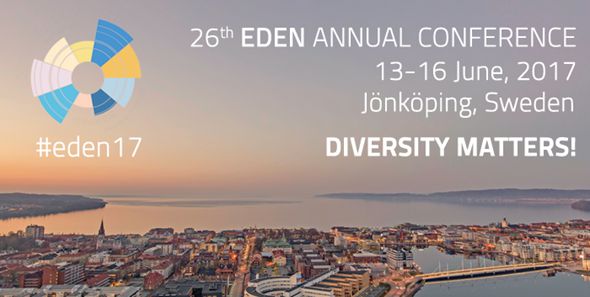
Drove about five hours from Oslo listening to Swedish FM radio. Frustrated that Norwegian national radio stations gradually dropped FM radio during 2017. As an expensive national network for Digital Audio Broadcasting (DAB) took over. And Norwegian listeners had to buy millions of new DAB receivers. In a time we already could listen to digital radio with mobile devices connected to the internet.
Headed towards Jönköping. A town by Sweden’s second largest lake Vättern. Three car hours southwest of Stockholm. Which reminded me of the hijacked truck which speeded into the crowd on Drottninggatan on April 7. And crashed into the entrance of the Åhléns City department store. Three people died immediately and three more later in hospital. 15 were injured, 9 of them seriously. Just a few months after twelve people were killed and 49 injured in a similar terrorist attack at the Christmas market I had visited during Online Educa in Berlin.
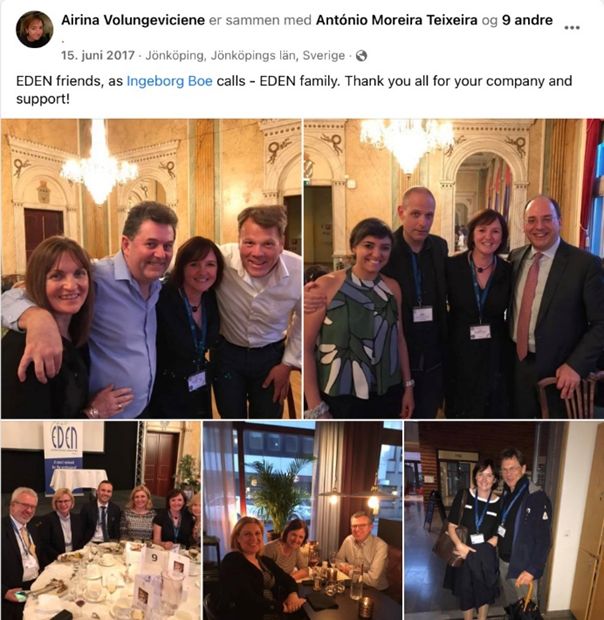
Attended the EDEN annual conference June 13-16 at Jönköping university. Focusing on the theme Diversity Matters! Together with more than 200 not so diverse participants from 36 countries.
The welcome reception took place in the assembly hall of Jönköping University’s School of Education and Communication. EDEN president Airina Volungeviciene presented Senior Fellow Awards to Steve Wheeler, Gila Kurtz, Jack Koumi and Wim van Petegem.
Realized that I spent more time socializing with colleagues than attending the conference sessions. As I carried out my NooA work and tried to find new Nordic and European project partners. And enjoyed the parade of students celebrating their graduation from secondary school.
Remember that roam like at home was my favourite small talk theme. As the expensive roaming charges in EU ended June 15, 2017. Meaning that we could use our mobile devices in EU and pay the same as at home. Felt it brought Europe closer and made my European work and travel easier. Since mobile phone calls and internet access suddenly became much more affordable.
I sat next to Lindköping mayor Helena Balthammar during the conference dinner at the beautiful Elite Stora Hotellet. She probably wondered if I had a special attraction towards female mayors. When I told her that I just had a childhood dream fulfilled. With the June 2nd costal journey from Oslo to Sætre with the tall ship Christian Radich. Documented with my photo of three female mayors at the helm. Celebrating the upcoming mergers of their Asker, Hurum and Røyken municipalities.
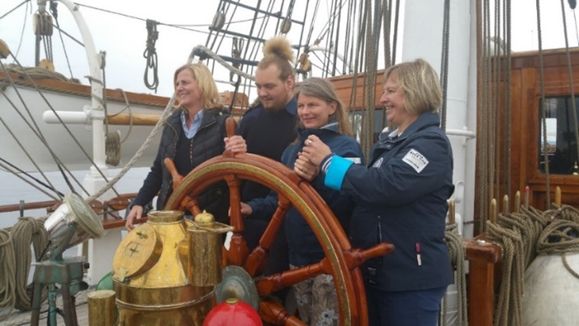
The photo shows mayors Lene Conradi (Aasker), Monica Bratlie (Hurum) and Eva Noren Eriksen (Røyken).
A digital front to the waterfront
Climbed the narrow stairs to the first-floor bedroom in the old fisherman’s house around midnight October 27. To spend the first night in the house we took over in the morning. The white, wooden house which was built in Urene (the Boulders) on the island Øya in Kragerø about 1880. Exhausted after hauling all the furniture temporarily stored in a local garage. Just in time to welcome the first guests to my 60th anniversary reception in the morning.
The plan was to work less and have more time to enjoy the 495 islands in the Kragerø archipelago. Well, sometimes God laughs when people make plans.
Anyway, Kragerø is a small town by the Oslo Fjord. Very proud of its waterfront and slogan “The pearl among the coastal towns”. A municipality with a population of 11000 which at least quadruple when the summer tourists invade the islands. An aging community that booms during summer but needs more winter jobs and activities to attract young families. And a reputation of accepting newcomers first after three generations. A reputation that reminded me of my conversation with Mark Prensky about digital immigrants. And made me wonder if small towns could use the internet better to improve their attractiveness?
My hindsight experience is that digital immigrants can benefit much from digital channels as they venture into local communities. I learned a lot about Kragerø’s history, art life, cultural activities, geography and inhabitants from the digital archive of the local newspaper KV. However, Google and Facebook were my primary gateways to Kragerø.
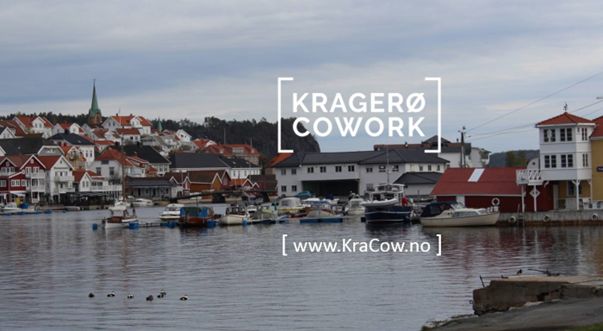 I met local entrepreneurs through the Facebook group Gründergruppen and in the popular local café Hos Gro. As a result, I started Kragerø Cowork with Nora, Martin R, Tore and Martin E. With a pre-covid ambition to build a vivid work environment for summer guests, young entrepreneurs and digital startups. About 20 central office spaces on the waterfront. And local initiatives around the digital channels Lokalnytt and Kragerøpodden.
I met local entrepreneurs through the Facebook group Gründergruppen and in the popular local café Hos Gro. As a result, I started Kragerø Cowork with Nora, Martin R, Tore and Martin E. With a pre-covid ambition to build a vivid work environment for summer guests, young entrepreneurs and digital startups. About 20 central office spaces on the waterfront. And local initiatives around the digital channels Lokalnytt and Kragerøpodden.
I used the search term “Urene in Kragerø” to find information about our neighbourhood. And was surprised that a tiny neighbourhood with only eight houses could leave such a large digital footprint. So many digitized paintings and photographs. After John-William Edy first painted Urene about 1810, Edvard Munch and numerous other artists had painted the cliff and picturesque houses. Many historical photographs were taken early in the nineteenth century by Kragerø’s prominent photographer, Anders Beer Wilse.
Many of these paintings and photographs are available at diditaltmuseum.no. And in KV’s digital archives. Thanks to KV journalist Jimmy Åsen’s keen interest in local art and history.
Google is often an excellent tourist guide to small towns. So, Kragerø could benefit from better online information about its rich history of art and photography. More information in English about Edvard Munch’s, Theodor Kittelsen’s and Anders Beer Wilse’s important work in Kragerø would probably attract more foreign tourists.
Examples of useful Facebook groups were: What’s happening in Kragerø, You know you are from Kragerø and the local Øya neighbourhood group. Many locals and islanders included us as Facebook friends. Virtual friendships that often resulted in face-to-face communication and further friendships. Digital links to the local community during work travels.
So, people who consider moving to a small town, should use the digital opportunities to connect with the community. In the same way, I encourage small towns and their residents to welcome immigrants in all digital channels.
Naturally, there are also lots of informative and useful websites that make up small towns’ digital fronts. Numerous websites say a lot about Kragerø’s identity, competence and self-esteem. Important websites that influence how digital tourists and immigrants experience Kragerø.
Maybe it even is time for Kragerø to transfer some resources from its waterfront to its digital front?
My 2017 minutes
- January 1 – António Guterres succeeded Ban Ki-moon as UN Secretary-General.
- January 1 – The Church of Norway became a legal entity separated from the state.
- January 11 – The switch-off of the nationwide FM network in Norway started in Nordland County.
- January 27 – President Trump imposed an immediate travel ban on Iranian, Iraqi, Libyan, Somali, Sudanese, Syrian and Yemeni nationals by executive order.
- February 1 – The first church wedding of a same-sex couple in Norwegian history took place in Eidskog church – two days after the Church meeting adopted the liturgy for this.
- April 7 – 4 people were killed in a terrorist attack in Stockholm.
- May 7 – Emmanuel Macron won the presidential election in France.
- May 17 – Norwegian Joshua French, sentenced to death, came to Norway after being released from prison in the Democratic Republic of the Congo.
- June 1 – US President Trump announced that the US would withdraw from the Paris Agreement to reduce global warming.
- August 9 – Norwegian athlete Karsten Warholm won gold in the 400-meter hurdles during the World Championships in London.
- October 27 – The parliament of the autonomous region of Catalonia voted to secede from Spain.
My 2017 publications
My 2017 presentations
Video greeting to ICDE’s 50th anniversary in Oslo.
2018 Serving ICDE
The ICDE Board in my Oslo winter wonderland
The ICDE Executive Committee met in Oslo January 22 and 23, 2018. At the Lysebu conference centre. Close to Nordmarka, my childhood’s precious winter sport refuge. Were we had to ski more than 300 km in one season to get the children’s gold badge in cross country skiing.
Reminded me of the ICDE dinner I attended at the nearby Holmenkollen Park hotel on April 28, 2014. Concluding an ICDE executive meeting and international workshop on policy for Open Educational Resources (OER) and less used languages – such as Norwegian. Nine partners from eight countries summed up results from the LangOER project – in English. Enjoyed interesting talks with Maxim Jean-Louis. Wondered if he was interested in hosting an ICDE conference in Canada. Laughed when the sommelier retorted “MAGNUM” when Maxim asked which wine he preferred.
Back to the 2018 meeting. Gard Titlestad and Torunn Gjelsvik represented the ICDE Secretariat. Helmut Hoyer and I the Board of Trustees. We met the new ICDE Board as Belinda Tynan was constituted President. Met her, Neil Fassina and Hyzel Rymer for the first time. Said hello to Tolly Mbwette as he joined in via video from Tanzania.
Realized that Gard had arranged a horse sleigh surprise when we heard the jingle bells. A memorable and cold experience. With beautiful views over Oslo in a frozen winter wonderland. Maybe not so much appreciated by people living closer to the equator. At least, I came home with a better understanding of the geographical and cultural challenges ICDE faced as a truly global organization. And new insight for the Board of Trustees’ appraisal report.
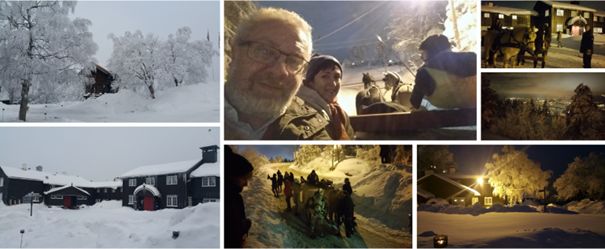
On EADL crutches in Manchester
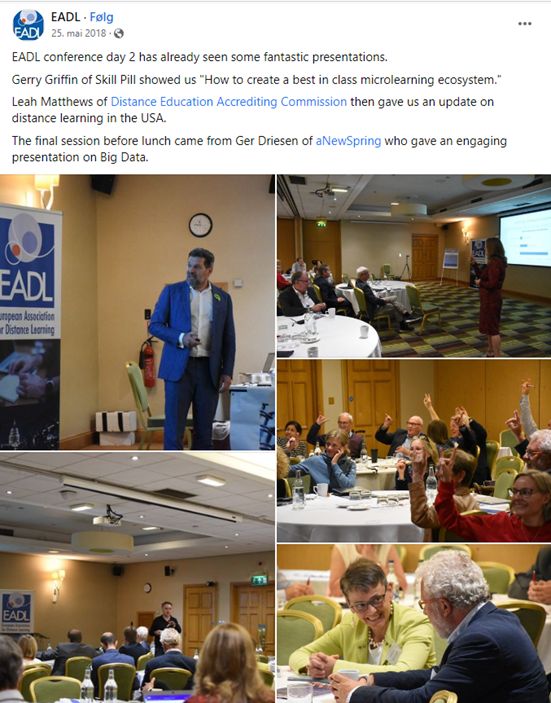 Entered the Victoria and Albert Marriot hotel with crutches. Seven weeks after a squash inflicted meniscus injury. To attend EADL’s annual conference in Manchester, May 24 & 25. Under the slogan: Making Learning Visual and Viable.
Entered the Victoria and Albert Marriot hotel with crutches. Seven weeks after a squash inflicted meniscus injury. To attend EADL’s annual conference in Manchester, May 24 & 25. Under the slogan: Making Learning Visual and Viable.
After the social evening at the Manchester Museum of Science and Industry, happy colleagues went on a pub-to-pub crawl. Soon realised that I could not keep up with them on crutches. Fortunately, Kari Olstad showed concern for me. Bought a bottle of wine and joined me on a bench in a neighbourhood park.
Told her that I looked forward to next week’s FuN board meeting in Bodø. The last one before Torunn Gjelsvik took over after Torhild Slåtto. Listened to her passionate fascination for karate, packrafting and paragliding. Congratulated her for launching the English version of FuN’s Guide to Quality in Online Teaching and Learning.
Discussed Mie Buhl’s and David Patterson’s keynotes about pedagogical and technical aspects of flexible learning. Niels Henrik Helms’ presentation on digital story telling. The workshops about smartphones, animated videos and virtual realities in education.
Wondered what we would learn from next day’s exciting program. Leah Matthew’s update on distance education in the US. Ger Driesen’s presentation about big data. Garry Griffin’s promotion of microlearning. Unfortunately, cyclist Donald Clark’s presentation about artificial intelligence for education was cancelled.
Returning to the hotel we exchanged ideas about what I should focus on during the panel session. Discussing quality control with Tony Hopwood, Ger Driessen and Martin Kurz. Agreed that I should share experiences with online courses provided by partners in NooA’s Moodle platform.
My final conference memory was the informal meeting with EADL President John Trasler and R&D committee members about next year’s conference. And that they listened to my advice about taking the conference to Tallin.
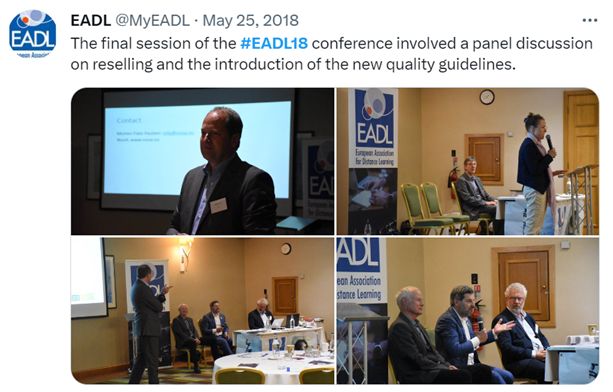
In Genova with EDEN and ICDE
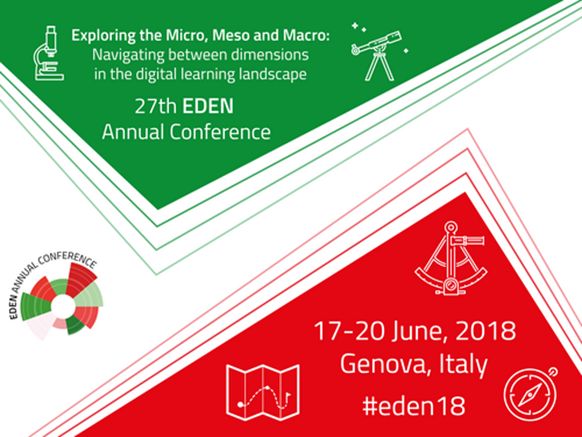 Helmut Hoyer called me several times in Genova. As I attended EDEN’s annual conference in June. Asked if I could take over a period until ICDE could find a new permanent Secretary General. Since Gard Titlestad was about to retire.
Helmut Hoyer called me several times in Genova. As I attended EDEN’s annual conference in June. Asked if I could take over a period until ICDE could find a new permanent Secretary General. Since Gard Titlestad was about to retire.
A challenging position to hold on top of my responsibilities in NooA. But realized that it was a once-in-a-lifetime opportunity. And that few others had followed ICDE more closely since the secretariat was established in Oslo in 1988.
So, I spent the conference days contemplating the future. Consulted Alan Tait. And decided to accept if I could serve until the end of 2019. To host the upcoming ICDE World Conference.
The EDEN’s 27th annual conference at the University of Genoa was organised with the Italian Education and Media Conference (EMEM). The theme was: Exploring the Micro, Meso and Macro – Navigating between dimensions in the digital learning landscape. Making me reflect on the huge differences between my two priorities NooA and ICDE.
Remember the communicating with EDEN president Airina Volungeviciene, vice president Sandra Kucina Softic, Andras Szűcs, António Teixeira and Alan Tait about a new EDEN Fellow council. That the conference dinner took place at the huge aquarium with spectacular views of the old Genova Port. And the discussions about blockchain technology in education. Spurred by a recent article in Forbes titled Imagining a Blockchain University.
The article quoted Joshua Broggi, the founder of Woolf Development, a platform startup that would use distributed ledger technology to remove higher education intermediaries, support decentralized governance and ensure data security. Broggi claimed that they would use blockchain to manage custodianship of student tuition, enforce regulatory compliance for accreditation and automate administrative processes. Compared the platform to Uber for students and Airbnb for academics.
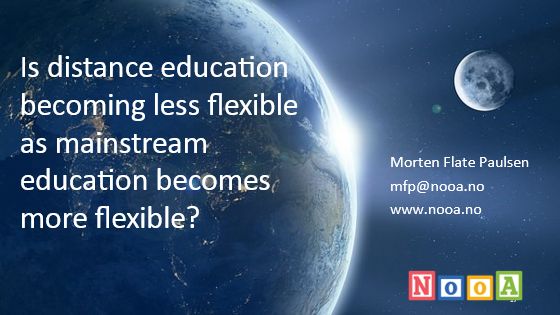 Most memorable was the establishment of the EDEN Fellows Council. And the EDEN Fellow’s meeting. In which I gave a short presentation including this statement:
Most memorable was the establishment of the EDEN Fellows Council. And the EDEN Fellow’s meeting. In which I gave a short presentation including this statement:
I’m worried that open and distance education becomes less flexible as mainstream education becomes more flexible.
Traditional distance and online institutions are merged with, or acquired by, larger mainstream institutions that intend to become more flexible. The result is often that the smaller institutions must adapt to the more rigid culture and systems of the larger institutions. National quality assurance schemes and agencies establish schemes for online education that are founded on not so flexible mainstream education.
Headed home from Genova with the train Nice. Along the beautiful Riviera di Ponente. The coast of the setting sun. Visited a former colleague in the picturesque town of Imperia and spent a night in Ventemiglia. An experience that increased my desire to explore more of the wonderful Italian coasts.
Commemorating Ingeborg Bø
The Bryn church was filled with people to commemorate Ingeborg Bø on August 16. Exactly 30 years after she hosted ICDE’s World Conference in Oslo.
I was nervous. Had accepted to say some words in the church. On behalf of three organisations close to Ingeborg’s heart. Flexible education Norway, EDEN and ICDE. Three associations I entered in her footsteps.
Emotional since she was my most trusted ICDE and EDEN mentor. As I followed her battle with ALS. The gruesome disease my father struggled with. So, when my children grew up without grandparents, I wished we had a grandmother like her.
The obituary I posted at ICDE’s website is included in the following:
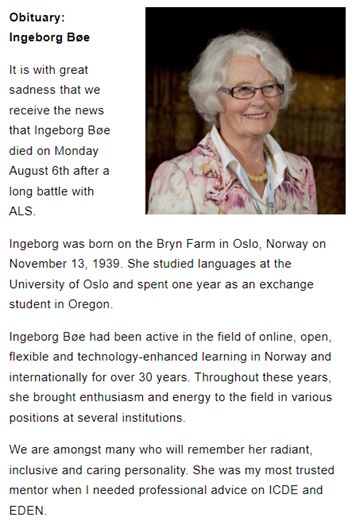 It is with great sadness we receive the news that Ingeborg Bø died on Monday August 6th after a long battle with ALS.
It is with great sadness we receive the news that Ingeborg Bø died on Monday August 6th after a long battle with ALS.
Ingeborg was born on the Bryn Farm in Oslo, Norway on November 13, 1939. She studied languages at the University of Oslo and spent one year as an exchange student in Oregon.
She had been active in the field of online, open, flexible and technology-enhanced learning in Norway and internationally for over 30 years. Throughout these years, she brought enthusiasm and energy to the field in various positions at several institutions.
We are amongst many who will remember her radiant, inclusive and caring personality. She was my most trusted mentor when I needed professional advice on ICDE and EDEN.
She served as a member of the ICDE Board of Trustees and Chair of the ICDE Election Committee for over a decade and was key in the reorganisation of ICDE in the new millennium.
She was also a member of different boards of directors in other institutions for adult and distance education as well as several national and international committees. Ingeborg was a member of the Board of Directors of the European Foundation for Quality in E-learning (EFQUEL) and a member of the Awarding Body UNIQUe, the Quality Label for the Use of ICT in Higher Education.
From 2003 to 2007, she served as President of the European Distance and E-learning Network (EDEN). After that, many of us feel that we belong to the EDEN family. In 2007 she was granted the title EDEN Senior Fellow.
Ingeborg spent 15 years as the Executive Director of the Norwegian Association for Distance Flexible Education (NADE), now FUN. She was also a member of the international editorial board of the journal LLine, Lifelong learning in Europe and speaker and member of programme committees at several national and international conferences.
Her professional life was dedicated to the field of open and distance education in different positions. She started her career at NKS, one of the biggest distance education institutions in Norway.
In recognition of her many years of exceptional service to distance education, her broad expertise in the field, her enthusiasm in fulfilling her positions and her dedication to the field, she was in 2009 awarded the Norwegian King’s Medal of Merit in silver for service in the fields of art, science and industry and for outstanding public service.
After retiring she became the President of Seniornett Norway and ran her own consulting practice. After being diagnosed with ALS, she helped share information and knowledge about the disease.
Her progressive, optimistic and sensible approach helped shape ICDE as we see it today. She has remained a respected and treasured member of our professional community and a true symbol of ICDE. Her positive spirit, sparkly personality, and contagious energy will be missed and remembered with the fondest of memories.
Women in Salerno
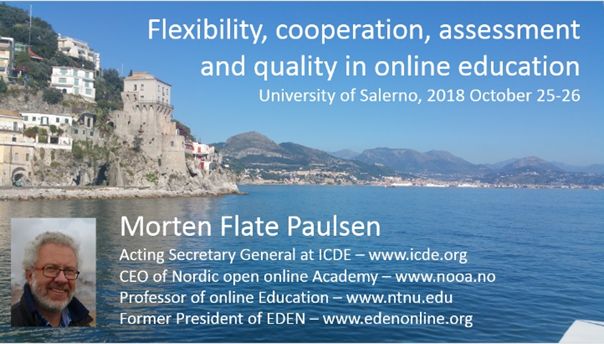 The Italian driver was an artist. Navigating the bus from Naples down the narrow and winding roads towards Amalfi. The town that gave name to the whole beautiful coastal region. The epicentre of limoncello. Where Norwegian playwright Henrik Ibsen wrote A Doll’s House in 1879. One of the most performed plays in world history. Often considered as a feminist play in a male dominated world.
The Italian driver was an artist. Navigating the bus from Naples down the narrow and winding roads towards Amalfi. The town that gave name to the whole beautiful coastal region. The epicentre of limoncello. Where Norwegian playwright Henrik Ibsen wrote A Doll’s House in 1879. One of the most performed plays in world history. Often considered as a feminist play in a male dominated world.
Took the short trip with a coastal ferry to Salerno October 26. Invited by Antonella Poce to give a keynote presentation titled: Flexibility, cooperation, assessment and quality in online education. And present ICDE at the International SIRD Conference in Salerno. Organized by the Italian Society of Educational Research.
More than 200 people in the audience and 90 % were women.
Since it was hard to follow the presentations in Italian, my thoughts drifted. Wondered if the female advancements in the education sector had come too far? If female dominance in many western schools deprived boys enough male role models? Maybe a reason why so many boys struggled in primary schools? And dropped out of secondary schools? And female students gradually outperformed males in many universities?
At the end of the conference, a number of delegates were awarded for outstanding contributions to the field. All award winners were women.
eNEETs in Varna
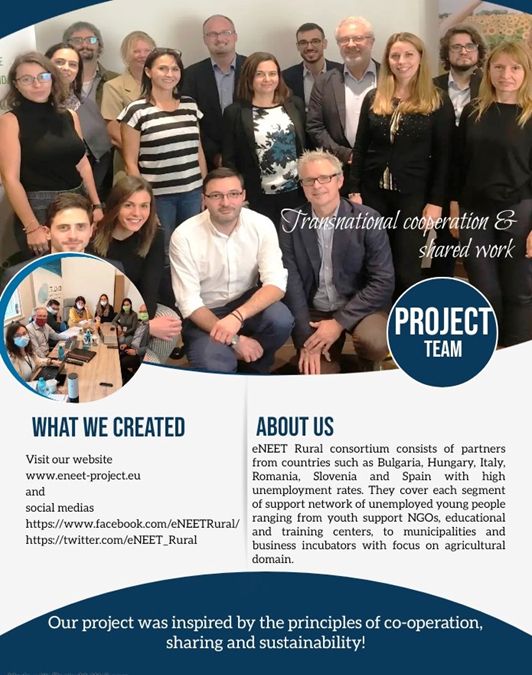 Flew with Paul Bø to Varna November 10, 2018. Bulgaria’s third-largest city and a nice seaside resort on the Black Sea Coast. Walked on the beach and ended the day in a local microbrewery to taste seven different kinds of beer.
Flew with Paul Bø to Varna November 10, 2018. Bulgaria’s third-largest city and a nice seaside resort on the Black Sea Coast. Walked on the beach and ended the day in a local microbrewery to taste seven different kinds of beer.
Paul was as usual in an enthusiastic mood. So, I learned much about his passions for beer, church and soccer. His favourite teams Vålrenga and Manchester United. Led by Norwegian manager Ole Gunnar Solskjær.
Discussed the NooA courses his firm Inclusion offered to international entrepreneurs who wanted to start a business in Norway. A collaboration that led us into the eNEET Rural project.
So, we talked about NEETs. People who are Not in Education, Employment or Training. How we could help young NEETs in rural areas with online entrepreneur courses.
The project was funded by the EEA and Norway grants. The full project title was eNEET Rural: Facilitating entrepreneurship and improving skills of NEETs living in rural areas. The main objective to create job opportunities for young people falling outside the labour market.
NooA’s Moodle platform was used to develop five online courses offered in seven languages. Developed in English and translated to Bulgarian, Romanian, Spanish, Italian, Slovenian and Hungarian. In close cooperation with our Slovenian project partners at Styrian Technology Park (STP): Matjaž Fras, Tanja Senekovič and Stefano Guardati. Competent partners that became friends.
The eNEET kick-off meeting was hosted by our Bulgarian partners at UBBSLA. The Union of Bulgarian Black Sea Local Authorities. Organized by the Bulgarian team: Mariana Kancheva, Todor Tonev and project coordinator Polina Antonova. With the help of Hungarian communication manager Patricia Merei.
In the evening, we enjoyed videos with Bulgarian nature and culture and a traditional Bulgarian dinner at Mariana’s beautiful house. A very pleasant evening that boded well for my next project meetings in Ljubljana and Oslo.
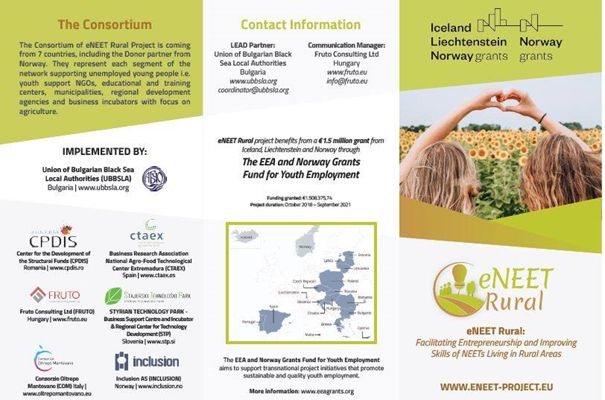
Successful senior entrepreneurs
It was surprising to receive a letter from Torbjørn Røe Isaksen. The Norwegian Minister of Trade and Industry. He had obviously noticed the Forbes article: Proof That The Most Successful Entrepreneurs Are Older Ones. Maybe one of his advisors had read about my NooA ventures in the November 2013 interview. Published by Norwegian Centre for Senior Politics. An interview that probably added several years to my mental age.
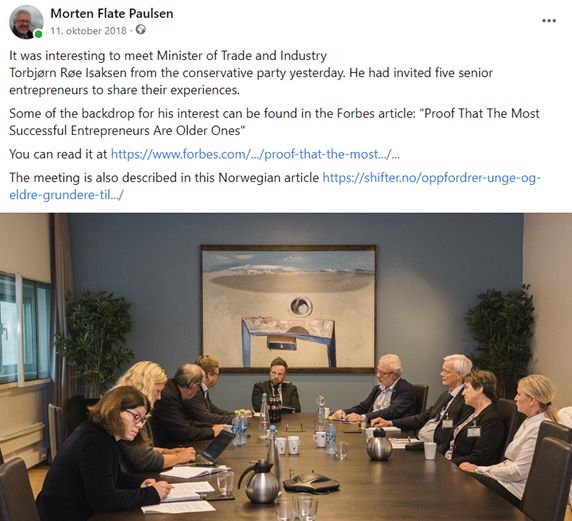 Anyway, the Minister invited us October 11 to share our experiences as senior entrepreneurs. Jan Sollid Storehaug (Tenk Digitalt), Sverre Olav Helsem (Gaitline AS), Øystein Rekdal (Lytix Biopharma), Jofrid Erland (Erland AS) and me (NooA).
Anyway, the Minister invited us October 11 to share our experiences as senior entrepreneurs. Jan Sollid Storehaug (Tenk Digitalt), Sverre Olav Helsem (Gaitline AS), Øystein Rekdal (Lytix Biopharma), Jofrid Erland (Erland AS) and me (NooA).
The invitation was a welcome opportunity to reflect on my experiences from NooA, discussions with the other entrepreneurs at the Askershus coworking space and the online courses NooA offered to international entrepreneurs in Norway. Experiences that led me to conclude that successful entrepreneurs had to generate a comfortable income. And that they had three viable sources: grants, investors and revenues.
Many Norwegian start-ups spend a lot of resources writing applications to Innovation Norway. A governmental entity that supports innovation in start-ups and other companies. So, I contacted them. After a few exchanges about my NooA ambitions, I had a feeling that I was too old and academic. Because I needed more than an elevator pitch to explain my business ideas. Consequently, I realized that it was wiser to spend more time on NooA than Innovation Norway. And I still think many entrepreneurs should focus more on business than applications.
Investors are helpful for many start-up companies. And a lot of young edtech entrepreneurs have been funded by investors. The Norwegian company Kahoot was established in 2011. Launched a game-based learning platform in 2013. Became a popular platform and succeeded in attracting a lot of investments. But the company needed nearly a decade to make a surplus. Many other startups and investors were not so resilient and successful. So, I was ambivalent about investors. Realized that I was not good at pitching business ideas. Neither a young nor enthusiastic salesperson.
Since I established NooA in 2012, I had secured welcome developments grants from educational programs, but very limited investments from shareholders. Hence, my NooA work had primarily focused on creating income from enrolment in online courses.
With this experience, I asked my grey-haired network two questions with the intention of sharing the answers with the Minister. Why do seniors become entrepreneurs? And how can the government help senior entrepreneurs?
Concluded that many seniors are financially independent. Their mortgages paid down. Their children moved out. Some face a difficult job market. If they lose a job, it could be difficult to find a new. Others could retire, but desire to work and use their competence and experience. Improve their self-esteem confidence and contribute to society. Or eventually realize an old dream.
Found that government could come up with incentives that stimulate cooperation between junior and senior entrepreneurs. To combine young enthusiasm and new skills with wisdom and experience.
That the government could develop a support scheme for senior entrepreneurs. A scheme that addresses senior entrepreneurs need for basic income and experienced colleagues. A scheme that gives some financial support to certified companies that provide office space, collegial support and some wage to a senior entrepreneur for a two-year period. A scheme similar to the apprenticeship programme the government established to support both companies and young apprentices. While the limited wage paid to apprentices increase somewhat four times during the two-year period, the senior entrepreneur wage could decrease every six months before it finishes after two years.
Open Education Leadership Summit in Paris
Yellow vests. Required for motorists in case of emergency. And a highly visible and available uniform for the French populist grassroots movement. Demanding lower fuel prices, economic justice and political reforms. During the Open Education Leadership Summit at Le Conservatoire National des Arts et Métiers (CNAM) in Paris, December 3-4.
A summit ICDE organised in collaboration with the Open Education Consortium (OEC), the French Ministry of Higher Education, Research and Innovation (MESRI) and the French Ministry of National Education and Youth (MENJ).
The conference steering committee had a networking meeting with ICDE and OEC board members at Bistrot Renaissance on Sunday. A nice evening and a welcome first opportunity to meet face-to-face with Paul Stacey, Perrine de Coëtlogon and Jacques Dang. After extensive online activities during the conference planning. And my frustrations related to French bureaucracy. Solved with the good work of Caroline Seville and Snorre Qveim-Leikanger.
At the opening session I welcomed about 200 leaders and senior managers from 50 countries. Introduced distinguished colleagues from the conference organizers: ICDE President Belinda Tynan, OEC President Sophie Touzé, strategic counsel for digitalisation at MESRI Mehdi Gharsallah and chief digital officer at Conservatoire National des Arts et Métiers (CNAM) Thierry Koscielniak.
The summit had two concurrent strands of activities: thematic keynotes and roadmap creation. The thematic keynotes focused on various forms of open education. Including Open Educational Resources (OER), MOOCs, open access, open science, open data and open-source software. OER recommendations, blockchains, micro-skills and open badges.
OEC’s executive director Paul Stacey explained the roadmap procedures (See www.oeconsortium.org/2019/01/oels2018/). And the participants joined in vivid collaborative groups to create thirteen roadmaps. Roadmaps that illustrated open education leaders’ areas of interest at the moment:
- MOOCs – Peace and Conflict Resolution
- Sustainable Development Goals
- Open Education Practices & Pedagogy
- Nursing OER
- Open Recognition & Badging
- Use of OER in Rural Locations & Global South
- Open Education Implementation & Culture Change
- Research on Open Education
- Open Education Policy & Advocacy
- Open Assessments
- OER Coaching
- net
- Multilingual OER and OER for Language Acquisition
The cocktail dinner was located at Musée des Arts et Métiers. CNAM’s Museum of Arts and Crafts. Displaying an original version of the Foucault pendulum, the original model of the Statue of Liberty and Blaise Pascal’s first mechanical calculator. An interesting venue well suited for social networking. To be reminded that French football team won the 2018 world championship in Russia. To be intrigued by Belinda Tynan’s interest in graffiti. Reminisced by Som Naidu about our common history in open education and the changing interpretation of the term open. And reminded of my limited knowledge about online education in Africa through colourful conversations with Tolly Mbwette. The ICDE board member from Tanzania who passed on too early in July 2020.
ICDE has a partnership with UNESCO, dating back to the 1960’s. So, it was a welcome opportunity to visit the UNESCO House at rue Miollins with Belinda and Caroline. Belinda ordered an Über taxi and remined us that we needed passports to enter the UNESCO house. The visit also included a brief meeting with Trine Jensen at the International Association of Universities (IAU).
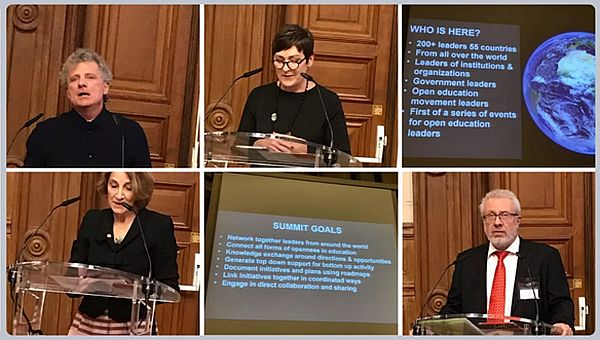
From top left: Paul Stacey, Belinda Tynan, Sophie Touzé and Morten Flate Paulsen. The picture shows one slide from Ebba Ossiannilsson’s presentation about the summit at ICDE’s session on Online Educa 2018.
Potsdam Portfolio
Travelled with my young and bright ICDE colleagues Snorre Qveim-Leikanger and Jean-Baptiste Milon to Potsdam on December 13. To meet with the EPICA partners at Seminaris SeeHotel. And discuss our Strategic Partnership for Co-Design of an Innovative and Scalable ePortfolio.
A project co-funded by EU’s Horizon 2020 programme. Including businesses, organisations and universities in Europe and Africa: ICDE, OUC, MyDocumenta, ICWE, the African Virtual University, the Open University of Tanzania, Makerere University and Maseno University.
Project coordinator Jean-Baptiste Milon started the meeting with a progress update since the previous Tanzania meeting in July 2018. Rebecca Stromeyer welcomed us to Potsdam. And I was introduced to the competent, devoted and cheerful participants.
It was nice to reconnect with Ildikó Sünci Mázár who was appointed as member of EPICA’s External Advisory Board. And I had a lot of fun and interesting talks with Marcelo Maina, Rebecca Stromeyer, Edephonce Nfuka and Marilena Cabral. Eager to learn more about the African Virtual University from Marilena. And about Rebecca’s entrepreneurial work with ICWE, Online Educa Berlin and eLearning Africa. An important annual conference I unfortunately have never visited. Even though the first conference took place in 2006 at the UNECA Headquarters in Addis Ababa.
The project used an ePortfolio solution developed by MyDocumenta. And explained an academic ePortfolio as a digital collection of a student’s course-related work. For example, essays, posters, photographs, videos, artwork, and other aspects of a student’s life. Such as volunteer experiences, employment history and extracurricular activities. ePortfolios should be online and support student learning. The student should decide who can view the ePortfolio and what artefacts get added. ePortfolios should remain the student’s property after finishing university.
We had some spare time to visit the Potsdamer Weihnachtsmarkt and the Sans Souci Palace. A rococo palace built by the Prussian King Frederick the Great. A summer palace which French name translates to – without worries. A place the king could escape the pomp and ceremony of the royal court. Enjoy his personal taste for design, decoration and homosexuality.
Returning home, the constant notifications from my mobile phone made me realize how important the free WhatsApp Messenger had become in Africa. Allowing the project members to send text and voice messages, make voice and video calls. To share images, documents and user locations.

You can read more about the EPICA project at https://www.epica-initiative.com/
My 2018 minutes
- January 12 – Oslo and Akershus University College received university status and was renamed OsloMet – Oslo metropolitan university,
- January 20 – Turkish President Recep Tayyip Erdoğan, announced a military offensive to capture a portion of northern Syria from Kurdish forces.
- February 9 – The Winter Olympics started in Pyeongchang.
- May 4 – The University of Southeast Norway was established as a merger between Telemark College, Vestfold College and Buskerud College.
- June 14 – The FIFA World Cup started in Russia.
- July 15 – France became world champion in football for the second time.
- July 20 – The General Data Protection Regulation (GDPR) took effect in Norway.
- August 14 – 43 people died in a bridge collapse in Genoa.
- October 2 – The Saudi journalist Jamal Khashoggi was killed in the Saudi consulate in Istanbul.
- October 28 – Jair Bolsonaro was elected president in Brazil.
- October 29 – Lion Air Flight 610 crashed in Indonesia and 189 people died.
- December 22 – A tsunami in the Sunda Strait of Indonesia killed at least 426 people.
- December 22 – A US government shutdown began because President Trump refused to approve a state budget without funding for a border wall with Mexico.
My 2018 publications
ICDE Annual Report 2018.
My 2018 presentations
Flexibility, cooperation, assessment and quality in online education. A presentation at the University of Salerno, 25-26.10.18. Available on YouTube.
Flexibility and limitations. A presentation at the EDEN Fellows Session, Genova 18.06.18
Quality care in the case of Reselling (Panel discussion). EADL Annual Conference, Manchester, 25.05.2018
2019 Celebrating online education around the world
Lifelong learning in Lillehammer
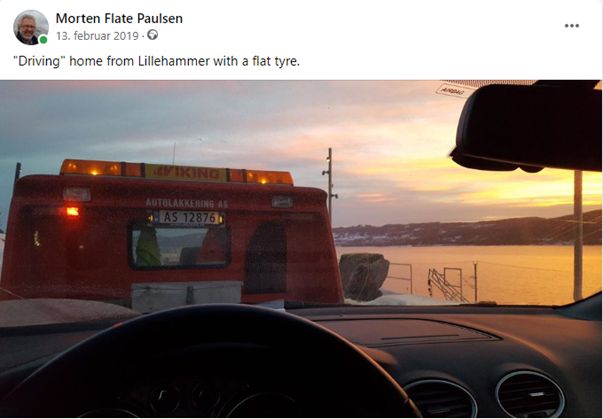 Drove home from Lillehammer February 13. Along Norway’s largest lake. Lake Mjøsa. On the truck bed of a rescue car. With a flat tyre.
Drove home from Lillehammer February 13. Along Norway’s largest lake. Lake Mjøsa. On the truck bed of a rescue car. With a flat tyre.
Had welcomed over 300 delegates from more than 30 countries to the Lillehammer Lifelong Learning Summit. On behalf of ICDE. Together with Kathrine Skretting. Rector of INN – Inland Norway University of Applied Science. Exactly 25 years after the opening of the successful Lillehammer Winter Olympics.
Recalled ICDE president and conference chair Neil Fassina’s eloquent introductions to panels and keynote presentations. Asha Kanwar’s and Diana Laurillard’s keynotes. Caroline Sevilles’ video interviews with prominent delegates. Informal conversations with Tian Belawati and Alastair Creelman. With George Ubachs about EADTU and its virtual mobility matrix.
Appreciated the excellent Lillehammer Conference team. Mette Villand, Brit Svoen, Yvonne Fritze, Per Eriksson and Jens Uwe Korten.
Wondered if NordFlexOn would take off after the inaugural meeting at the conference. Become a successful Nordic network for online education? Or another disappointment in my quest to foster Nordic cooperation? Anyway, ICDE volunteered to host it from 2019 to 2023.
Impressed by editor Ebba Køber’s efforts to present current matters on flexible education in Norway in the conference issue of Synkron. Focusing on artificial intelligence, virtual mobility and quality in online education.
Froze the cold, sparkling and magic moments from Hunderfossen Winter Park. Esperava que Carlos Alberto Oliveira e sua delegação brasileira aproveitassem o inverno na Noruega. Hoped that Tian Belawati appreciated visiting the Snow Hotel, Ice Bar, Ice Cathedral and the Fairy-tale Restaurant. All close to the Olympic Hafjell Ski Arena.
Glad I dared to sing Happy Birthday. From the podium. With a microphone in my hand. Far beyond my comfort zone. To follow Ann Tait’s secret request. Surprise Alan on his anniversary!
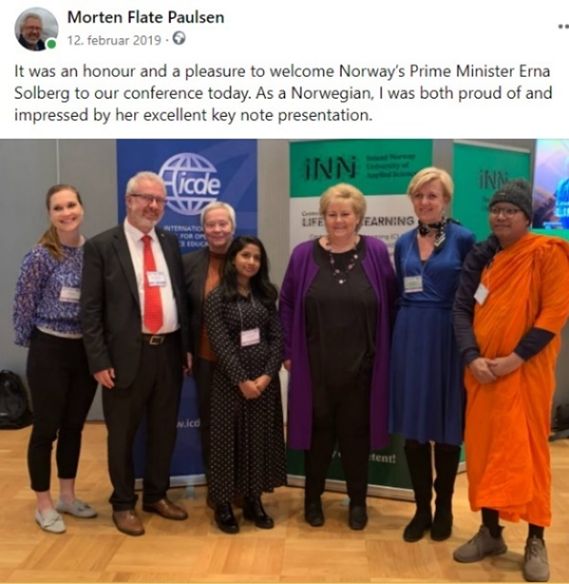 Recalled welcoming Norwegian Prime Minister Erna Solberg. Appreciated her keynote presentation. Stating that lifelong learning is a human right not a privilege. That flexible learning solutions are essential to the development of inclusive and sustainable societies.
Recalled welcoming Norwegian Prime Minister Erna Solberg. Appreciated her keynote presentation. Stating that lifelong learning is a human right not a privilege. That flexible learning solutions are essential to the development of inclusive and sustainable societies.
“We cannot accept that people become outdated”, she declared. “Continuous education is important in a time of major changes in the way we work. Many people will have changed jobs and even careers as a result of digitalisation in society. Both in order to keep the competitive edge and to prevent anyone from being excluded from work life, it is important to succeed in lifelong learning.”
Glad we were able to settle The Lillehammer Lifelong Learning Road Map for Lifelong Employability. Including these three levels of recommendations:
Governments and intergovernmental organisations should:
- support lifelong learning opportunities for all, for personal development, for social inclusion, for sustainability for society and business
- advocate, implement, monitor and increase incentives for lifelong learning
- establish a system for cooperation between employees, employers and educational institutions for building a lifelong learning ecosystem (including organisational, financial and methodological infrastructures)
- promote regional and global partnerships
- focus on developing the human capabilities needed to thrive in a sustainable digital age.
The education sector and public/private enterprises should:
- prepare educators for the digital world of work and study, including support to innovate collaboratively and sharing pedagogic designs to support diverse learners
- provide seamless pathways between formal non-formal and informal learning, for recognition, credentialing and creation of educational resources
- establish financially viable continuing education processes for employers and society
- use technologies that are relevant, flexible, accessible and affordable for all
- promote accessible lifelong learning opportunities that can be applied across cultures, languages, ages and abilities
- acknowledge and recognise different accreditation systems.
Educators should:
- ensure that learners feel that their competences, skills and their knowledge are useful and life-enhancing
- apply distant, online education and blended approaches designed to encourage critical and empowered thinkers, consumers and citizens, reflecting the global human experience
- integrate vulnerable groups as part of the lifelong process to be, to know, to do and to live together
- encourage learners to become self-motivated and self-confident to develop their knowledge, soft skills and digital literacy
- facilitate peer-to-peer learning and interactions, and at the same time develop personal learning environments (PLE) and personal educational networks (PEN).
UKOU’s 50th anniversary celebration
I was invited to a black-tie dinner hosted by Baroness Martha Lane Fox in London on May 16. To represent ICDE at Open University’s 50th anniversary. Along with students, teachers, stakeholders and celebrities. So, I had the opportunity to meet Sir John Daniel. Heard David Attenborough talk about his long-standing relationship with OU and its early collaboration with BBC. Listen to Robin Wilson’s recollections of OU’s early days. When his father Harold Wilson’s Labour government founded the university in 1969 and the first students enrolled in January 1971. Since then, over two million people across 157 countries had taken up courses hoping to change their lives.
Realized that Open University had been a role model for more than 100 open universities that later were established around the world. Listened to touching student testimonials. Acknowledged how much open universities meant for millions of students. Ordinary people and students with special needs. Single mothers, immigrants and inmates. Maybe an opportunity for Julian Assange who recently was arrested in London after seven years in Ecuador’s embassy?
On May 17th we went to the Seamen’s Church. To celebrate the Norwegian constitution day. Had coffee and waffles with some of the many Norwegian tourists, students and residents in London. Followed with a parade and festivities in the Southwark Park.
Ended the stay at the old Swan Pub May 18. Enjoyed the festive atmosphere as people from several countries cheered their national favourites in the Eurovision Song Contest. Felt the Spirit in The Sky when KEiiNO briefly topped the score board. A Norwegian band formed by singer and songwriter Tom Hugo, pop singer Alexandra Rotan and Sami rapper Fred Buljo. However, the Dutch table near the Arcade took home the victory.
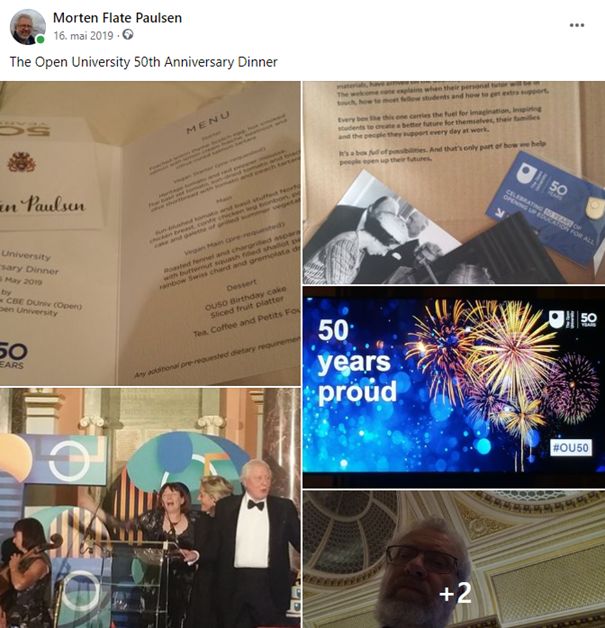
In Thailand with ICDE
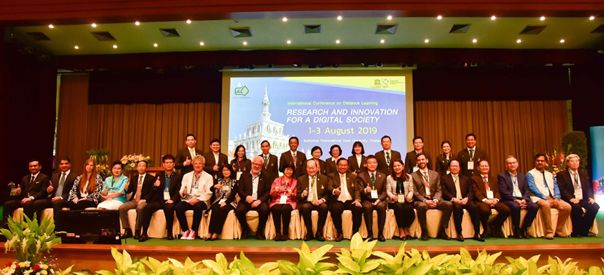
Had a wonderful vacation the last week of July. In Chaba Cabana Beach Resort at the Ko Samui Island. One night in Bangkok – as tourists. With adventurous Tuk Tuk rides, exotic food in Chinatown and a tourist cruise on Chao Phraya River. Strolled the lively local marked near the hotel. Selling snacks, handcrafts, fake designer goods and unfamiliar food. Scorpions, crickets and maggots?
Took a taxi to Sukhothai Thammathirat Open University (STOU) August 1-3. To attend the International Conference of Distance Education: Research and Innovation for a Digital Society. My first visit since the ICDE World Conference in 1992.
The university co-organized the conference with the Southeast Asian Ministers of Education Organization (SEAMEO), UNESCO’s Asia-Pacific Regional Bureau for Education (UNESCO Bangkok) and ICDE.
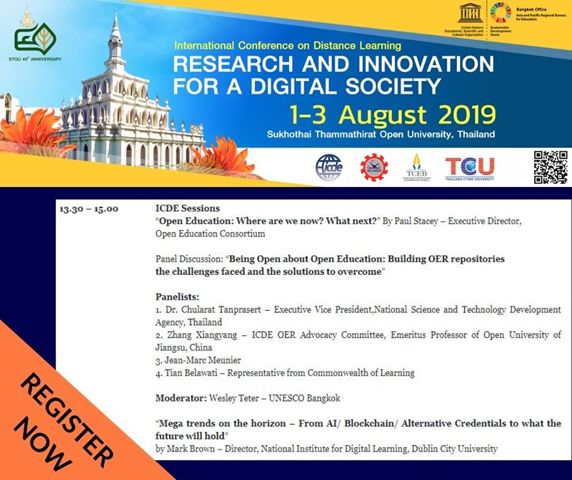
Before the conference started, Caroline Seville and I met with the presenters in the ICDE organized session. Paul Stacey from the Open Education Consortium talked about: “Open Education: Where are we now? What next?” Mark Brown from the Irish National Institute for Digital learning presented: “Mega trends on the horizon – From AI/ Blockchain/ Alternative Credentials to what the future will hold”.
Wesley Teter moderated the ICDE panel discussion on “Being Open about Open Education: Building OER repositories the challenges faced and the solutions to overcome”. The distinguished panellists were Chularat Tanprasert, Zhang Xiangyang, Jean-Marc Meunier and Tian Belawati.
My keynote presentation was titled: Innovations in online education. Some pioneering developments and current opportunities. A presentation that motivated me to write the first anecdotes in My online Education World.
Reminisced about the establishment of STOU and the 1992 ICDE World Conference at STOU. Over lunch with Wichit Srisa-an. Founding president of STOU, current chairman of the STOU Council and former Minister of Education in Thailand. Had interesting conversations with Ethel Agnes Pascua-Valenzuela about her work at the SEAMEO secretariat. And Wang Libing about UNESCO Bangkok.
Ended the day in a very nice restaurant garden with Caroline Seville. Thanking her for the excellent preparation of the ICDE conference session.
The social programme included a visit to Siam Niramit. Where we learned about Thai history and culture at the outdoor museum. Before we attended an immersive performance about Thai cultures and religions. Lots of beautiful traditional costumes, dancers and sceneries in combination with cutting edge sound and light technology.
We also toured the impressive Ayutthaya Historical Park. With the amazing ruins of the old city of Ayutthaya which was the capital of Thailand until it was destructed by the Burmese army in 1767.
After the conference, we spent a day at the floating market. Ended up in a sales exhibition for artful handcrafts with Rattip Phukkeson. Our nice, hardworking facilitator, guide and Head of International Affairs who deserves a big khàawp khun (ขอบคุณ) for making the visit to STOU one of my best conference experiences ever.
In Nepal with Oslo MET

Flew Quatar Airways via Doha. Arrived at the comfortable Summit Hotel in Kathmandu on September 13. Invited by Oslo Metropolitan University (OsloMet) to give a keynote at the closing conference for the NORHED Quantict project. A six-year project funded by the Norwegian Agency for Development Cooperation (NORAD). To integrate ICT in Nepalese education. A collaborative project between Tribhuvan University, Kathmandu University and OsloMet.
My colleges Monica Johannesen, Leikny Øgrim and Ellen Carm were the Norwegian project members. And local guides. Explained how improved ICT infrastructure could give more people access to education. As Nepal struggled to recover from the April 2015 earthquake which killed 8,964 people. Made hundreds of thousands homeless.
Booked a one-day guide who showed us the area. Holey cows in the road. Defined as Nepal’s national animal in the constitution. Continued to Nagarkot and lunch by the Hotel at the End of the Universe. Saw many colourful prayer flags. Meant to spread peace and prosperity with the wind. Going back, the dirt road was blocked by an excavator in a two-meter-deep trench. So, we started to walk as the driver waited in the car. The pedometer reached 20 000 scenic steps before he caught up with us. Ended up at the Kathmandu Durbar Square in front of the old royal palace of the former Kathmandu Kingdom.
Took a taxi to Chandragiri and the cable car to an altitude of 2551 meter. Somewhat annoyed that the young girl offered me a senior ticket. But it was soon eclipsed by the magnificent view to Himalaya and the 8848-meter-high Mount Everest. The world highest mountain. First climbed in 1953 by Tenzing Norgay from Nepal and Edmund Hillary from New Zealand. The first Norwegian expedition got a lot of publicity when it reached the peak in 1985. Maybe because it was led by Arne Næss jr. who was about to marry Diana Ross. More than sixty Norwegians have followed. Two women and six men only in 2019.
Telecom had reached Mount Everest. Since 2007, the climbers had been able to phone home with mobile phones. And Chinese Huawei was about to make 5G available in 2020. But over 300 people had died during expeditions to Mount Everest. And Robin Fisher was one of several climbers who perished in May. Just after he posted an Instagram warning from Basecamp 3. About tough conditions and fellow climbers who succumbed.
The ICT in education conference was held at the Yellow Pagoda Hotel. In her welcome address project manager Ellen Carm emphasised that the conference focused on three broad areas of ICT integration in education: access, quality and equity. My keynote was titled Flexibility and cooperation in online education. Some international developments and opportunities. Talked with Padam Raj Pant about ICDE and e-learning initiatives at the Nepal Open University. A quite new institution established by an act of parliament in 2016.
After the conference, we strolled the beautiful neo-classical Garden of Dreams and took a cab to Thamel. An area with many backpackers, inexpensive shops and cafes. Ended up with some beer in the nice garden at Kathmandu Guest House. Where we talked about the extraordinary hospitality and friendliness provided by all the Nepalese people we had met.
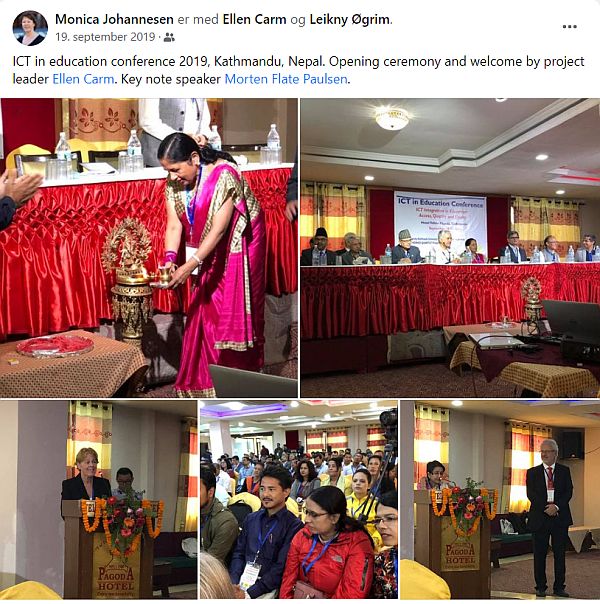
Online Educa ethics, big data and technology
I chaired a thought provoking ICDE panel on ethics, big data and technology. At Online Educa in Berlin on November 28. Inspired by a Wall Street Journal video titled How China is using artificial intelligence in classrooms. Showing primary school children with AI cameras and brain-wave trackers. Allowing teachers and parents to monitor and analyse their behaviour.
Asked the panellists how emerging technologies would influence personalisation, efficiency, costs, ethics and trust in flexible education.
Still remember Barbara Wasson’s opening statement. That AI enables computers to perform tasks that have required human cognition and human decision-making abilities. Followed by an interesting discussion among the other panellists: Snorre Qveim-Leikanger, Abdalla Uba Adamu, Anh Tho Andres-Kammler, and Conchur Mac Lochlainn.
A discussion that triggered my thinking. About personal data collected by the TikTok app which was introduced in 2016 by the Chinese company ByteDance. The security in telecommunication networks depending on technology from the Chinese company Huawei. The enormous number of surveillance cameras in cities. Consequences of massive use of facial recognition. And application of big data and learning analytics.
Went home more worried about the future.
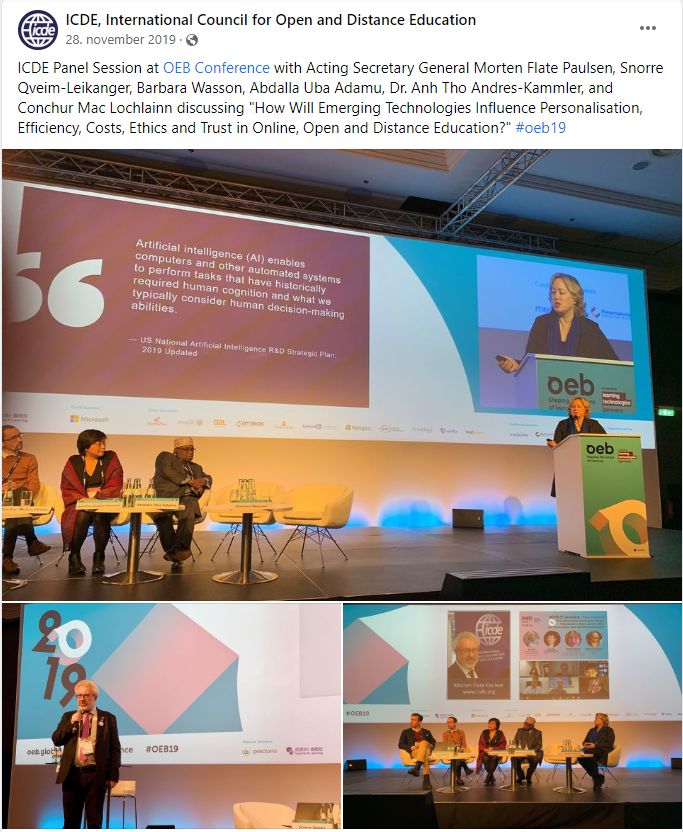
My 2019 minutes
- January 1 – Jair Bolsonaro was inaugurated as president of Brazil.
- March 10 – Ethiopian Airlines Flight 302 crashed six minutes after take-off from Bole International Airport in Ethiopia. 149 passengers and eight crew members perished. A flight ban was introduced for the Boeing 737 Max 8 aircraft after the accident.
- March 15 – 50 people were killed and at least 50 were injured when worshipers were shot at two mosques in Christchurch, New Zealand.
- March 20 – The EU’s competition authorities fined Google 1.49 billion euros for abuse of market power in the online advertising market.
- March 22 – Inspired by Greta Thunberg, 40,000 Norwegian schoolchildren went on strike for the climate and against global warming.
- March 28 – Norwegian Ole Gunnar Solskjær was appointed manager of Manchester United after being interim manager since December 2018.
- April 10 – For the first time, an image of a black hole was published.
- April 11 – WikiLeaks affiliate Julian Assange was arrested in London after spending seven years in asylum in the Ecuadorian embassy.
- April 15 – Notre-Dame Cathedral in Paris burned. The roof and spire collapsed in the fire.
- April 21 – Comedian and actor Volodmyr Zelenskyj was elected president of Ukraine with 73% of the votes in the second round of voting.
- May 19 – The Chinese telecom company Huawei was denied to use the Android operating system due to restrictions imposed by the US authorities.
- July 24 – Boris Johnson took office as Prime Minister of Great Britain.
- August 2 – The US withdrew from the INF nuclear treaty.
- August 10 – The murder and the mosque attack in Bærum, Norway.
- November 15 – The Norwegian Frode Berg, who was convicted of espionage in Russia, was pardoned by the Russian authorities.
- December 18 – The House of Representatives voted to impeach President Donald Trump.
- December 25 – Ari Behn, who was recently divorced from Norwegian Princess Märtha Louise, died by suicide.
My 2019 publications
ICDE Annual Report 2019
My 2019 presentations
Innovations in online education. Some pioneering developments and current opportunities. International Conference on Distance Learning “Research and Innovation for a Digital Society”. Sukhothai Thammathirat Open University, 02.08.19
Flexibility and cooperation in online education. Some international developments and opportunities. The ICT in education conference, 19.09.19, Kathmandu.
Er digitale kursbevis fremtidens vitnemål? FuNKon 19. Kongsberg, 21.11.19.
Afterthoughts
The University of the Future
In May 2021, a journalist from the Spanish newspaper EL PAÍS e-mailed me. If I could predict the University of the Future?
This was a welcome challenge during the corona pandemic. So, I sent him the following predictions. Much more than was included in Ramiro Varea’s 17.05.21 article Aulas virtuales y contenidos personalizados: así será la universidad en unos años.
Young people prefer streaming media and on demand learning. So, what if linear TV is geriatric, linear schools are old fashioned and digital natives prefer streaming education? Will the universities allow students to start whenever they like? Progress at their preferred pace? Complete the exams when they are ready?
Micro guest lectures will become more frequent since technology makes it easy for experts around the world to share their experiences via short webinars. Students could prepare questions from some of the expert’s work. Many international experts will gladly contribute freely if it takes only half an hour of their time.
Textbooks are expensive, voluminous and sometimes hard to get. The content will easily be distributed digitally, when a successful Spotify for textbooks arrives.
Learning analytics and meaningful use of big data will improve adaptive learning and individual learning experiences.
Universities should focus more on cost effectiveness and strive to get more learning for the money. This is important for students who pay tuition fees, institutions that offer education and countries that fund public education. Suitable online education has a huge potential to lower costs without reducing quality. Much of the current online education can be more cost effective, but currently there is too much focus on one-to-one teaching and digitizing traditional lectures.
Universities need to be more transparent. Better at sharing learning resources and useful information from and about students, teachers and learning analytics. There are many educational related activities that could be shared more widely. Students can learn a lot from each other if they have access to information about what other students do. Teachers can also learn a lot from each other if they share and make their teaching activities transparent.
Online education is good for the environment. Green education. Online schools do not need physical classrooms and offices that require much energy to operate. Online education can reduce the need to build new and expensive campuses. Students and faculty do not need transportation to attend online schools. Online education reduces pollution, travel expenses and rush hour traffic. Online schools often prefer digital learning resources rather than printed textbooks. This results in less waste of paper and reduced need for shipping.
Other important future breakthroughs will be improved translation services. Making it easier to communicate across language barriers. In addition, new technologies such as badges, micro credentials and block chain, can make it harder for students to forge certificates and official documents from educational institutions. This will help online educators to address some of the issues relating to language, credibility and trust across national borders.
Finally, I’m worried that open and distance education becomes less flexible as mainstream education becomes more flexible. Traditional distance and online institutions are merged with, or acquired by, larger mainstream institutions that intend to become more flexible. The result is often that the smaller institutions must adapt to the more rigid culture and systems of the larger institutions. National quality assurance schemes and agencies establish schemes for online education that are founded on not so flexible mainstream education.
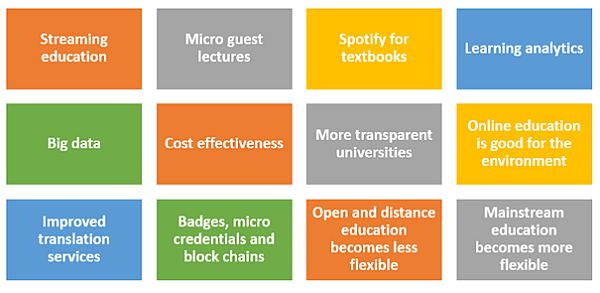
Alan Tait writes about learning and the digital revolution
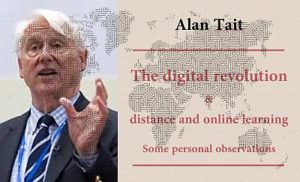
The digital revolution and distance and online learning: some personal observations
By Alan Tait
Professor Emeritus of Distance Education and Development
The Open University, UK
I was delighted to be asked by Morten F. Paulsen to contribute some personal observations on living through the last 30 years of the as yet unfinished digital revolution, in particular as to its reworking of how we offer and organise learning and teaching at a distance and online. In my partial retirement it is a topic I have often reflected on, albeit in a relatively unorganised and certainly unscholarly way. So, this invitation is perfect!
The Open University
The core innovations that led to the foundation of the Open University in 1969, along with the political and social changes that enabled them, were essentially a combination of existing technologies but assembled in new ways. These included the industrially organised postal system, high quality colour printing, the invention of new kinds of texts for learning, the use of tv and radio for educational purposes, individualised and student focused tutoring, the use of telephone for group tutorials, all wrapped up together in what was itself an innovation, and can be called educational logistics. These combined to provide what were widely regarded as qualitatively new standards of learning and teaching, even if the goal of changing the understanding of who could go to university was, initially at least, regarded with considerable scepticism.
While early computer supported learning systems were well known, especially in training in industry and the military, these were not adopted at the OU U.K., where an inchoate and implicit form of constructivism defeated the ideas of those who wanted the university to create computer supported learning pathways that made it impossible for students to diverge from the defined learning goal. This might be appropriate, it was successfully argued, for rats trying to find their way out of a maze, but nor for students trying to make sense of their learning.
The digital revolution
So technological innovation, informed by the new or at least newish discipline and practice of educational technology, lay at the heart of my professional world. And that array of technologies whose combination itself represented a technology, remained stable for some 20 years. They strongly influenced the establishment of many open universities around the world and opened access to Higher Education for many millions. There were attempts to introduce other analogue technologies during that period, for example distributing via satellite video lectures to huge territories without access to educational opportunity, with an array of learning centres where students were supposed to gather. But such experiments mostly provided a lesson on how to fail to introduce new technologies, and the generic open university approach remained for the most part unchallenged.
Then in the early 1990’s or so the digital revolution made its challenging entry, for myself first in the form of email and desktop computers for managing text, although elsewhere in the university it began to transform student records and logistics. By that time, the educational radicals of the Open University U.K. were in many cases in their 40’s and 50’s. And it seems to be true that while the technologies we grow up with, and perhaps up to the age of 40, are seen as part of the natural world, those that come later in our lives for some at least intrude as a personal challenge and an unwelcome one at that. I have a relative aged 82 who has never yet sent or received an email. She has just avoided this whole thing for 30 years.
So I remember working in an office of some 60 people in this period when the first desktop, just one, was installed for all of us to queue up and use, with its black screen and winking green text. And I sent the first email in my life, which was as it happens to Terry Evans at Deakin University, Australia. It could hardly have travelled further. And some 5 minutes later I received a reply. I couldn’t believe it. I think literally as well as metaphorically my mouth dropped open. Suddenly the world changed shape, and some dimensions of geographical distance, of time, and of communicating, sharing and working with others, were changed forever. I remember as early as 1989 reading the book ‘Mindweave’, edited by Robin Mason and Tony Kaye, which reported a number of case studies of text based interaction in educational contexts that really opened my eyes as to what was possible in terms of supporting learning. It was not the broadcast version of technology – one to many- but the emergent social constructivist model of meaning making, by many with many.
Skeptics
But those who were armoured against new technological innovations, over and above the ones we had worked with for the last 20 years, represented themselves as weary skeptics in the face of naive tech enthusiasts who had no understanding of ‘real’ communication, ‘real’ relationships’, or ‘real’ learning. And for an innovative technology supported university just 20 or so years old in the 1990’s, there were a surprising number of such conservatives who refused to model continued innovation, and who gradually became more and more forlorn and unhappy voices. Their refusal to acknowledge the far-reaching reality of the digital revolution for the ways in which we organised learning, teaching and services for students as well as so many other things did not finally exhaust itself in a small number of cases until their embittered retirement some 20 or more years later.
Social and economic models
More worthwhile critiques could however have been made. If we paid attention to the major technology revolutions of the last 500 years, selectively the printed book, the industrial factory, the railway, electricity, the internal combustion engine, the oil industry, the airplane etc, we can see a number of characteristics that they have in common. Firstly, they are too often driven by highly talented but egocentric individuals who have little regard for their fellow citizens whose lives their uninvited technologies are transforming, in some cases seriously impoverishing them at the same time as enormously enriching themselves. These same individuals avoid regulation by the state, avoid taxes, and avoid social responsibility at all costs. At least for a while. In the meantime, some at least set up philanthropic foundations to deflect such a critique. And it is also true that the digital revolution was a significant enabler of neo-liberalism, that set of ideas proposed in tandem by US President Ronald Reagan and U.K. Premier Margaret Thatcher as enormously innovative and liberating, but in my eyes representing very old-fashioned as well as ugly social and economic models. And the digital revolution made possible the reinvention of money as an instantly transferable electronic good that hugely reinforced the power of those who had it at the expense of local tax systems and labour forces. In due course this led to the devastating financial crash of 2008, deriving from a combination of incompetence and corruption that affected the living standards of many millions who had no responsibility for it at all. But I hope and believe that regulation and taxes are catching up now with what have become the great innovative tech monopolies. They have done with all the other tech revolutions.
For profit colleges
And if we come back to distance and online learning we have to acknowledge that our field has also had some of the threats and challenges as represented above, as well as the strengths and opportunities that we prefer to talk about. Not least has been the rise and thankfully in part at least the fall of the online for profit college. Especially but by no means only in the USA these colleges have sought out through their marketing the less advantaged sectors in a population, made promises on the spectrum of irresponsible to downright dishonest about the potential to improve earning power, and then seen their students laden by debts taken on to pay tuition fees dropout and fail in very large numbers. You could call such colleges generically ‘Trump University’ – yes there really was such an institution! But once again while the digital revolution has in an innovative way provided the means for such exploitative practices, in fact they take us back to so many – but not all – of the nineteenth and twentieth century correspondence schools who worked in essentially similar ways and for similar pecuniary motives. But the online for profit college phenomenon has now in the USA at least been significantly negatively impacted by lawsuits both individual and governmental, reinforcing my hope that the negative aspects of social behaviour enabled by the digital revolution in my field as well as more widely are now coming under some sort of control.
Open versus commercial practice
Of as great interest to me is the reaction to the high levels of commoditisation that the digital revolution has brought – above all of our personal data – as at the same time the push back of anti-commodifying practices in fields such as open software, open publishing and open educational resources. If it is true that every force engenders resistance, nowhere has this been seen so strongly as in the open publishing movement of the last 20 years. And it was the facilitation the production of journals, books and blogs at the same time as their distribution and easy availability through the web that has challenged and continues to challenge major publishing industries. It has been the digital revolution that has laid bare the essential injustice of a model where the public purse pays for research in universities, the results of which are given freely in articles or books that universities and the public then have to pay for to access, often at high prices, from commercial publishers. It is now the publishers who are having compromises forced on them, for example making journal articles freely available after one year. I will be fascinated to see where the next moment of stasis comes in the field of open versus commercial publishing. As for Open Educational Resources I remain wedded to the idea that courses can be more speedily, cheaply and equitably produced if we are able to share and adapt, facilitated by digital systems. But apart from the valuable open source production of some textbooks in North America where textbook prices are very high, I have personally seen less than enough evidence of Open Educational Practice, that is OER’s actually in use in the production of learning resources and courses rather than lying unexamined in unvisited repositories. There is some evidence, for example in Wawasan Open University in Malaysia. But not enough. I hope to be proved wrong!
Informal learning
On the other hand the use of OER’s for informal learning has had more success, for example with the Open Learn site of the Open University U.K., which makes freely available discontinued courses and fractions of current courses, and is used by millions of informal learners. As well as sites like this there are a million blogs, curated collections of resources on every subject under the sun, and spaces for association and discussion. The digital age has produced an extraordinary creativity based on informal learning and ease of communication. We can see it happening in front of our eyes as people stare at their screens in every sitting room at home, every café, on every bus, train or airplane. Is it here, not only in the study of but the production and curation of resources, that the spirit of innovation in learning might burn most fiercely in the current period? And are educational institutions with their architectures of learning still in analogue form in terms of programmes of study and credit systems still fit for purpose, and able to support the informal learning that is going on all around them, for the most part ignored, unrecognised and unvalued?
Human relationships
Lastly, what of human relationships? How have I experienced the impact of the digital revolution on relationships in educational contexts as well as more widely? If I think back to pre digital teacher-learner relationships I think it is true to say that these were in many cases invested in more in-depth and long term characteristics, with emotional and formative rewards at least as great as the short-term cognitive and assessment functions than is represented in the more constrained nature of online tutoring. But on the other hand, when such relationships did not work so well, they could be, and in some cases definitely were experienced by the learner as oppressive. And this move to lighter more transactional relationships has happened in other sectors such as medicine, banking, insurance, and retail. How many of us now have the long term, local and face to face personal relationships in these fields that underpinned ‘client’ or ‘patient’ cultures of the past? Even more interesting is the question as to how many younger people would even want them? Is the instant access to expertise and the freedom from time and place that digital relationships represent better or worse than the ‘by appointment’ or ‘only in opening hours’ local relationships that the pre-digital age offered? But if long term meaningful affective relationships are pushed back only to the nuclear family and close friends, can they carry the entire burden of human affective need alone? Or is this one element in the commonly reported rise in mental health problems in so many countries? If education is in its best sense driven by compassion and a love for humanity, that is to say a deep commitment to the wellbeing of others, how does such engagement work in the digital age? I am genuinely unsure about this area, and I can see and myself enjoy the advantages of ease of communication with family and friends all around the world as a significant benefit that is only available in the digital age. But if I am right that the digital revolution is by no means over, perhaps the human resilience that has remade and restored value again and again after previous technological revolutions will turn its attention to human relationships, and restore their depth of engagement over time, as well as their sparking in the digitally carried moment. At least I hope so!


